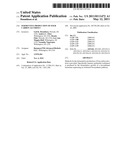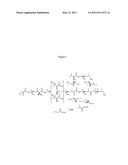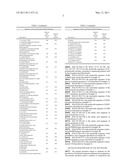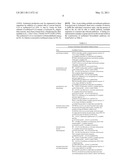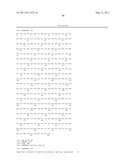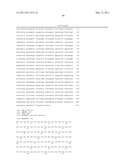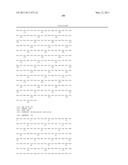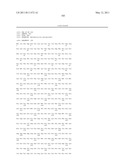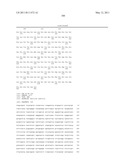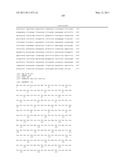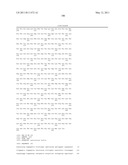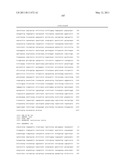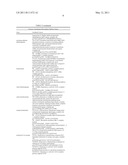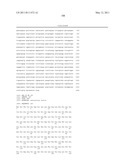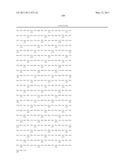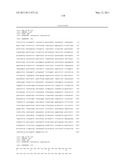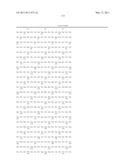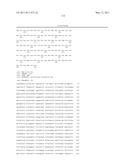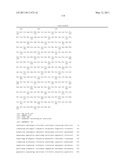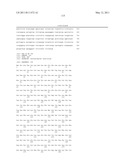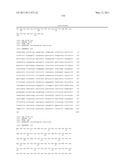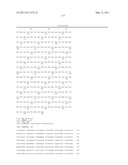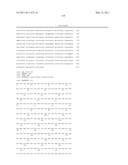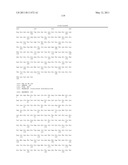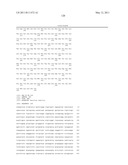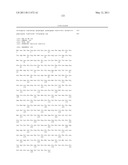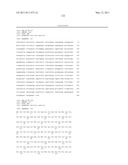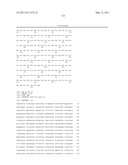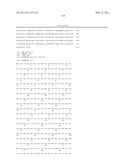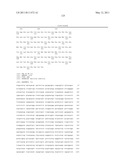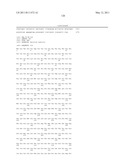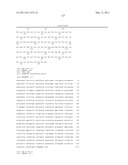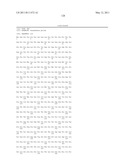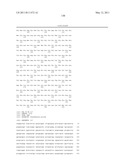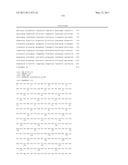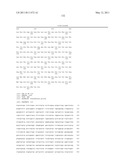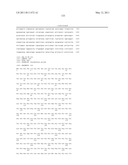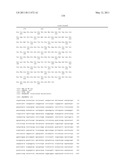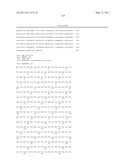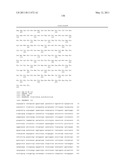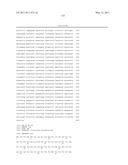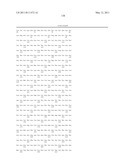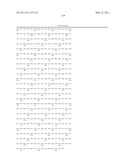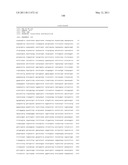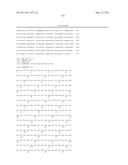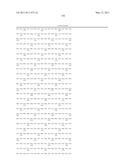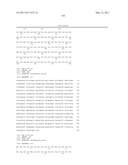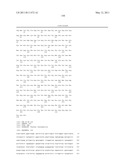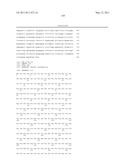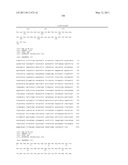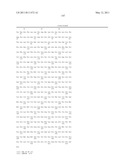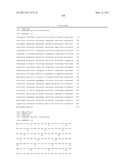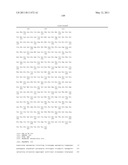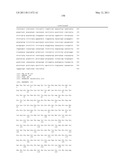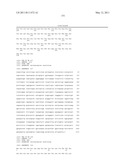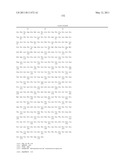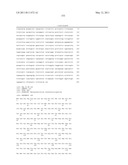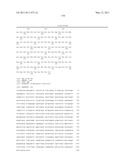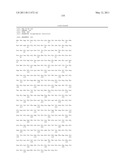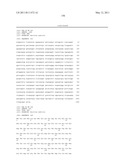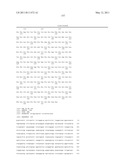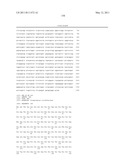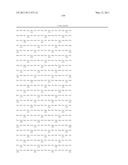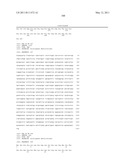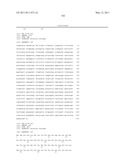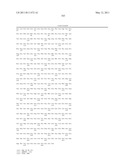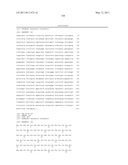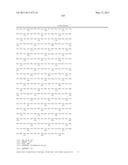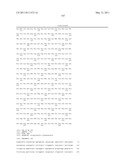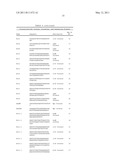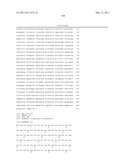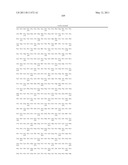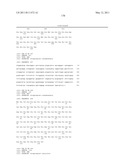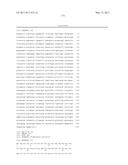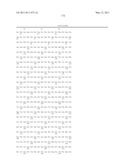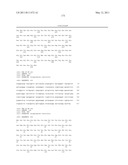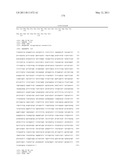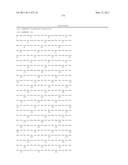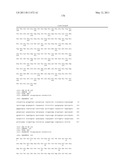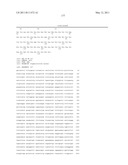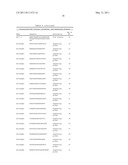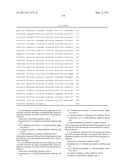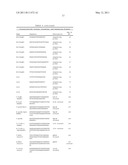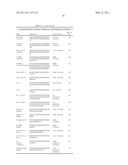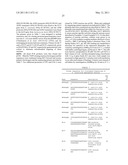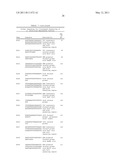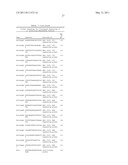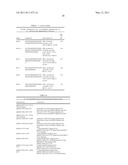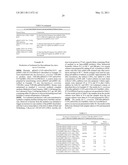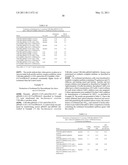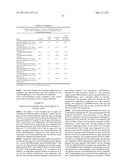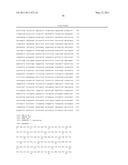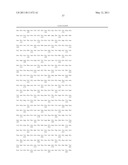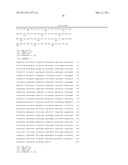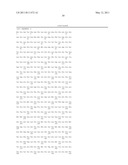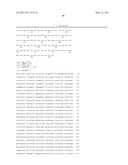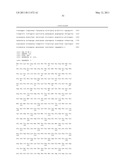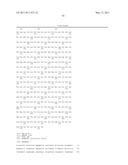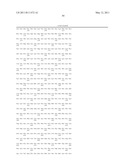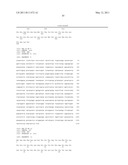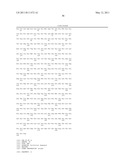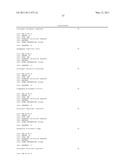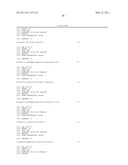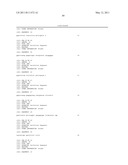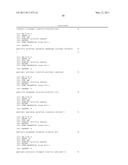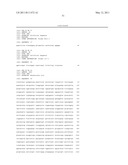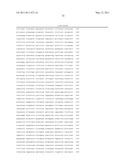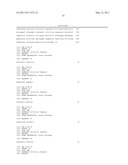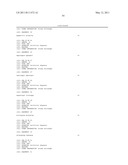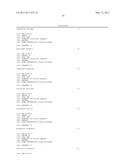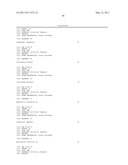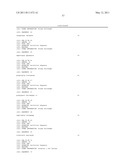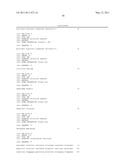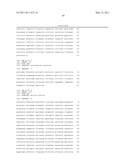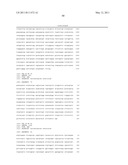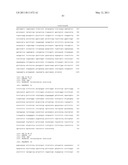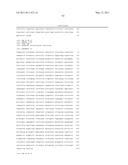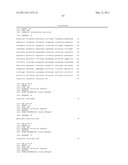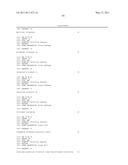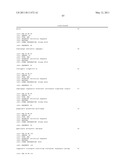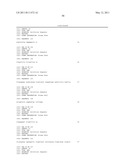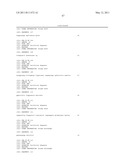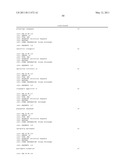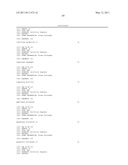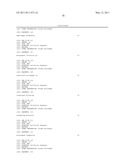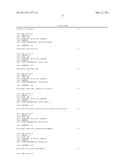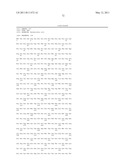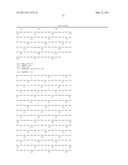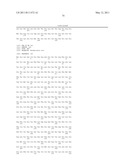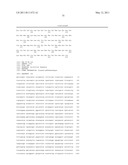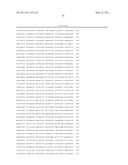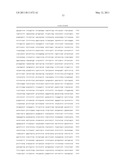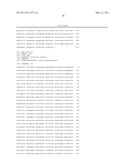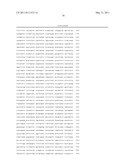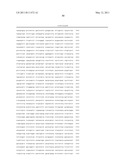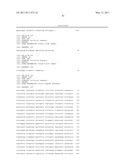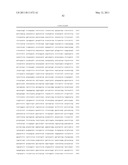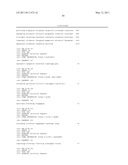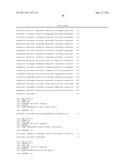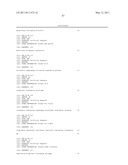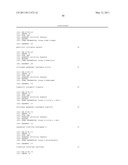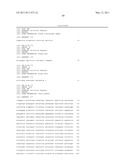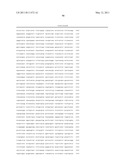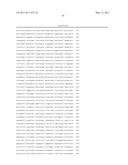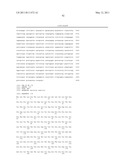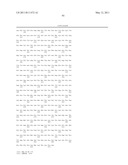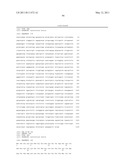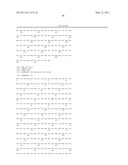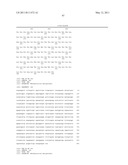Patent application title: FERMENTIVE PRODUCTION OF FOUR CARBON ALCOHOLS
Inventors:
Gail K. Donaldson (Newark, DE, US)
Gail K. Donaldson (Newark, DE, US)
Andrew C. Eliot (Wilmington, DE, US)
Andrew C. Eliot (Wilmington, DE, US)
Dennis Flint (Newark, DE, US)
Lori Ann Maggio-Hall (Wilmington, DE, US)
Lori Ann Maggio-Hall (Wilmington, DE, US)
Vasantha Nagarajan (Wilmington, DE, US)
Assignees:
BUTAMAX(TM) ADVANCED BIOFUELS LLC
IPC8 Class: AC12P716FI
USPC Class:
435160
Class name: Containing hydroxy group acyclic butanol
Publication date: 2011-05-12
Patent application number: 20110111472
Claims:
1. A recombinant microbial host cell comprising at least one DNA molecule
encoding a polypeptide that catalyzes a substrate to product conversion
selected from the group consisting of: i) pyruvate to acetolactate
(pathway step a) ii) acetolactate to 2,3-dihydroxyisovalerate (pathway
step b) iii) 2,3-dihydroxyisovalerate to α-ketoisovalerate (pathway
step c) iv) α-ketoisovalerate to isobutyraldehyde, (pathway step
d), and v) isobutyraldehyde to isobutanol; (pathway step e) wherein the
at least one DNA molecule is heterologous to said microbial host cell and
wherein said microbial host cell produces isobutanol.
2. A recombinant microbial host cell comprising at least one DNA molecule encoding a polypeptide that catalyzes a substrate to product conversion selected from the group consisting of: i) pyruvate to acetolactate, (pathway step a) ii) acetolactate to 2,3-dihydroxyisovalerate, (pathway step b) iii) 2,3-dihydroxyisovalerate to α-ketoisovalerate, (pathway step c) iv) α-ketoisovalerate to isobutyryl-CoA, (pathway step f) v) isobutyryl-CoA to isobutyraldehyde, (pathway step g), and vi) isobutyraldehyde to isobutanol; (pathway step e) wherein the at least one DNA molecule is heterologous to said microbial host cell and wherein said microbial host cell produces isobutanol.
3. A recombinant microbial host cell comprising at least one DNA molecule encoding a polypeptide that catalyzes a substrate to product conversion selected from the group consisting of: i) pyruvate to acetolactate, (pathway step a) ii) acetolactate to 2,3-dihydroxyisovalerate, (pathway step b) iii) 2,3-dihydroxyisovalerate to α-ketoisovalerate, (pathway step c) iv) α-ketoisovalerate to valine, (pathway step h) v) valine to isobutylamine, (pathway step i) vi) isobutylamine to isobutyraldehyde, (pathway step j), and vii) isobutyraldehyde to isobutanol: (pathway step e) wherein the at least one DNA molecule is heterologous to said microbial host cell and wherein said microbial host cell produces isobutanol.
4. A host cell according to any of claim 1 wherein the polypeptide that catalyzes a substrate to product conversion of pyruvate to acetolactate is acetolactate synthase.
5. A host cell according to any of claim 1 wherein the polypeptide that catalyzes a substrate to product conversion of acetolactate to 2,3-dihydroxyisovalerate is acetohydroxy acid isomeroreductase.
6. A host cell according to any of claim 1 wherein the polypeptide that catalyzes a substrate to product conversion of 2,3-dihydroxyisovalerate to α-ketoisovalerate is acetohydroxy acid dehydratase.
7. A host cell according to any of claim 1 wherein the polypeptide that catalyzes a substrate to product conversion of isobutyraldehyde to isobutanol is branched-chain alcohol dehydrogenase.
8. A host cell according to claim 1 wherein the polypeptide that catalyzes a substrate to product conversion of α-ketoisovalerate to isobutyraldehyde is branched-chain α-keto acid decarboxylase.
9. A host cell according to claim 2 wherein the polypeptide that catalyzes a substrate to product conversion of α-ketoisovalerate to isobutyryl-CoA is branched-chain keto acid dehydrogenase.
10. A host cell according to claim 2 wherein the polypeptide that catalyzes a substrate to product conversion of isobutyryl-CoA to isobutyraldehyde is acylating aldehyde dehydrogenase.
11. A host cell according to claim 3 wherein the polypeptide that catalyzes a substrate to product conversion of α-ketoisovalerate to valine is transaminase.
12. A host cell according to claim 3 wherein the polypeptide that catalyzes a substrate to product conversion of α-ketoisovalerate to valine is valine dehydrogenase.
13. A host cell according to claim 3 wherein the polypeptide that catalyzes a substrate to product conversion of valine to isobutylamine is valine decarboxylase.
14. A host cell according to claim 3 wherein the polypeptide that catalyzes a substrate to product conversion of isobutylamine to isobutyraldehyde is omega transaminase.
15. A host cell according to any of claim 1 wherein the cell is selected from the group consisting of: a bacterium, a cyanobacterium, a filamentous fungus and a yeast.
16. A host cell according to claim 15 wherein the cell is a member of a genus selected from the group consisting of Clostridium, Zymomonas, Escherichia, Salmonella, Rhodococcus, Pseudomonas, Bacillus, Lactobacillus, Enterococcus, Alcaligenes, Klebsiella, Paenibacillus, Arthrobacter, Corynebacterium, Brevibacterium, Pichia, Candida, Hansenula and Saccharomyces.
17. A host cell according to claim 16 wherein the cell is Escherichia coli.
18. A host cell according to claim 16 wherein the cell is Alcaligenes eutrophus.
19. A host cell according to claim 16 wherein the cell is Bacillus lichenifonnis.
20. A host cell according to claim 16 wherein the cell is Paenibacillus macerans.
21. A host cell according to claim 16 wherein the cell is Rhodococcus erythropolis.
22. A host cell according to claim 16 wherein the cell is Pseudomonas putida.
23. A host cell according to claim 16 wherein the cell is Bacillus subtilis.
24. A host cell according to claim 16 wherein the cell is Lactobacillus plantarum.
25. A host cell according to claim 16 wherein the cell is selected from the group consisting of Enterococcus faecium, Enterococcus gallinarium, and Enterococcus faecalis.
26. A host cell according to claim 16 wherein the cell is Saccharomyces cerevisiae.
27-37. (canceled)
38. A host cell according to any of claim 1 wherein the host cell is a facultative anaerobe.
39. A method for the production of isobutanol comprising: 1) providing a recombinant microbial host cell comprising at least one DNA molecule encoding a polypeptide that catalyzes a substrate to product conversion selected from the group consisting of: i) pyruvate to acetolactate (pathway step a) ii) acetolactate to 2,3-dihydroxyisovalerate (pathway step b) iii) 2,3-dihydroxyisovalerate to α-ketoisovalerate (pathway step c) iv) α-ketoisovalerate to isobutyraldehyde, (pathway step d), and v) isobutyraldehyde to isobutanol; (pathway step e) wherein the at least one DNA molecule is heterologous to said microbial host cell; and 2) contacting the host cell of (i) with a fermentable carbon substrate in a fermentation medium under conditions whereby isobutanol is produced.
40. A method for the production of isobutanol comprising: 1) providing a recombinant microbial host cell comprising at least one DNA molecule encoding a polypeptide that catalyzes a substrate to product conversion selected from the group consisting of: i) pyruvate to acetolactate, (pathway step a) ii) acetolactate to 2,3-dihydroxyisovalerate, (pathway step b) iii) 2,3-dihydroxyisovalerate to α-ketoisovalerate, (pathway step c) iv) α-ketoisovalerate to isobutyryl-CoA, (pathway step f) v) isobutyryl-CoA to isobutyraldehyde, (pathway step g), and vi) isobutyraldehyde to isobutanol; (pathway step e) wherein the at least one DNA molecule is heterologous to said microbial host cell; and 2) contacting the host cell of (i) with a fermentable carbon substrate in a fermentation medium under conditions whereby isobutanol is produced.
41. (canceled)
42. A method according to any of claim 39 wherein the fermentable carbon substrate is selected from the group consisting of monosaccharides, oligosaccharides, and polysaccharides.
43. A method according to any of claim 39 wherein the carbon substrate is selected from the group consisting of glucose, sucrose, and fructose.
44. A method according to any of claim 3 wherein the conditions whereby isobutanol is produced are anaerobic.
45. A method according to any of claim 39 wherein the conditions whereby isobutanol is produced are microaerobic.
46. A method according to any of claim 39 wherein the host cell is contacted with the carbon substrate in a minimal medium.
47-57. (canceled)
58. A method according to any of claim 39 wherein the host cell is selected from the group consisting of: a bacterium, a cyanobacterium, a filamentous fungus and a yeast.
59. A method according to claim 46 wherein the host cell is a member of a genus selected from the group consisting of Clostridium, Zymomonas, Escherichia, Salmonella, Rhodococcus, Pseudomonas, Bacillus, Lactobacillus, Enterococcus, Alcaligenes, Klebsiella, Paenibacillus, Arthrobacter, Corynebacterium, Brevibacterium, Pichia, Candida, Hansenula and Saccharomyces.
60. A method according to claim 59 wherein the host cell is Escherichia coli.
61. A method according to claim 59 wherein the host cell is Alcaligenes eutrophus.
62. A method according to claim 59 wherein the host cell is Bacillus lichenifonnis.
63. A method according to claim 59 wherein the host cell is Paenibacillus macerans.
64. A method according to claim 59 wherein the host cell is Rhodococcus erythropolis.
65. A method according to claim 59 wherein the host cell is Pseudomonas putida.
66. A method according to claim 59 wherein the host cell is Bacillus subtilis.
67. A method according to claim 59 wherein the host cell is Lactobacillus plantarum.
68. A method according to claim 59 wherein the host cell is selected from the group consisting of Enterococcus faecium, Enterococcus gallinarium, and Enterococcus faecalis.
69. A method according to claim 59 wherein the host cell is Saccharomyces cerevisiae.
70-80. (canceled)
81. A method according to any of claim 39 wherein the host cell is a facultative anaerobe.
82. An isobutanol containing fermentation medium produced by the method of any of claims 39 or 40.
Description:
CROSS-REFERENCE TO RELATED APPLICATIONS
[0001] This application is a continuation of and claims priority to U.S. application Ser. No. 11/586,315, now U.S. Pat. No. 7,851,188, filed on Oct. 25, 2006, which claims priority under 35 U.S.C. §119 from U.S. Provisional Application Ser. No. 60/730,290, filed Oct. 26, 2005.
FIELD OF THE INVENTION
[0002] The invention relates to the field of industrial microbiology and the production of alcohols. More specifically, isobutanol is produced via industrial fermentation of a recombinant microorganism.
BACKGROUND OF THE INVENTION
[0003] Butanol is an important industrial chemical, useful as a fuel additive, as a feedstock chemical in the plastics industry, and as a foodgrade extractant in the food and flavor industry. Each year 10 to 12 billion pounds of butanol are produced by petrochemical means and the need for this commodity chemical will likely increase.
[0004] Methods for the chemical synthesis of isobutanol are known, such as oxo synthesis, catalytic hydrogenation of carbon monoxide (Ullmann's Encyclopedia of Industrial Chemistry, 6th edition, 2003, Wiley-VCHVerlag GmbH and Co., Weinheim, Germany, Vol. 5, pp. 716-719) and Guerbet condensation of methanol with n-propanol (Carlini et al., J. Mol. Catal. A: Chem. 220:215-220 (2004)). These processes use starting materials derived from petrochemicals and are generally expensive and are not environmentally friendly. The production of isobutanol from plant-derived raw materials would minimize green house gas emissions and would represent an advance in the art.
[0005] Isobutanol is produced biologically as a by-product of yeast fermentation. It is a component of "fusel oil" that forms as a result of incomplete metabolism of amino acids by this group of fungi. Isobutanol is specifically produced from catabolism of L-valine. After the amine group of L-valine is harvested as a nitrogen source, the resulting α-keto acid is decarboxylated and reduced to isobutanol by enzymes of the so-called Ehrlich pathway (Dickinson et al., J. Biol. Chem. 273(40):25752-25756 (1998)). Yields of fusel oil and/or its components achieved during beverage fermentation are typically low. For example, the concentration of isobutanol produced in beer fermentation is reported to be less than 16 parts per million (Garcia et al., Process Biochemistry 29:303-309 (1994)). Addition of exogenous L-valine to the fermentation increases the yield of isobutanol, as described by Dickinson et al., supra, wherein it is reported that a yield of isobutanol of 3 g/L is obtained by providing L-valine at a concentration of 20 g/L in the fermentation. However, the use of valine as a feed-stock would be cost prohibitive for industrial scale isobutanol production. The biosynthesis of isobutanol directly from sugars would be economically viable and would represent an advance in the art. There have been no reports of a recombinant microorganism designed to produce isobutanol.
[0006] There is a need, therefore, for an environmentally responsible, cost-effective process for the production of isobutanol as a single product. The present invention addresses this need by providing a recombinant microbial production host that expresses an isobutanol biosynthetic pathway.
SUMMARY OF THE INVENTION
[0007] The invention provides a recombinant microorganism having an engineered isobutanol biosynthetic pathway. The engineered microorganism may be used for the commercial production of isobutanol. Accordingly, in one embodiment the invention provides a recombinant microbial host cell comprising at least one DNA molecule encoding a polypeptide that catalyzes a substrate to product conversion selected from the group consisting of: [0008] i) pyruvate to acetolactate (pathway step a) [0009] ii) acetolactate to 2,3-dihydroxyisovalerate (pathway step b) [0010] iii) 2,3-dihydroxyisovalerate to α-ketoisovalerate (pathway step c) [0011] iv) α-ketoisovalerate to isobutyraldehyde, (pathway step d), and [0012] v) isobutyraldehyde to isobutanol; (pathway step e) wherein the at least one DNA molecule is heterologous to said microbial host cell and wherein said microbial host cell produces isobutanol.
[0013] In another embodiment, the invention provides a recombinant microbial host cell comprising at least one DNA molecule encoding a polypeptide that catalyzes a substrate to product conversion selected from the group consisting of: [0014] i) pyruvate to acetolactate, (pathway step a) [0015] ii) acetolactate to 2,3-dihydroxyisovalerate, (pathway step b) [0016] iii) 2,3-dihydroxyisovalerate to α-ketoisovalerate, (pathway step c) [0017] iv) α-ketoisovalerate to isobutyryl-CoA, (pathway step f) [0018] v) isobutyryl-CoA to isobutyraldehyde, (pathway step g), and [0019] vi) isobutyraldehyde to isobutanol; (pathway step e) wherein the at least one DNA molecule is heterologous to said microbial host cell and wherein said microbial host cell produces isobutanol.
[0020] In another embodiment, the invention provides a recombinant microbial host cell comprising at least one DNA molecule encoding a polypeptide that catalyzes a substrate to product conversion selected from the group consisting of: [0021] i) pyruvate to acetolactate, (pathway step a) [0022] ii) acetolactate to 2,3-dihydroxyisovalerate, (pathway step b) [0023] iii) 2,3-dihydroxyisovalerate to α-ketoisovalerate, (pathway step c) [0024] iv) α-ketoisovalerate to valine, (pathway step h) [0025] v) valine to isobutylamine, (pathway step i) [0026] vi) isobutylamine to isobutyraldehyde, (pathway step j), and [0027] vii) isobutyraldehyde to isobutanol: (pathway step e) wherein the at least one DNA molecule is heterologous to said microbial host cell and wherein said microbial host cell produces isobutanol.
[0028] In another embodiment, the invention provides a method for the production of isobutanol comprising: [0029] 1) providing a recombinant microbial host cell comprising at least one DNA molecule encoding a polypeptide that catalyzes a substrate to product conversion selected from the group consisting of: [0030] i) pyruvate to acetolactate (pathway step a) [0031] ii) acetolactate to 2,3-dihydroxyisovalerate (pathway step b) [0032] iii) 2,3-dihydroxyisovalerate to α-ketoisovalerate (pathway step c) [0033] iv) α-ketoisovalerate to isobutyraldehyde, (pathway step d), and [0034] v) isobutyraldehyde to isobutanol; (pathway step e) wherein the at least one DNA molecule is heterologous to said microbial host cell; and [0035] 2) contacting the host cell of (i) with a fermentable carbon substrate in a fermentation medium under conditions whereby isobutanol is produced.
[0036] In another embodiment, the invention provides a method for the production of isobutanol comprising: [0037] 1) providing a recombinant microbial host cell comprising at least one DNA molecule encoding a polypeptide that catalyzes a substrate to product conversion selected from the group consisting of: [0038] i) pyruvate to acetolactate, (pathway step a) [0039] ii) acetolactate to 2,3-dihydroxyisovalerate, (pathway step b) [0040] iii) 2,3-dihydroxyisovalerate to α-ketoisovalerate, (pathway step c) [0041] iv) α-ketoisovalerate to isobutyryl-CoA, (pathway step f) [0042] v) isobutyryl-CoA to isobutyraldehyde, (pathway step g), and [0043] vi) isobutyraldehyde to isobutanol; (pathway step e) wherein the at least one DNA molecule is heterologous to said microbial host cell; and [0044] 2) contacting the host cell of (i) with a fermentable carbon substrate in a fermentation medium under conditions whereby isobutanol is produced.
[0045] In another embodiment, the invention provides a method for the production of isobutanol comprising: [0046] 1) providing a recombinant microbial host cell comprising at least one DNA molecule encoding a polypeptide that catalyzes a substrate to product conversion selected from the group consisting of: [0047] i) pyruvate to acetolactate, (pathway step a) [0048] ii) acetolactate to 2,3-dihydroxyisovalerate, (pathway step b) [0049] iii) 2,3-dihydroxyisovalerate to α-ketoisovalerate, (pathway step c) [0050] iv) α-ketoisovalerate to valine, (pathway step h) [0051] v) valine to isobutylamine, (pathway step i) [0052] vi) isobutylamine to isobutyraldehyde, (pathway step j), and [0053] vii) isobutyraldehyde to isobutanol: (pathway step e) wherein the at least one DNA molecule is heterologous to said microbial host cell; and [0054] 2) contacting the host cell of (i) with a fermentable carbon substrate in a fermentation medium under conditions whereby isobutanol is produced.
[0055] In an alternate embodiment the invention provides an isobutanol containing fermentation medium produced by the methods of the invention.
BRIEF DESCRIPTION OF THE FIGURES AND SEQUENCE DESCRIPTIONS
[0056] The invention can be more fully understood from the following detailed description, FIGURE, and the accompanying sequence descriptions, which form a part of this application.
[0057] FIG. 1 shows four different isobutanol biosynthetic pathways. The steps labeled "a", "b", "c", "d", "e", "f", "g", "h", "i", "j" and "k" represent the substrate to product conversions described below.
[0058] The following sequences conform with 37 C.F.R. 1.821-1.825 ("Requirements for patent applications Containing Nucleotide Sequences and/or Amino Acid Sequence Disclosures--the Sequence Rules") and are consistent with World Intellectual Property Organization (WIPO) Standard ST 0.25 (2009) and the sequence listing requirements of the EPO and PCT (Rules 5.2 and 49.5(a-bis), and Section 208 and Annex C of the Administrative Instructions). The symbols and format used for nucleotide and amino acid sequence data comply with the rules set forth in 37 C.F.R. §1.822.
TABLE-US-00001 TABLE 1 Summary of Gene and Protein SEQ ID Numbers SEQ ID NO: SEQ ID Nucleic NO: Description acid Peptide Klebsiella pneumoniae budB 1 2 (acetolactate synthase) Bacillus subtilis alsS 78 178 (acetolactate synthase) Lactococcus lactis als 179 180 (acetolactate synthase) E. coli ilvC (acetohydroxy acid 3 4 reductoisomerase) S. cerevisiae ILV5 80 181 (acetohydroxy acid reductoisomerase) M. maripaludis ilvC 182 183 (Ketol-acid reductoisomerase) B. subtilis ilvC 184 185 (acetohydroxy acid reductoisomerase) E. coli ilvD (acetohydroxy acid 5 6 dehydratase) S. cerevisiae ILV3 83 186 (Dihydroxyacid dehydratase) M. maripaludis ilvD 187 188 (Dihydroxy-acid dehydratase) B. subtilis ilvD 189 190 (dihydroxy-acid dehydratase) Lactococcus lactis kivD (branched- 7 8 chain α-keto acid decarboxylase), codon optimized Lactococcus lactis kivD (branched- 191 8 chain α-keto acid decarboxylase), Lactococcus lactis kdcA 192 193 (branched-chain alpha-ketoacid decarboxylase) Salmonella typhimurium 194 195 (indolepyruvate decarboxylase) Clostridium acetobutylicum pdc 196 197 (Pyruvate decarboxylase) E. coli yqhD (branched-chain alcohol 9 10 dehydrogenase) S. cerevisiae YPR1 198 199 (2-methylbutyraldehyde reductase) S. cerevisiae ADH6 200 201 (NADPH-dependent cinnamyl alcohol dehydrogenase) Clostridium acetobutylicum bdhA 202 203 (NADH-dependent butanol dehydrogenase A) Clostridium acetobutylicum bdhB 158 204 Butanol dehydrogenase B. subtilis bkdAA 205 206 (branched-chain keto acid dehydrogenase E1 subunit) B. subtilis bkdAB 207 208 (branched-chain alpha-keto acid dehydrogenase E1 subunit) B. subtilis bkdB 209 210 (branched-chain alpha-keto acid dehydrogenase E2 subunit) B. subtilis lpdV 211 212 (branched-chain alpha-keto acid dehydrogenase E3 subunit) P. putida bkdA1 213 214 (keto acid dehydrogenase E1-alpha subunit) P. putida bkdA2 215 216 (keto acid dehydrogenase E1-beta subunit) P. putida bkdB 217 218 (transacylase E2) P. putida 1pdV 219 220 (lipoamide dehydrogenase) C. beijerinckii ald 221 222 (coenzyme A acylating aldehyde dehydrogenase) C. acetobutylicum adhe1 223 224 (aldehyde dehydrogenase) C. acetobutylicum adhe 225 226 (alcohol-aldehyde dehydrogenase) P. putida nahO 227 228 (acetaldehyde dehydrogenase) T. thermophilus 229 230 (acetaldehyde dehydrogenase) E. coli avtA 231 232 (valine-pyruvate transaminase) B. licheniformis avtA 233 234 (valine-pyruvate transaminase) E. coli ilvE 235 236 (branched chain amino acid aminotransferase) S. cerevisiae BAT2 237 238 (branched chain amino acid aminotransferase) M. thermoautotrophicum 239 240 (branched chain amino acid aminotransferase) S. coelicolor 241 242 (valine dehydrogenase) B.. subtilis bcd 243 244 (leucine dehydrogenase) S. viridifaciens 245 246 (valine decarboxyase) A. denitrificans aptA 247 248 (omega-amino acid:pyruvate transaminase) R. eutropha 249 250 (alanine-pyruvate transaminase) S. oneidensis 251 252 (beta alanine-pyruvate transaminase) P. putida 253 254 (beta alanine-pyruvate transaminase) S. cinnamonensis icm 255 256 (isobutyrl-CoA mutase) S. cinnamonensis icmB 257 258 (isobutyrl-CoA mutase) S. coelicolor SCO5415 259 260 (isobutyrl-CoA mutase) S. coelicolor SCO4800 261 262 (isobutyrl-CoA mutase) S. avermitilis icmA 263 264 (isobutyrl-CoA mutase) S. avermitilis icmB 265 266 (isobutyrl-CoA mutase)
[0059] SEQ ID NOs:11-38, 40-69, 72-75, 85-138, 144, 145, 147-157, 159-176 are the nucleotide sequences of oligonucleotide cloning, screening or sequencing primers used in the Examples described herein.
[0060] SEQ ID NO:39 is the nucleotide sequence of the cscBKA gene cluster described in Example 16.
[0061] SEQ ID NO:70 is the nucleotide sequence of the glucose isomerase promoter 1.6 Gl described in Example 13.
[0062] SEQ ID NO:71 is the nucleotide sequence of the 1.5 Gl promoter described in Example 13.
[0063] SEQ ID NO:76 is the nucleotide sequence of the GPD promoter described in Example 17.
[0064] SEQ ID NO:77 is the nucleotide sequence of the CYC1 terminator described in Example 17.
[0065] SEQ ID NO:79 is the nucleotide sequence of the FBA promoter described in Example 17.
[0066] SEQ ID NO:81 is the nucleotide sequence of ADH1 promoter described in Example 17.
[0067] SEQ ID NO:82 is the nucleotide sequence of ADH1 terminator described in Example 17.
[0068] SEQ ID NO:84 is the nucleotide sequence of GPM promoter described in Example 17.
[0069] SEQ ID NO:139 is the amino acid sequence of sucrose hydrolase (CscA).
[0070] SEQ ID NO:140 is the amino acid sequence of D-fructokinase (CscK).
[0071] SEQ ID NO:141 is the amino acid sequence of sucrose permease (CscB).
[0072] SEQ ID NO:142 is the nucleotide sequence of plasmid pFP988DssPspac described in Example 20.
[0073] SEQ ID NO:143 is the nucleotide sequence of plasmid pFP988DssPgroE described in Example 20.
[0074] SEQ ID NO:146 is the nucleotide sequence of the pFP988Dss vector fragment described in Example 20.
[0075] SEQ ID NO:177 is the nucleotide sequence of the pFP988 integration vector described in Example 21.
[0076] SEQ ID NO:267 is the nucleotide sequence of plasmid pC194 described in Example 21.
DETAILED DESCRIPTION OF THE INVENTION
[0077] The present invention relates to methods for the production of isobutanol using recombinant microorganisms. The present invention meets a number of commercial and industrial needs. Butanol is an important industrial commodity chemical with a variety of applications, where its potential as a fuel or fuel additive is particularly significant. Although only a four-carbon alcohol, butanol has an energy content similar to that of gasoline and can be blended with any fossil fuel. Butanol is favored as a fuel or fuel additive as it yields only CO2 and little or no SOX or NOX when burned in the standard internal combustion engine. Additionally butanol is less corrosive than ethanol, the most preferred fuel additive to date.
[0078] In addition to its utility as a biofuel or fuel additive, butanol has the potential of impacting hydrogen distribution problems in the emerging fuel cell industry. Fuel cells today are plagued by safety concerns associated with hydrogen transport and distribution. Butanol can be easily reformed for its hydrogen content and can be distributed through existing gas stations in the purity required for either fuel cells or vehicles.
[0079] Finally the present invention produces isobutanol from plant derived carbon sources, avoiding the negative environmental impact associated with standard petrochemical processes for butanol production.
[0080] The following definitions and abbreviations are to be used for the interpretation of the claims and the specification.
[0081] The term "invention" or "present invention" as used herein is a non-limiting term and is not intended to refer to any single embodiment of the particular invention but encompasses all possible embodiments as described in the specification and the claims.
[0082] The term "isobutanol biosynthetic pathway" refers to an enzyme pathways to produce isobutanol.
[0083] The terms "acetolactate synthase" and "acetolactate synthetase" are used intechangeably herein to refer to an enzyme that catalyzes the conversion of pyruvate to acetolactate and CO2. Preferred acetolactate synthases are known by the EC number 2.2.1.6 (Enzyme Nomenclature 1992, Academic Press, San Diego). These enzymes are available from a number of sources, including, but not limited to, Bacillus subtilis (GenBank Nos: CAB15618 (SEQ ID NO:178), Z99122 (SEQ ID NO:78), NCBI (National Center for Biotechnology Information) amino acid sequence, NCBI nucleotide sequence, respectively), Klebsiella pneumoniae (GenBank Nos: AAA25079 (SEQ ID NO:2), M73842 (SEQ ID NO:1)), and Lactococcus lactis (GenBank Nos: AAA25161 (SEQ ID NO:180), L16975 (SEQ ID NO:179)).
[0084] The terms "acetohydroxy acid isomeroreductase" and "acetohydroxy acid reductoisomerase" are used interchangeably herein to refer to an enzyme that catalyzes the conversion of acetolactate to 2,3-dihydroxyisovalerate using NADPH (reduced nicotinamide adenine dinucleotide phosphate) as an electron donor. Preferred acetohydroxy acid isomeroreductases are known by the EC number 1.1.1.86 and sequences are available from a vast array of microorganisms, including, but not limited to, Escherichia coli (GenBank Nos: NP--418222 (SEQ ID NO:4), NC--000913 (SEQ ID NO:3)), Saccharomyces cerevisiae (GenBank Nos: NP--013459 (SEQ ID NO:181), NC--001144 (SEQ ID NO:80)), Methanococcus maripaludis (GenBank Nos: CAF30210 (SEQ ID NO:183), BX957220 (SEQ ID NO:182)), and Bacillus. subtilis (GenBank Nos: CAB14789 (SEQ ID NO:185), Z99118 (SEQ ID NO:184)).
[0085] The term "acetohydroxy acid dehydratase" refers to an enzyme that catalyzes the conversion of 2,3-dihydroxyisovalerate to α-ketoisovalerate. Preferred acetohydroxy acid dehydratases are known by the EC number 4.2.1.9. These enzymes are available from a vast array of microorganisms, including, but not limited to, E. coli (GenBank Nos: YP--026248 (SEQ ID NO:6), NC--000913 (SEQ ID NO:5)), S. cerevisiae (GenBank Nos: NP--012550 (SEQ ID NO:186), NC--001142 (SEQ ID NO:83)), M. maripaludis (GenBank Nos: CAF29874 (SEQ ID NO:188), BX957219 (SEQ ID NO:187)), and B. subtilis (GenBank Nos: CAB14105 (SEQ ID NO:190), Z99115 (SEQ ID NO:189)).
[0086] The term "branched-chain α-keto acid decarboxylase" refers to an enzyme that catalyzes the conversion of α-ketoisovalerate to isobutyraldehyde and CO2. Preferred branched-chain α-keto acid decarboxylases are known by the EC number 4.1.1.72 and are available from a number of sources, including, but not limited to, Lactococcus lactis (GenBank Nos: AAS49166 (SEQ ID NO:193), AY548760 (SEQ ID NO:192); CAG34226 (SEQ ID NO:8), AJ746364 (SEQ ID NO:191), Salmonella typhimurium (GenBank Nos: NP--461346 (SEQ ID NO:195), NC--003197 (SEQ ID NO:194)), and Clostridium acetobutylicum (GenBank Nos: NP--149189 (SEQ ID NO:197), NC--001988 (SEQ ID NO:196)).
[0087] The term "branched-chain alcohol dehydrogenase" refers to an enzyme that catalyzes the conversion of isobutyraldehyde to isobutanol. Preferred branched-chain alcohol dehydrogenases are known by the EC number 1.1.1.265, but may also be classified under other alcohol dehydrogenases (specifically, EC 1.1.1.1 or 1.1.1.2). These enzymes utilize NADH (reduced nicotinamide adenine dinucleotide) and/or NADPH as electron donor and are available from a number of sources, including, but not limited to, S. cerevisiae (GenBank Nos: NP--010656 (SEQ ID NO:199), NC--001136 (SEQ ID NO:198); NP--014051 (SEQ ID NO:201) NC--001145 (SEQ ID NO:200)), E. coli (GenBank Nos: NP--417484 (SEQ ID NO:10), NC--000913 (SEQ ID NO:9)), and C. acetobutylicum (GenBank Nos: NP--349892 (SEQ ID NO:203), NC--003030 (SEQ ID NO:202); NP--349891 (SEQ ID NO:204), NC--003030 (SEQ ID NO:158)).
[0088] The term "branched-chain keto acid dehydrogenase" refers to an enzyme that catalyzes the conversion of α-ketoisovalerate to isobutyryl-CoA (isobutyryl-coenzyme A), using NAD.sup.+ (nicotinamide adenine dinucleotide) as electron acceptor. Preferred branched-chain keto acid dehydrogenases are known by the EC number 1.2.4.4. These branched-chain keto acid dehydrogenases are comprised of four subunits and sequences from all subunits are available from a vast array of microorganisms, including, but not limited to, B. subtilis (GenBank Nos: CAB14336 (SEQ ID NO:206), Z99116 (SEQ ID NO:205); CAB14335 (SEQ ID NO:208), Z99116 (SEQ ID NO:207); CAB14334 (SEQ ID NO:210), Z99116 (SEQ ID NO:209); and CAB14337 (SEQ ID NO:212), Z99116 (SEQ ID NO:211)) and Pseudomonas putida (GenBank Nos: AAA65614 (SEQ ID NO:214), M57613 (SEQ ID NO:213); AAA65615 (SEQ ID NO:216), M57613 (SEQ ID NO:215); AAA65617 (SEQ ID NO:218), M57613 (SEQ ID NO:217); and AAA65618 (SEQ ID NO:220), M57613 (SEQ ID NO:219)).
[0089] The term "acylating aldehyde dehydrogenase" refers to an enzyme that catalyzes the conversion of isobutyryl-CoA to isobutyraldehyde, using either NADH or NADPH as electron donor. Preferred acylating aldehyde dehydrogenases are known by the EC numbers 1.2.1.10 and 1.2.1.57. These enzymes are available from multiple sources, including, but not limited to, Clostridium beijerinckii (GenBank Nos: AAD31841 (SEQ ID NO:222), AF157306 (SEQ ID NO:221)), C. acetobutylicum (GenBank Nos: NP--149325 (SEQ ID NO:224), NC--001988 (SEQ ID NO:223); NP--149199 (SEQ ID NO:226), NC--001988 (SEQ ID NO:225)), P. putida (GenBank Nos: AAA89106 (SEQ ID NO:228), U13232 (SEQ ID NO:227)), and Thermus thermophilus (GenBank Nos: YP--145486 (SEQ ID NO:230), NC--006461 (SEQ ID NO:229)).
[0090] The term "transaminase" refers to an enzyme that catalyzes the conversion of α-ketoisovalerate to L-valine, using either alanine or glutamate as amine donor. Preferred transaminases are known by the EC numbers 2.6.1.42 and 2.6.1.66. These enzymes are available from a number of sources. Examples of sources for alanine-dependent enzymes include, but are not limited to, E. coli (GenBank Nos: YP--026231 (SEQ ID NO:232), NC--000913 (SEQ ID NO:231)) and Bacillus lichenifonnis (GenBank Nos: YP--093743 (SEQ ID NO:234), NC--006322 (SEQ ID NO:233)). Examples of sources for glutamate-dependent enzymes include, but are not limited to, E. coli (GenBank Nos: YP--026247 (SEQ ID NO:236), NC--000913 (SEQ ID NO:235)), S. cerevisiae (GenBank Nos: NP--012682 (SEQ ID NO:238), NC--001142 (SEQ ID NO:237)) and Methanobacterium thermoautotrophicum (GenBank Nos: NP--276546 (SEQ ID NO:240), NC--000916 (SEQ ID NO:239)).
[0091] The term "valine dehydrogenase" refers to an enzyme that catalyzes the conversion of α-ketoisovalerate to L-valine, using NAD(P)H as electron donor and ammonia as amine donor. Preferred valine dehydrogenases are known by the EC numbers 1.4.1.8 and 1.4.1.9 and are available from a number of sources, including, but not limited to, Streptomyces coelicolor (GenBank Nos: NP--628270 (SEQ ID NO:242), NC--003888 (SEQ ID NO:241)) and B. subtilis (GenBank Nos: CAB14339 (SEQ ID NO:244), Z99116 (SEQ ID NO:243)).
[0092] The term "valine decarboxylase" refers to an enzyme that catalyzes the conversion of L-valine to isobutylamine and CO2. Preferred valine decarboxylases are known by the EC number 4.1.1.14. These enzymes are found in Streptomycetes, such as for example, Streptomyces viridifaciens (GenBank Nos: AAN10242 (SEQ ID NO:246), AY116644 (SEQ ID NO:245)).
[0093] The term "omega transaminase" refers to an enzyme that catalyzes the conversion of isobutylamine to isobutyraldehyde using a suitable amino acid as amine donor. Preferred omega transaminases are known by the EC number 2.6.1.18 and are available from a number of sources, including, but not limited to, Alcaligenes denitrificans (AAP92672 (SEQ ID NO:248), AY330220 (SEQ ID NO:247)), Ralstonia eutropha (GenBank Nos: YP--294474 (SEQ ID NO:250), NC--007347 (SEQ ID NO:249)), Shewanella oneidensis (GenBank Nos: NP--719046 (SEQ ID NO:252), NC--004347 (SEQ ID NO:251)), and P. putida (GenBank Nos: AAN66223 (SEQ ID NO:254), AE016776 (SEQ ID NO:253)).
[0094] The term "isobutyryl-CoA mutase" refers to an enzyme that catalyzes the conversion of butyryl-CoA to isobutyryl-CoA. This enzyme uses coenzyme B12 as cofactor. Preferred isobutyryl-CoA mutases are known by the EC number 5.4.99.13. These enzymes are found in a number of Streptomycetes, including, but not limited to, Streptomyces cinnamonensis (GenBank Nos: AAC08713 (SEQ ID NO:256), U67612 (SEQ ID NO:255); CAB59633 (SEQ ID NO:258), AJ246005 (SEQ ID NO:257)), S. coelicolor (GenBank Nos: CAB70645 (SEQ ID NO:260), AL939123 (SEQ ID NO:259); CAB92663 (SEQ ID NO:262), AL939121 (SEQ ID NO:261)), and Streptomyces avermitilis (GenBank Nos: NP--824008 (SEQ ID NO:264), NC--003155 (SEQ ID NO:263); NP--824637 (SEQ ID NO:266), NC--003155 (SEQ ID NO:265)).
[0095] The term "a facultative anaerobe" refers to a microorganism that can grow in both aerobic and anaerobic environments.
[0096] The term "carbon substrate" or "fermentable carbon substrate" refers to a carbon source capable of being metabolized by host organisms of the present invention and particularly carbon sources selected from the group consisting of monosaccharides, oligosaccharides, polysaccharides, and one-carbon substrates or mixtures thereof.
[0097] The term "gene" refers to a nucleic acid fragment that is capable of being expressed as a specific protein, optionally including regulatory sequences preceding (5' non-coding sequences) and following (3' non-coding sequences) the coding sequence. "Native gene" refers to a gene as found in nature with its own regulatory sequences. "Chimeric gene" refers to any gene that is not a native gene, comprising regulatory and coding sequences that are not found together in nature. Accordingly, a chimeric gene may comprise regulatory sequences and coding sequences that are derived from different sources, or regulatory sequences and coding sequences derived from the same source, but arranged in a manner different than that found in nature. "Endogenous gene" refers to a native gene in its natural location in the genome of an organism. A "foreign gene" or "heterologous gene" refers to a gene not normally found in the host organism, but that is introduced into the host organism by gene transfer. Foreign genes can comprise native genes inserted into a non-native organism, or chimeric genes. A "transgene" is a gene that has been introduced into the genome by a transformation procedure.
[0098] As used herein the term "coding sequence" refers to a DNA sequence that codes for a specific amino acid sequence. "Suitable regulatory sequences" refer to nucleotide sequences located upstream (5' non-coding sequences), within, or downstream (3' non-coding sequences) of a coding sequence, and which influence the transcription, RNA processing or stability, or translation of the associated coding sequence. Regulatory sequences may include promoters, translation leader sequences, introns, polyadenylation recognition sequences, RNA processing site, effector binding site and stem-loop structure.
[0099] The term "promoter" refers to a DNA sequence capable of controlling the expression of a coding sequence or functional RNA. In general, a coding sequence is located 3' to a promoter sequence. Promoters may be derived in their entirety from a native gene, or be composed of different elements derived from different promoters found in nature, or even comprise synthetic DNA segments. It is understood by those skilled in the art that different promoters may direct the expression of a gene in different tissues or cell types, or at different stages of development, or in response to different environmental or physiological conditions. Promoters which cause a gene to be expressed in most cell types at most times are commonly referred to as "constitutive promoters". It is further recognized that since in most cases the exact boundaries of regulatory sequences have not been completely defined, DNA fragments of different lengths may have identical promoter activity.
[0100] The term "operably linked" refers to the association of nucleic acid sequences on a single nucleic acid fragment so that the function of one is affected by the other. For example, a promoter is operably linked with a coding sequence when it is capable of effecting the expression of that coding sequence (i.e., that the coding sequence is under the transcriptional control of the promoter). Coding sequences can be operably linked to regulatory sequences in sense or antisense orientation.
[0101] The term "expression", as used herein, refers to the transcription and stable accumulation of sense (mRNA) or antisense RNA derived from the nucleic acid fragment of the invention. Expression may also refer to translation of mRNA into a polypeptide.
[0102] As used herein the term "transformation" refers to the transfer of a nucleic acid fragment into a host organism, resulting in genetically stable inheritance. Host organisms containing the transformed nucleic acid fragments are referred to as "transgenic" or "recombinant" or "transformed" organisms.
[0103] The terms "plasmid", "vector" and "cassette" refer to an extra chromosomal element often carrying genes which are not part of the central metabolism of the cell, and usually in the form of circular double-stranded DNA fragments. Such elements may be autonomously replicating sequences, genome integrating sequences, phage or nucleotide sequences, linear or circular, of a single- or double-stranded DNA or RNA, derived from any source, in which a number of nucleotide sequences have been joined or recombined into a unique construction which is capable of introducing a promoter fragment and DNA sequence for a selected gene product along with appropriate 3' untranslated sequence into a cell. "Transformation cassette" refers to a specific vector containing a foreign gene and having elements in addition to the foreign gene that facilitates transformation of a particular host cell. "Expression cassette" refers to a specific vector containing a foreign gene and having elements in addition to the foreign gene that allow for enhanced expression of that gene in a foreign host.
[0104] As used herein the term "codon degeneracy" refers to the nature in the genetic code permitting variation of the nucleotide sequence without effecting the amino acid sequence of an encoded polypeptide. The skilled artisan is well aware of the "codon-bias" exhibited by a specific host cell in usage of nucleotide codons to specify a given amino acid. Therefore, when synthesizing a gene for improved expression in a host cell, it is desirable to design the gene such that its frequency of codon usage approaches the frequency of preferred codon usage of the host cell.
[0105] The term "codon-optimized" as it refers to genes or coding regions of nucleic acid molecules for transformation of various hosts, refers to the alteration of codons in the gene or coding regions of the nucleic acid molecules to reflect the typical codon usage of the host organism without altering the polypeptide encoded by the DNA.
[0106] Standard recombinant DNA and molecular cloning techniques used herein are well known in the art and are described by Sambrook, J., Fritsch, E. F. and Maniatis, T., Molecular Cloning: A Laboratory Manual, Second Edition, Cold Spring Harbor Laboratory Press, Cold Spring Harbor, N.Y. (1989) (hereinafter "Maniatis"); and by Silhavy, T. J., Bennan, M. L. and Enquist, L. W., Experiments with Gene Fusions, Cold Spring Harbor Laboratory Press, Cold Spring Harbor, N.Y. (1984); and by Ausubel, F. M. et al., Current Protocols in Molecular Biology, published by Greene Publishing Assoc. and Wiley-Interscience (1987).
Isobutanol Biosynthetic Pathways
[0107] Carbohydrate utilizing microorganisms employ the Embden-Meyerhof-Parnas (EMP) pathway, the Entner-Doudoroff pathway and the pentose phosphate cycle as the central, metabolic routes to provide energy and cellular precursors for growth and maintenance. These pathways have in common the intermediate glyceraldehyde-3-phosphate and, ultimately, pyruvate is formed directly or in combination with the EMP pathway. Subsequently, pyruvate is transformed to acetyl-coenzyme A (acetyl-CoA) via a variety of means. Acetyl-CoA serves as a key intermediate, for example, in generating fatty acids, amino acids and secondary metabolites. The combined reactions of sugar conversion to pyruvate produce energy (e.g. adenosine-5'-triphosphate, ATP) and reducing equivalents (e.g. reduced nicotinamide adenine dinucleotide, NADH, and reduced nicotinamide adenine dinucleotide phosphate, NADPH). NADH and NADPH must be recycled to their oxidized forms (NAD.sup.+ and NADP.sup.+, respectively). In the presence of inorganic electron acceptors (e.g. O2, NO3.sup.- and SO42-), the reducing equivalents may be used to augment the energy pool; alternatively, a reduced carbon by-product may be formed.
[0108] The invention enables the production of isobutanol from carbohydrate sources with recombinant microorganisms by providing four complete reaction pathways, as shown in FIG. 1. Three of the pathways comprise conversion of pyruvate to isobutanol via a series of enzymatic steps. The preferred isobutanol pathway (FIG. 1, steps a to e), comprises the following substrate to product conversions: [0109] a) pyruvate to acetolactate, as catalyzed for example by acetolactate synthase, [0110] b) acetolactate to 2,3-dihydroxyisovalerate, as catalyzed for example by acetohydroxy acid isomeroreductase, [0111] c) 2,3-dihydroxyisovalerate to α-ketoisovalerate, as catalyzed for example by acetohydroxy acid dehydratase, [0112] d) α-ketoisovalerate to isobutyraldehyde, as catalyzed for example by a branched-chain keto acid decarboxylase, and [0113] e) isobutyraldehyde to isobutanol, as catalyzed for example by, a branched-chain alcohol dehydrogenase.
[0114] This pathway combines enzymes known to be involved in well-characterized pathways for valine biosynthesis (pyruvate to α-ketoisovalerate) and valine catabolism (α-ketoisovalerate to isobutanol). Since many valine biosynthetic enzymes also catalyze analogous reactions in the isoleucine biosynthetic pathway, substrate specificity is a major consideration in selecting the gene sources. For this reason, the primary genes of interest for the acetolactate synthase enzyme are those from Bacillus (alsS) and Klebsiella (budB). These particular acetolactate synthases are known to participate in butanediol fermentation in these organisms and show increased affinity for pyruvate over ketobutyrate (Gollop et al., J. Bacteriol. 172(6):3444-3449 (1990); Holtzclaw et al., J. Bacteriol. 121(3):917-922 (1975)). The second and third pathway steps are catalyzed by acetohydroxy acid reductoisomerase and dehydratase, respectively. These enzymes have been characterized from a number of sources, such as for example, E. coli (Chunduru et al., Biochemistry 28(2):486-493 (1989); Flint et al., J. Biol. Chem. 268(29):14732-14742 (1993)). The final two steps of the preferred isobutanol pathway are known to occur in yeast, which can use valine as a nitrogen source and, in the process, secrete isobutanol. α-Ketoisovalerate can be converted to isobutyraldehyde by a number of keto acid decarboxylase enzymes, such as for example pyruvate decarboxylase. To prevent misdirection of pyruvate away from isobutanol production, a decarboxylase with decreased affinity for pyruvate is desired. So far, there are two such enzymes known in the art (Smit et al., Appl. Environ. Microbiol. 71(1):303-311 (2005); de la Plaza et al., FEMS Microbiol. Lett. 238(2):367-374 (2004)). Both enzymes are from strains of Lactococcus lactis and have a 50-200-fold preference for ketoisovalerate over pyruvate. Finally, a number of aldehyde reductases have been identified in yeast, many with overlapping substrate specificity. Those known to prefer branched-chain substrates over acetaldehyde include, but are not limited to, alcohol dehydrogenase VI (ADH6) and Ypr1 p (Larroy et al., Biochem. J. 361(Pt 1):163-172 (2002); Ford et al., Yeast 19(12):1087-1096 (2002)), both of which use NADPH as electron donor. An NADPH-dependent reductase, YqhD, active with branched-chain substrates has also been recently identified in E. coli (Sulzenbacher et al., J. Mol. Biol. 342(2):489-502 (2004)).
[0115] Another pathway for converting pyruvate to isobutanol comprises the following substrate to product conversions (FIG. 1, steps a, b, c, f, g, e): [0116] a) pyruvate to acetolactate, as catalyzed for example by acetolactate synthase, [0117] b) acetolactate to 2,3-dihydroxyisovalerate, as catalyzed for example by acetohydroxy acid isomeroreductase, [0118] c) 2,3-dihydroxyisovalerate to α-ketoisovalerate, as catalyzed for example by acetohydroxy acid dehydratase, [0119] f) α-ketoisovalerate to isobutyryl-CoA, as catalyzed for example by a branched-chain keto acid dehydrogenase, [0120] g) isobutyryl-CoA to isobutyraldehyde, as catalyzed for example by an acylating aldehyde dehydrogenase, and [0121] e) isobutyraldehyde to isobutanol, as catalyzed for example by, a branched-chain alcohol dehydrogenase.
[0122] The first three steps in this pathway (a, b, c) are the same as those described above. The α-ketoisovalerate is converted to isobutyryl-CoA by the action of a branched-chain keto acid dehydrogenase. While yeast can only use valine as a nitrogen source, many other organisms (both eukaryotes and prokaryotes) can use valine as the carbon source as well. These organisms have branched-chain keto acid dehydrogenase (Sokatch et al. J. Bacteriol. 148(2):647-652 (1981)), which generates isobutyryl-CoA. Isobutyryl-CoA may be converted to isobutyraldehyde by an acylating aldehyde dehydrogenase. Dehydrogenases active with the branched-chain substrate have been described, but not cloned, in Leuconostoc and Propionibacterium (Kazahaya et al., J. Gen. Appl. Microbiol. 18:43-55 (1972); Hosoi et al., J. Ferment. Technol. 57:418-427 (1979)). However, it is also possible that acylating aldehyde dehydrogenases known to function with straight-chain acyl-CoAs (i.e. butyryl-CoA), may also work with isobutyryl-CoA. The isobutyraldehyde is then converted to isobutanol by a branched-chain alcohol dehydrogenase, as described above for the first pathway.
[0123] Another pathway for converting pyruvate to isobutanol comprises the following substrate to product conversions (FIG. 1, steps a, b, c, h, i, j, e): [0124] a) pyruvate to acetolactate, as catalyzed for example by acetolactate synthase, [0125] b) acetolactate to 2,3-dihydroxyisovalerate, as catalyzed for example by acetohydroxy acid isomeroreductase, [0126] c) 2,3-dihydroxyisovalerate to α-ketoisovalerate, as catalyzed for example by acetohydroxy acid dehydratase, [0127] h) α-ketoisovalerate to valine, as catalyzed for example by valine dehydrogenase or transaminase, [0128] i) valine to isobutylamine, as catalyzed for example by valine decarboxylase, [0129] j) isobutylamine to isobutyraldehyde, as catalyzed for example by omega transaminase, and [0130] e) isobutyraldehyde to isobutanol, as catalyzed for example by, a branched-chain alcohol dehydrogenase.
[0131] The first three steps in this pathway (a, b, c) are the same as those described above. This pathway requires the addition of a valine dehydrogenase or a suitable transaminase. Valine (and or leucine) dehydrogenase catalyzes reductive amination and uses ammonia; Km values for ammonia are in the millimolar range (Priestly et al., Biochem J. 261(3):853-861 (1989); Vancura et al., J. Gen. Microbiol. 134(12):3213-3219 (1988) Zink et al., Arch. Biochem. Biophys. 99:72-77 (1962); Sekimoto et al. J. Biochem (Japan) 116(1):176-182 (1994)). Transaminases typically use either glutamate or alanine as amino donors and have been characterized from a number of organisms (Lee-Peng et al., J. Bacteriol. 139(2):339-345 (1979); Berg et al., J. Bacteriol. 155(3):1009-1014 (1983)). An alanine-specific enzyme may be desirable, since the generation of pyruvate from this step could be coupled to the consumption of pyruvate later in the pathway when the amine group is removed (see below). The next step is decarboxylation of valine, a reaction that occurs in valanimycin biosynthesis in Streptomyces (Garg et al., Mol. Microbiol. 46(2):505-517 (2002)). The resulting isobutylamine may be converted to isobutyraldehyde in a pyridoxal 5'-phosphate-dependent reaction by, for example, an enzyme of the omega-aminotransferase family. Such an enzyme from Vibrio fluvialis has demonstrated activity with isobutylamine (Shin et al., Biotechnol. Bioeng. 65(2):206-211 (1999)). Another omega-aminotransferase from Alcaligenes denitrificans has been cloned and has some activity with butylamine (Yun et al., Appl. Environ. Microbiol. 70(4):2529-2534 (2004)). In this direction, these enzymes use pyruvate as the amino acceptor, yielding alanine. As mentioned above, adverse affects on the pyruvate pool may be offset by using a pyruvate-producing transaminase earlier in the pathway. The isobutyraldehyde is then converted to isobutanol by a branched-chain alcohol dehydrogenase, as described above for the first pathway.
[0132] The fourth isobutanol biosynthetic pathway comprises the substrate to product conversions shown as steps k, g, e in FIG. 1. A number of organisms are known to produce butyrate and/or butanol via a butyryl-CoA intermediate (Durre et al., FEMS Microbiol. Rev. 17(3):251-262 (1995); Abbad-Andaloussi et al., Microbiology 142(5):1149-1158 (1996)). Isobutanol production may be engineered in these organisms by addition of a mutase able to convert butyryl-CoA to isobutyryl-CoA (FIG. 1, step k). Genes for both subunits of isobutyryl-CoA mutase, a coenzyme B12-dependent enzyme, have been cloned from a Streptomycete (Ratnatilleke et al., J. Biol. Chem. 274(44):31679-31685 (1999)). The isobutyryl-CoA is converted to isobutyraldehyde (step g in FIG. 1), which is converted to isobutanol (step e in FIG. 1).
[0133] Thus, in providing multiple recombinant pathways from pyruvate to isobutanol, there exist a number of choices to fulfill the individual conversion steps, and the person of skill in the art will be able to utilize publicly available sequences to construct the relevant pathways. A listing of a representative number of genes known in the art and useful in the construction of isobutanol biosynthetic pathways are listed below in Table 2.
TABLE-US-00002 TABLE 2 Sources of Isobutanol Biosynthetic Pathway Genes Gene GenBank Citation acetolactate synthase Z99122, Bacillus subtilis complete genome (section 19 of 21): from 3608981 to 3809670 gi|32468830|emb|Z99122.2|BSUB0019[32468830] M73842, Klebsiella pneumoniae acetolactate synthase (iluk) gene, complete cds gi|149210|gb|M73842.1|KPNILUK[149210] L16975, Lactococcus lactis alpha-acetolactate synthase (als) gene, complete cds gi|473900|gb|L16975.1|LACALS[473900] acetohydroxy acid NC_000913, Escherichia coli K12, complete genome isomeroreductase gi|49175990|ref|NC_000913.2|[49175990] NC_001144, Saccharomyces cerevisiae chromosome XII, complete chromosome sequence gi|42742286|ref|NC_001144.3|[42742286] BX957220, Methanococcus maripaludis S2 complete genome; segment 2/5 gi|44920669|emb|BX957220.1|[44920669] Z99118, Bacillus subtilis complete genome (section 15 of 21): from 2812801 to 3013507 gi|32468802|emb|Z99118.2|BSUB0015[32468802] acetohydroxy acid NC_000913, Escherichia coli K12, complete genome dehydratase gi|49175990|ref|NC_000913.2|[49175990] NC_001142, Saccharomyces cerevisiae chromosome X, complete chromosome sequence gi|42742252|ref|NC_001142.5|[42742252] BX957219, Methanococcus maripaludis S2 complete genome; segment 1/5 gi|45047123|emb|BX957219.1|[45047123] Z99115, Bacillus subtilis complete genome (section 12 of 21): from 2207806 to 2409180 gi|32468778|emb|Z99115.2|BSUB0012[32468778] branched-chain α-keto AY548760, Lactococcus lactis branched-chain alpha- acid decarboxylase ketoacid decarboxylase (kdcA) gene, complete cds gi|44921616|gb|AY548760.1|[44921616] AJ746364, Lactococcus lactis subsp. lactis kivd gene for alpha-ketoisovalerate decarboxylase, strain IFPL730 gi|51870501|emb|AJ746364.1|[51870501] NC_003197, Salmonella typhimurium LT2, complete genome gi|16763390|ref|NC_003197.1|[16763390] NC_001988, Clostridium acetobutylicum ATCC 824 plasmid pSOL1, complete sequence gi|15004705|ref|NC_001988.2|[15004705] branched-chain NC_001136, Saccharomyces cerevisiae chromosome alcohol IV, complete chromosome sequence dehydrogenase gi|50593138|ref|NC_001136.6|[50593138] NC_001145, Saccharomyces cerevisiae chromosome XIII, complete chromosome sequence gi|44829554|ref|NC_001145.2|[44829554] NC_000913, Escherichia coli K12, complete genome gi|49175990|ref|NC_000913.2|[49175990] NC_003030, Clostridium acetobutylicum ATCC 824, complete genome gi|15893298|ref|NC_003030.1|[15893298] branched-chain keto Z99116, Bacillus subtilis complete genome (section 13 acid dehydrogenase of 21): from 2409151 to 2613687 gi|32468787|emb|Z99116.2|BSUB0013[32468787] M57613, Pseudomonas putida branched-chain keto acid dehydrogenase operon (bkdA1, bkdA1 and bkdA2), transacylase E2 (bkdB), bkdR and lipoamide dehydrogenase (lpdV) genes, complete cds gi|790512|gb|M57613.1|PSEBKDPPG2[790512] acylating aldehyde AF157306, Clostridium beijerinckii strain NRRL B593 dehydrogenase hypothetical protein, coenzyme A acylating aldehyde dehydrogenase (ald), acetoacetate:butyrate/acetate coenzyme A transferase (ctfA), acetoacetate:butyrate/acetate coenzyme A transferase (ctfB), and acetoacetate decarboxylase (adc) genes, complete cds gi|47422980|gb|AF157306.2|[47422980] NC_001988, Clostridium acetobutylicum ATCC 824 plasmid pSOL1, complete sequence gi|15004705|ref|NC_001988.2|[15004705] U13232, Pseudomonas putida NCIB9816 acetaldehyde dehydrogenase (nahO) and 4-hydroxy-2-oxovalerate aldolase (nahM) genes, complete cds, and 4- oxalocrotonate decarboxylase (nahK) and 2-oxopent-4- enoate hydratase (nahL) genes, partial cds gi|595671|gb|U13232.1|PPU13232[595671] transaminase NC_000913, Escherichia coli K12, complete genome gi|49175990|ref|NC_000913.2|[49175990] NC_006322, Bacillus licheniformis ATCC 14580, complete genome gi|52783855|ref|NC_006322.1|[52783855] NC_001142, Saccharomyces cerevisiae chromosome X, complete chromosome sequence gi|42742252|ref|NC_001142.5|[42742252] NC_000916, Methanothermobacter thermautotrophicus str. Delta H, complete genome gi|15678031|ref|NC_000916.1|[15678031] valine dehydrogenase NC_003888, Streptomyces coelicolor A3(2), complete genome gi|32141095|ref|NC_003888.3|[32141095] Z99116, Bacillus subtilis complete genome (section 13 of 21): from 2409151 to 2613687 gi|32468787|emb|Z99116.2|BSUB0013[32468787] valine decarboxylase AY116644, Streptomyces viridifaciens amino acid aminotransferase gene, partial cds; ketol-acid reductoisomerase, acetolactate synthetase small subunit, acetolactate synthetase large subunit, complete cds; azoxy antibiotic valanimycin gene cluster, complete sequence; and putative transferase, and putative secreted protein genes, complete cds gi|27777548|gb|AY116644.1|[27777548] omega transaminase AY330220, Achromobacter denitrificans omega-amino acid:pyruvate transaminase (aptA) gene, complete cds gi|33086797|gb|AY330220.1|[33086797] NC_007347, Ralstonia eutropha JMP134 chromosome 1, complete sequence gi|73539706|ref|NC_007347.1|[73539706] NC_004347, Shewanella oneidensis MR-1, complete genome gi|24371600|ref|NC_004347.1|[24371600] NZ_AAAG02000002, Rhodospirillum rubrum Rrub02_2, whole genome shotgun sequence gi|48764549|ref|NZ_AAAG02000002.1|[48764549] AE016776, Pseudomonas putida KT2440 section 3 of 21 of the complete genome gi|26557019|gb|AE016776.1|[26557019] isobutyryl-CoA mutase U67612, Streptomyces cinnamonensis coenzyme B12- dependent isobutyrylCoA mutase (icm) gene, complete cds gi|3002491|gb|U67612.1|SCU67612[3002491] AJ246005, Streptomyces cinnamonensis icmB gene for isobutyryl-CoA mutase, small subunit gi|6137076|emb|AJ246005.1|SCI246005[6137076] AL939123, Streptomyces coelicolor A3(2) complete genome; segment 20/29 gi|24430032|emb|AL939123.1|SCO939123[24430032] AL9939121, Streptomyces coelicolor A3(2) complete genome; segment 18/29 gi|24429533|emb|AL939121.1|SCO939121[24429533] NC_003155, Streptomyces avermitilis MA-4680, complete genome gi|57833846|ref|NC_003155.3|[57833846]
Microbial Hosts for Isobutanol Production
[0134] Microbial hosts for isobutanol production may be selected from bacteria, cyanobacteria, filamentous fungi and yeasts. The microbial host used for isobutanol production is preferably tolerant to isobutanol so that the yield is not limited by butanol toxicity. Microbes that are metabolically active at high titer levels of isobutanol are not well known in the art. Although butanol-tolerant mutants have been isolated from solventogenic Clostridia, little information is available concerning the butanol tolerance of other potentially useful bacterial strains. Most of the studies on the comparison of alcohol tolerance in bacteria suggest that butanol is more toxic than ethanol (de Cavalho et al., Microsc. Res. Tech. 64:215-22 (2004) and Kabelitz et al., FEMS Microbiol. Lett. 220:223-227 (2003)). Tomas et al. (J. Bacteriol. 186:2006-2018 (2004)) report that the yield of 1-butanol during fermentation in Clostridium acetobutylicum may be limited by 1-butanol toxicity. The primary effect of 1-butanol on Clostridium acetobutylicum is disruption of membrane functions (Hermann et al., Appl. Environ. Microbiol. 50:1238-1243 (1985)).
[0135] The microbial hosts selected for the production of isobutanol are preferably tolerant to isobutanol and should be able to convert carbohydrates to isobutanol. The criteria for selection of suitable microbial hosts include the following: intrinsic tolerance to isobutanol, high rate of glucose utilization, availability of genetic tools for gene manipulation, and the ability to generate stable chromosomal alterations.
[0136] Suitable host strains with a tolerance for isobutanol may be identified by screening based on the intrinsic tolerance of the strain. The intrinsic tolerance of microbes to isobutanol may be measured by determining the concentration of isobutanol that is responsible for 50% inhibition of the growth rate (IC50) when grown in a minimal medium. The IC50 values may be determined using methods known in the art. For example, the microbes of interest may be grown in the presence of various amounts of isobutanol and the growth rate monitored by measuring the optical density at 600 nanometers. The doubling time may be calculated from the logarithmic part of the growth curve and used as a measure of the growth rate. The concentration of isobutanol that produces 50% inhibition of growth may be determined from a graph of the percent inhibition of growth versus the isobutanol concentration. Preferably, the host strain should have an IC50 for isobutanol of greater than about 0.5%.
[0137] The microbial host for isobutanol production should also utilize glucose at a high rate. Most microbes are capable of utilizing carbohydrates. However, certain environmental microbes cannot utilize carbohydrates to high efficiency, and therefore would not be suitable hosts.
[0138] The ability to genetically modify the host is essential for the production of any recombinant microorganism. The mode of gene transfer technology may be by electroporation, conjugation, transduction or natural transformation. A broad range of host conjugative plasmids and drug resistance markers are available. The cloning vectors are tailored to the host organisms based on the nature of antibiotic resistance markers that can function in that host.
[0139] The microbial host also has to be manipulated in order to inactivate competing pathways for carbon flow by deleting various genes. This requires the availability of either transposons to direct inactivation or chromosomal integration vectors. Additionally, the production host should be amenable to chemical mutagenesis so that mutations to improve intrinsic isobutanol tolerance may be obtained.
[0140] Based on the criteria described above, suitable microbial hosts for the production of isobutanol include, but are not limited to, members of the genera Clostridium, Zymomonas, Escherichia, Salmonella, Rhodococcus, Pseudomonas, Bacillus, Lactobacillus, Enterococcus, Alcaligenes, Klebsiella, Paenibacillus, Arthrobacter, Corynebacterium, Brevibacterium, Pichia, Candida, Hansenula and Saccharomyces. Preferred hosts include: Escherichia coli, Alcaligenes eutrophus, Bacillus lichenifonnis, Paenibacillus macerans, Rhodococcus erythropolis, Pseudomonas putida, Lactobacillus plantarum, Enterococcus faecium, Enterococcus gallinarium, Enterococcus faecalis, Bacillus subtilis and Saccharomyces cerevisiae.
Construction of Production Host
[0141] Recombinant organisms containing the necessary genes that will encode the enzymatic pathway for the conversion of a fermentable carbon substrate to isobutanol may be constructed using techniques well known in the art. In the present invention, genes encoding the enzymes of one of the isobutanol biosynthetic pathways of the invention, for example, acetolactate synthase, acetohydroxy acid isomeroreductase, acetohydroxy acid dehydratase, branched-chain α-keto acid decarboxylase, and branched-chain alcohol dehydrogenase, may be isolated from various sources, as described above.
[0142] Methods of obtaining desired genes from a bacterial genome are common and well known in the art of molecular biology. For example, if the sequence of the gene is known, suitable genomic libraries may be created by restriction endonuclease digestion and may be screened with probes complementary to the desired gene sequence. Once the sequence is isolated, the DNA may be amplified using standard primer-directed amplification methods such as polymerase chain reaction (U.S. Pat. No. 4,683,202) to obtain amounts of DNA suitable for transformation using appropriate vectors. Tools for codon optimization for expression in a heterologous host are readily available. Some tools for codon optimization are available based on the GC content of the host organism. The GC content of some exemplary microbial hosts is given Table 3.
TABLE-US-00003 TABLE 3 GC Content of Microbial Hosts Strain % GC B. licheniformis 46 B. subtilis 42 C. acetobutylicum 37 E. coli 50 P. putida 61 A. eutrophus 61 Paenibacillus macerans 51 Rhodococcus erythropolis 62 Brevibacillus 50 Paenibacillus polymyxa 50
[0143] Once the relevant pathway genes are identified and isolated they may be transformed into suitable expression hosts by means well known in the art. Vectors or cassettes useful for the transformation of a variety of host cells are common and commercially available from companies such as EPICENTRE® (Madison, Wis.), Invitrogen Corp. (Carlsbad, Calif.), Stratagene (La Jolla, Calif.), and New England Biolabs, Inc. (Beverly, Mass.). Typically the vector or cassette contains sequences directing transcription and translation of the relevant gene, a selectable marker, and sequences allowing autonomous replication or chromosomal integration. Suitable vectors comprise a region 5' of the gene which harbors transcriptional initiation controls and a region 3' of the DNA fragment which controls transcriptional termination. Both control regions may be derived from genes homologous to the transformed host cell, although it is to be understood that such control regions may also be derived from genes that are not native to the specific species chosen as a production host.
[0144] Initiation control regions or promoters, which are useful to drive expression of the relevant pathway coding regions in the desired host cell are numerous and familiar to those skilled in the art. Virtually any promoter capable of driving these genetic elements is suitable for the present invention including, but not limited to, CYC1, HIS3, GAL1, GAL10, ADH1, PGK, PHO5, GAPDH, ADC1, TRP1, URA3, LEU2, ENO, TPI, CUP1, FBA, GPD, and GPM (useful for expression in Saccharomyces); AOX1 (useful for expression in Pichia); and Iac, ara, tet, trp, IPL, IPR, T7, tac, and trc (useful for expression in Escherichia coli, Alcaligenes, and Pseudomonas); the amy, apr, npr promoters and various phage promoters useful for expression in Bacillus subtilis, Bacillus lichenifonnis, and Paenibacillus macerans; nisA (useful for expression Gram-positive bacteria, Eichenbaum et al. Appl. Environ. Microbiol. 64(8):2763-2769 (1998)); and the synthetic P11 promoter (useful for expression in Lactobacillus plantarum, Rud et al., Microbiology 152:1011-1019 (2006)).
[0145] Termination control regions may also be derived from various genes native to the preferred hosts. Optionally, a termination site may be unnecessary, however, it is most preferred if included.
[0146] Certain vectors are capable of replicating in a broad range of host bacteria and can be transferred by conjugation. The complete and annotated sequence of pRK404 and three related vectors-pRK437, pRK442, and pRK442(H) are available. These derivatives have proven to be valuable tools for genetic manipulation in Gram-negative bacteria (Scott et al., Plasmid 50(1):74-79 (2003)). Several plasmid derivatives of broad-host-range Inc P4 plasmid RSF1010 are also available with promoters that can function in a range of Gram-negative bacteria. Plasmid pAYC36 and pAYC37, have active promoters along with multiple cloning sites to allow for the heterologous gene expression in Gram-negative bacteria.
[0147] Chromosomal gene replacement tools are also widely available. For example, a thermosensitive variant of the broad-host-range replicon pWV101 has been modified to construct a plasmid pVE6002 which can be used to effect gene replacement in a range of Gram-positive bacteria (Maguin et al., J. Bacteriol. 174(17):5633-5638 (1992)). Additionally, in vitro transposomes are available to create random mutations in a variety of genomes from commercial sources such as EPICENTRE®.
[0148] The expression of an isobutanol biosynthetic pathway in various preferred microbial hosts is described in more detail below.
[0149] Expression of an Isobutanol Biosynthetic Pathway in E. Coli
[0150] Vectors or cassettes useful for the transformation of E. coli are common and commercially available from the companies listed above. For example, the genes of an isobutanol biosynthetic pathway may be isolated from various sources, cloned into a modified pUC19 vector and transformed into E. coli NM522, as described in Examples 6 and 7.
[0151] Expression of an Isobutanol Biosynthetic Pathway in Rhodococcus ervthropolis
[0152] A series of E. coli-Rhodococcus shuttle vectors are available for expression in R. erythropolis, including, but not limited to, pRhBR17 and pDA71 (Kostichka et al., Appl. Microbiol. Biotechnol. 62:61-68 (2003)). Additionally, a series of promoters are available for heterologous gene expression in R. erythropolis (see for example Nakashima et al., Appl. Environ. Microbiol. 70:5557-5568 (2004), and Tao et al., Appl. Microbiol. Biotechnol. 2005, DOI 10.1007/s00253-005-0064). Targeted gene disruption of chromosomal genes in R. erythropolis may be created using the method described by Tao et al., supra, and Brans et al. (Appl. Environ. Microbiol. 66: 2029-2036 (2000)).
[0153] The heterologous genes required for the production of isobutanol, as described above, may be cloned initially in pDA71 or pRhBR71 and transformed into E. coli. The vectors may then be transformed into R. erythropolis by electroporation, as described by Kostichka et al., supra. The recombinants may be grown in synthetic medium containing glucose and the production of isobutanol can be followed using methods known in the art.
[0154] Expression of an Isobutanol Biosynthetic Pathway in B. Subtilis
[0155] Methods for gene expression and creation of mutations in B. subtilis are also well known in the art. For example, the genes of an isobutanol biosynthetic pathway may be isolated from various sources, cloned into a modified pUC19 vector and transformed into Bacillus subtilis BE1010, as described in Example 8. Additionally, the five genes of an isobutanol biosynthetic pathway can be split into two operons for expression, as described in Example 20. The three genes of the pathway (bubB, ilvD, and kivD) were integrated into the chromosome of Bacillus subtilis BE1010 (Payne and Jackson, J. Bacteriol. 173:2278-2282 (1991)). The remaining two genes (ilvC and bdhB) were cloned into an expression vector and transformed into the Bacillus strain carrying the integrated isobutanol genes
[0156] Expression of an Isobutanol Biosynthetic Pathway in B. Lichenifonnis
[0157] Most of the plasmids and shuttle vectors that replicate in B. subtilis may be used to transform B. lichenifonnis by either protoplast transformation or electroporation. The genes required for the production of isobutanol may be cloned in plasmids pBE20 or pBE60 derivatives (Nagarajan et al., Gene 114:121-126 (1992)). Methods to transform B. lichenifonnis are known in the art (for example see Fleming et al. Appl. Environ. Microbiol., 61(11):3775-3780 (1995)). The plasmids constructed for expression in B. subtilis may be transformed into B. lichenifonnis to produce a recombinant microbial host that produces isobutanol.
[0158] Expression of an Isobutanol Biosynthetic Pathway in Paenibacillus macerans
[0159] Plasmids may be constructed as described above for expression in B. subtilis and used to transform Paenibacillus macerans by protoplast transformation to produce a recombinant microbial host that produces isobutanol.
[0160] Expression of the Isobutanol Biosynthetic Pathway in Alcaligenes (Ralstonia) eutrophus
[0161] Methods for gene expression and creation of mutations in Alcaligenes eutrophus are known in the art (see for example Taghavi et al., Appl. Environ. Microbiol., 60(10):3585-3591 (1994)). The genes for an isobutanol biosynthetic pathway may be cloned in any of the broad host range vectors described above, and electroporated to generate recombinants that produce isobutanol. The poly(hydroxybutyrate) pathway in Alcaligenes has been described in detail, a variety of genetic techniques to modify the Alcaligenes eutrophus genome is known, and those tools can be applied for engineering an isobutanol biosynthetic pathway.
[0162] Expression of an Isobutanol Biosynthetic Pathway in Pseudomonas putida
[0163] Methods for gene expression in Pseudomonas putida are known in the art (see for example Ben-Bassat et al., U.S. Pat. No. 6,586,229, which is incorporated herein by reference). The butanol pathway genes may be inserted into pPCU18 and this ligated DNA may be electroporated into electrocompetent Pseudomonas putida DOT-T1 C5aAR1 cells to generate recombinants that produce isobutanol.
[0164] Expression of an Isobutanol Biosynthetic Pathway in Saccharomyces cerevisiae
[0165] Methods for gene expression in Saccharomyces cerevisiae are known in the art (see for example Methods in Enzymology, Volume 194, Guide to Yeast Genetics and Molecular and Cell Biology (Part A, 2004, Christine Guthrie and Gerald R. Fink (Eds.), Elsevier Academic Press, San Diego, Calif.). Expression of genes in yeast typically requires a promoter, followed by the gene of interest, and a transcriptional terminator. A number of yeast promoters can be used in constructing expression cassettes for genes encoding an isobutanol biosynthetic pathway, including, but not limited to constitutive promoters FBA, GPD, ADH1, and GPM, and the inducible promoters GAL1, GAL10, and CUP1. Suitable transcriptional terminators include, but are not limited to FBAt, GPDt, GPMt, ERG10t, GAL1t, CYC1, and ADH1. For example, suitable promoters, transcriptional terminators, and the genes of an isobutanol biosynthetic pathway may be cloned into E. coli-yeast shuttle vectors as described in Example 17.
[0166] Expression of an Isobutanol Biosynthetic Pathway in Lactobacillus plantarum
[0167] The Lactobacillus genus belongs to the Lactobacillales family and many plasmids and vectors used in the transformation of Bacillus subtilis and Streptococcus may be used for lactobacillus. Non-limiting examples of suitable vectors include pAMβ1 and derivatives thereof (Renault et al., Gene 183:175-182 (1996); and O'Sullivan et al., Gene 137:227-231 (1993)); pMBB1 and pHW800, a derivative of pMBB1 (Wyckoff et al. Appl. Environ. Microbiol. 62:1481-1486 (1996)); pMG1, a conjugative plasmid (Tanimoto et al., J. Bacteriol. 184:5800-5804 (2002)); pNZ9520 (Kleerebezem et al., Appl. Environ. Microbiol. 63:4581-4584 (1997)); pAM401 (Fujimoto et al., Appl. Environ. Microbiol. 67:1262-1267 (2001)); and pAT392 (Arthur et al., Antimicrob. Agents Chemother. 38:1899-1903 (1994)). Several plasmids from Lactobacillus plantarum have also been reported (e.g., van Kranenburg R, Golic N, Bongers R, Leer R J, de Vos W M, Siezen R J, Kleerebezem M. Appl. Environ. Microbiol. 2005 March; 71(3): 1223-1230). For example, expression of an isobutanol biosynthetic pathway in Lactobacillus plantarum is described in Example 21.
[0168] Expression of an Isobutanol Biosynthetic Pathway in Enterococcus faecium, Enterococcus dallinarium, and Enterococcus faecalis
[0169] The Enterococcus genus belongs to the Lactobacillales family and many plasmids and vectors used in the transformation of Lactobacillus, Bacillus subtilis, and Streptococcus may be used for Enterococcus. Non-limiting examples of suitable vectors include pAMβ1 and derivatives thereof (Renault et al., Gene 183:175-182 (1996); and O'Sullivan et al., Gene 137:227-231 (1993)); pMBB1 and pHW800, a derivative of pMBB1 (Wyckoff et al. Appl. Environ. Microbiol. 62:1481-1486 (1996)); pMG1, a conjugative plasmid (Tanimoto et al., J. Bacteriol. 184:5800-5804 (2002)); pNZ9520 (Kleerebezem et al., Appl. Environ. Microbiol. 63:4581-4584 (1997)); pAM401 (Fujimoto et al., Appl. Environ. Microbiol. 67:1262-1267 (2001)); and pAT392 (Arthur et al., Antimicrob. Agents Chemother. 38:1899-1903 (1994)). Expression vectors for E. faecalis using the nisA gene from Lactococcus may also be used (Eichenbaum et al., Appl. Environ. Microbiol. 64:2763-2769 (1998). Additionally, vectors for gene replacement in the E. faecium chromosome may be used (Nallaapareddy et al., Appl. Environ. Microbiol. 72:334-345 (2006)). For example, expression of an isobutanol biosynthetic pathway in Enterococcus faecalis is described in Example 22.
Fermentation Media
[0170] Fermentation media in the present invention must contain suitable carbon substrates. Suitable substrates may include, but are not limited to, monosaccharides such as glucose and fructose, oligosaccharides such as lactose or sucrose, polysaccharides such as starch or cellulose or mixtures thereof and unpurified mixtures from renewable feedstocks such as cheese whey permeate, cornsteep liquor, sugar beet molasses, and barley malt. Additionally the carbon substrate may also be one-carbon substrates such as carbon dioxide, or methanol for which metabolic conversion into key biochemical intermediates has been demonstrated. In addition to one and two carbon substrates methylotrophic organisms are also known to utilize a number of other carbon containing compounds such as methylamine, glucosamine and a variety of amino acids for metabolic activity. For example, methylotrophic yeast are known to utilize the carbon from methylamine to form trehalose or glycerol (Bellion et al., Microb. Growth C1-Compd., [Int. Symp.], 7th (1993), 415-32. Editor(s): Murrell, J. Collin; Kelly, Don P. Publisher: Intercept, Andover, UK). Similarly, various species of Candida will metabolize alanine or oleic acid (Sulter et al., Arch. Microbiol. 153:485-489 (1990)). Hence it is contemplated that the source of carbon utilized in the present invention may encompass a wide variety of carbon containing substrates and will only be limited by the choice of organism.
[0171] Although it is contemplated that all of the above mentioned carbon substrates and mixtures thereof are suitable in the present invention, preferred carbon substrates are glucose, fructose, and sucrose.
[0172] In addition to an appropriate carbon source, fermentation media must contain suitable minerals, salts, cofactors, buffers and other components, known to those skilled in the art, suitable for the growth of the cultures and promotion of the enzymatic pathway necessary for isobutanol production.
Culture Conditions
[0173] Typically cells are grown at a temperature in the range of about 25° C. to about 40° C. in an appropriate medium. Suitable growth media in the present invention are common commercially prepared media such as Luria Bertani (LB) broth, Sabouraud Dextrose (SD) broth or Yeast medium (YM) broth. Other defined or synthetic growth media may also be used, and the appropriate medium for growth of the particular microorganism will be known by one skilled in the art of microbiology or fermentation science. The use of agents known to modulate catabolite repression directly or indirectly, e.g., cyclic adenosine 2':3'-monophosphate, may also be incorporated into the fermentation medium.
[0174] Suitable pH ranges for the fermentation are between pH 5.0 to pH 9.0, where pH 6.0 to pH 8.0 is preferred as the initial condition.
[0175] Fermentations may be performed under aerobic or anaerobic conditions, where anaerobic or microaerobic conditions are preferred.
[0176] The amount of isobutanol produced in the fermentation medium can be determined using a number of methods known in the art, for example, high performance liquid chromatography (HPLC) or gas chromatography (GC).
Industrial Batch and Continuous Fermentations
[0177] The present process employs a batch method of fermentation. A classical batch fermentation is a closed system where the composition of the medium is set at the beginning of the fermentation and not subject to artificial alterations during the fermentation. Thus, at the beginning of the fermentation the medium is inoculated with the desired organism or organisms, and fermentation is permitted to occur without adding anything to the system. Typically, however, a "batch" fermentation is batch with respect to the addition of carbon source and attempts are often made at controlling factors such as pH and oxygen concentration. In batch systems the metabolite and biomass compositions of the system change constantly up to the time the fermentation is stopped. Within batch cultures cells moderate through a static lag phase to a high growth log phase and finally to a stationary phase where growth rate is diminished or halted. If untreated, cells in the stationary phase will eventually die. Cells in log phase generally are responsible for the bulk of production of end product or intermediate.
[0178] A variation on the standard batch system is the Fed-Batch system. Fed-Batch fermentation processes are also suitable in the present invention and comprise a typical batch system with the exception that the substrate is added in increments as the fermentation progresses. Fed-Batch systems are useful when catabolite repression is apt to inhibit the metabolism of the cells and where it is desirable to have limited amounts of substrate in the media. Measurement of the actual substrate concentration in Fed-Batch systems is difficult and is therefore estimated on the basis of the changes of measurable factors such as pH, dissolved oxygen and the partial pressure of waste gases such as CO2. Batch and Fed-Batch fermentations are common and well known in the art and examples may be found in Thomas D. Brock in Biotechnology: A Textbook of Industrial Microbiology, Second Edition (1989) Sinauer Associates, Inc., Sunderland, Mass., or Deshpande, Mukund V., Appl. Biochem. Biotechnol., 36:227, (1992), herein incorporated by reference.
[0179] Although the present invention is performed in batch mode it is contemplated that the method would be adaptable to continuous fermentation methods. Continuous fermentation is an open system where a defined fermentation medium is added continuously to a bioreactor and an equal amount of conditioned media is removed simultaneously for processing. Continuous fermentation generally maintains the cultures at a constant high density where cells are primarily in log phase growth.
[0180] Continuous fermentation allows for the modulation of one factor or any number of factors that affect cell growth or end product concentration. For example, one method will maintain a limiting nutrient such as the carbon source or nitrogen level at a fixed rate and allow all other parameters to moderate. In other systems a number of factors affecting growth can be altered continuously while the cell concentration, measured by media turbidity, is kept constant. Continuous systems strive to maintain steady state growth conditions and thus the cell loss due to the medium being drawn off must be balanced against the cell growth rate in the fermentation. Methods of modulating nutrients and growth factors for continuous fermentation processes as well as techniques for maximizing the rate of product formation are well known in the art of industrial microbiology and a variety of methods are detailed by Brock, supra.
[0181] It is contemplated that the present invention may be practiced using either batch, fed-batch or continuous processes and that any known mode of fermentation would be suitable. Additionally, it is contemplated that cells may be immobilized on a substrate as whole cell catalysts and subjected to fermentation conditions for isobutanol production.
Methods for Isobutanol Isolation from the Fermentation Medium
[0182] The bioproduced isobutanol may be isolated from the fermentation medium using methods known in the art. For example, solids may be removed from the fermentation medium by centrifugation, filtration, decantation, or the like. Then, the isobutanol may be isolated from the fermentation medium, which has been treated to remove solids as described above, using methods such as distillation, liquid-liquid extraction, or membrane-based separation. Because isobutanol forms a low boiling point, azeotropic mixture with water, distillation can only be used to separate the mixture up to its azeotropic composition. Distillation may be used in combination with another separation method to obtain separation around the azeotrope. Methods that may be used in combination with distillation to isolate and purify isobutanol include, but are not limited to, decantation, liquid-liquid extraction, adsorption, and membrane-based techniques. Additionally, isobutanol may be isolated using azeotropic distillation using an entrainer (see for example Doherty and Malone, Conceptual Design of Distillation Systems, McGraw Hill, N.Y., 2001).
[0183] The isobutanol-water mixture forms a heterogeneous azeotrope so that distillation may be used in combination with decantation to isolate and purify the isobutanol. In this method, the isobutanol containing fermentation broth is distilled to near the azeotropic composition. Then, the azeotropic mixture is condensed, and the isobutanol is separated from the fermentation medium by decantation. The decanted aqueous phase may be returned to the first distillation column as reflux. The isobutanol-rich decanted organic phase may be further purified by distillation in a second distillation column.
[0184] The isobutanol may also be isolated from the fermentation medium using liquid-liquid extraction in combination with distillation. In this method, the isobutanol is extracted from the fermentation broth using liquid-liquid extraction with a suitable solvent. The isobutanol-containing organic phase is then distilled to separate the isobutanol from the solvent.
[0185] Distillation in combination with adsorption may also be used to isolate isobutanol from the fermentation medium. In this method, the fermentation broth containing the isobutanol is distilled to near the azeotropic composition and then the remaining water is removed by use of an adsorbent, such as molecular sieves (Aden et al. Lignocellulosic Biomass to Ethanol Process Design and Economics Utilizing Co-Current Dilute Acid Prehydrolysis and Enzymatic Hydrolysis for Corn Stover, Report NREL/TP-510-32438, National Renewable Energy Laboratory, June 2002).
[0186] Additionally, distillation in combination with pervaporation may be used to isolate and purify the isobutanol from the fermentation medium. In this method, the fermentation broth containing the isobutanol is distilled to near the azeotropic composition, and then the remaining water is removed by pervaporation through a hydrophilic membrane (Guo et al., J. Membr. Sci. 245, 199-210 (2004)).
EXAMPLES
[0187] The present invention is further defined in the following Examples. It should be understood that these Examples, while indicating preferred embodiments of the invention, are given by way of illustration only. From the above discussion and these Examples, one skilled in the art can ascertain the essential characteristics of this invention, and without departing from the spirit and scope thereof, can make various changes and modifications of the invention to adapt it to various uses and conditions.
General Methods
[0188] Standard recombinant DNA and molecular cloning techniques used in the Examples are well known in the art and are described by Sambrook, J., Fritsch, E. F. and Maniatis, T. Molecular Cloning: A Laboratory Manual; Cold Spring Harbor Laboratory Press: Cold Spring Harbor, N.Y. (1989) (Maniatis) and by T. J. Silhavy, M. L. Bennan, and L. W. Enquist, Experiments with Gene Fusions, Cold Spring Harbor Laboratory Press, Cold Spring Harbor, N.Y. (1984) and by Ausubel, F. M. et al., Current Protocols in Molecular Biology, pub. by Greene Publishing Assoc. and Wiley-Interscience (1987).
[0189] Materials and methods suitable for the maintenance and growth of bacterial cultures are well known in the art. Techniques suitable for use in the following Examples may be found as set out in Manual of Methods for General Bacteriology (Phillipp Gerhardt, R. G. E. Murray, Ralph N. Costilow, Eugene W. Nester, Willis A. Wood, Noel R. Krieg and G. Briggs Phillips, eds), American Society for Microbiology, Washington, D.C. (1994)) or by Thomas D. Brock in Biotechnology: A Textbook of Industrial Microbiology, Second Edition, Sinauer Associates, Inc., Sunderland, Mass. (1989). All reagents, restriction enzymes and materials used for the growth and maintenance of bacterial cells were obtained from Aldrich Chemicals (Milwaukee, Wis.), BD Diagnostic Systems (Sparks, Md.), Life Technologies (Rockville, Md.), or Sigma Chemical Company (St. Louis, Mo.) unless otherwise specified.
[0190] Microbial strains were obtained from The American Type Culture Collection (ATCC), Manassas, Va., unless otherwise noted.
[0191] The oligonucleotide primers to use in the following Examples are given in Table 4. All the oligonucleotide primers are synthesized by Sigma-Genosys (Woodlands, Tex.).
TABLE-US-00004 TABLE 4 Oligonucleotide Cloning, Screening, and Sequencing Primers SEQ ID Name Sequence Description NO: N80 CACCATGGACAAACAGTATCCGG budB 11 TACGCC forward N81 CGAAGGGCGATAGCTTTACCAAT budB 12 CC reverse N100 CACCATGGCTAACTACTTCAATA ilvC forward 13 CACTGA N101 CCAGGAGAAGGCCTTGAGTGTTT ilvC reverse 14 TCTCC N102 CACCATGCCTAAGTACCGTTCCG ilvD forward 15 CCACCA N103 CGCAGCACTGCTCTTAAATATTC ilvD reverse 16 GGC N104 CACCATGAACAACTTTAATCTGC yqhD 17 ACACCC forward N105 GCTTAGCGGGCGGCTTCGTATAT yqhD 18 ACGGC reverse N110 GCATGCCTTAAGAAAGGAGGGG budB 19 GGTCACATGGACAAACAGTATCC forward N111 ATGCATTTAATTAATTACAGAAT budB 20 CTGACTCAGATGCAGC reverse N112 GTCGACGCTAGCAAAGGAGGGA ilvC forward 21 ATCACCATGGCTAACTACTTCAA N113 TCTAGATTAACCCGCAACAGCAA ilvC reverse 22 TACGTTTC N114 TCTAGAAAAGGAGGAATAAAGTA ilvD forward 23 TGCCTAAGTACCGTTC N115 GGATCCTTATTAACCCCCCAGTT ilvD reverse 24 TCGATTTA N116 GGATCCAAAGGAGGCTAGACATA kivD forward 25 TGTATACTGTGGGGGA N117 GAGCTCTTAGCTTTTATTTTGCTC kivD reverse 26 CGCAAAC N118 GAGCTCAAAGGAGGAGCAAGTA yqhD 27 ATGAACAACTTTAATCT forward N119 GAATTCACTAGTCCTAGGTTAGC yqhD 28 GGGCGGCTTCGTATATACGG reverse BenNF CAACATTAGCGATTTTCTTTTCTC Npr forward 29 T BenASR CATGAAGCTTACTAGTGGGCTTA Npr reverse 30 AGTTTTGAAAATAATGAAAACT N110.2 GAGCTCACTAGTCAATTGTAAGT budB 31 AAGTAAAAGGAGGTGGGTCACAT forward GGACAAACAGTATCC N111.2 GGATCCGATCGACTTAAGCCTCA budB 32 GCTTACAGAATCTGACTCAGATG reverse CAGC N112.2 GAGCTCCTTAAGAAGGAGGTAAT ilvC forward 33 CACCATGGCTAACTACTTCAA N113.2 GGATCCGATCGAGCTAGCGCGG ilvC reverse 34 CCGCTTAACCCGCAACAGCAATA CGTTTC N114.2 GAGCTCGCTAGCAAGGAGGTAT ilvD forward 35 AAAGTATGCCTAAGTACCGTTC N115.2 GGATCCGATCGATTAATTAACCT ilvD reverse 36 AAGGTTATTAACCCCCCAGTTTC GATTTA N116.2 GAGCTCTTAATTAAAAGGAGGTT kivD forward 37 AGACATATGTATACTGTGGGGGA N117.2 GGATCCAGATCTCCTAGGACATG kivD reverse 38 TTTAGCTTTTATTTTGCTCCGCA AAC N130SeqF1 TGTTCCAACCTGATCACCG sequencing 40 primer N130SeqF2 GGAAAACAGCAAGGCGCT sequencing 41 primer N130SeqF3 CAGCTGAACCAGTTTGCC sequencing 42 primer N130SeqF4 AAAATACCAGCGCCTGTCC sequencing 43 primer N130SeqR1 TGAATGGCCACCATGTTG sequencing 44 primer N130SeqR2 GAGGATCTCCGCCGCCTG sequencing 45 primer N130SeqR3 AGGCCGAGCAGGAAGATC sequencing 46 primer N130SeqR4 TGATCAGGTTGGAACAGCC sequencing 47 primer N131SeqF1 AAGAACTGATCCCACAGGC sequencing 48 primer N131SeqF2 ATCCTGTGCGGTATGTTGC sequencing 49 primer N131SeqF3 ATTGCGATGGTGAAAGCG sequencing 50 primer N131SeqR1 ATGGTGTTGGCAATCAGCG sequencing 51 primer N131SeqR2 GTGCTTCGGTGATGGTTT sequencing 52 primer N131SeqR3 TTGAAACCGTGCGAGTAGC sequencing 53 primer N132SeqF1 TATTCACTGCCATCTCGCG sequencing 54 primer N132SeqF2 CCGTAAGCAGCTGTTCCT sequencing 55 primer N132SeqF3 GCTGGAACAATACGACGTTA sequencing 56 primer N132SeqF4 TGCTCTACCCAACCAGCTTC sequencing 57 primer N132SeqR1 ATGGAAAGACCAGAGGTGCC sequencing 58 primer N132SeqR2 TGCCTGTGTGGTACGAAT sequencing 59 primer N132SeqR3 TATTACGCGGCAGTGCACT sequencing 60 primer N132SeqR4 GGTGATTTTGTCGCAGTTAGAG sequencing 61 primer N133SeqF1 TCGAAATTGTTGGGTCGC sequencing 62 primer N133SeqF2 GGTCACGCAGTTCATTTCTAAG sequencing 63 primer N133SeqF3 TGTGGCAAGCCGTAGAAA sequencing 64 primer N133SeqF4 AGGATCGCGTGGTGAGTAA sequencing 65 primer N133SeqR1 GTAGCCGTCGTTATTGATGA sequencing 66 primer N133SeqR2 GCAGCGAACTAATCAGAGATTC sequencing 67 primer N133SeqR3 TGGTCCGATGTATTGGAGG sequencing 68 primer N133SeqR4 TCTGCCATATAGCTCGCGT sequencing 69 primer Scr1 CCTTTCTTTGTGAATCGG sequencing 72 primer Scr2 AGAAACAGGGTGTGATCC sequencing 73 primer Scr3 AGTGATCATCACCTGTTGCC sequencing 74 primer Scr4 AGCACGGCGAGAGTCGACGG sequencing 75 primer T-budB AGATAGATGGATCCGGAGGTGG bud B 144 (BamHI) GTCACATGGACAAACAGT forward B-kivD CTCTAGAGGATCCAGACTCCTAG kivD reverse 145 (BamHI) GACATG T-groE(XhoI) AGATAGATCTCGAGAGCTATTGT PgroE 147 AACATAATCGGTACGGGGGTG forward B-groEL(SpeI, ATTATGTCAGGATCCACTAGTTT PgroE 148 BamHI) CCTCCTTTAATTGGGAATTGTTAT reverse CCGC T-groEL AGCTATTGTAACATAATCGGTAC PgroE 149 GGGGGTG forward T-ilvCB.s. ACATTGATGGATCCCATAACAAG ilvC forward 150 (BamHI) GGAGAGATTGAAATGGTAAAAG B-iIvCB.s. TAGACAACGGATCCACTAGTTTA ilvC reverse 151 (SpeIBamHI) ATTTTGCGCAACGGAGACCACCG C T-BD64 TTACCGTGGACTCACCGAGTGG pBD64 152 (DraIII) GTAACTAGCCTCGCCGGAAAGA forward GCG B-BD64 TCACAGTTAAGACACCTGGTGCC pBD64 153 (DraIII) GTTAATGCGCCATGACAGCCATG reverse AT T-laclq ACAGATAGATCACCAGGTGCAAG laclq 154 (Drain) CTAATTCCGGTGGAAACGAGGTC forward ATC B-laclq ACAGTACGATACACGGGGTGTCA laclq 155 (DraIII) CTGCCCGCTTTCCAGTCGGGAAA reverse CC T-groE TCGGATTACGCACCCCGTGAGCT PgroE 156 (Drain) ATTGTAACATAATCGGTACGGGG forward GTG B-B.s.ilvC CTGCTGATCTCACACCGTGTGTT ilvC reverse 157 (DraIII) AATTTTGCGCAACGGAGACCACC GC T-bdhB TCGATAGCATACACACGGTGGTT bdhB 159 (DraIII) AACAAAGGAGGGGTTAAAATGGT forward TGATTTCG B-bdhB ATCTACGCACTCGGTGATAAAAC bdhB 160 (rrn BT1DraIII) GAAAGGCCCAGTCTTTCGACTGA reverse
GCCTTTCGTTTTATCTTACACAG ATTTTTTGAATATTTGTAGGAC LDH EcoRV F GACGTCATGACCACCCGCCGATC IdhL forward 161 CCTTTT LDH AatIIR GATATCCAACACCAGCGACCGAC IdhL reverse 162 GTATTAC Cm F ATTTAAATCTCGAGTAGAGGATC Cm forward 163 CCAACAAACGAAAATTGGATAAA G Cm R ACGCGTTATTATAAAAGCCAGTC Cm reverse 164 ATTAGG P11 F-StuI CCTAGCGCTATAGTTGTTGACAG P11 165 AATGGACATACTATGATATATTG promoter TTGCTATAGCGA forward P11 R-SpeI CTAGTCGCTATAGCAACAATATA P11 166 TCATAGTATGTCCATTCTGTCAA promoter CAACTATAGCGCTAGG reverse PIdhL F- AAGCTTGTCGACAAACCAACATT IdhL forward 167 HindIII ATGACGTGTCTGGGC PIdhL R- GGATCCTCATCCTCTCGTAGTGA IdhL reverse 168 BamHI AAATT F-bdhB-AvrII TTCCTAGGAAGGAGGTGGTTAAA bdhB 169 ATGGTTGATTTCG forward R-bdhB- TTGGATCCTTACACAGATTTTTT bdhB 170 BamHI GAATAT reverse F-ilvC(B.s.)- AACTTAAGAAGGAGGTGATTGAA ilvC forward 171 AfIII ATGGTAAAAGTATATT R-ilvC(B.s.)- AAGCGGCCGCTTAATTTTGCGCA ivlC reverse 172 NotI ACGGAGACC F- TTAAGCTTGACATACTTGAATGA nisA 173 PnisA CCTAGTC promoter (HindIII) forward R-PnisA(SpeI TTGGATCCAAACTAGTATAATTT nisA 174 BamHI) ATTTTGTAGTTCCTTC promoter reverse
Methods for Determining Isobutanol Concentration in Culture Media
[0192] The concentration of isobutanol in the culture media can be determined by a number of methods known in the art. For example, a specific high performance liquid chromatography (HPLC) method utilized a Shodex SH-1011 column with a Shodex SH-G guard column, both purchased from Waters Corporation (Milford, Mass.), with refractive index (RI) detection. Chromatographic separation was achieved using 0.01 M H2SO4 as the mobile phase with a flow rate of 0.5 mL/min and a column temperature of 50° C. Isobutanol had a retention time of 46.6 min under the conditions used. Alternatively, gas chromatography (GC) methods are available. For example, a specific GC method utilized an HP-INNOWax column (30 m×0.53 mm id, 1 μm film thickness, Agilent Technologies, Wilmington, Del.), with a flame ionization detector (FID). The carrier gas was helium at a flow rate of 4.5 mL/min, measured at 150° C. with constant head pressure; injector split was 1:25 at 200° C.; oven temperature was 45° C. for 1 min, 45 to 220° C. at 10° C./min, and 220° C. for 5 min; and FID detection was employed at 240° C. with 26 mL/min helium makeup gas. The retention time of isobutanol was 4.5 min.
[0193] The meaning of abbreviations is as follows: "s" means second(s), "min" means minute(s), "h" means hour(s), "psi" means pounds per square inch, "nm" means nanometers, "d" means day(s), "μL" means microliter(s), "mL" means milliliter(s), "L" means liter(s), "mm" means millimeter(s), "nm" means nanometers, "mM" means millimolar, "μM" means micromolar, "M" means molar, "mmol" means millimole(s), "μmol" means micromole(s)", "g" means gram(s), "μg" means microgram(s) and "ng" means nanogram(s), "PCR" means polymerase chain reaction, "OD" means optical density, "OD600" means the optical density measured at a wavelength of 600 nm, "kDa" means kilodaltons, "g" means the gravitation constant, "bp" means base pair(s), "kbp" means kilobase pair(s), "% w/v" means weight/volume percent, % v/v'' means volume/volume percent, "IPTG" means isopropyl-β-D-thiogalactopyranoiside, "RBS" means ribosome binding site, "HPLC" means high performance liquid chromatography, and "GC" means gas chromatography. The term "molar selectivity" is the number of moles of product produced per mole of sugar substrate consumed and is reported as a percent.
Example 1
Cloning and Expression of Acetolactate Synthase
[0194] The purpose of this Example was to clone the budB gene from Klebsiella pneumoniae and express it in E. coli BL21-AI. The budB gene was amplified from Klebsiella pneumoniae strain ATCC 25955 genomic DNA using PCR, resulting in a 1.8 kbp product.
[0195] Genomic DNA was prepared using the Gentra Puregene kit (Gentra Systems, Inc., Minneapolis, Minn.; catalog number D-5000A). The budB gene was amplified from Klebsiella pneumoniae genomic DNA by PCR using primers N80 and N81 (see Table 2), given as SEQ ID NOs:11 and 12, respectively. Other PCR amplification reagents were supplied in manufacturers' kits, for example, Finnzymes Phusion® High-Fidelity PCR Master Mix (New England Biolabs Inc., Beverly, Mass.; catalog no. F-531) and used according to the manufacturer's protocol. Amplification was carried out in a DNA Thermocycler GeneAmp 9700 (PE Applied Biosystems, Foster city, CA).
[0196] For expression studies the Gateway cloning technology (Invitrogen Corp., Carlsbad, Calif.) was used. The entry vector pENTRSDD-TOPO allowed directional cloning and provided a Shine-Dalgarno sequence for the gene of interest. The destination vector pDEST14 used a T7 promoter for expression of the gene with no tag. The forward primer incorporated four bases (CACC) immediately adjacent to the translational start codon to allow directional cloning into pENTRSDD-TOPO (Invitrogen) to generate the plasmid pENTRSDD-TOPObudB. The pENTR construct was transformed into E. coli Top10 (Invitrogen) cells and plated according to manufacturer's recommendations. Transformants were grown overnight and plasmid DNA was prepared using the QIAprep Spin Miniprep kit (Qiagen, Valencia, Calif.; catalog no. 27106) according to manufacturer's recommendations. Clones were sequenced to confirm that the genes inserted in the correct orientation and to confirm the sequence. The nucleotide sequence of the open reading frame (ORF) for this gene and the predicted amino acid sequence of the enzyme are given as SEQ ID NO:1 and SEQ ID NO:2, respectively.
[0197] To create an expression clone, the budB gene was transferred to the pDEST 14 vector by recombination to generate pDEST14 budB. The pDEST14 budB vector was transformed into E. coli BL21-AI cells (Invitrogen). Transformants were inoculated into Luria Bertani (LB) medium supplemented with 50 μg/mL of ampicillin and grown overnight. An aliquot of the overnight culture was used to inoculate 50 mL of LB supplemented with 50 μg/mL of ampicillin. The culture was incubated at 37° C. with shaking until the OD600 reached 0.6-0.8. The culture was split into two 25-mL cultures and arabinose was added to one of the flasks to a final concentration of 0.2% w/v. The negative control flask was not induced with arabinose. The flasks were incubated for 4 h at 37° C. with shaking. Cells were harvested by centrifugation and the cell pellets were resuspended in 50 mM MOPS, pH 7.0 buffer. The cells were disrupted either by sonication or by passage through a French Pressure Cell. The whole cell lysate was centrifuged yielding the supernatant or cell free extract and the pellet or the insoluble fraction. An aliquot of each fraction (whole cell lysate, cell free extract and insoluble fraction) was resuspended in SDS (MES) loading buffer (Invitrogen), heated to 85° C. for 10 min and subjected to SDS-PAGE analysis (NuPAGE 4-12% Bis-Tris Gel, catalog no. NP0322Box, Invitrogen). A protein of the expected molecular weight of about 60 kDa, as deduced from the nucleic acid sequence, was present in the induced culture but not in the uninduced control.
[0198] Acetolactate synthase activity in the cell free extracts is measured using the method described by Bauerle et al. (Biochim. Biophys. Acta 92(1):142-149 (1964)).
Example 2
Prophetic
Cloning and Expression of Acetohydroxy Acid Reductoisomerase
[0199] The purpose of this prophetic Example is to describe how to clone the ilvC gene from E. coli K12 and express it in E. coli BL21-AI. The ilvC gene is amplified from E. coli genomic DNA using PCR.
[0200] The ilvC gene is cloned and expressed in the same manner as the budB gene described in Example 1. Genomic DNA from E. coli is prepared using the Gentra Puregene kit (Gentra Systems, Inc., Minneapolis, Minn.; catalog number D-5000A). The ilvC gene is amplified by PCR using primers N100 and N101 (see Table 2), given as SEQ ID NOs:13 and 14, respectively, creating a 1.5 kbp product. The forward primer incorporates four bases (CCAC) immediately adjacent to the translational start codon to allow directional cloning into pENTR/SD/D-TOPO (Invitrogen) to generate the plasmid pENTRSDD-TOPOiIvC. Clones are sequenced to confirm that the genes are inserted in the correct orientation and to confirm the sequence. The nucleotide sequence of the open reading frame (ORF) for this gene and the predicted amino acid sequence of the enzyme are given as SEQ ID NO:3 and SEQ ID NO:4, respectively.
[0201] To create an expression clone, the ilvC gene is transferred to the pDEST 14 (Invitrogen) vector by recombination to generate pDEST14ilvC. The pDEST14ilvC vector is transformed into E. coli BL21-Al cells and expression from the T7 promoter is induced by addition of arabinose. A protein of the expected molecular weight of about 54 kDa, as deduced from the nucleic acid sequence, is present in the induced culture, but not in the uninduced control.
[0202] Acetohydroxy acid reductoisomerase activity in the cell free extracts is measured using the method described by Arfin and Umbarger (J. Biol. Chem. 244(5):1118-1127 (1969)).
Example 3
Prophetic
Cloning and Expression of Acetohydroxy Acid Dehydratase
[0203] The purpose of this prophetic Example is to describe how to clone the ilvD gene from E. coli K12 and express it in E. coli BL21-AI. The ilvD gene is amplified from E. coli genomic DNA using PCR.
[0204] The ilvD gene is cloned and expressed in the same manner as the budB gene described in Example 1. Genomic DNA from E. coli is prepared using the Gentra Puregene kit (Gentra Systems, Inc., Minneapolis, Minn.; catalog number D-5000A). The ilvD gene is amplified by PCR using primers N102 and N103 (see Table 2), given as SEQ ID NOs:15 and 16, respectively, creating a 1.9 kbp product. The forward primer incorporates four bases (CCAC) immediately adjacent to the translational start codon to allow directional cloning into pENTR/SD/D-TOPO (Invitrogen) to generate the plasmid pENTRSDD-TOPOiIvD. Clones are submitted for sequencing to confirm that the genes are inserted in the correct orientation and to confirm the sequence. The nucleotide sequence of the open reading frame (ORF) for this gene and the predicted amino acid sequence of the enzyme are given as SEQ ID NO:5 and SEQ ID NO:6, respectively.
[0205] To create an expression clone, the ilvD gene is transferred to the pDEST 14 (Invitrogen) vector by recombination to generate pDEST14ilvD. The pDEST14ilvD vector is transformed into E. coli BL21-AI cells and expression from the T7 promoter is induced by addition of arabinose. A protein of the expected molecular weight of about 66 kDa, as deduced from the nucleic acid sequence, is present in the induced culture, but not in the uninduced control.
[0206] Acetohydroxy acid dehydratase activity in the cell free extracts is measured using the method described by Flint et al. (J. Biol. Chem. 268(20):14732-14742 (1993)).
Example 4
Prophetic
Cloning and Expression of Branched-Chain Keto Acid Decarboxylase
[0207] The purpose of this prophetic example is to describe how to clone the kivD gene from Lactococcus lactis and express it in E. coli BL21-AI.
[0208] A DNA sequence encoding the branched-chain keto acid decarboxylase (kivD) from L. lactis is obtained from GenScript (Piscataway, N.J.). The sequence obtained is codon-optimized for expression in both E. coli and B. subtilis and is cloned into pUC57, to form pUC57-kivD. The codon-optimized nucleotide sequence of the open reading frame (ORF) for this gene and the predicted amino acid sequence of the enzyme are given as SEQ ID NO:7 and SEQ ID NO:8, respectively.
[0209] To create an expression clone NdeI and BamHI restriction sites are utilized to clone the 1.7 kbp kivD fragment from pUC57-kivD into vector pET-3a (Novagen, Madison, Wis.). This creates the expression clone pET-3a-kivD. The pET-3a-kivD vector is transformed into E. coli BL21-AI cells and expression from the T7 promoter is induced by addition of arabinose. A protein of the expected molecular weight of about 61 kDa, as deduced from the nucleic acid sequence, is present in the induced culture, but not in the uninduced control.
[0210] Branched-chain keto acid decarboxylase activity in the cell free extracts is measured using the method described by Smit et al. (Appl. Microbiol. Biotechnol. 64:396-402 (2003)).
Example 5
Prophetic
Cloning and Expression of Branched-Chain Alcohol Dehydrogenase
[0211] The purpose of this prophetic Example is to describe how to clone the yqhD gene from E. coli K12 and express it in E. coli BL21-AI. The yqhD gene is amplified from E. coli genomic DNA using PCR.
[0212] The yqhD gene is cloned and expressed in the same manner as the budB gene described in Example 1. Genomic DNA from E. coli is prepared using the Gentra Puregene kit (Gentra Systems, Inc., Minneapolis, Minn.; catalog number D-5000A). The yqhD gene is amplified by PCR using primers N104 and N105 (see Table 2), given as SEQ ID NOs:17 and 18, respectively, creating a 1.2 kbp product. The forward primer incorporates four bases (CCAC) immediately adjacent to the translational start codon to allow directional cloning into pENTR/SD/D-TOPO (Invitrogen) to generate the plasmid pENTRSDD-TOPOyqhD. Clones are submitted for sequencing to confirm that the genes are inserted in the correct orientation and to confirm the sequence. The nucleotide sequence of the open reading frame (ORF) for this gene and the predicted amino acid sequence of the enzyme are given as SEQ ID NO 9 and SEQ ID NO:10, respectively.
[0213] To create an expression clone, the yqhD gene is transferred to the pDEST 14 (Invitrogen) vector by recombination to generate pDEST14yqhD. The pDEST14ilvD vector is transformed into E. coli BL21-AI cells and expression from the T7 promoter is induced by addition of arabinose. A protein of the expected molecular weight of about 42 kDa, as deduced from the nucleic acid sequence, is present in the induced culture, but not in the uninduced control.
[0214] Branched-chain alcohol dehydrogenase activity in the cell free extracts is measured using the method described by Sulzenbacher et al. (J. Mol. Biol. 342(2):489-502 (2004)).
Example 6
Prophetic
Construction of a Transformation Vector for the Genes in an Isobutanol Biosynthetic Pathway
[0215] The purpose of this prophetic Example is to describe how to construct a transformation vector comprising the genes encoding the five steps in an isobutanol biosynthetic pathway. All genes are placed in a single operon under the control of a single promoter. The individual genes are amplified by PCR with primers that incorporate restriction sites for later cloning and the forward primers contain an optimized E. coli ribosome binding site (AAAGGAGG). PCR products are TOPO cloned into the pCR 4Blunt-TOPO vector and transformed into E. coli Top10 cells (Invitrogen). Plasmid DNA is prepared from the TOPO clones and the sequence of the genes is verified. Restriction enzymes and T4 DNA ligase (New England Biolabs, Beverly, Mass.) are used according to manufacturer's recommendations. For cloning experiments, restriction fragments are gel-purified using QIAquick Gel Extraction kit (Qiagen). After confirmation of the sequence, the genes are subcloned into a modified pUC19 vector as a cloning platform. The pUC19 vector is modified by HindIII/SapI digestion, creating pUC19dHS. The digest removes the lac promoter adjacent to the MCS (multiple cloning site), preventing transcription of the operons in the vector.
[0216] The budB gene is amplified from K. pneumoniae ATCC 25955 genomic DNA by PCR using primer pair N110 and N111 (see Table 2), given as SEQ ID NOs:19 and 20, respectively, creating a 1.8 kbp product. The forward primer incorporates SphI and AflII restriction sites and a ribosome binding site (RBS). The reverse primer incorporates PacI and NsiI restriction sites. The PCR product is cloned into pCR4Blunt-TOPO creating pCR4Blunt-TOPO-budB. Plasmid DNA is prepared from the TOPO clones and the sequence of the gene is verified.
[0217] The ilvC gene is amplified from E. coli K12 genomic DNA by PCR using primer pair N112 and N113 (see Table 2) given as SEQ ID NOs:21 and 22, respectively, creating a 1.5 kbp product. The forward primer incorporates SalI and NheI restriction sites and a RBS. The reverse primer incorporates a XbaI restriction site. The PCR product is cloned into pCR4 Blunt-TOPO creating pCR4Blunt-TOPO-ilvC. Plasmid DNA is prepared from the TOPO clones and the sequence of the gene is verified.
[0218] The ilvD gene is amplified from E. coli K12 genomic DNA by PCR using primer pair N114 and N115 (see Table 2) given as SEQ ID NOs:23 and 24, respectively, creating a 1.9 kbp product. The forward primer incorporates a XbaI restriction site and a RBS. The reverse primer incorporates a BamHI restriction site. The PCR product is cloned into pCR4Blunt-TOPO creating pCR4Blunt-TOPO-ilvD. Plasmid DNA is prepared from the TOPO clones and the sequence of the gene is verified.
[0219] The kivD gene is amplified from pUC57-kivD (described in Example 4) by PCR using primer pair N116 and N117 (see Table 2), given as SEQ ID NOs:25 and 26, respectively, creating a 1.7 bp product. The forward primer incorporates a BamHI restriction site and a RBS. The reverse primer incorporates a SacI restriction site. The PCR product is cloned into pCR4Blunt-TOPO creating pCR4Blunt-TOPO-kivD. Plasmid DNA is prepared from the TOPO clones and the sequence of the gene is verified.
[0220] The yqhD gene is amplified from E. coli K12 genomic DNA by PCR using primer pair N118 and N119 (see Table 2) given as SEQ ID NOs:27 and 28, respectively, creating a 1.2 kbp product. The forward primer incorporates a SacI restriction site. The reverse primer incorporates SpeI and EcoRI restriction sites. The PCR product is cloned into pCR4Blunt-TOPO creating pCR4Blunt-TOPO-yqhD. Plasmid DNA is prepared from the TOPO clones and the sequence of the gene is verified.
[0221] To construct the isobutanol pathway operon, the yqhD gene is excised from pCR4Blunt-TOPO-yqhD with SacI and EcoRI, releasing a 1.2 kbp fragment. This is ligated with pUC19dHS, which has previously been digested with SacI and EcoRI. The resulting clone, pUC19dHS-yqhD, is confirmed by restriction digest. Next, the ilvC gene is excised from pCR4Blunt-TOPO-ilvC with SalI and XbaI, releasing a 1.5 kbp fragment. This is ligated with pUC19dHS-yqhD, which has previously been digested with SalI and XbaI. The resulting clone, pUC19dHS-ilvC-yqhD, is confirmed by restriction digest. The budB gene is then excised from pCR4Blunt-TOPO-budB with SphI and NsiI, releasing a 1.8 kbp fragment. pUC19dHS-ilvC-yqhD is digested with SphI and PstI and ligated with the SphI/NsiI budB fragment (NsiI and PstI generate compatible ends), forming pUC19dHS-budB-ilvC-yqhD. A 1.9 kbp fragment containing the ilvD gene is excised from pCR4Blunt-TOPO-ilvD with XbaI and BamHI and ligated with pUC19dHS-budB-ilvC-yqhD, which is digested with these same enzymes, forming pUC19dHS-budB-ilvC-ilvD-yqhD. Finally, kivD is excised from pCR4Blunt-TOPO-kivD with BamHI and SacI, releasing a 1.7 kbp fragment. This fragment is ligated with pUC19dHS-budB-ilvC-ilvD-yqhD, which has previously been digested with BamHI and SacI, forming pUC19dHS-budB-ilvC-ilvD-kivD-yqhD.
[0222] The pUC19dHS-budB-ilvC-ilvD-kivD-yqhD vector is digested with AflII and SpeI to release a 8.2 kbp operon fragment that is cloned into pBenAS, an E. coli-B. subtilis shuttle vector. Plasmid pBenAS is created by modification of the pBE93 vector, which is described by Nagarajan, (WO 93/24631, Example 4). To make pBenAS the Bacillus amyloliquefaciens neutral protease promoter (NPR), signal sequence, and the phoA gene are removed with a NcoI/HindIII digest of pBE93. The NPR promoter is PCR amplified from pBE93 by primers BenNF and BenASR, given as SEQ ID NOS:29 and 30, respectively. Primer BenASR incorporates AflII, SpeI, and HindIII sites downstream of the promoter. The PCR product is digested with NcoI and HindIII and the fragment is cloned into the corresponding sites in the vector creating pBenAS. The operon fragment is subcloned into the AflII and SpeI sites in pBenAS creating pBen-budB-ilvC-ilvD-kivD-yqhD.
Example 7
Prophetic
[0223] Expression of the Isobutanol Biosynthetic Pathway in E. coli
[0224] The purpose of this prophetic Example is to describe how to express an isobutanol biosynthetic pathway in E. coli.
[0225] The plasmid pBen-budB-ilvC-ilvD-kivD-yqhD, constructed as described in Example 6, is transformed into E. coli NM522 (ATCC No. 47000) to give E. coli strain NM522/pBen-budB-ilvC-ilvD-kivD-yqhD and expression of the genes in the operon is monitored by SDS-PAGE analysis, enzyme assay and Western blot analysis. For Western blots, antibodies are raised to synthetic peptides by Sigma-Genosys (The Woodlands, Tex.).
[0226] E. coli strain NM522/pBen-budB-ilvC-ilvD-kivD-yqhD is inoculated into a 250 mL shake flask containing 50 mL of medium and shaken at 250 rpm and 35° C. The medium is composed of: glucose (5 g/L), MOPS (0.05 M), ammonium sulfate (0.01 M), potassium phosphate, monobasic (0.005 M), S10 metal mix (1% (v/v)) yeast extract (0.1% (w/v)), casamino acids (0.1% (w/v)), thiamine (0.1 mg/L), proline (0.05 mg/L), and biotin (0.002 mg/L), and is titrated to pH 7.0 with KOH. S10 metal mix contains: MgCl2 (200 mM), CaCl2 (70 mM), MnCl2 (5 mM), FeCl3 (0.1 mM), ZnCl2 (0.1 mM), thiamine hydrochloride (0.2 mM), CuSO4 (172 μM), CoCl2 (253 μM), and Na2MoO4 (242 μM). After 18 h, isobutanol is detected by HPLC or GC analysis, using methods that are well known in the art, for example, as described in the General Methods section above.
Example 8
Prophetic
Expression of the Isobutanol Biosynthetic Pathway in Bacillus subtilis
[0227] The purpose of this prophetic Example is to describe how to express an isobutanol biosynthetic pathway in Bacillus subtilis. The same approach as described in Example 7 is used.
[0228] The plasmid pBen-budB-ilvC-ilvD-kivD-yqhD, constructed as described in Example 6, is used. This plasmid is transformed into Bacillus subtilis BE1010 (J. Bacteriol. 173:2278-2282 (1991)) to give B. subtilis strain BE1010/pBen-budB-ilvC-ilvD-kivD-yqhD and expression of the genes in each operon is monitored as described in Example 7.
[0229] B. subtilis strain BE1010/pBen-budB-ilvC-ilvD-kivD-yqhD is inoculated into a 250 mL shake flask containing 50 mL of medium and shaken at 250 rpm and 35° C. for 18 h. The medium is composed of: dextrose (5 g/L), MOPS (0.05 M), glutamic acid (0.02 M), ammonium sulfate (0.01 M), potassium phosphate, monobasic buffer (0.005 M), S10 metal mix (as described in Example 11, 1% (v/v)), yeast extract (0.1% (w/v)), casamino acids (0.1% (w/v)), tryptophan (50 mg/L), methionine (50 mg/L), and lysine (50 mg/L), and is titrated to pH 7.0 with KOH. After 18 h, isobutanol is detected by HPLC or GC analysis using methods that are well known in the art, for example, as described in the General Methods section above.
Example 9
Cloning and Expression of Acetolactate Synthase
[0230] To create another acetolactate synthase expression clone, the budB gene was cloned into the vector pTrc99A. The budB gene was first amplified from pENTRSDD-TOPObudB (described in Example 1) using primers (N110.2 and N111.2, given as SEQ ID NOs:31 and 32, respectively) that introduced SacI, SpeI and MfeI sites at the 5' end and BbvCI, AflII, and BamHI sites at the 3' end. The resulting 1.75 kbp PCR product was cloned into pCR4--Blunt TOPO (Invitrogen) and the DNA sequence was confirmed (using N130Seq sequencing primers F1-F4 and R1-R4, given as SEQ ID NOs:40-47, respectively). The budB gene was then excised from this vector using SacI and BamHI and cloned into pTrc99A (Amann et al. Gene 69(2):301-315 (1988)), generating pTrc99A::budB. The pTrc99A::budB vector was transformed into E. coli TOP10 cells and the transformants were inoculated into LB medium supplemented with 50 μg/mL of ampicillin and grown overnight at 37° C. An aliquot of the overnight culture was used to inoculate 50 mL of LB medium supplemented with 50 μg/mL of ampicillin. The culture was incubated at 37° C. with shaking until the OD600 reached 0.6 to 0.8. Expression of budB from the Trc promoter was then induced by the addition of 0.4 mM IPTG. Negative control flasks were also prepared that were not induced with IPTG. The flasks were incubated for 4 h at 37° C. with shaking. Cell-free extracts were prepared as described in Example 1.
[0231] Acetolactate synthase activity in the cell free extracts was measured as described in Example 1. Three hours after induction with IPTG, an acetolactate synthase activity of 8 units/mg was detected. The control strain carrying only the pTrc99A plasmid exhibited 0.03 units/mg of acetolactate synthase activity.
Example 10
Cloning and Expression of Acetohydroxy Acid Reductoisomerase
[0232] The purpose of this Example was to clone the ilvC gene from E. coli K12 and express it in E. coli TOP10. The ilvC gene was amplified from E. coli K12 strain FM5 (ATCC 53911) genomic DNA using PCR.
[0233] The ilvC gene was cloned and expressed in a similar manner as described for the cloning and expression of ilvC in Example 2 above. PCR was used to amplify ilvC from the E. coli FM5 genome using primers N112.2 and N113.2 (SEQ ID NOs:33 and 34, respectively). The primers created SacI and AMU sites and an optimal RBS at the 5' end and NotI, NheI and BamHI sites at the 3' end of ilvC. The 1.5 kbp PCR product was cloned into pCR4Blunt TOPO according to the manufacturer's protocol (Invitrogen) generating pCR4Blunt TOPO::ilvC. The sequence of the PCR product was confirmed using sequencing primers (N131SeqF1-F3, and N131SeqR1-R3, given as SEQ ID NOs:48-53, respectively). To create an expression clone, the ilvC gene was excised from pCR4Blunt TOPO::ilvC using SacI and BamHI and cloned into pTrc99A. The pTrc99A::ilvC vector was transformed into E. coli TOP10 cells and expression from the Trc promoter was induced by addition of IPTG, as described in Example 9. Cell-free extracts were prepared as described in Example 1.
[0234] Acetohydroxy acid reductoisomerase activity in the cell free extracts was measured as described in Example 2. Three hours after induction with IPTG, an acetohydroxy acid reductoisomerase activity of 0.026 units/mg was detected. The control strain carrying only the pTrc99A plasmid exhibited less than 0.001 units/mg of acetohydroxy acid reductoisomerase activity.
Example 11
Cloning and Expression of Acetohydroxy Acid Dehydratase
[0235] The purpose of this Example was to clone the ilvD gene from E. coli K12 and express it in E. coli Top10. The ilvD gene was amplified from E. coli K12 strain FM5 (ATCC 53911) genomic DNA using PCR.
[0236] The ilvD gene was cloned and expressed in a similar manner as the ilvC gene described in Example 10. PCR was used to amplify ilvD from the E. coli FM5 genome using primers N114.2 and N115.2 (SEQ ID NOs:35 and 36, respectively). The primers created SacI and NheI sites and an optimal RBS at the 5' end and Bsu36I, PacI and BamHI sites at the 3' end of ilvD. The 1.9 kbp PCR product was cloned into pCR4Blunt TOPO according to the manufacturer's protocol (Invitrogen) generating pCR4Blunt TOPO::ilvD. The sequence of the PCR product was confirmed (sequencing primers N132SeqF1-F4 and N132SeqR1--R4, given as SEQ ID NOs:54-61, respectively). To create an expression clone, the ilvD gene was excised from plasmid pCR4Blunt TOPO::ilvD using SacI and BamHI, and cloned into pTrc99A. The pTrc99A::ilvD vector was transformed into E. coli TOP10 cells and expression from the Trc promoter was induced by addition of IPTG, as described in Example 9. Cell-free extracts were prepared as described in Example 1.
[0237] Acetohydroxy acid dehydratase activity in the cell free extracts was measured as described in Example 3. Three hours after induction with IPTG, an acetohydroxy acid dehydratase activity of 46 units/mg was measured. The control strain carrying only the pTrc99A plasmid exhibited no detectable acetohydroxy acid dehydratase activity.
Example 12
Cloning and Expression of Branched-Chain Keto Acid Decarboxylase
[0238] The purpose of this Example was to clone the kivD gene from Lactococcus lactis and express it in E. coli TOP10.
[0239] The kivD gene was cloned and expressed in a similar manner as that described for ilvC in Example 10 above. PCR was used to amplify kivD from the plasmid pUC57-kivD (see Example 4, above) using primers N116.2 and N117.2 (SEQ ID NOs:37 and 38, respectively). The primers created SacI and PacI sites and an optimal RBS at the 5' end and Pcil, AcrII, BglII and BamHI sites at the 3' end of kivD. The 1.7 kbp PCR product was cloned into pCR4Blunt TOPO according to the manufacturer's protocol (Invitrogen) generating pCR4Blunt TOPO::kivD. The sequence of the PCR product was confirmed using primers N133SeqF1-F4 and N133SeqR1-R4 (given as SEQ ID NOs:62-69, respectively). To create an expression clone, the kivD gene was excised from plasmid pCR4Blunt TOPO::kivD using SacI and BamHI, and cloned into pTrc99A. The pTrc99A::kivD vector was transformed into E. coli TOP10 cells and expression from the Trc promoter was induced by addition of IPTG, as described in Example 9. Cell-free extracts were prepared as described in Example 1.
[0240] Branched-chain keto acid decarboxylase activity in the cell free extracts was measured as described in Example 4, except that Purpald® reagent (Aldrich, Catalog No. 162892) was used to detect and quantify the aldehyde reaction products. Three hours after induction with IPTG, a branched-chain keto acid decarboxylase activity of greater than 3.7 units/mg was detected. The control strain carrying only the pTrc99A plasmid exhibited no detectable branched-chain keto acid decarboxylase activity.
Example 13
Expression of Branched-Chain Alcohol Dehydrogenase
[0241] E. coli contains a native gene (yqhD) that was identified as a 1,3-propanediol dehydrogenase (U.S. Pat. No. 6,514,733). The YqhD protein has 40% identity to AdhB (encoded by adhB) from Clostridium, a putative NADH-dependent butanol dehydrogenase. The yqhD gene was placed under the constitutive expression of a variant of the glucose isomerase promoter 1.6GI (SEQ ID NO. 70) in E. coli strain MG1655 1.6yqhD::Cm (WO 2004/033646) using X Red technology (Datsenko and Wanner, Proc. Natl. Acad. Sci. U.S.A. 97:6640 (2000)). MG1655 1.6yqhD::Cm contains a FRT-CmR-FRT cassette so that the antibiotic marker can be removed. Similarly, the native promoter was replaced by the 1.5GI promoter (WO 2003/089621) (SEQ ID NO. 71), creating strain MG1655 1.5GI-yqhD::Cm, thus, replacing the 1.6GI promoter of MG1655 1.6yqhD::Cm with the 1.5GI promoter.
[0242] Strain MG1655 1.5GI-yqhD::Cm was grown in LB medium to mid-log phase and cell free extracts were prepared as described in Example 1. This strain was found to have NADPH-dependent isobutyraldehyde reductase activity when the cell extracts were assayed by following the decrease in absorbance at 340 nm at pH 7.5 and 35° C.
[0243] To generate a second expression strain containing 1.5GI yqhD::Cm, a P1 lysate was prepared from MG1655 1.5GI yqhD::Cm and the cassette was transferred to BL21 (DE3) (Invitrogen) by transduction, creating BL21 (DE3) 1.5GI-yqhD::Cm.
Example 14
Construction of a Transformation Vector for the First Four Genes in an Isobutanol Biosynthetic Pathway
[0244] The purpose of this Example was to construct a transformation vector comprising the first four genes (i.e., budB, ilvC, ilvD and kivD) in an isobutanol biosynthetic pathway.
[0245] To construct the transformation vector, first, the ilvC gene was obtained from pTrc99A::ilvC (described in Example 10) by digestion with AflII and BamHI and cloned into pTrc99A::budB (described in Example 9), which was digested with AflII and BamHI to produce plasmid pTrc99A::budB-ilvC. Next, the ilvD and kivD genes were obtained from pTrc99A::ilvD (described in Example 11) and pTrc99A::kivD (described in Example 12), respectively, by digestion with NheI and PacI (ilvD) and PacI and BamHI (kivD). These genes were introduced into pTrc99A::budB-ilvC, which was first digested with NheI and BamHI, by three-way ligation. The presence of all four genes in the final plasmid, pTrc99A::budB-ilvC-ilvD-kivD, was confirmed by PCR screening and restriction digestion.
Example 15
Expression of an Isobutanol Biosynthetic Pathway in E. coli Grown on Glucose
[0246] To create E. coli isobutanol production strains, pTrc99A::budB-ilvC-ilvD-kivD (described in Example 14) was transformed into E. coli MG1655 1.5GI yqhD::Cm and E. coli BL21 (DE3) 1.5GI yqhD::Cm (described in Example 13). Transformants were initially grown in LB medium containing 50 μg/mL kanamycin and 100 μg/mL carbenicillin. The cells from these cultures were used to inoculate shake flasks (approximately 175 mL total volume) containing 50 or 170 mL of TM3a/glucose medium (with appropriate antibiotics) to represent high and low oxygen conditions, respectively. TM3a/glucose medium contained (per liter): glucose (10 g), KH2PO4 (13.6 g), citric acid monohydrate (2.0 g), (NH4)2SO4 (3.0 g), MgSO4.7H2O (2.0 g), CaCl2.2H2O (0.2 g), ferric ammonium citrate (0.33 g), thiamine HCl (1.0 mg), yeast extract (0.50 g), and 10 mL of trace elements solution. The pH was adjusted to 6.8 with NH4OH. The trace elements solution contained: citric acid .H2O (4.0 g/L), MnSO4.H2O (3.0 g/L), NaCl (1.0 g/L), FeSO4.7H2O (0.10 g/L), CoCl2.6H2O (0.10 g/L), ZnSO4.7H2O (0.10 g/L), CuSO4.5H2O (0.010 g/L), H3BO3 (0.010 g/L), and Na2MoO4. 2H2O (0.010 g/L).
[0247] The flasks were inoculated at a starting OD600 of ≦0.01 units and incubated at 34° C. with shaking at 300 rpm. The flasks containing 50 mL of medium were closed with 0.2 μm filter caps; the flasks containing 150 mL of medium were closed with sealed caps. IPTG was added to a final concentration of 0.04 mM when the cells reached an OD600 of ≧0.4 units. Approximately 18 h after induction, an aliquot of the broth was analyzed by HPLC (Shodex Sugar SH1011 column (Showa Denko America, Inc. NY) with refractive index (RI) detection) and GC (Varian CP-WAX 58(FFAP) CB, 0.25 mm×0.2 μm×25 m (Varian, Inc., Palo Alto, Calif.) with flame ionization detection (FID)) for isobutanol content, as described in the General Methods section. No isobutanol was detected in control strains carrying only the pTrc99A vector (results not shown). Molar selectivities and titers of isobutanol produced by strains carrying pTrc99A::budB-ilvC-ilvD-kivD are shown in Table 5. Significantly higher titers of isobutanol were obtained in the cultures grown under low oxygen conditions.
TABLE-US-00005 TABLE 5 Production of Isobutanol by E. coli Strains Grown on Glucose Molar O2 Isobutanol Selectivity Strain Conditions mM* (%) MG1655 1.5GI yqhD/ High 0.4 4.2 pTrc99A::budB-ilvC-ilvD-kivD MG1655 1.5GI yqhD/ Low 9.9 39 pTrc99A::budB-ilvC-ilvD-kivD BL21 (DE3) 1.5GI yqhD/ High 0.3 3.9 pTrc99A::budB-ilvC-ilvD-kivD BL21 (DE3) 1.5GI yqhD/ Low 1.2 12 pTrc99A::budB-ilvC-ilvD-kivD *Determined by HPLC.
Example 16
Expression of an Isobutanol Biosynthetic Pathway in E. coli Grown on Sucrose
[0248] Since the strains described in Example 15 were not capable of growth on sucrose, an additional plasmid was constructed to allow utilization of sucrose for isobutanol production. A sucrose utilization gene cluster cscBKA, given as SEQ ID NO:39, was isolated from genomic DNA of a sucrose-utilizing E. coli strain derived from ATCC strain 13281. The sucrose utilization genes (cscA, cscK, and cscB) encode a sucrose hydrolase (CscA), given as SEQ ID NO:139, D-fructokinase (CscK), given as SEQ ID NO:140, and sucrose permease (CscB), given as SEQ ID NO:141. The sucrose-specific repressor gene cscR was not included so that the three genes cscBKA were expressed constitutively from their native promoters in E. coli.
[0249] Genomic DNA from the sucrose-utilizing E. coli strain was digested to completion with BamHI and EcoRI. Fragments having an average size of about 4 kbp were isolated from an agarose gel and were ligated to plasmid pLitmus28 (New England Biolabs), digested with BamHI and EcoRI and transformed into ultracompetent E. coli TOP10F' cells (Invitrogen). The transformants were streaked onto MacConkey agar plates containing 1% sucrose and ampicillin (100 μg/mL) and screened for the appearance of purple colonies. Plasmid DNA was isolated from the purple transformants, and sequenced with M13 Forward and Reverse primers (Invitrogen), and Scr1-4 (given as SEQ ID NOs:72-75, respectively). The plasmid containing cscB, cscK, and cscA (cscBKA) genes was designated pScr1.
[0250] To create a sucrose utilization plasmid that was compatible with the isobutanol pathway plasmid (Example 14), the operon from pScr1 was subcloned into pBHR1 (MoBiTec, Goettingen, Germany). The cscBKA genes were isolated by digestion of pScr1 with XhoI (followed by incubation with Klenow enzyme to generate blunt ends) and then by digestion with Agel. The resulting 4.2 kbp fragment was ligated into pBHR1 that had been digested with Nael and Agel, resulting in the 9.3 kbp plasmid pBHR1::cscBKA.
[0251] The sucrose plasmid pBHR1::cscBKA was transformed into E. coli BL21 (DE3) 1.5 yqhD/pTrc99A::budB-ilvC-ilvD-kivD and E. coli MG1655 1.5yqhD/pTrc99A::budB-ilvC-ilvD-kivD (described in Example 15) by electroporation. Transformants were first selected on LB medium containing 100 μg/mL ampicillin and 50 μg/mL kanamycin and then screened on MacConkey sucrose (1%) plates to confirm functional expression of the sucrose operon. For production of isobutanol, strains were grown in TM3a minimal defined medium (described in Example 15) containing 1% sucrose instead of glucose, and the culture medium was analyzed for the amount of isobutanol produced, as described in Example 15, except that samples were taken 14 h after induction. Again, no isobutanol was detected in control strains carrying only the pTrc99A vector (results not shown). Molar selectivities and titers of isobutanol produced by MG1655 1.5yqhD carrying pTrc99A::budB-ilvC-ilvD-kivD are shown in Table 6. Similar results were obtained with the analogous BL21 (DE3) strain.
TABLE-US-00006 TABLE 6 Production of Isobutanol by E. coli strain MG1655 1.5yqhD/ pTrc99A::budB-ilvC-ilvD-kivD/pBHR1::cscBKA Grown on Sucrose O2 Isobutanol, Molar Conditions IPTG, mM mM* Selectivity, % High 0.04 0.17 2 High 0.4 1.59 21 Low 0.04 4.03 26 Low 0.4 3.95 29 *Determined by HPLC.
Example 17
Expression of Isobutanol Pathway Genes in Saccharomyces Cerevisiae
[0252] To express isobutanol pathway genes in Saccharomyces cerevisiae, a number of E. coli-yeast shuttle vectors were constructed. A PCR approach (Yu, et al. Fungal Genet. Biol. 41:973-981 (2004)) was used to fuse genes with yeast promoters and terminators. Specifically, the GPD promoter (SEQ ID NO:76) and CYC1 terminator (SEQ ID NO:77) were fused to the alsS gene from Bacillus subtilis (SEQ ID NO:78), the FBA promoter (SEQ ID NO:79) and CYC1 terminator were fused to the ILV5 gene from S. cerevisiae (SEQ ID NO:80), the ADH1 promoter (SEQ ID NO:81) and ADH1 terminator (SEQ ID NO:82) were fused to the ILV3 gene from S. cerevisiae (SEQ ID NO:83), and the GPM promoter (SEQ ID NO:84) and ADH1 terminator were fused to the kivD gene from Lactococcus lactis (SEQ ID NO:7). The primers, given in Table 7, were designed to include restriction sites for cloning promoter/gene/terminator products into E. coli-yeast shuttle vectors from the pRS400 series (Christianson et al. Gene 110:119-122 (1992)) and for exchanging promoters between constructs. Primers for the 5' ends of ILV5 and ILV3 (N138 and N155, respectively, given as SEQ ID NOs: 95 and 107, respectively) generated new start codons to eliminate mitochondrial targeting of these enzymes.
[0253] All fused PCR products were first cloned into pCR4--Blunt by TOPO cloning reaction (Invitrogen) and the sequences were confirmed (using M13 forward and reverse primers (Invitrogen) and the sequencing primers provided in Table 7. Two additional promoters (CUP1 and GAL1) were cloned by TOPO reaction into pCR4--Blunt and confirmed by sequencing; primer sequences are indicated in Table 7. The plasmids that were constructed are described in Table 8. The plasmids were transformed into either Saccharomyces cerevisiae BY4743 (ATCC 201390) or YJR148w (ATCC 4036939) to assess enzyme specific activities using the enzyme assays described in Examples 1-4 and Examples 9-12. For the determination of enzyme activities, cultures were grown to an OD600 of 1.0 in synthetic complete medium (Methods in Yeast Genetics, 2005, Cold Spring Harbor Laboratory Press, Cold Spring Harbor, N.Y., pp. 201-202) lacking any metabolite(s) necessary for selection of the expression plasmid(s), harvested by centrifugation (2600×g for 8 min at 4° C.), washed with buffer, centrifuged again, and frozen at -80° C. The cells were thawed, resuspended in 20 mM Tris-HCl, pH 8.0 to a final volume of 2 mL, and then disrupted using a bead beater with 1.2 g of glass beads (0.5 mm size). Each sample was processed on high speed for 3 minutes total (with incubation on ice after each minute of beating). Extracts were cleared of cell debris by centrifugation (20,000×g for 10 min at 4° C.).
TABLE-US-00007 TABLE 7 Primer Sequences for Cloningand Sequencing of S. cerevisiae Expression Vectors SEQ ID Name Sequence Description NO: N98SegF1 CGTGTTAGTCACATCAGGA B. subtilis alsS 85 C sequencing primer N98SegF2 GGCCATAGCAAAAATCCAA B. subtilis alsS 86 ACAGC sequencing primer N98SegF3 CCACGATCAATCATATCGA B. subtilis alsS 87 ACACG sequencing primer N98SegF4 GGTTTCTGTCTCTGGTGAC B. subtilis alsS 88 G sequencing primer N99SeqR1 GTCTGGTGATTCTACGCGC B. subtilis alsS 89 AAG sequencing primer N99SeqR2 CATCGACTGCATTACGCAA B. subtilis alsS 90 CTC sequencing primer N99SeqR3 CGATCGTCAGAACAACATC B. subtilis alsS 91 TGC sequencing primer N99SeqR4 CCTTCAGTGTTCGCTGTCA B. subtilis alsS 92 G sequencing primer N136 CCGCGGATAGATCTGAAAT FBA promoter 93 GAATAACAATACTGACA forward primer with SacII/BgIII sites N137 TACCACCGAAGTTGATTTG FBA promoter 94 CTTCAACATCCTCAGCTCT reverse primer AGATTTGAATATGTATTAC with BbvCI site TTGGTTAT and ILV5- annealing region N138 ATGTTGAAGCAAATCAACT ILV5 forward 95 TCGGTGGTA primer (creates alternate start codon) N139 TTATTGGTTTTCTGGTCTC ILV5 reverse 96 AAC primer N140 AAGTTGAGACCAGAAAACC CYC terminator 97 AATAATTAATTAATCATGT forward primer AATTAGTTATGTCACGCTT with PacI site and ILV5- annealing region N141 GCGGCCGCCCGCAAATTA CYC terminator 98 AAGCCTTCGAGC reverse primer with NotI site N142 GGATCCGCATGCTTGCATT GPM promoter 99 TAGTCGTGC forward primer with BamHI site N143 CAGGTAATCCCCCACAGTA GPM promoter 100 TACATCCTCAGCTATTGTA reverse primer ATATGTGTGTTTGTTTGG with BbvCI site and kivD- annealing region N144 ATGTATACTGTGGGGGATT kivD forward 101 ACC primer N145 TTAGCTTTTATTTTGCTCC kivD reverse 102 GCA primer N146 TTTGCGGAGCAAAATAAAA ADH terminator 103 GCTAATTAATTAAGAGTAA forward primer GCGAATTTCTTATGATTTA with PacI site and kivD- annealing region N147 ACTAGTACCACAGGTGTTG ADH terminator 104 TCCTCTGAG reverse primer with SpeI site N151 CTAGAGAGCTTTCGTTTTC alsS reverse 105 ATG primer N152 CTCATGAAAACGAAAGCTC CYC terminator 106 TCTAGTTAATTAATCATGT forward primer AATTAGTTATGTCACGCTT with PacI site and alsS- annealing region N155 ATGGCAAAGAAGCTCAACA ILV3 forward 107 AGTACT primer (alternate start codon) N156 TCAAGCATCTAAAACACAA ILV3 reverse 108 CCG primer N157 AACGGTTGTGTTTTAGATG ADH terminator 109 CTTGATTAATTAAGAGTAA forward primer GCGAATTTCTTATGATTTA with PacI site and ILV3- annealing region N158 GGATCCTTTTCTGGCAACC ADH promoter 110 AAACCCATA forward primer with BamHI site N159 CGAGTACTTGTTGAGCTTC ADH promoter 111 TTTGCCATCCTCAGCGAGA reverse primer TAGTTGATTGTATGCTTG with BbvCI site and ILV3- annealing region N160SeqF1 GAAAACGTGGCATCCTCTC FBA::ILV5::CYC 112 sequencing primer N160SeqF2 GCTGACTGGCCAAGAGAA FBA::ILV5::CYC 113 A sequencing primer N160SeqF3 TGTACTTCTCCCACGGTTT FBA::ILV5::CYC 114 CCA sequencing primer N160SeqF4 AGCTACCCAATCTCTATAC FBA::ILV5::CYC 115 GAG sequencing primer N160SeqF5 CCTGAAGTCTAGGTCCCTA FBA::ILV5::CYC 116 TTT sequencing primer N160SeqR1 GCGTGAATGTAAGCGTGA FBA::ILV5::CYC 117 C sequencing primer N160SeqR2 CGTCGTATTGAGCCAAGAA FBA::ILV5::CYC 118 C sequencing primer N160SeqR3 GCATCGGACAACAAGTTCA FBA::ILV5::CYC 119 T sequencing primer N160SeqR4 TCGTTCTTGAAGTAGTCCA FBA::ILV5::CYC 120 ACA sequencing primer N160SeqR5 TGAGCCCGAAAGAGAGGA FBA::ILV5::CYC 121 T sequencing primer N161SeqF1 ACGGTATACGGCCTTCCTT ADH::ILV3::ADH 122 sequencing primer N161SeqF2 GGGTTTGAAAGCTATGCAG ADH::ILV3::ADH 123 T sequencing primer N161SeqF3 GGTGGTATGTATACTGCCA ADH::ILV3::ADH 124 ACA sequencing primer N161SeqF4 GGTGGTACCCAATCTGTGA ADH::ILV3::ADH 125 TTA sequencing primer N161SeqF5 CGGTTTGGGTAAAGATGTT ADH::ILV3::ADH 126 G sequencing primer N161SeqF6 AAACGAAAATTCTTATTCT ADH::ILV3::ADH 127 TGA sequencing primer N161SeqR1 TCGTTTTAAAACCTAAGAG ADH::ILV3::ADH 128 TCA sequencing primer N161SeqR2 CCAAACCGTAACCCATCAG ADH::ILV3::ADH 129 sequencing primer N161SeqR3 CACAGATTGGGTACCACCA ADH::ILV3::ADH 130 sequencing primer N161SeqR4 ACCACAAGAACCAGGACCT ADH::ILV3::ADH 131 G sequencing primer N161SeqR5 CATAGCTTTCAAACCCG ADH::ILV3::ADH 132 CT sequencing primer N161SeqR6 CGTATACCGTTGCTCATT ADH::ILV3::ADH 133 C A sequencing primer N162 ATGTTGACAAAAGCAACAA alsS forward 134 AAGA primer N189 ATCCGCGGATAGATCTAGT GPD forward 135 TCGAGTTTATCATTATCAA primer with SacII/BgIII sites N190.1 TTCTTTTGTTGCTTTTGTC GPD promoter 136 AACATCCTCAGCGTTTATG reverse primer TGTGTTTATTCGAAA with BbvCI site and alsS- annealing region N176 ATCCGCGGATAGATCTATT GAL1 promoter 137 AGAAGCCGCCGAGCGGGC forward primer G with SacII/BGIII sites N177 ATCCTCAGCTTTTCTCCTT GAL1 promoter 138 GACGTTAAAGTA reverse with BbvCI site N191 ATCCGCGGATAGATCTCCC CUP1 promoter 175 ATTACCGACATTTGGGCGC forward primer with SacII/BgIII sites N192 ATCCTCAGCGATGATTGAT CUP1 promoter 176 TGATTGATTGTA reverse with BbvCI site
TABLE-US-00008 TABLE 8 E. coli-Yeast Shuttle Vectors Carrying Isobutanol Pathway Genes Plasmid Name Construction pRS426 [ATCC No. 77107], -- URA3 selection pRS426::GPD::alsS::CYC GPD::alsS::CYC PCR product digested with SacII/NotI cloned into pRS426 digested with same pRS426::FBA::ILV5::CYC FBA::ILV5::CYC PCR product digested with SacII/NotI cloned into pRS426 digested with same pRS425 [ATCC No. 77106], -- LEU2 selection pRS425::ADH::ILV3::ADH ADH::ILV3::ADH PCR product digested with BamHI/SpeI cloned into pRS425 digested with same pRS425::GPM::kivD::ADH GPM::kivD::ADH PCR product digested with BamHI/SpeI cloned into pRS425 digested with same pRS426::CUP1::alsS 7.7 kbp SacII/BbvCI fragment from pRS426::GPD::alsS::CYC ligated with SacII/BbvCI CUP1 fragment pRS426::GAL1::ILV5 7 kbp SacII/BbvCI fragment from pRS426::FBA::ILV5::CYC ligated with SacII/BbvCI GAL1 fragment pRS425::FBA::ILV3 8.9 kbp BamHI/BbvCI fragment from pRS425::ADH::ILV3::ADH ligated with 0.65 kbp BglII/BbvCI FBA fragment from pRS426::FBA::ILV5::CYC pRS425::CUP1-alsS + FBA- 2.4 kbp SacII/NotI fragment from ILV3 pRS426::CUP1::alsS cloned into pRS425::FBA::ILV3 cut with SacII/NotI pRS426::FBA-ILV5 + GPM- 2.7 kbp BamHI/SpeI fragment from kivD pRS425::GPM::kivD::ADH cloned into pRS426::FBA::ILV5::CYC cut with BamHI/SpeI pRS426::GAL1-FBA + GPM- 8.5 kbp SacII/NotI fragment from pRS426::FBA- kivD ILV5 + GPM-kivD ligated with 1.8 kbp SacII/NotI fragment from pRS426::GAL1::ILV5 pRS423 [ATCC No. 77104], -- HIS3 selection pRS423::CUP1-alsS + FBA- 5.2 kbp SacI/SalI fragment from pRS425::CUP1- ILV3 alsS + FBA-ILV3 ligated into pRS423 cut with SacI/SalI pHR81 [ATCC No. 87541], -- URA3 and leu2-d selection pHR81::FBA-ILV5 + GPM- 4.7 kbp SacI/BamHI fragment from pRS426::FBA- kivD ILV5 + GPM-kivD ligated into pHR81 cut with SacI/BamHI
Example 18
Production of Isobutanol by Recombinant Saccharomyces Cerevisiae
[0254] Plasmids pRS423::CUP1-alsS+FBA-ILV3 and pHR81::FBA-ILV5+GPM-kivD (described in Example 17) were transformed into Saccharomyces cerevisiae YJR148w to produce strain YJR148w/pRS423::CUP1-alsS+FBA-ILV3/pHR81::FBA-ILV5+GPM-kivD. A control strain was prepared by transforming vectors pRS423 and pHR81 (described in Example 17) into Saccharomyces cerevisiae YJR148w (strain YJR148w/pRS423/pHR81). Strains were maintained on standard S. cerevisiae synthetic complete medium (Methods in Yeast Genetics, 2005, Cold Spring Harbor Laboratory Press, Cold Spring Harbor, N.Y., pp. 201-202) containing either 2% glucose or sucrose but lacking uracil and histidine to ensure maintenance of plasmids.
[0255] For isobutanol production, cells were transferred to synthetic complete medium lacking uracil, histidine and leucine. Removal of leucine from the medium was intended to trigger an increase in copy number of the pHR81-based plasmid due to poor transcription of the leu2-d allele (Erhart and Hollenberg, J. Bacteriol. 156:625-635 (1983)). Aerobic cultures were grown in 175 mL capacity flasks containing 50 mL of medium in an Innova4000 incubator (New Brunswick Scientific, Edison, N.J.) at 30° C. and 200 rpm. Low oxygen cultures were prepared by adding 45 mL of medium to 60 mL serum vials that were sealed with crimped caps after inoculation and kept at 30° C. Sterile syringes were used for sampling and addition of inducer, as needed. Approximately 24 h after inoculation, the inducer CuSO4 was added to a final concentration of 0.03 mM. Control cultures for each strain without CuSO4 addition were also prepared. Culture supernatants were analyzed 18 or 19 h and 35 h after CuSO4 addition by both GC and HPLC for isobutanol content, as described above in Example 15. The results for S. cerevisiae YJR148w/pRS423::CUP1-alsS-FFBA-ILV3/pHR81::FBA-ILV5+GPM-kivD grown on glucose are presented in Table 9. For the results given in Table 9, the samples from the aerobic cultures were taken at 35 h and the samples from the low oxygen cultures were taken at 19 h and measured by HPLC.
[0256] The results for S. cerevisiae YJR148w/pRS423::CUP1-alsS+FBA-ILV3/pHR81::FBA-ILV5+GPM-kivD grown on sucrose are presented in Table 10. The results in this table were obtained with samples taken at 18 h and measured by HPLC.
TABLE-US-00009 TABLE 9 Production of Isobutanol by S. cerevisiae YJR148w/pRS423::CUP1- alsS + FBA-ILV3/pHR81::FBA-ILV5 + GPM-kivD Grown on Glucose Isobutanol, Molar Strain O2 level mM Selectivity % YJR148w/pRS423/pHR81 (control) Aerobic 0.12 0.04 YJR148w/pRS423/pHR81 (control) Aerobic 0.11 0.04 YJR148w/pRS423::CUP1-alsS + FBA- Aerobic 0.97 0.34 ILV3/pHR81::FBA-ILV5 + GPM-kivD a YJR148w/pRS423::CUP1-alsS + FBA- Aerobic 0.93 0.33 ILV3/pHR81::FBA-ILV5 + GPM-kivD b YJR148w/pRS423::CUP1-alsS + FBA- Aerobic 0.85 0.30 ILV3/pHR81::FBA-ILV5 + GPM-kivD c YJR148w/pRS423/pHR81 (control) Low 0.11 0.1 YJR148w/pRS423/pHR81 (control) Low 0.08 0.1 YJR148w/pRS423::CUP1-alsS + FBA- Low 0.28 0.5 ILV3/pHR81::FBA-ILV5 + GPM-kivD a YJR148w/pRS423::CUP1-alsS + FBA- Low 0.20 0.3 ILV3/pHR81::FBA-ILV5 + GPM-kivD b YJR148w/pRS423::CUP1-alsS + FBA- Low 0.33 0.6 ILV3/pHR81::FBA-ILV5 + GPM-kivD c
TABLE-US-00010 TABLE 10 Production of Isobutanol by S. cerevisiae YJR148w/pRS423::CUP1- alsS + FBA-ILV3/pHR81::FBA-ILV5 + GPM-kivD Grown on Sucrose Isobutanol Molar Strain O2 Level mM Selectivity, % YJR148w/pRS423/pHR81 (control) Aerobic 0.32 0.6 YJR148w/pRS423/pHR81 (control) Aerobic 0.17 0.3 YJR148w/pRS423::CUP1-alsS + FBA- Aerobic 0.68 1.7 ILV3/pHR81::FBA-ILV5 + GPM-kivD a YJR148w/pRS423::CUP1-alsS + FBA- Aerobic 0.54 1.2 ILV3/pHR81::FBA-ILV5 + GPM-kivD b YJR148w/pRS423::CUP1-alsS + FBA- Aerobic 0.92 2.0 ILV3/pHR81::FBA-ILV5 + GPM-kivD c YJR148w/pRS423/pHR81 (control) Low 0.18 0.3 YJR148w/pRS423/pHR81 (control) Low 0.15 0.3 YJR148w/pRS423::CUP1-alsS + FBA- Low 0.27 1.2 ILV3/pHR81::FBA-ILV5 + GPM-kivD a YJR148w/pRS423::CUP1-alsS + FBA- Low 0.30 1.1 ILV3/pHR81::FBA-ILV5 + GPM-kivD b YJR148w/pRS423::CUP1-alsS + FBA- Low 0.21 0.8 ILV3/pHR81::FBA-ILV5 + GPM-kivD c Strain suffixes "a", "b", and "c" indicate separate isolates.
[0257] The results indicate that, when grown on glucose or sucrose under both aerobic and low oxygen conditions, strain YJR148w/pRS423::CUP1-alsS+FBA-ILV3/pHR81::FBA-ILV5+GPM-kivD produced consistently higher levels of isobutanol than the control strain.
Example 19
Production of Isobutanol by Recombinant Saccharomyces Cerevisiae
[0258] Plasmids pRS425::CUP1-alsS+FBA-ILV3 and pRS426::GAL1-ILV5+GPM-kivD (described in Example 17) were transformed into Saccharomyces cerevisiae YJR148w to produce strain
[0259] YJR148w/pRS425::CUP1-alsS+FBA-ILV3/pRS426::GAL1-ILV5+GPM-kivD. A control strain was prepared by transforming vectors pRS425 and pRS426 (described in Example 17) into Saccharomyces cerevisiae YJR148w (strain YJR148w/pRS425/pRS426). Strains were maintained on synthetic complete medium, as described in Example 18.
[0260] For isobutanol production, cells were transferred to synthetic complete medium containing 2% galactose and 1% raffinose, and lacking uracil and leucine. Aerobic and low oxygen cultures were prepared as described in Example 18. Approximately 12 h after inoculation, the inducer CuSO4 was added up to a final concentration of 0.5 mM. Control cultures for each strain without CuSO4 addition were also prepared. Culture supernatants were sampled 23 h after CuSO4 addition for determination of isobutanol by HPLC, as described in Example 18. The results are presented in Table 11. Due to the widely different final optical densities observed and associated with quantifying the residual carbon source, the concentration of isobutanol per OD600 unit (instead of molar selectivities) is provided in the table to allow comparison of strains containing the isobutanol biosynthetic pathway genes with the controls.
TABLE-US-00011 TABLE 11 Production of Isobutanol by S. cerevisiae YJR148w/pRS425::CUP1- alsS + FBA-ILV3/pRS426::GAL1-ILV5 + GPM-kivD Grown on Galactose and Raffinose mM CuSO4, Isobutanol Isobutanol Strain O2 level mM mM per OD unit YJR148w/pRS425/pRS426 Aerobic 0.1 0.12 0.01 (control) YJR148w/pRS425/pRS426 Aerobic 0.5 0.13 0.01 (control) YJR148w/pRS425::CUP1-alsS + Aerobic 0 0.20 0.03 FBA-ILV3/pRS426::GAL1-ILV5 + GPM-kivD a YJR148w/pRS425::CUP1-alsS + Aerobic 0.03 0.82 0.09 FBA-ILV3/pRS426::GAL1-ILV5 + GPM-kivD b YJR148w/pRS425::CUP1-alsS + Aerobic 0.1 0.81 0.09 FBA-ILV3/pRS426::GAL1-ILV5 + GPM-kivD c YJR148w/pRS425::CUP1-alsS + Aerobic 0.5 0.16 0.04 FBA-ILV3/pRS426::GAL1-ILV5 + GPM-kivD d YJR148w/pRS425::CUP1-alsS + Aerobic 0.5 0.18 0.01 FBA-ILV3/pRS426::GAL1-ILV5 + GPM-kivD e YJR148w/pRS425/pRS426 Low 0.1 0.042 0.007 (control) YJR148w/pRS425/pRS426 Low 0.5 0.023 0.006 (control) YJR148w/pRS425::CUP1-alsS + Low 0 0.1 0.04 FBA-ILV3/pRS426::GAL1-ILV5 + GPM-kivD a YJR148w/pRS425::CUP1-alsS + Low 0.03 0.024 0.02 FBA-ILV3/pRS426::GAL1-ILV5 + GPM-kivD b YJR148w/pRS425::CUP1-alsS + Low 0.1 0.030 0.04 FBA-ILV3/pRS426::GAL1-ILV5 + GPM-kivD c YJR148w/pRS425::CUP1-alsS + Low 0.5 0.008 0.02 FBA-ILV3/pRS426::GAL1-ILV5 + GPM-kivD d YJR148w/pRS425::CUP1-alsS + Low 0.5 0.008 0.004 FBA-ILV3/pRS426::GAL1-ILV5 + GPM-kivD e Strain suffixes "a", "b", "c", "d" and "e" indicate separate isolates.
[0261] The results indicate that in general, higher levels of isobutanol per optical density unit were produced by the YJR148w/pRS425::CUP1-alsS+FBA-ILV3/pRS426::GAL1-ILV5+GPM-kivD strain compared to the control strain under both aerobic and low oxygen conditions.
Example 20
Expression of an Isobutanol Biosynthetic Pathway in Bacillus subtilis
[0262] The purpose of this Example was to express an isobutanol biosynthetic pathway in Bacillus subtilis. The five genes of the isobutanol pathway (pathway steps (a) through (e) in FIG. 1) were split into two operons for expression. The three genes budB, ilvD, and kivD, encoding acetolactate synthase, acetohydroxy acid dehydratase, and branched-chain keto acid decarboxylase, respectively, were integrated into the chromosome of B. subtilis BE1010 (Payne and Jackson, J. Bacteriol. 173:2278-2282 (1991)). The two genes ilvC and bdhB, encoding acetohydroxy acid isomeroreductase and butanol dehydrogenase, respectively, were cloned into an expression vector and transformed into the Bacillus strain carrying the integrated isobutanol genes.
[0263] Integration of the three genes, budB, ilvD and kivD into the chromosome of B. subtilis BE1010. Bacillus integration vectors pFP988DssPspac and pFP988DssPgroE were used for the chromosomal integration of the three genes, budB (SEQ ID NO:1), ilvD (SEQ ID NO:5), and kivD (SEQ ID NO:7). Both plasmids contain an E. coli replicon from pBR322, an ampicillin antibiotic marker for selection in E. coli and two sections of homology to the sacB gene in the Bacillus chromosome that direct integration of the vector and intervening sequence by homologous recombination. Between the sacB homology regions is a spac promoter (PgroE) on pFP988DssPspac or a groEL promoter (PgroE) on pFP988DssPgroE, and a selectable marker for Bacillus, erythromycin. The promoter region also contains the lacO sequence for regulation of expression by a lacl repressor protein. The sequences of pFP988DssPspac (6,341 bp) and pFP988DssPgroE (6,221 bp) are given as SEQ ID NO:142 and SEQ ID NO:143 respectively.
[0264] The cassette with three genes budB-ilvD-kivD was constructed by deleting the ilvC gene from plasmid pTrc99a budB-ilvC-ilvD-kivD. The construction of the plasmid pTrc99A::budB-ilvC-ilvD-kivD is described in Example 14. Plasmid pTrc99A::budB-ilvC-ilvD-kivD was digested with AflII and NheI, treated with the Klenow fragment of DNA polymerase to make blunt ends, and the resulting 9.4 kbp fragment containing pTrc99a vector, budB, ilvD, and kivD was gel-purified. The 9.4 kbp vector fragment was self-ligated to create pTrc99A::budB-ilvD-kivD, and transformed into DH5α competent cells (Invitrogen). A clone of pTrc99a budB-ilvD-kivD was confirmed for the ilvC gene deletion by restriction mapping. The resulting plasmid pTrc99A::budB-ilvD-kivD was digested with SacI and treated with the Klenow fragment of DNA polymerase to make blunt ends. The plasmid was then digested with BamHI and the resulting 5,297 bp budB-ilvD-kivD fragment was gel-purified. The 5,297 bp budB-ilvD-kivD fragment was ligated into the SmaI and BamHI sites of the integration vector pFP988DssPspac. The ligation mixture was transformed into DH5a competent cells. Transformants were screened by PCR amplification of the 5.3 kbp budB-ilvD-kivD fragment with primers T-budB(BamHI) (SEQ ID NO:144) and B-kivD(BamHI) (SEQ ID NO:145). The correct clone was named pFP988DssPspac-budB-ilvD-kivD.
[0265] Plasmid pFP988DssPspac-budB-ilvD-kivD was prepared from the E. coli transformant, and transformed into B. subtilis BE1010 competent cells, which had been prepared as described by Doyle et al. (J. Bacteriol. 144:957 (1980)). Competent cells were harvested by centrifugation and the cell pellets were resuspended in a small volume of the supernatant. To one volume of competent cells, two volumes of SPII-EGTA medium (Methods for General and Molecular Bacteriology, P. Gerhardt et al., Ed., American Society for Microbiology, Washington, D.C. (1994)) was added. Aliquots (0.3 mL) of cells were dispensed into test tubes and then 2 to 3 μg of plasmid pFP988DssPspac-budB-ilvD-kivD was added to the tubes. The tubes were incubated for 30 min at 37° C. with shaking, after which 0.1 mL of 10% yeast extract was added to each tube and they were further incubated for 60 min. Transformants were grown for selection on LB plates containing erythromycin (1.0 pg/mL) using the double agar overlay method (Methods for General and Molecular Bacteriology, supra). Transformants were screened by PCR amplification with primers N130SeqF1 (SEQ ID NO:40) and N130SeqR1 (SEQ ID NO:44) for budB, and N133SeqF1 (SEQ ID NO:62) and N133SeqR1 (SEQ ID NO:66) for kivD. Positive integrants showed the expected 1.7 kbp budB and 1.7 kbp kivD PCR products. Two positive integrants were identified and named B. subtilis BE1010 ΔsacB::Pspac-budB-ilvD-kivD #2-3-2 and B. subtilis BE1010 ΔsacB::Pspac-budB-ilvD-kivD #6-12-7.
[0266] Assay of the enzyme activities in integrants B. subtilis BE1010 ΔsacB::Pspac-budB-ilvD-kivD #2-3-2 and B. subtilis BE1010 ΔsacB::Pspac-budB-ilvD-kivD #6-12-7 indicated that the activities of BudB, IlvD and KivD were low under the control of the spac promoter (Pspac). To improve expression of functional enzymes, the Pspac promoter was replaced by a PgroE promoter from plasmid pHT01 (MoBitec, Goettingen, Germany).
[0267] A 6,039 bp pFP988Dss vector fragment, given as SEQ ID NO:146, was excised from an unrelated plasmid by restriction digestion with XhoI and BamHI, and was gel-purified. The PgroE promoter was PCR-amplified from plasmid pHT01 with primers T-groE(XhoI) (SEQ ID NO:147) and B-groEL(SpeI,BamHI) (SEQ ID NO:148). The PCR product was digested with XhoI and BamHI, ligated with the 6,039 bp pFP988Dss vector fragment, and transformed into DH5α competent cells. Transformants were screened by PCR amplification with primers T-groE(XhoI) and B-groEL(SpeI,BamH1). Positive clones showed the expected 174 bp PgroE PCR product and were named pFP988DssPgroE. The plasmid pFP988DssPgroE was also confirmed by DNA sequence.
[0268] Plasmid pFP988DssPspac-budB-ilvD-kivD was digested with SpeI and Pmel and the resulting 5,313 bp budB-ilvD-kivD fragment was gel-purified. The budB-ilvD-kivD fragment was ligated into SpeI and Pmel sites of pFP988DssPgroE and transformed into DH5a competent cells. Positive clones were screened for a 1,690 bp PCR product by PCR amplification with primers T-groEL (SEQ ID NO:149) and N111 (SEQ ID NO:20). The positive clone was named pFP988DssPgroE-budB-ilvD-kivD.
[0269] Plasmid pFP988DssPgroE-budB-ilvD-kivD was prepared from the E. coli transformant, and transformed into Bacillus subtilis BE1010 competent cells as described above. Transformants were screened by PCR amplification with primers N130SeqF1 (SEQ ID NO:40) and N130SeqR1 (SEQ ID NO:44) for budB, and N133SegF1 (SEQ ID NO:62) and N133SeqR1 (SEQ ID NO:66) for kivD. Positive integrants showed the expected 1.7 kbp budB and 1.7 kbp kivD PCR products. Two positive integrants were isolated and named B. subtilis BE1010 AsacB::PgroE-budB-ilvD-kivD #1-7 and B. subtilis BE1010 AsacB::PgroE-budB-ilvD-kivD #8-16.
[0270] Plasmid Expression of ilvC and bdhB genes. Two remaining isobutanol genes, ilvC and bdhB, were expressed from a plasmid. Plasmid pHT01 (MoBitec), a Bacillus-E. coli shuttle vector, was used to fuse an ilvC gene from B. subtilis to a PgroE promoter so that the ilvC gene was expressed from the PgroE promoter containing a lacO sequence. The ilvC gene, given as SEQ ID NO:186, was PCR-amplified from B. subtilis BR151 (ATCC 33677) genomic DNA with primers T-ilvCB.s.(BamHI) (SEQ ID NO:150) and B-ilvCB.s.(SpeI BamHI) (SEQ ID NO:151). The 1,067 bp ilvC PCR product was digested with BamHI and ligated into the BamHI site of pHT01. The ligation mixture was transformed into DH5a competent cells. Positive clones were screened for a 1,188 bp PCR product by PCR amplification with primers T-groEL and B-ilvB.s.(SpeI BamHI). The positive clone was named pHT01-ilvC(B.s). Plasmid pHT01-ilvC(B.s) was used as a template for PCR amplification of the PgroE-ilvC fused fragment.
[0271] Plasmid pBD64 (Minton et al., Nucleic Acids Res. 18:1651 (1990)) is a fairly stable vector for expression of foreign genes in B. subtilis and contains a repB gene and chloramphenicol and kanamycin resistance genes for selection in B. subtilis. This plasmid was used for expression of ilvC and bdhB under the control of a PgroE promoter. To clone PgroE-ilvC, bdhB and a lacl repressor gene into plasmid pBD64, a one-step assembly method was used (Tsuge et al., Nucleic Acids Res. 31:e133 (2003)). A 3,588 bp pBD64 fragment containing a repB gene, which included the replication function, and the kanamycin antibiotic marker was PCR-amplified from pBD64 with primers T-BD64(DraIII) (SEQ ID NO:152), which introduced a DraIII sequence (CACCGAGTG), and B-BD64(DraIII) (SEQ ID NO:153), which introduced a Dralll sequence (CACCTGGTG). A 1,327 bp lacl repressor gene was PCR-amplified from pMUTIN4 (Vagner et al., Microbiol. 144:3097-3104 (1998)) with T-lacIq(DraIII) (SEQ ID NO:154), which introduced a DmIII sequence (CACCAGGTG) and B-lacIq(DraIII) (SEQ ID NO:155), which introduced a DmIII sequence (CACGGGGTG). A 1,224 bp PgroE-ilvC fused cassette was PCR-amplified from pHT01-ilvC(B.s) with T-groE(DraIII) (SEQ ID NO:156), which introduced a DmIII sequence (CACCCCGTG), and B-B.s.ilvC(DraIII) (SEQ ID NO:157), which introduced a DmIII sequence (CACCGTGTG). A 1.2 kbp bdhB gene (SEQ ID NO:158) was PCR-amplified from Clostridium acetobutylicum (ATCC 824) genomic DNA with primers T-bdhB(DraIII) (SEQ ID NO:159), which introduced a DmIII sequence (CACACGGTG), and B-bdhB(rrnBT1DraIII) (SEQ ID NO:160), which introduced a DmIII sequence (CACTCGGTG). The three underlined letters in the variable region of the DmIII recognition sequences were designed for specific base-pairing to assemble the four fragments with an order of pBD64-lacl-PgroEilvC-bdhB. Each PCR product with DraIII sites at both ends was digested separately with DmIII, and the resulting DmIII fragments, 3,588 bp pBD64, lacl, PgroEilvC, and bdhB were gel-purified using a QIAGEN gel extraction kit (QIAGEN). A mixture containing an equimolar concentration of each fragment with a total DNA concentration of 30 to 50 μg/100 μL was prepared for ligation. The ligation solution was then incubated at 16° C. overnight. The ligation generated high molecular weight tandem repeat DNA. The ligated long, linear DNA mixture was directly transformed into competent B. subtilis BE1010, prepared as described above. B. subtilis preferentially takes up long repeated linear DNA forms, rather than circular DNA to establish a plasmid. After transformation the culture was spread onto an LB plate containing 10 μg/mL of kanamycin for selection. Positive recombinant plasmids were screened by Drain digestion, giving four fragments with an expected size of 3,588 bp (pBD64), 1,327 bp (lacl, 1,224 bp (PgorE-ilvC), and 1,194 bp (bdhB). The positive plasmid was named pBDPgroE-ilvC(B.s.)-bdhB.
[0272] Demonstration of isobutanol production from glucose or sucrose by B. subtilis BE1010 AsacB::PqroE-budB-ilvD-kivD/pBDPqroE-ilvC(B.s.)-bdhB. To construct the recombinant B. subtilis expressing the five genes of the isobutanol biosynthetic pathway, competent cells of the two integrants B. subtilis BE1010 ΔsacB-PgroE-budB-ilvD-kivD #1-7 and B. subtilis BE1010 ΔsacB::PgroE-budB-ilvD-kivD #8-16 were prepared as described above, and transformed with plasmid pBDPgroE-ilvC(B.s.)-bdhB, yielding B. subtilis BE1010 ΔsacB::PgroE-budB-ilvD-kivD #1-7/ρBDPgroE-ilvC(B.s.)-bdhB and B. subtilis BE1010 ΔsacB::PgroE-budB-ilvD-kivD #8-16/pBDPgroE-ilvC(B.s.)-bdhB.
[0273] The two recombinant strains were inoculated in either 25 mL or 100 mL of glucose medium containing kanamycin (10 μg/mL) in 125 mL flasks to simulate high and low oxygen conditions, respectively, and aerobically grown at 37° C. with shaking at 200 rpm. The medium consisted of 10 mM (NH4)2SO4, 5 mM potassium phosphate buffer (pH 7.0), 100 mM MOPS/KOH buffer (pH 7.0), 20 mM glutamic acid/KOH (pH 7.0), 2% S10 metal mix, 1% glucose, 0.01% yeast extract, 0.01% casamino acids, and 50 μg/mL each of L-tryptophan, L-methionine, and L-lysine. The S10 metal mix consisted of 200 mM MgCl2, 70 mM CaCl2, 5 mM MnCl2, 0.1 mM FeCl3, 0.1 mM ZnCl2, 0.2 mM thiamine hydrochloride, 0.172 mM CuSO4, 0.253 mM CoCl2, and 0.242 mM Na2MoO4. The cells were induced with 1.0 mM isopropyl-β-D-thiogalactopyranoiside (IPTG) at early-log phase (OD600 of approximately 0.2). At 24 h after inoculation, an aliquot of the broth was analyzed by HPLC (Shodex Sugar SH1011 column) with refractive index (RI) detection for isobutanol content, as described in the General Methods section. The HPLC results are shown in Table 12.
TABLE-US-00012 TABLE 12 Production of Isobutanol from Glucose by B. subtilis BE1010 ΔsacB::PgroE-budB-ilvD-kivD/pBDPgroE-ilvC(B.s.)-bdhB Strains isobutanol, molar Strain O2 Level mM selectivity, % B. subtilis a high 1.00 1.8 (induced) B. subtilis b high 0.87 1.6 (induced) B. subtilis a low 0.06 0.1 (induced) B. subtilis b low 0.14 0.3 (induced) B. subtilis a is B. subtilis BE1010 ΔsacB::PgroE-budB-ilvD-kivD #1-7/pBDPgroE-ilvC(B.s.)-bdhB B. subtilis b is B. subtilis BE1010 ΔsacB::PgroE-budB-ilvD-kivD #8-16/pBDPgroE-ilvC(B.s.)-bdhB
[0274] The isolate of B. subtilis BE1010 ΔsacB::PgroE-budB-ilvD-kivD #1-7/pBDPgroE-ilvC(B.s.)-bdhB was also examined for isobutanol production from sucrose, essentially as described above. The recombinant strain was inoculated in 25 mL or 75 mL of sucrose medium containing kanamycin (10 μg/mL) in 125 mL flasks to simulate high and medium oxygen levels, and grown at 37° C. with shaking at 200 rpm. The sucrose medium was identical to the glucose medium except that glucose (10 g/L) was replaced with 10 g/L of sucrose. The cells were uninduced, or induced with 1.0 mM isopropyl-β-D-thiogalactopyranoiside (IPTG) at early-log phase (OD600 of approximately 0.2). At 24 h after inoculation, an aliquot of the broth was analyzed by HPLC (Shodex Sugar SH1011 column) with refractive index (RI) detection for isobutanol content, as described in the General Methods section. The HPLC results are given in Table 13.
TABLE-US-00013 TABLE 13 Production of Isobutanol from Sucrose by B. subtilis Strain BE1010 ΔsacB::PgroE-budB-ilvD-kivD/pBDPgroE-ilvC(B.s.)-bdhB Strain O2 Level isobutanol, mM molar selectivity, % B. subtilis a high Not detected Not detected (uninduced) B. subtilis a high 0.44 4.9 (induced) B. subtilis a medium 0.83 8.6 (induced) B. subtilis a is B. subtilis BE1010 ΔsacB::PgroE-budB-ilvD-kivD #1-7/pBDPgroE-ilvC(B.s.)-bdhB
Example 21
Prophetic
Expression of an Isobutanol Biosynthetic Pathway in Lactobacillus plantarum
[0275] The purpose of this prophetic Example is to describe how to express an isobutanol biosynthetic pathway in Lactobacillus plantarum. The five genes of the isobutanol pathway, encoding five enzyme activities, are divided into two operons for expression. The budB, ilvD and kivD genes, encoding the enzymes acetolactate synthase, acetohydroxy acid dehydratase, and branched-chain α-keto acid decarboxylase, respectively, are integrated into the chromosome of Lactobacillus plantarum by homologous recombination using the method described by Hols et al. (Appl. Environ. Microbiol. 60:1401-1413 (1994)). The remaining two genes (ilvC and bdhB, encoding the enzymes acetohydroxy acid reductoisomerase and butanol dehydrogenase, respectively) are cloned into an expression plasmid and transformed into the Lactobacillus strain carrying the integrated isobutanol genes. Lactobacillus plantarum is grown in MRS medium (Difco Laboratories, Detroit, Mich.) at 37° C., and chromosomal DNA is isolated as described by Moreira et al. (BMC Microbiol. 5:15 (2005)).
[0276] Integration. The budB-ilvD-kivD cassette under the control of the synthetic P11 promoter (Rud et al., Microbiology 152:1011-1019 (2006)) is integrated into the chromosome of Lactobacillus plantarum ATCC BAA-793 (NCIMB 8826) at the IdhL1 locus by homologous recombination. To build the IdhL integration targeting vector, a DNA fragment from Lactobacillus plantarum (Genbank NC--004567) with homology to IdhL is PCR amplified with primers LDH EcoRV F (SEQ ID NO:161) and LDH AatIIR (SEQ ID NO:162). The 1986 bp PCR fragment is cloned into pCR4Blunt-TOPO and sequenced. The pCR4Blunt-TOPO-IdhL1 clone is digested with EcoRV and AatII releasing a 1982 bp IdhL1 fragment that is gel-purified. The integration vector pFP988, given as SEQ ID NO:177, is digested with HindIII and treated with Klenow DNA polymerase to blunt the ends. The linearized plasmid is then digested with AatII and the 2931 bp vector fragment is gel purified. The EcoRV/AatII IdhL1 fragment is ligated with the pFP988 vector fragment and transformed into E. coli Top10 cells. Transformants are selected on LB agar plates containing ampicillin (100 μg/mL) and are screened by colony PCR to confirm construction of pFP988-IdhL.
[0277] To add a selectable marker to the integrating DNA, the Cm gene with its promoter is PCR amplified from pC194 (GenBank NC--002013, SEQ ID NO:267) with primers Cm F (SEQ ID NO:163) and Cm R (SEQ ID NO:164), amplifying a 836 bp PCR product. This PCR product is cloned into pCR4Blunt-TOPO and transformed into E. coli Top10 cells, creating pCR4Blunt-TOPO-Cm. After sequencing to confirm that no errors are introduced by PCR, the Cm cassette is digested from pCR4Blunt-TOPO-Cm as an 828 bp Mlul/Swal fragment and is gel purified. The IdhL-homology containing integration vector pFP988-IdhL is digested with Mlul and Swal and the 4740 bp vector fragment is gel purified. The Cm cassette fragment is ligated with the pFP988-IdhL vector creating pFP988-DldhL::Cm.
[0278] Finally the budB-ilvD-kivD cassette from pFP988DssPspac-budB-ilvD-kivD, described in Example 20, is modified to replace the amylase promoter with the synthetic P11 promoter. Then, the whole operon is moved into pFP988-DldhL::Cm. The P11 promoter is built by oligonucleotide annealing with primer P11 F-Stul (SEQ ID NO:165) and P11 R-SpeI (SEQ ID NO:166). The annealed oligonucleotide is gel-purified on a 6% Ultra PAGE gel (Embi Tec, San Diego, Calif.). The plasmid pFP988DssPspac-budB-ilvD-kivD, containing the amylase promoter, is digested with Stul and SpeI and the resulting 10.9 kbp vector fragment is gel-purified. The isolated P11 fragment is ligated with the digested pFP988DssPspac-budB-ilvD-kivD to create pFP988-P11-budB-ilvD-kivD. Plasmid pFP988-P11-budB-ilvD-kivD is then digested with Stul and BamHI and the resulting 5.4 kbp P11-budB-ilvD-kivD fragment is gel-purified. pFP988-DldhL::Cm is digested with Hpal and BamHI and the 5.5 kbp vector fragment isolated. The budB-ilvD-kivD operon is ligated with the integration vector pFP988-DldhL::Cm to create pFP988-DldhL-P11-budB-ilvD-kivD::Cm.
[0279] Integration of pFP988-DldhL-P11-budB-ilvD-kivD::Cm into L. plantarum BAA-793 to form L. plantarum ΔldhL1::budB-ilvD-kivD::Cm comprising exogenous budB, ilvD, and kivD genes. Electrocompetent cells of L. plantarum are prepared as described by Aukrust, T. W., et al. (In: Electroporation Protocols for Microorganisms; Nickoloff, J. A., Ed.; Methods in Molecular Biology, Vol. 47; Humana Press, Inc., Totowa, N.J., 1995, pp 201-208). After electroporation, cells are outgrown in MRSSM medium (MRS medium supplemented with 0.5 M sucrose and 0.1 M MgCl2) as described by Aukrust et al. supra for 2 h at 37° C. without shaking. Electroporated cells are plated for selection on MRS plates containing chloramphenicol (10 μg/mL) and incubated at 37° C. Transformants are initially screened by colony PCR amplification to confirm integration, and initial positive clones are then more rigorously screened by PCR amplification with a battery of primers.
[0280] Plasmid Expression of ilvC and bdhB genes. The remaining two isobutanol genes are expressed from plasmid pTRKH3 (O'Sullivan DJ and Klaenhammer TR, Gene 137:227-231 (1993)) under the control of the L. plantarum IdhL promoter (Ferain et al., J. Bacteriol. 176:596-601 (1994)). The IdhL promoter is PCR amplified from the genome of L. plantarum ATCC BAA-793 using primers PldhL F-HindIII (SEQ ID NO:167) and PldhL R-BamHI (SEQ ID NO:168). The 411 bp PCR product is cloned into pCR4Blunt-TOPO and sequenced. The resulting plasmid, pCR4Blunt-TOPO-PldhL is digested with HindIII and BamHI releasing the PldhL fragment.
[0281] Plasmid pTRKH3 is digested with HindIII and SphI and the gel-purified vector fragment is ligated with the PldhL fragment and the gel-purified 2.4 kbp BamHI/SphI fragment containing ilvC(B.s.)-bdhB from the Bacillus expression plasmid pBDPgroE-ilvC(B.s.)-bdhB (Example 20) in a three-way ligation. The ligation mixture is transformed into E. coli Top 10 cells and transformants are grown on Brain Heart Infusion (BHI, Difco Laboratories, Detroit, Mich.) plates containing erythromycin (150 mg/L). Transformants are screened by PCR to confirm construction. The resulting expression plasmid, pTRKH3-ilvC(B.s.)-bdhB is transformed into L. plantarum ΔldhL1::budB-ilvD-kivD::Cm by electroporation, as described above.
[0282] L. plantarum ΔldhL1::budB-ilvD-kivD::Cm containing pTRKH3-ilvC(B.s.)-bdhB is inoculated into a 250 mL shake flask containing 50 mL of MRS medium plus erythromycin (10 μg/mL) and grown at 37° C. for 18 to 24 h without shaking, after which isobutanol is detected by HPLC or GC analysis, as described in the General Methods section.
Example 22
Prophetic
Expression of an Isobutanol Biosynthetic Pathway in Enterococcus faecalis
[0283] The purpose of this prophetic Example is to describe how to express an isobutanol biosynthetic pathway in Enterococcus faecalis. The complete genome sequence of Enterococcus faecalis strain V583, which is used as the host strain for the expression of the isobutanol biosynthetic pathway in this Example, has been published (Paulsen et al., Science 299:2071-2074 (2003)). An E. coli/Gram-positive shuttle vector, Plasmid pTRKH3 (O'Sullivan DJ and Klaenhammer TR, Gene 137:227-231 (1993)), is used for expression of the five genes (budB, ilvC, ilvD, kivD, bdhB) of the isobutanol pathway in one operon. pTRKH3 contains an E. coli plasmid p15A replication origin, the pAMβ1 replicon, and two antibiotic resistance selection markers for tetracycline and erythromycin. Tetracycline resistance is only expressed in E. coli, and erythromycin resistance is expressed in both E. coli and Gram-positive bacteria. Plasmid pAMβ1 derivatives can replicate in E. faecalis (Poyart et al., FEMS Microbiol. Lett. 156:193-198 (1997)). The inducible nisA promoter (PnisA), which has been used for efficient control of gene expression by nisin in a variety of Gram-positive bacteria including Enterococcus faecalis (Eichenbaum et al., Appl. Environ. Microbiol. 64:2763-2769 (1998)), is used to control expression of the five desired genes encoding the enzymes of the isobutanol biosynthetic pathway.
[0284] The plasmid pTrc99A::budB-ilvC-ilvD-kivD (described in Example 14), which contains the isobutanol pathway operon, is modified to replace the E. coli ilvC gene (SEQ ID NO:3) with the B. subtilis ilvC gene (SEQ ID NO: 184). Additionally, the bdhB gene(SEQ ID NO:158) from Clostridium acetobutylicum is added to the end of the operon. First, the bdhB gene from pBDPgroE-ilvC(B.s.)-bdhB (described in Example 20) is amplified using primers F-bdhB-AvrII (SEQ ID NO:169) and R-bdhB-BamHI (SEQ ID NO:170), and then TOPO cloned and sequenced. The 1194 bp bdhB fragment is isolated by digestion with AvrII and BamHI, followed by gel purification. This bdhB fragment is ligated with pTrc99A::budB-ilvC-ilvD-kivD that has previously been digested with AvrII and BamHI and the resulting fragment is gel purified. The ligation mixture is transformed into E. coli Top10 cells by electroporation and transformants are selected following overnight growth at 37° C. on LB agar plates containing ampicillin (100 μg/mL). The transformants are then screened by colony PCR to confirm the correct clone containing pTrc99A::budB-ilvC-ilvD-kivD-bdhB.
[0285] Next, ilvC(B.s.) is amplified from pBDPgroE-ilvC(B.s.)-bdhB (described in Example 20) using primers F-ilvC(B.s.)-AflII (SEQ ID NO:171) and R-ilvC(B.s.)-NotI (SEQ ID NO:172). The PCR product is TOPO cloned and sequenced. The 1051 bp ilvC(B.s.) fragment is isolated by digestion with AflII and NotI followed by gel purification. This fragment is ligated with pTrc99A::budB-ilvC-ilvD-kivD-bdhB that has been cut with AflII and NotI to release the E. coli ilvC (the 10.7 kbp vector band is gel purified prior to ligation with ilvC(B.s.)). The ligation mixture is transformed into E. coli Top10 cells by electroporation and transformants are selected following overnight growth at 37° C. on LB agar plates containing ampicillin (100 μg/mL). The transformants are then screened by colony PCR to confirm the correct clone containing pTrc99A::budB-ilvC(B.s.)-ilvD-kivD-bdhB.
[0286] To provide a promoter for the E. coli/Gram-positive shuttle vector pTRKH3, the nisA promoter (Chandrapati et al., Mol. Microbiol. 46(2):467-477 (2002)) is PCR-amplified from Lactococcus lactis genomic DNA with primers F-PnisA(HindIII) (SEQ ID NO:173) and R-PnisA(SpeI BamHI) (SEQ ID NO:174) and then TOPO cloned. After sequencing, the 213 bp nisA promoter fragment is isolated by digestion with HindIII and BamHI followed by gel purification. Plasmid pTRKH3 is digested with HindIII and BamHI and the vector fragment is gel-purified. The linearized pTRKH3 is ligated with the PnisA fragment and transformed into E. coli Top10 cells by electroporation. Transformants are selected following overnight growth at 37° C. on LB agar plates containing erythromycin (25 μg/mL). The transformants are then screened by colony PCR to confirm the correct clone of pTRKH3-PnisA.
[0287] Plasmid pTRKH3-PnisA is digested with SpeI and BamHI, and the vector is gel-purified. Plasmid pTrc99A::budB-ilvC(B.s)-ilvD-kivD-bdhB, described above, is digested with SpeI and BamHI, and the 7.5 kbp fragment is gel-purified. The 7.5 kbp budB-ilvC(B.s)-ilvD-kivD-bdhB fragment is ligated into the pTRKH3-PnisA vector at the SpeI and BamHI sites. The ligation mixture is transformed into E. coli Top10 cells by electroporation and transformants are selected following overnight growth on LB agar plates containing erythromycin (25 μg/mL) at 37° C. The transformants are then screened by colony PCR. The resulting plasmid is named pTRKH3-PnisA-budB-ilvC(B.s)-ilvD-kivD-bdhB. This plasmid is prepared from the E. coli transformants and transformed into electro-competent E. faecalis V583 cells by electroporation using methods known in the art (Aukrust, T. W., et al. In: Electroporation Protocols for Microorganisms; Nickoloff, J. A., Ed.; Methods in Molecular Biology, Vol. 47; Humana Press, Inc., Totowa, N.J., 1995, pp 217-226), resulting in E. faecalis V583/pTRKH3-PnisA-budB-ilvC(B.s)-ilvD-kivD-bdhB.
[0288] The second plasmid containing nisA regulatory genes, nisR and nisK, the add9 spectinomycin resistance gene, and the pSH71 origin of replication is transformed into E. faecalis V583/pTRKH3-PnisA-budB-ilvC(B.s)-ilvD-kivD-bdhB by electroporation. The plasmid containing pSH71 origin of replication is compatible with pAMβ1 derivatives in E. faecalis (Eichenbaum et al., supra). Double drug resistant transformants are selected on LB agar plates containing erythromycin (25 μg/mL) and spectinomycin (100 μg/mL), grown at 37° C.
[0289] The resulting E. faecalis strain V5838 harboring two plasmids, i.e., an expression plasmid (pTRKH3-PnisA-budB-ilvC(B.s)-ilvD-kivD-bdhB) and a regulatory plasmid (pSH71-nisRK), is inoculated into a 250 mL shake flask containing 50 mL of Todd-Hewitt broth supplemented with yeast extract (0.2%) (Fischetti et al., J. Exp. Med. 161:1384-1401 (1985)), nisin (20 μg/mL) (Eichenbaum et al., supra), erythromycin (25 μg/mL), and spectinomycin (100 μg/mL). The flask is incubated without shaking at 37° C. for 18-24 h, after which time, isobutanol production is measured by HPLC or GC analysis, as described in the General Methods section.
Sequence CWU
1
SEQUENCE LISTING
<160> NUMBER OF SEQ ID NOS: 267
<210> SEQ ID NO 1
<211> LENGTH: 1680
<212> TYPE: DNA
<213> ORGANISM: K. pneumoniae
<400> SEQUENCE: 1
atggacaaac agtatccggt acgccagtgg gcgcacggcg ccgatctcgt cgtcagtcag 60
ctggaagctc agggagtacg ccaggtgttc ggcatccccg gcgccaaaat cgacaaggtc 120
tttgattcac tgctggattc ctccattcgc attattccgg tacgccacga agccaacgcc 180
gcatttatgg ccgccgccgt cggacgcatt accggcaaag cgggcgtggc gctggtcacc 240
tccggtccgg gctgttccaa cctgatcacc ggcatggcca ccgcgaacag cgaaggcgac 300
ccggtggtgg ccctgggcgg cgcggtaaaa cgcgccgata aagcgaagca ggtccaccag 360
agtatggata cggtggcgat gttcagcccg gtcaccaaat acgccatcga ggtgacggcg 420
ccggatgcgc tggcggaagt ggtctccaac gccttccgcg ccgccgagca gggccggccg 480
ggcagcgcgt tcgttagcct gccgcaggat gtggtcgatg gcccggtcag cggcaaagtg 540
ctgccggcca gcggggcccc gcagatgggc gccgcgccgg atgatgccat cgaccaggtg 600
gcgaagctta tcgcccaggc gaagaacccg atcttcctgc tcggcctgat ggccagccag 660
ccggaaaaca gcaaggcgct gcgccgtttg ctggagacca gccatattcc agtcaccagc 720
acctatcagg ccgccggagc ggtgaatcag gataacttct ctcgcttcgc cggccgggtt 780
gggctgttta acaaccaggc cggggaccgt ctgctgcagc tcgccgacct ggtgatctgc 840
atcggctaca gcccggtgga atacgaaccg gcgatgtgga acagcggcaa cgcgacgctg 900
gtgcacatcg acgtgctgcc cgcctatgaa gagcgcaact acaccccgga tgtcgagctg 960
gtgggcgata tcgccggcac tctcaacaag ctggcgcaaa atatcgatca tcggctggtg 1020
ctctccccgc aggcggcgga gatcctccgc gaccgccagc accagcgcga gctgctggac 1080
cgccgcggcg cgcagctcaa ccagtttgcc ctgcatcccc tgcgcatcgt tcgcgccatg 1140
caggatatcg tcaacagcga cgtcacgttg accgtggaca tgggcagctt ccatatctgg 1200
attgcccgct acctgtacac gttccgcgcc cgtcaggtga tgatctccaa cggccagcag 1260
accatgggcg tcgccctgcc ctgggctatc ggcgcctggc tggtcaatcc tgagcgcaaa 1320
gtggtctccg tctccggcga cggcggcttc ctgcagtcga gcatggagct ggagaccgcc 1380
gtccgcctga aagccaacgt gctgcatctt atctgggtcg ataacggcta caacatggtc 1440
gctatccagg aagagaaaaa atatcagcgc ctgtccggcg tcgagtttgg gccgatggat 1500
tttaaagcct atgccgaatc cttcggcgcg aaagggtttg ccgtggaaag cgccgaggcg 1560
ctggagccga ccctgcgcgc ggcgatggac gtcgacggcc cggcggtagt ggccatcccg 1620
gtggattatc gcgataaccc gctgctgatg ggccagctgc atctgagtca gattctgtaa 1680
<210> SEQ ID NO 2
<211> LENGTH: 559
<212> TYPE: PRT
<213> ORGANISM: K. pneumoniae
<400> SEQUENCE: 2
Met Asp Lys Gln Tyr Pro Val Arg Gln Trp Ala His Gly Ala Asp Leu
1 5 10 15
Val Val Ser Gln Leu Glu Ala Gln Gly Val Arg Gln Val Phe Gly Ile
20 25 30
Pro Gly Ala Lys Ile Asp Lys Val Phe Asp Ser Leu Leu Asp Ser Ser
35 40 45
Ile Arg Ile Ile Pro Val Arg His Glu Ala Asn Ala Ala Phe Met Ala
50 55 60
Ala Ala Val Gly Arg Ile Thr Gly Lys Ala Gly Val Ala Leu Val Thr
65 70 75 80
Ser Gly Pro Gly Cys Ser Asn Leu Ile Thr Gly Met Ala Thr Ala Asn
85 90 95
Ser Glu Gly Asp Pro Val Val Ala Leu Gly Gly Ala Val Lys Arg Ala
100 105 110
Asp Lys Ala Lys Gln Val His Gln Ser Met Asp Thr Val Ala Met Phe
115 120 125
Ser Pro Val Thr Lys Tyr Ala Ile Glu Val Thr Ala Pro Asp Ala Leu
130 135 140
Ala Glu Val Val Ser Asn Ala Phe Arg Ala Ala Glu Gln Gly Arg Pro
145 150 155 160
Gly Ser Ala Phe Val Ser Leu Pro Gln Asp Val Val Asp Gly Pro Val
165 170 175
Ser Gly Lys Val Leu Pro Ala Ser Gly Ala Pro Gln Met Gly Ala Ala
180 185 190
Pro Asp Asp Ala Ile Asp Gln Val Ala Lys Leu Ile Ala Gln Ala Lys
195 200 205
Asn Pro Ile Phe Leu Leu Gly Leu Met Ala Ser Gln Pro Glu Asn Ser
210 215 220
Lys Ala Leu Arg Arg Leu Leu Glu Thr Ser His Ile Pro Val Thr Ser
225 230 235 240
Thr Tyr Gln Ala Ala Gly Ala Val Asn Gln Asp Asn Phe Ser Arg Phe
245 250 255
Ala Gly Arg Val Gly Leu Phe Asn Asn Gln Ala Gly Asp Arg Leu Leu
260 265 270
Gln Leu Ala Asp Leu Val Ile Cys Ile Gly Tyr Ser Pro Val Glu Tyr
275 280 285
Glu Pro Ala Met Trp Asn Ser Gly Asn Ala Thr Leu Val His Ile Asp
290 295 300
Val Leu Pro Ala Tyr Glu Glu Arg Asn Tyr Thr Pro Asp Val Glu Leu
305 310 315 320
Val Gly Asp Ile Ala Gly Thr Leu Asn Lys Leu Ala Gln Asn Ile Asp
325 330 335
His Arg Leu Val Leu Ser Pro Gln Ala Ala Glu Ile Leu Arg Asp Arg
340 345 350
Gln His Gln Arg Glu Leu Leu Asp Arg Arg Gly Ala Gln Leu Asn Gln
355 360 365
Phe Ala Leu His Pro Leu Arg Ile Val Arg Ala Met Gln Asp Ile Val
370 375 380
Asn Ser Asp Val Thr Leu Thr Val Asp Met Gly Ser Phe His Ile Trp
385 390 395 400
Ile Ala Arg Tyr Leu Tyr Thr Phe Arg Ala Arg Gln Val Met Ile Ser
405 410 415
Asn Gly Gln Gln Thr Met Gly Val Ala Leu Pro Trp Ala Ile Gly Ala
420 425 430
Trp Leu Val Asn Pro Glu Arg Lys Val Val Ser Val Ser Gly Asp Gly
435 440 445
Gly Phe Leu Gln Ser Ser Met Glu Leu Glu Thr Ala Val Arg Leu Lys
450 455 460
Ala Asn Val Leu His Leu Ile Trp Val Asp Asn Gly Tyr Asn Met Val
465 470 475 480
Ala Ile Gln Glu Glu Lys Lys Tyr Gln Arg Leu Ser Gly Val Glu Phe
485 490 495
Gly Pro Met Asp Phe Lys Ala Tyr Ala Glu Ser Phe Gly Ala Lys Gly
500 505 510
Phe Ala Val Glu Ser Ala Glu Ala Leu Glu Pro Thr Leu Arg Ala Ala
515 520 525
Met Asp Val Asp Gly Pro Ala Val Val Ala Ile Pro Val Asp Tyr Arg
530 535 540
Asp Asn Pro Leu Leu Met Gly Gln Leu His Leu Ser Gln Ile Leu
545 550 555
<210> SEQ ID NO 3
<211> LENGTH: 1476
<212> TYPE: DNA
<213> ORGANISM: E. coli
<400> SEQUENCE: 3
atggctaact acttcaatac actgaatctg cgccagcagc tggcacagct gggcaaatgt 60
cgctttatgg gccgcgatga attcgccgat ggcgcgagct accttcaggg taaaaaagta 120
gtcatcgtcg gctgtggcgc acagggtctg aaccagggcc tgaacatgcg tgattctggt 180
ctcgatatct cctacgctct gcgtaaagaa gcgattgccg agaagcgcgc gtcctggcgt 240
aaagcgaccg aaaatggttt taaagtgggt acttacgaag aactgatccc acaggcggat 300
ctggtgatta acctgacgcc ggacaagcag cactctgatg tagtgcgcac cgtacagcca 360
ctgatgaaag acggcgcggc gctgggctac tcgcacggtt tcaacatcgt cgaagtgggc 420
gagcagatcc gtaaagatat caccgtagtg atggttgcgc cgaaatgccc aggcaccgaa 480
gtgcgtgaag agtacaaacg tgggttcggc gtaccgacgc tgattgccgt tcacccggaa 540
aacgatccga aaggcgaagg catggcgatt gccaaagcct gggcggctgc aaccggtggt 600
caccgtgcgg gtgtgctgga atcgtccttc gttgcggaag tgaaatctga cctgatgggc 660
gagcaaacca tcctgtgcgg tatgttgcag gctggctctc tgctgtgctt cgacaagctg 720
gtggaagaag gtaccgatcc agcatacgca gaaaaactga ttcagttcgg ttgggaaacc 780
atcaccgaag cactgaaaca gggcggcatc accctgatga tggaccgtct ctctaacccg 840
gcgaaactgc gtgcttatgc gctttctgaa cagctgaaag agatcatggc acccctgttc 900
cagaaacata tggacgacat catctccggc gaattctctt ccggtatgat ggcggactgg 960
gccaacgatg ataagaaact gctgacctgg cgtgaagaga ccggcaaaac cgcgtttgaa 1020
accgcgccgc agtatgaagg caaaatcggc gagcaggagt acttcgataa aggcgtactg 1080
atgattgcga tggtgaaagc gggcgttgaa ctggcgttcg aaaccatggt cgattccggc 1140
atcattgaag agtctgcata ttatgaatca ctgcacgagc tgccgctgat tgccaacacc 1200
atcgcccgta agcgtctgta cgaaatgaac gtggttatct ctgataccgc tgagtacggt 1260
aactatctgt tctcttacgc ttgtgtgccg ttgctgaaac cgtttatggc agagctgcaa 1320
ccgggcgacc tgggtaaagc tattccggaa ggcgcggtag ataacgggca actgcgtgat 1380
gtgaacgaag cgattcgcag ccatgcgatt gagcaggtag gtaagaaact gcgcggctat 1440
atgacagata tgaaacgtat tgctgttgcg ggttaa 1476
<210> SEQ ID NO 4
<211> LENGTH: 491
<212> TYPE: PRT
<213> ORGANISM: E. coli
<400> SEQUENCE: 4
Met Ala Asn Tyr Phe Asn Thr Leu Asn Leu Arg Gln Gln Leu Ala Gln
1 5 10 15
Leu Gly Lys Cys Arg Phe Met Gly Arg Asp Glu Phe Ala Asp Gly Ala
20 25 30
Ser Tyr Leu Gln Gly Lys Lys Val Val Ile Val Gly Cys Gly Ala Gln
35 40 45
Gly Leu Asn Gln Gly Leu Asn Met Arg Asp Ser Gly Leu Asp Ile Ser
50 55 60
Tyr Ala Leu Arg Lys Glu Ala Ile Ala Glu Lys Arg Ala Ser Trp Arg
65 70 75 80
Lys Ala Thr Glu Asn Gly Phe Lys Val Gly Thr Tyr Glu Glu Leu Ile
85 90 95
Pro Gln Ala Asp Leu Val Ile Asn Leu Thr Pro Asp Lys Gln His Ser
100 105 110
Asp Val Val Arg Thr Val Gln Pro Leu Met Lys Asp Gly Ala Ala Leu
115 120 125
Gly Tyr Ser His Gly Phe Asn Ile Val Glu Val Gly Glu Gln Ile Arg
130 135 140
Lys Asp Ile Thr Val Val Met Val Ala Pro Lys Cys Pro Gly Thr Glu
145 150 155 160
Val Arg Glu Glu Tyr Lys Arg Gly Phe Gly Val Pro Thr Leu Ile Ala
165 170 175
Val His Pro Glu Asn Asp Pro Lys Gly Glu Gly Met Ala Ile Ala Lys
180 185 190
Ala Trp Ala Ala Ala Thr Gly Gly His Arg Ala Gly Val Leu Glu Ser
195 200 205
Ser Phe Val Ala Glu Val Lys Ser Asp Leu Met Gly Glu Gln Thr Ile
210 215 220
Leu Cys Gly Met Leu Gln Ala Gly Ser Leu Leu Cys Phe Asp Lys Leu
225 230 235 240
Val Glu Glu Gly Thr Asp Pro Ala Tyr Ala Glu Lys Leu Ile Gln Phe
245 250 255
Gly Trp Glu Thr Ile Thr Glu Ala Leu Lys Gln Gly Gly Ile Thr Leu
260 265 270
Met Met Asp Arg Leu Ser Asn Pro Ala Lys Leu Arg Ala Tyr Ala Leu
275 280 285
Ser Glu Gln Leu Lys Glu Ile Met Ala Pro Leu Phe Gln Lys His Met
290 295 300
Asp Asp Ile Ile Ser Gly Glu Phe Ser Ser Gly Met Met Ala Asp Trp
305 310 315 320
Ala Asn Asp Asp Lys Lys Leu Leu Thr Trp Arg Glu Glu Thr Gly Lys
325 330 335
Thr Ala Phe Glu Thr Ala Pro Gln Tyr Glu Gly Lys Ile Gly Glu Gln
340 345 350
Glu Tyr Phe Asp Lys Gly Val Leu Met Ile Ala Met Val Lys Ala Gly
355 360 365
Val Glu Leu Ala Phe Glu Thr Met Val Asp Ser Gly Ile Ile Glu Glu
370 375 380
Ser Ala Tyr Tyr Glu Ser Leu His Glu Leu Pro Leu Ile Ala Asn Thr
385 390 395 400
Ile Ala Arg Lys Arg Leu Tyr Glu Met Asn Val Val Ile Ser Asp Thr
405 410 415
Ala Glu Tyr Gly Asn Tyr Leu Phe Ser Tyr Ala Cys Val Pro Leu Leu
420 425 430
Lys Pro Phe Met Ala Glu Leu Gln Pro Gly Asp Leu Gly Lys Ala Ile
435 440 445
Pro Glu Gly Ala Val Asp Asn Gly Gln Leu Arg Asp Val Asn Glu Ala
450 455 460
Ile Arg Ser His Ala Ile Glu Gln Val Gly Lys Lys Leu Arg Gly Tyr
465 470 475 480
Met Thr Asp Met Lys Arg Ile Ala Val Ala Gly
485 490
<210> SEQ ID NO 5
<211> LENGTH: 1851
<212> TYPE: DNA
<213> ORGANISM: E. coli
<400> SEQUENCE: 5
atgcctaagt accgttccgc caccaccact catggtcgta atatggcggg tgctcgtgcg 60
ctgtggcgcg ccaccggaat gaccgacgcc gatttcggta agccgattat cgcggttgtg 120
aactcgttca cccaatttgt accgggtcac gtccatctgc gcgatctcgg taaactggtc 180
gccgaacaaa ttgaagcggc tggcggcgtt gccaaagagt tcaacaccat tgcggtggat 240
gatgggattg ccatgggcca cggggggatg ctttattcac tgccatctcg cgaactgatc 300
gctgattccg ttgagtatat ggtcaacgcc cactgcgccg acgccatggt ctgcatctct 360
aactgcgaca aaatcacccc ggggatgctg atggcttccc tgcgcctgaa tattccggtg 420
atctttgttt ccggcggccc gatggaggcc gggaaaacca aactttccga tcagatcatc 480
aagctcgatc tggttgatgc gatgatccag ggcgcagacc cgaaagtatc tgactcccag 540
agcgatcagg ttgaacgttc cgcgtgtccg acctgcggtt cctgctccgg gatgtttacc 600
gctaactcaa tgaactgcct gaccgaagcg ctgggcctgt cgcagccggg caacggctcg 660
ctgctggcaa cccacgccga ccgtaagcag ctgttcctta atgctggtaa acgcattgtt 720
gaattgacca aacgttatta cgagcaaaac gacgaaagtg cactgccgcg taatatcgcc 780
agtaaggcgg cgtttgaaaa cgccatgacg ctggatatcg cgatgggtgg atcgactaac 840
accgtacttc acctgctggc ggcggcgcag gaagcggaaa tcgacttcac catgagtgat 900
atcgataagc tttcccgcaa ggttccacag ctgtgtaaag ttgcgccgag cacccagaaa 960
taccatatgg aagatgttca ccgtgctggt ggtgttatcg gtattctcgg cgaactggat 1020
cgcgcggggt tactgaaccg tgatgtgaaa aacgtacttg gcctgacgtt gccgcaaacg 1080
ctggaacaat acgacgttat gctgacccag gatgacgcgg taaaaaatat gttccgcgca 1140
ggtcctgcag gcattcgtac cacacaggca ttctcgcaag attgccgttg ggatacgctg 1200
gacgacgatc gcgccaatgg ctgtatccgc tcgctggaac acgcctacag caaagacggc 1260
ggcctggcgg tgctctacgg taactttgcg gaaaacggct gcatcgtgaa aacggcaggc 1320
gtcgatgaca gcatcctcaa attcaccggc ccggcgaaag tgtacgaaag ccaggacgat 1380
gcggtagaag cgattctcgg cggtaaagtt gtcgccggag atgtggtagt aattcgctat 1440
gaaggcccga aaggcggtcc ggggatgcag gaaatgctct acccaaccag cttcctgaaa 1500
tcaatgggtc tcggcaaagc ctgtgcgctg atcaccgacg gtcgtttctc tggtggcacc 1560
tctggtcttt ccatcggcca cgtctcaccg gaagcggcaa gcggcggcag cattggcctg 1620
attgaagatg gtgacctgat cgctatcgac atcccgaacc gtggcattca gttacaggta 1680
agcgatgccg aactggcggc gcgtcgtgaa gcgcaggacg ctcgaggtga caaagcctgg 1740
acgccgaaaa atcgtgaacg tcaggtctcc tttgccctgc gtgcttatgc cagcctggca 1800
accagcgccg acaaaggcgc ggtgcgcgat aaatcgaaac tggggggtta a 1851
<210> SEQ ID NO 6
<211> LENGTH: 616
<212> TYPE: PRT
<213> ORGANISM: E. coli
<400> SEQUENCE: 6
Met Pro Lys Tyr Arg Ser Ala Thr Thr Thr His Gly Arg Asn Met Ala
1 5 10 15
Gly Ala Arg Ala Leu Trp Arg Ala Thr Gly Met Thr Asp Ala Asp Phe
20 25 30
Gly Lys Pro Ile Ile Ala Val Val Asn Ser Phe Thr Gln Phe Val Pro
35 40 45
Gly His Val His Leu Arg Asp Leu Gly Lys Leu Val Ala Glu Gln Ile
50 55 60
Glu Ala Ala Gly Gly Val Ala Lys Glu Phe Asn Thr Ile Ala Val Asp
65 70 75 80
Asp Gly Ile Ala Met Gly His Gly Gly Met Leu Tyr Ser Leu Pro Ser
85 90 95
Arg Glu Leu Ile Ala Asp Ser Val Glu Tyr Met Val Asn Ala His Cys
100 105 110
Ala Asp Ala Met Val Cys Ile Ser Asn Cys Asp Lys Ile Thr Pro Gly
115 120 125
Met Leu Met Ala Ser Leu Arg Leu Asn Ile Pro Val Ile Phe Val Ser
130 135 140
Gly Gly Pro Met Glu Ala Gly Lys Thr Lys Leu Ser Asp Gln Ile Ile
145 150 155 160
Lys Leu Asp Leu Val Asp Ala Met Ile Gln Gly Ala Asp Pro Lys Val
165 170 175
Ser Asp Ser Gln Ser Asp Gln Val Glu Arg Ser Ala Cys Pro Thr Cys
180 185 190
Gly Ser Cys Ser Gly Met Phe Thr Ala Asn Ser Met Asn Cys Leu Thr
195 200 205
Glu Ala Leu Gly Leu Ser Gln Pro Gly Asn Gly Ser Leu Leu Ala Thr
210 215 220
His Ala Asp Arg Lys Gln Leu Phe Leu Asn Ala Gly Lys Arg Ile Val
225 230 235 240
Glu Leu Thr Lys Arg Tyr Tyr Glu Gln Asn Asp Glu Ser Ala Leu Pro
245 250 255
Arg Asn Ile Ala Ser Lys Ala Ala Phe Glu Asn Ala Met Thr Leu Asp
260 265 270
Ile Ala Met Gly Gly Ser Thr Asn Thr Val Leu His Leu Leu Ala Ala
275 280 285
Ala Gln Glu Ala Glu Ile Asp Phe Thr Met Ser Asp Ile Asp Lys Leu
290 295 300
Ser Arg Lys Val Pro Gln Leu Cys Lys Val Ala Pro Ser Thr Gln Lys
305 310 315 320
Tyr His Met Glu Asp Val His Arg Ala Gly Gly Val Ile Gly Ile Leu
325 330 335
Gly Glu Leu Asp Arg Ala Gly Leu Leu Asn Arg Asp Val Lys Asn Val
340 345 350
Leu Gly Leu Thr Leu Pro Gln Thr Leu Glu Gln Tyr Asp Val Met Leu
355 360 365
Thr Gln Asp Asp Ala Val Lys Asn Met Phe Arg Ala Gly Pro Ala Gly
370 375 380
Ile Arg Thr Thr Gln Ala Phe Ser Gln Asp Cys Arg Trp Asp Thr Leu
385 390 395 400
Asp Asp Asp Arg Ala Asn Gly Cys Ile Arg Ser Leu Glu His Ala Tyr
405 410 415
Ser Lys Asp Gly Gly Leu Ala Val Leu Tyr Gly Asn Phe Ala Glu Asn
420 425 430
Gly Cys Ile Val Lys Thr Ala Gly Val Asp Asp Ser Ile Leu Lys Phe
435 440 445
Thr Gly Pro Ala Lys Val Tyr Glu Ser Gln Asp Asp Ala Val Glu Ala
450 455 460
Ile Leu Gly Gly Lys Val Val Ala Gly Asp Val Val Val Ile Arg Tyr
465 470 475 480
Glu Gly Pro Lys Gly Gly Pro Gly Met Gln Glu Met Leu Tyr Pro Thr
485 490 495
Ser Phe Leu Lys Ser Met Gly Leu Gly Lys Ala Cys Ala Leu Ile Thr
500 505 510
Asp Gly Arg Phe Ser Gly Gly Thr Ser Gly Leu Ser Ile Gly His Val
515 520 525
Ser Pro Glu Ala Ala Ser Gly Gly Ser Ile Gly Leu Ile Glu Asp Gly
530 535 540
Asp Leu Ile Ala Ile Asp Ile Pro Asn Arg Gly Ile Gln Leu Gln Val
545 550 555 560
Ser Asp Ala Glu Leu Ala Ala Arg Arg Glu Ala Gln Asp Ala Arg Gly
565 570 575
Asp Lys Ala Trp Thr Pro Lys Asn Arg Glu Arg Gln Val Ser Phe Ala
580 585 590
Leu Arg Ala Tyr Ala Ser Leu Ala Thr Ser Ala Asp Lys Gly Ala Val
595 600 605
Arg Asp Lys Ser Lys Leu Gly Gly
610 615
<210> SEQ ID NO 7
<211> LENGTH: 1662
<212> TYPE: DNA
<213> ORGANISM: Lactococcus lactis
<400> SEQUENCE: 7
tctagacata tgtatactgt gggggattac ctgctggatc gcctgcacga actggggatt 60
gaagaaattt tcggtgtgcc aggcgattat aacctgcagt tcctggacca gattatctcg 120
cacaaagata tgaagtgggt cggtaacgcc aacgaactga acgcgagcta tatggcagat 180
ggttatgccc gtaccaaaaa agctgctgcg tttctgacga cctttggcgt tggcgaactg 240
agcgccgtca acggactggc aggaagctac gccgagaacc tgccagttgt cgaaattgtt 300
gggtcgccta cttctaaggt tcagaatgaa ggcaaatttg tgcaccatac tctggctgat 360
ggggatttta aacattttat gaaaatgcat gaaccggtta ctgcggcccg cacgctgctg 420
acagcagaga atgctacggt tgagatcgac cgcgtcctgt ctgcgctgct gaaagagcgc 480
aagccggtat atatcaatct gcctgtcgat gttgccgcag cgaaagccga aaagccgtcg 540
ctgccactga aaaaagaaaa cagcacctcc aatacatcgg accaggaaat tctgaataaa 600
atccaggaat cactgaagaa tgcgaagaaa ccgatcgtca tcaccggaca tgagatcatc 660
tcttttggcc tggaaaaaac ggtcacgcag ttcatttcta agaccaaact gcctatcacc 720
accctgaact tcggcaaatc tagcgtcgat gaagcgctgc cgagttttct gggtatctat 780
aatggtaccc tgtccgaacc gaacctgaaa gaattcgtcg aaagcgcgga ctttatcctg 840
atgctgggcg tgaaactgac ggatagctcc acaggcgcat ttacccacca tctgaacgag 900
aataaaatga tttccctgaa tatcgacgaa ggcaaaatct ttaacgagcg catccagaac 960
ttcgattttg aatctctgat tagttcgctg ctggatctgt ccgaaattga gtataaaggt 1020
aaatatattg ataaaaaaca ggaggatttt gtgccgtcta atgcgctgct gagtcaggat 1080
cgtctgtggc aagccgtaga aaacctgaca cagtctaatg aaacgattgt tgcggaacag 1140
ggaacttcat ttttcggcgc ctcatccatt tttctgaaat ccaaaagcca tttcattggc 1200
caaccgctgt gggggagtat tggttatacc tttccggcgg cgctgggttc acagattgca 1260
gataaggaat cacgccatct gctgtttatt ggtgacggca gcctgcagct gactgtccag 1320
gaactggggc tggcgatccg tgaaaaaatc aatccgattt gctttatcat caataacgac 1380
ggctacaccg tcgaacgcga aattcatgga ccgaatcaaa gttacaatga catcccgatg 1440
tggaactata gcaaactgcc ggaatccttt ggcgcgacag aggatcgcgt ggtgagtaaa 1500
attgtgcgta cggaaaacga atttgtgtcg gttatgaaag aagcgcaggc tgacccgaat 1560
cgcatgtatt ggattgaact gatcctggca aaagaaggcg caccgaaagt tctgaaaaag 1620
atggggaaac tgtttgcgga gcaaaataaa agctaaggat cc 1662
<210> SEQ ID NO 8
<211> LENGTH: 548
<212> TYPE: PRT
<213> ORGANISM: Lactococcus lactis
<400> SEQUENCE: 8
Met Tyr Thr Val Gly Asp Tyr Leu Leu Asp Arg Leu His Glu Leu Gly
1 5 10 15
Ile Glu Glu Ile Phe Gly Val Pro Gly Asp Tyr Asn Leu Gln Phe Leu
20 25 30
Asp Gln Ile Ile Ser His Lys Asp Met Lys Trp Val Gly Asn Ala Asn
35 40 45
Glu Leu Asn Ala Ser Tyr Met Ala Asp Gly Tyr Ala Arg Thr Lys Lys
50 55 60
Ala Ala Ala Phe Leu Thr Thr Phe Gly Val Gly Glu Leu Ser Ala Val
65 70 75 80
Asn Gly Leu Ala Gly Ser Tyr Ala Glu Asn Leu Pro Val Val Glu Ile
85 90 95
Val Gly Ser Pro Thr Ser Lys Val Gln Asn Glu Gly Lys Phe Val His
100 105 110
His Thr Leu Ala Asp Gly Asp Phe Lys His Phe Met Lys Met His Glu
115 120 125
Pro Val Thr Ala Ala Arg Thr Leu Leu Thr Ala Glu Asn Ala Thr Val
130 135 140
Glu Ile Asp Arg Val Leu Ser Ala Leu Leu Lys Glu Arg Lys Pro Val
145 150 155 160
Tyr Ile Asn Leu Pro Val Asp Val Ala Ala Ala Lys Ala Glu Lys Pro
165 170 175
Ser Leu Pro Leu Lys Lys Glu Asn Ser Thr Ser Asn Thr Ser Asp Gln
180 185 190
Glu Ile Leu Asn Lys Ile Gln Glu Ser Leu Lys Asn Ala Lys Lys Pro
195 200 205
Ile Val Ile Thr Gly His Glu Ile Ile Ser Phe Gly Leu Glu Lys Thr
210 215 220
Val Thr Gln Phe Ile Ser Lys Thr Lys Leu Pro Ile Thr Thr Leu Asn
225 230 235 240
Phe Gly Lys Ser Ser Val Asp Glu Ala Leu Pro Ser Phe Leu Gly Ile
245 250 255
Tyr Asn Gly Thr Leu Ser Glu Pro Asn Leu Lys Glu Phe Val Glu Ser
260 265 270
Ala Asp Phe Ile Leu Met Leu Gly Val Lys Leu Thr Asp Ser Ser Thr
275 280 285
Gly Ala Phe Thr His His Leu Asn Glu Asn Lys Met Ile Ser Leu Asn
290 295 300
Ile Asp Glu Gly Lys Ile Phe Asn Glu Arg Ile Gln Asn Phe Asp Phe
305 310 315 320
Glu Ser Leu Ile Ser Ser Leu Leu Asp Leu Ser Glu Ile Glu Tyr Lys
325 330 335
Gly Lys Tyr Ile Asp Lys Lys Gln Glu Asp Phe Val Pro Ser Asn Ala
340 345 350
Leu Leu Ser Gln Asp Arg Leu Trp Gln Ala Val Glu Asn Leu Thr Gln
355 360 365
Ser Asn Glu Thr Ile Val Ala Glu Gln Gly Thr Ser Phe Phe Gly Ala
370 375 380
Ser Ser Ile Phe Leu Lys Ser Lys Ser His Phe Ile Gly Gln Pro Leu
385 390 395 400
Trp Gly Ser Ile Gly Tyr Thr Phe Pro Ala Ala Leu Gly Ser Gln Ile
405 410 415
Ala Asp Lys Glu Ser Arg His Leu Leu Phe Ile Gly Asp Gly Ser Leu
420 425 430
Gln Leu Thr Val Gln Glu Leu Gly Leu Ala Ile Arg Glu Lys Ile Asn
435 440 445
Pro Ile Cys Phe Ile Ile Asn Asn Asp Gly Tyr Thr Val Glu Arg Glu
450 455 460
Ile His Gly Pro Asn Gln Ser Tyr Asn Asp Ile Pro Met Trp Asn Tyr
465 470 475 480
Ser Lys Leu Pro Glu Ser Phe Gly Ala Thr Glu Asp Arg Val Val Ser
485 490 495
Lys Ile Val Arg Thr Glu Asn Glu Phe Val Ser Val Met Lys Glu Ala
500 505 510
Gln Ala Asp Pro Asn Arg Met Tyr Trp Ile Glu Leu Ile Leu Ala Lys
515 520 525
Glu Gly Ala Pro Lys Val Leu Lys Lys Met Gly Lys Leu Phe Ala Glu
530 535 540
Gln Asn Lys Ser
545
<210> SEQ ID NO 9
<211> LENGTH: 1164
<212> TYPE: DNA
<213> ORGANISM: E. coli
<400> SEQUENCE: 9
atgaacaact ttaatctgca caccccaacc cgcattctgt ttggtaaagg cgcaatcgct 60
ggtttacgcg aacaaattcc tcacgatgct cgcgtattga ttacctacgg cggcggcagc 120
gtgaaaaaaa ccggcgttct cgatcaagtt ctggatgccc tgaaaggcat ggacgtgctg 180
gaatttggcg gtattgagcc aaacccggct tatgaaacgc tgatgaacgc cgtgaaactg 240
gttcgcgaac agaaagtgac tttcctgctg gcggttggcg gcggttctgt actggacggc 300
accaaattta tcgccgcagc ggctaactat ccggaaaata tcgatccgtg gcacattctg 360
caaacgggcg gtaaagagat taaaagcgcc atcccgatgg gctgtgtgct gacgctgcca 420
gcaaccggtt cagaatccaa cgcaggcgcg gtgatctccc gtaaaaccac aggcgacaag 480
caggcgttcc attctgccca tgttcagccg gtatttgccg tgctcgatcc ggtttatacc 540
tacaccctgc cgccgcgtca ggtggctaac ggcgtagtgg acgcctttgt acacaccgtg 600
gaacagtatg ttaccaaacc ggttgatgcc aaaattcagg accgtttcgc agaaggcatt 660
ttgctgacgc taatcgaaga tggtccgaaa gccctgaaag agccagaaaa ctacgatgtg 720
cgcgccaacg tcatgtgggc ggcgactcag gcgctgaacg gtttgattgg cgctggcgta 780
ccgcaggact gggcaacgca tatgctgggc cacgaactga ctgcgatgca cggtctggat 840
cacgcgcaaa cactggctat cgtcctgcct gcactgtgga atgaaaaacg cgataccaag 900
cgcgctaagc tgctgcaata tgctgaacgc gtctggaaca tcactgaagg ttccgatgat 960
gagcgtattg acgccgcgat tgccgcaacc cgcaatttct ttgagcaatt aggcgtgccg 1020
acccacctct ccgactacgg tctggacggc agctccatcc cggctttgct gaaaaaactg 1080
gaagagcacg gcatgaccca actgggcgaa aatcatgaca ttacgttgga tgtcagccgc 1140
cgtatatacg aagccgcccg ctaa 1164
<210> SEQ ID NO 10
<211> LENGTH: 387
<212> TYPE: PRT
<213> ORGANISM: E. coli
<400> SEQUENCE: 10
Met Asn Asn Phe Asn Leu His Thr Pro Thr Arg Ile Leu Phe Gly Lys
1 5 10 15
Gly Ala Ile Ala Gly Leu Arg Glu Gln Ile Pro His Asp Ala Arg Val
20 25 30
Leu Ile Thr Tyr Gly Gly Gly Ser Val Lys Lys Thr Gly Val Leu Asp
35 40 45
Gln Val Leu Asp Ala Leu Lys Gly Met Asp Val Leu Glu Phe Gly Gly
50 55 60
Ile Glu Pro Asn Pro Ala Tyr Glu Thr Leu Met Asn Ala Val Lys Leu
65 70 75 80
Val Arg Glu Gln Lys Val Thr Phe Leu Leu Ala Val Gly Gly Gly Ser
85 90 95
Val Leu Asp Gly Thr Lys Phe Ile Ala Ala Ala Ala Asn Tyr Pro Glu
100 105 110
Asn Ile Asp Pro Trp His Ile Leu Gln Thr Gly Gly Lys Glu Ile Lys
115 120 125
Ser Ala Ile Pro Met Gly Cys Val Leu Thr Leu Pro Ala Thr Gly Ser
130 135 140
Glu Ser Asn Ala Gly Ala Val Ile Ser Arg Lys Thr Thr Gly Asp Lys
145 150 155 160
Gln Ala Phe His Ser Ala His Val Gln Pro Val Phe Ala Val Leu Asp
165 170 175
Pro Val Tyr Thr Tyr Thr Leu Pro Pro Arg Gln Val Ala Asn Gly Val
180 185 190
Val Asp Ala Phe Val His Thr Val Glu Gln Tyr Val Thr Lys Pro Val
195 200 205
Asp Ala Lys Ile Gln Asp Arg Phe Ala Glu Gly Ile Leu Leu Thr Leu
210 215 220
Ile Glu Asp Gly Pro Lys Ala Leu Lys Glu Pro Glu Asn Tyr Asp Val
225 230 235 240
Arg Ala Asn Val Met Trp Ala Ala Thr Gln Ala Leu Asn Gly Leu Ile
245 250 255
Gly Ala Gly Val Pro Gln Asp Trp Ala Thr His Met Leu Gly His Glu
260 265 270
Leu Thr Ala Met His Gly Leu Asp His Ala Gln Thr Leu Ala Ile Val
275 280 285
Leu Pro Ala Leu Trp Asn Glu Lys Arg Asp Thr Lys Arg Ala Lys Leu
290 295 300
Leu Gln Tyr Ala Glu Arg Val Trp Asn Ile Thr Glu Gly Ser Asp Asp
305 310 315 320
Glu Arg Ile Asp Ala Ala Ile Ala Ala Thr Arg Asn Phe Phe Glu Gln
325 330 335
Leu Gly Val Pro Thr His Leu Ser Asp Tyr Gly Leu Asp Gly Ser Ser
340 345 350
Ile Pro Ala Leu Leu Lys Lys Leu Glu Glu His Gly Met Thr Gln Leu
355 360 365
Gly Glu Asn His Asp Ile Thr Leu Asp Val Ser Arg Arg Ile Tyr Glu
370 375 380
Ala Ala Arg
385
<210> SEQ ID NO 11
<211> LENGTH: 29
<212> TYPE: DNA
<213> ORGANISM: Artificial Sequence
<220> FEATURE:
<223> OTHER INFORMATION: Primer
<400> SEQUENCE: 11
caccatggac aaacagtatc cggtacgcc 29
<210> SEQ ID NO 12
<211> LENGTH: 25
<212> TYPE: DNA
<213> ORGANISM: Artificial Sequence
<220> FEATURE:
<223> OTHER INFORMATION: Primer
<400> SEQUENCE: 12
cgaagggcga tagctttacc aatcc 25
<210> SEQ ID NO 13
<211> LENGTH: 29
<212> TYPE: DNA
<213> ORGANISM: Artificial Sequence
<220> FEATURE:
<223> OTHER INFORMATION: Primer
<400> SEQUENCE: 13
caccatggct aactacttca atacactga 29
<210> SEQ ID NO 14
<211> LENGTH: 28
<212> TYPE: DNA
<213> ORGANISM: Artificial Sequence
<220> FEATURE:
<223> OTHER INFORMATION: Primer
<400> SEQUENCE: 14
ccaggagaag gccttgagtg ttttctcc 28
<210> SEQ ID NO 15
<211> LENGTH: 29
<212> TYPE: DNA
<213> ORGANISM: Artificial Sequence
<220> FEATURE:
<223> OTHER INFORMATION: Primer
<400> SEQUENCE: 15
caccatgcct aagtaccgtt ccgccacca 29
<210> SEQ ID NO 16
<211> LENGTH: 26
<212> TYPE: DNA
<213> ORGANISM: Artificial Sequence
<220> FEATURE:
<223> OTHER INFORMATION: Primer
<400> SEQUENCE: 16
cgcagcactg ctcttaaata ttcggc 26
<210> SEQ ID NO 17
<211> LENGTH: 29
<212> TYPE: DNA
<213> ORGANISM: Artificial Sequence
<220> FEATURE:
<223> OTHER INFORMATION: Primer
<400> SEQUENCE: 17
caccatgaac aactttaatc tgcacaccc 29
<210> SEQ ID NO 18
<211> LENGTH: 29
<212> TYPE: DNA
<213> ORGANISM: Artificial Sequence
<220> FEATURE:
<223> OTHER INFORMATION: Primer
<400> SEQUENCE: 18
caccatgaac aactttaatc tgcacaccc 29
<210> SEQ ID NO 19
<211> LENGTH: 45
<212> TYPE: DNA
<213> ORGANISM: Artificial Sequence
<220> FEATURE:
<223> OTHER INFORMATION: Primer
<400> SEQUENCE: 19
gcatgcctta agaaaggagg ggggtcacat ggacaaacag tatcc 45
<210> SEQ ID NO 20
<211> LENGTH: 39
<212> TYPE: DNA
<213> ORGANISM: Artificial Sequence
<220> FEATURE:
<223> OTHER INFORMATION: Primer
<400> SEQUENCE: 20
atgcatttaa ttaattacag aatctgactc agatgcagc 39
<210> SEQ ID NO 21
<211> LENGTH: 45
<212> TYPE: DNA
<213> ORGANISM: Artificial Sequence
<220> FEATURE:
<223> OTHER INFORMATION: Primer
<400> SEQUENCE: 21
gtcgacgcta gcaaaggagg gaatcaccat ggctaactac ttcaa 45
<210> SEQ ID NO 22
<211> LENGTH: 31
<212> TYPE: DNA
<213> ORGANISM: Artificial Sequence
<220> FEATURE:
<223> OTHER INFORMATION: Primer
<400> SEQUENCE: 22
tctagattaa cccgcaacag caatacgttt c 31
<210> SEQ ID NO 23
<211> LENGTH: 39
<212> TYPE: DNA
<213> ORGANISM: Artificial Sequence
<220> FEATURE:
<223> OTHER INFORMATION: Primer
<400> SEQUENCE: 23
tctagaaaag gaggaataaa gtatgcctaa gtaccgttc 39
<210> SEQ ID NO 24
<211> LENGTH: 31
<212> TYPE: DNA
<213> ORGANISM: Artificial Sequence
<220> FEATURE:
<223> OTHER INFORMATION: Primer
<400> SEQUENCE: 24
ggatccttat taacccccca gtttcgattt a 31
<210> SEQ ID NO 25
<211> LENGTH: 39
<212> TYPE: DNA
<213> ORGANISM: Artificial Sequence
<220> FEATURE:
<223> OTHER INFORMATION: Primer
<400> SEQUENCE: 25
ggatccaaag gaggctagac atatgtatac tgtggggga 39
<210> SEQ ID NO 26
<211> LENGTH: 31
<212> TYPE: DNA
<213> ORGANISM: Artificial Sequence
<220> FEATURE:
<223> OTHER INFORMATION: Primer
<400> SEQUENCE: 26
gagctcttag cttttatttt gctccgcaaa c 31
<210> SEQ ID NO 27
<211> LENGTH: 39
<212> TYPE: DNA
<213> ORGANISM: Artificial Sequence
<220> FEATURE:
<223> OTHER INFORMATION: Primer
<400> SEQUENCE: 27
gagctcaaag gaggagcaag taatgaacaa ctttaatct 39
<210> SEQ ID NO 28
<211> LENGTH: 43
<212> TYPE: DNA
<213> ORGANISM: Artificial Sequence
<220> FEATURE:
<223> OTHER INFORMATION: Primer
<400> SEQUENCE: 28
gaattcacta gtcctaggtt agcgggcggc ttcgtatata cgg 43
<210> SEQ ID NO 29
<211> LENGTH: 25
<212> TYPE: DNA
<213> ORGANISM: Artificial Sequence
<220> FEATURE:
<223> OTHER INFORMATION: Primer
<400> SEQUENCE: 29
caacattagc gattttcttt tctct 25
<210> SEQ ID NO 30
<211> LENGTH: 45
<212> TYPE: DNA
<213> ORGANISM: Artificial Sequence
<220> FEATURE:
<223> OTHER INFORMATION: Primer
<400> SEQUENCE: 30
catgaagctt actagtgggc ttaagttttg aaaataatga aaact 45
<210> SEQ ID NO 31
<211> LENGTH: 61
<212> TYPE: DNA
<213> ORGANISM: Artificial Sequence
<220> FEATURE:
<223> OTHER INFORMATION: Primer N110.2
<400> SEQUENCE: 31
gagctcacta gtcaattgta agtaagtaaa aggaggtggg tcacatggac aaacagtatc 60
c 61
<210> SEQ ID NO 32
<211> LENGTH: 50
<212> TYPE: DNA
<213> ORGANISM: Artificial Sequence
<220> FEATURE:
<223> OTHER INFORMATION: Primer N111.2
<400> SEQUENCE: 32
ggatccgatc gacttaagcc tcagcttaca gaatctgact cagatgcagc 50
<210> SEQ ID NO 33
<211> LENGTH: 44
<212> TYPE: DNA
<213> ORGANISM: Artificial Sequence
<220> FEATURE:
<223> OTHER INFORMATION: Primer N112.2
<400> SEQUENCE: 33
gagctcctta agaaggaggt aatcaccatg gctaactact tcaa 44
<210> SEQ ID NO 34
<211> LENGTH: 51
<212> TYPE: DNA
<213> ORGANISM: Artificial Sequence
<220> FEATURE:
<223> OTHER INFORMATION: Primer N113.2
<400> SEQUENCE: 34
ggatccgatc gagctagcgc ggccgcttaa cccgcaacag caatacgttt c 51
<210> SEQ ID NO 35
<211> LENGTH: 44
<212> TYPE: DNA
<213> ORGANISM: Artificial Sequence
<220> FEATURE:
<223> OTHER INFORMATION: Primer N114.2
<400> SEQUENCE: 35
gagctcgcta gcaaggaggt ataaagtatg cctaagtacc gttc 44
<210> SEQ ID NO 36
<211> LENGTH: 52
<212> TYPE: DNA
<213> ORGANISM: Artificial Sequence
<220> FEATURE:
<223> OTHER INFORMATION: Primer N115.2
<400> SEQUENCE: 36
ggatccgatc gattaattaa cctaaggtta ttaacccccc agtttcgatt ta 52
<210> SEQ ID NO 37
<211> LENGTH: 46
<212> TYPE: DNA
<213> ORGANISM: Artificial Sequence
<220> FEATURE:
<223> OTHER INFORMATION: Primer N116.2
<400> SEQUENCE: 37
gagctcttaa ttaaaaggag gttagacata tgtatactgt ggggga 46
<210> SEQ ID NO 38
<211> LENGTH: 49
<212> TYPE: DNA
<213> ORGANISM: Artificial Sequence
<220> FEATURE:
<223> OTHER INFORMATION: Primer 117.2
<400> SEQUENCE: 38
ggatccagat ctcctaggac atgtttagct tttattttgc tccgcaaac 49
<210> SEQ ID NO 39
<211> LENGTH: 3883
<212> TYPE: DNA
<213> ORGANISM: Escherichia coli
<400> SEQUENCE: 39
ctatattgct gaaggtacag gcgtttccat aactatttgc tcgcgttttt tactcaagaa 60
gaaaatgcca aatagcaaca tcaggcagac aatacccgaa attgcgaaga aaactgtctg 120
gtagcctgcg tggtcaaaga gtatcccagt cggcgttgaa agcagcacaa tcccaagcga 180
actggcaatt tgaaaaccaa tcagaaagat cgtcgacgac aggcgcttat caaagtttgc 240
cacgctgtat ttgaagacgg atatgacaca aagtggaacc tcaatggcat gtaacaactt 300
cactaatgaa ataatccagg ggttaacgaa cagcgcgcag gaaaggatac gcaacgccat 360
aatcacaact ccgataagta atgcattttt tggccctacc cgattcacaa agaaaggaat 420
aatcgccatg cacagcgctt cgagtaccac ctggaatgag ttgagataac catacaggcg 480
cgttcctaca tcgtgtgatt cgaataaacc tgaataaaag acaggaaaaa gttgttgatc 540
aaaaatgtta tagaaagacc acgtccccac aataaatatg acgaaaaccc agaagtttcg 600
atccttgaaa actgcgataa aatcctcttt ttttacccct cccgcatctg ccgctacgca 660
ctggtgatcc ttatctttaa aacgcatgtt gatcatcata aatacagcgc caaatagcga 720
gaccaaccag aagttgatat ggggactgat actaaaaaat atgccggcaa agaacgcgcc 780
aatagcatag ccaaaagatc cccaggcgcg cgctgttcca tattcgaaat gaaaatttcg 840
cgccattttt tcggtgaagc tatcaagcaa accgcatccc gccagatacc ccaagccaaa 900
aaatagcgcc cccagaatta gacctacaga aaaattgctt tgcagtaacg gttcataaac 960
gtaaatcata aacggtccgg tcaagaccag gatgaaactc atacaccaga tgagcggttt 1020
cttcagaccg agtttatcct gaacgatgcc gtagaacatc ataaatagaa tgctggtaaa 1080
ctggttgacc gaataaagtg tacctaattc cgtccctgtc aaccctagat gtcctttcag 1140
ccaaatagcg tataacgacc accacagcga ccaggaaata aaaaagagaa atgagtaact 1200
ggatgcaaaa cgatagtacg catttctgaa tggaatattc agtgccataa ttacctgcct 1260
gtcgttaaaa aattcacgtc ctatttagag ataagagcga cttcgccgtt tacttctcac 1320
tattccagtt cttgtcgaca tggcagcgct gtcattgccc ctttcgccgt tactgcaagc 1380
gctccgcaac gttgagcgag atcgataatt cgtcgcattt ctctctcatc tgtagataat 1440
cccgtagagg acagacctgt gagtaacccg gcaacgaacg catctcccgc ccccgtgcta 1500
tcgacacaat tcacagacat tccagcaaaa tggtgaactt gtcctcgata acagaccacc 1560
accccttctg cacctttagt caccaacagc atggcgatct catactcttt tgccagggcg 1620
catatatcct gatcgttctg tgtttttcca ctgataagtc gccattcttc ttccgagagc 1680
ttgacgacat ccgccagttg tagcgcctgc cgcaaacaca agcggagcaa atgctcgtct 1740
tgccatagat cttcacgaat attaggatcg aagctgacaa aacctccggc atgccggatc 1800
gccgtcatcg cagtaaatgc gctggtacgc gaaggctcgg cagacaacgc aattgaacag 1860
agatgtaacc attcgccatg tcgccagcag ggcaagtctg tcgtctctaa aaaaagatcg 1920
gcactggggc ggaccataaa cgtaaatgaa cgttcccctt gatcgttcag atcgacaagc 1980
accgtggatg tccggtgcca ttcatcttgc ttcagatacg tgatatcgac tccctcagtt 2040
agcagcgttc tttgcattaa cgcaccaaaa ggatcatccc ccacccgacc tataaaccca 2100
cttgttccgc ctaatctggc gattcccacc gcaacgttag ctggcgcgcc gccaggacaa 2160
ggcagtaggc gcccgtctga ttctggcaag agatctacga ccgcatcccc taaaacccat 2220
actttggctg acattttttt cccttaaatt catctgagtt acgcatagtg ataaacctct 2280
ttttcgcaaa atcgtcatgg atttactaaa acatgcatat tcgatcacaa aacgtcatag 2340
ttaacgttaa catttgtgat attcatcgca tttatgaaag taagggactt tatttttata 2400
aaagttaacg ttaacaattc accaaatttg cttaaccagg atgattaaaa tgacgcaatc 2460
tcgattgcat gcggcgcaaa acgccctagc aaaacttcat gagcaccggg gtaacacttt 2520
ctatccccat tttcacctcg cgcctcctgc cgggtggatg aacgatccaa acggcctgat 2580
ctggtttaac gatcgttatc acgcgtttta tcaacatcat ccgatgagcg aacactgggg 2640
gccaatgcac tggggacatg ccaccagcga cgatatgatc cactggcagc atgagcctat 2700
tgcgctagcg ccaggagacg ataatgacaa agacgggtgt ttttcaggta gtgctgtcga 2760
tgacaatggt gtcctctcac ttatctacac cggacacgtc tggctcgatg gtgcaggtaa 2820
tgacgatgca attcgcgaag tacaatgtct ggctaccagt cgggatggta ttcatttcga 2880
gaaacagggt gtgatcctca ctccaccaga aggaatcatg cacttccgcg atcctaaagt 2940
gtggcgtgaa gccgacacat ggtggatggt agtcggggcg aaagatccag gcaacacggg 3000
gcagatcctg ctttatcgcg gcagttcgtt gcgtgaatgg accttcgatc gcgtactggc 3060
ccacgctgat gcgggtgaaa gctatatgtg ggaatgtccg gactttttca gccttggcga 3120
tcagcattat ctgatgtttt ccccgcaggg aatgaatgcc gagggataca gttaccgaaa 3180
tcgctttcaa agtggcgtaa tacccggaat gtggtcgcca ggacgacttt ttgcacaatc 3240
cgggcatttt actgaacttg ataacgggca tgacttttat gcaccacaaa gctttttagc 3300
gaaggatggt cggcgtattg ttatcggctg gatggatatg tgggaatcgc caatgccctc 3360
aaaacgtgaa ggatgggcag gctgcatgac gctggcgcgc gagctatcag agagcaatgg 3420
caaacttcta caacgcccgg tacacgaagc tgagtcgtta cgccagcagc atcaatctgt 3480
ctctccccgc acaatcagca ataaatatgt tttgcaggaa aacgcgcaag cagttgagat 3540
tcagttgcag tgggcgctga agaacagtga tgccgaacat tacggattac agctcggcac 3600
tggaatgcgg ctgtatattg ataaccaatc tgagcgactt gttttgtggc ggtattaccc 3660
acacgagaat ttagacggct accgtagtat tcccctcccg cagcgtgaca cgctcgccct 3720
aaggatattt atcgatacat catccgtgga agtatttatt aacgacgggg aagcggtgat 3780
gagtagtcga atctatccgc agccagaaga acgggaactg tcgctttatg cctcccacgg 3840
agtggctgtg ctgcaacatg gagcactctg gctactgggt taa 3883
<210> SEQ ID NO 40
<211> LENGTH: 19
<212> TYPE: DNA
<213> ORGANISM: Artificial Sequence
<220> FEATURE:
<223> OTHER INFORMATION: Primer N130SeqF1
<400> SEQUENCE: 40
tgttccaacc tgatcaccg 19
<210> SEQ ID NO 41
<211> LENGTH: 18
<212> TYPE: DNA
<213> ORGANISM: Artificial Sequence
<220> FEATURE:
<223> OTHER INFORMATION: Primer N130SeqF2
<400> SEQUENCE: 41
ggaaaacagc aaggcgct 18
<210> SEQ ID NO 42
<211> LENGTH: 18
<212> TYPE: DNA
<213> ORGANISM: Artificial Sequence
<220> FEATURE:
<223> OTHER INFORMATION: Primer N130SeqF3
<400> SEQUENCE: 42
cagctgaacc agtttgcc 18
<210> SEQ ID NO 43
<211> LENGTH: 19
<212> TYPE: DNA
<213> ORGANISM: Artificial Sequence
<220> FEATURE:
<223> OTHER INFORMATION: Primer N130SeqF4
<400> SEQUENCE: 43
aaaataccag cgcctgtcc 19
<210> SEQ ID NO 44
<211> LENGTH: 18
<212> TYPE: DNA
<213> ORGANISM: Artificial Sequence
<220> FEATURE:
<223> OTHER INFORMATION: Primer N130SeqR1
<400> SEQUENCE: 44
tgaatggcca ccatgttg 18
<210> SEQ ID NO 45
<211> LENGTH: 18
<212> TYPE: DNA
<213> ORGANISM: Artificial Sequence
<220> FEATURE:
<223> OTHER INFORMATION: Primer N130SeqR2
<400> SEQUENCE: 45
gaggatctcc gccgcctg 18
<210> SEQ ID NO 46
<211> LENGTH: 18
<212> TYPE: DNA
<213> ORGANISM: Artificial Sequence
<220> FEATURE:
<223> OTHER INFORMATION: Primer N130SeqR3
<400> SEQUENCE: 46
aggccgagca ggaagatc 18
<210> SEQ ID NO 47
<211> LENGTH: 19
<212> TYPE: DNA
<213> ORGANISM: Artificial Sequence
<220> FEATURE:
<223> OTHER INFORMATION: Primer N130SeqR4
<400> SEQUENCE: 47
tgatcaggtt ggaacagcc 19
<210> SEQ ID NO 48
<211> LENGTH: 19
<212> TYPE: DNA
<213> ORGANISM: Artificial Sequence
<220> FEATURE:
<223> OTHER INFORMATION: Primer N131SeqF1
<400> SEQUENCE: 48
aagaactgat cccacaggc 19
<210> SEQ ID NO 49
<211> LENGTH: 19
<212> TYPE: DNA
<213> ORGANISM: Artificial Sequence
<220> FEATURE:
<223> OTHER INFORMATION: Primer N131SeqF2
<400> SEQUENCE: 49
atcctgtgcg gtatgttgc 19
<210> SEQ ID NO 50
<211> LENGTH: 18
<212> TYPE: DNA
<213> ORGANISM: Artificial Sequence
<220> FEATURE:
<223> OTHER INFORMATION: Primer N131Seqf3
<400> SEQUENCE: 50
attgcgatgg tgaaagcg 18
<210> SEQ ID NO 51
<211> LENGTH: 19
<212> TYPE: DNA
<213> ORGANISM: Artificial Sequence
<220> FEATURE:
<223> OTHER INFORMATION: Primer N131SeqR1
<400> SEQUENCE: 51
atggtgttgg caatcagcg 19
<210> SEQ ID NO 52
<211> LENGTH: 18
<212> TYPE: DNA
<213> ORGANISM: Artificial Sequence
<220> FEATURE:
<223> OTHER INFORMATION: Primer N131SeqR2
<400> SEQUENCE: 52
gtgcttcggt gatggttt 18
<210> SEQ ID NO 53
<211> LENGTH: 19
<212> TYPE: DNA
<213> ORGANISM: Artificial Sequence
<220> FEATURE:
<223> OTHER INFORMATION: Primer N131SeqR3
<400> SEQUENCE: 53
ttgaaaccgt gcgagtagc 19
<210> SEQ ID NO 54
<211> LENGTH: 19
<212> TYPE: DNA
<213> ORGANISM: Artificial Sequence
<220> FEATURE:
<223> OTHER INFORMATION: Primer N132SeqF1
<400> SEQUENCE: 54
tattcactgc catctcgcg 19
<210> SEQ ID NO 55
<211> LENGTH: 18
<212> TYPE: DNA
<213> ORGANISM: Artificial Sequence
<220> FEATURE:
<223> OTHER INFORMATION: Primer N132SeqF2
<400> SEQUENCE: 55
ccgtaagcag ctgttcct 18
<210> SEQ ID NO 56
<211> LENGTH: 20
<212> TYPE: DNA
<213> ORGANISM: Artificial Sequence
<220> FEATURE:
<223> OTHER INFORMATION: Primer N132SeqF3
<400> SEQUENCE: 56
gctggaacaa tacgacgtta 20
<210> SEQ ID NO 57
<211> LENGTH: 20
<212> TYPE: DNA
<213> ORGANISM: Artificial Sequence
<220> FEATURE:
<223> OTHER INFORMATION: Primer N132SeqF4
<400> SEQUENCE: 57
tgctctaccc aaccagcttc 20
<210> SEQ ID NO 58
<211> LENGTH: 20
<212> TYPE: DNA
<213> ORGANISM: Artificial Sequence
<220> FEATURE:
<223> OTHER INFORMATION: Primer N132SeqR1
<400> SEQUENCE: 58
atggaaagac cagaggtgcc 20
<210> SEQ ID NO 59
<211> LENGTH: 18
<212> TYPE: DNA
<213> ORGANISM: Artificial Sequence
<220> FEATURE:
<223> OTHER INFORMATION: Primer N132SeqR2
<400> SEQUENCE: 59
tgcctgtgtg gtacgaat 18
<210> SEQ ID NO 60
<211> LENGTH: 19
<212> TYPE: DNA
<213> ORGANISM: Artificial Sequence
<220> FEATURE:
<223> OTHER INFORMATION: Primer N132SeqR3
<400> SEQUENCE: 60
tattacgcgg cagtgcact 19
<210> SEQ ID NO 61
<211> LENGTH: 22
<212> TYPE: DNA
<213> ORGANISM: Artificial Sequence
<220> FEATURE:
<223> OTHER INFORMATION: Primer N132SeqR4
<400> SEQUENCE: 61
ggtgattttg tcgcagttag ag 22
<210> SEQ ID NO 62
<211> LENGTH: 18
<212> TYPE: DNA
<213> ORGANISM: Artificial Sequence
<220> FEATURE:
<223> OTHER INFORMATION: Primer N133SeqF1
<400> SEQUENCE: 62
tcgaaattgt tgggtcgc 18
<210> SEQ ID NO 63
<211> LENGTH: 22
<212> TYPE: DNA
<213> ORGANISM: Artificial Sequence
<220> FEATURE:
<223> OTHER INFORMATION: Primer N133SeqF2
<400> SEQUENCE: 63
ggtcacgcag ttcatttcta ag 22
<210> SEQ ID NO 64
<211> LENGTH: 18
<212> TYPE: DNA
<213> ORGANISM: Artificial Sequence
<220> FEATURE:
<223> OTHER INFORMATION: Primer N133SeqF3
<400> SEQUENCE: 64
tgtggcaagc cgtagaaa 18
<210> SEQ ID NO 65
<211> LENGTH: 19
<212> TYPE: DNA
<213> ORGANISM: Artificial Sequence
<220> FEATURE:
<223> OTHER INFORMATION: Primer N133SeqF4
<400> SEQUENCE: 65
aggatcgcgt ggtgagtaa 19
<210> SEQ ID NO 66
<211> LENGTH: 20
<212> TYPE: DNA
<213> ORGANISM: Artificial Sequence
<220> FEATURE:
<223> OTHER INFORMATION: Primer N133SeqR1
<400> SEQUENCE: 66
gtagccgtcg ttattgatga 20
<210> SEQ ID NO 67
<211> LENGTH: 22
<212> TYPE: DNA
<213> ORGANISM: Artificial Sequence
<220> FEATURE:
<223> OTHER INFORMATION: Primer N133SeqR2
<400> SEQUENCE: 67
gcagcgaact aatcagagat tc 22
<210> SEQ ID NO 68
<211> LENGTH: 19
<212> TYPE: DNA
<213> ORGANISM: Artificial Sequence
<220> FEATURE:
<223> OTHER INFORMATION: Primer N133SeqR3
<400> SEQUENCE: 68
tggtccgatg tattggagg 19
<210> SEQ ID NO 69
<211> LENGTH: 19
<212> TYPE: DNA
<213> ORGANISM: Artificial Sequence
<220> FEATURE:
<223> OTHER INFORMATION: Primer N133SeqR4
<400> SEQUENCE: 69
tctgccatat agctcgcgt 19
<210> SEQ ID NO 70
<211> LENGTH: 42
<212> TYPE: DNA
<213> ORGANISM: Artificial Sequence
<220> FEATURE:
<223> OTHER INFORMATION: Promoter 1.6GI Variant
<400> SEQUENCE: 70
gcccttgaca atgccacatc ctgagcaaat aattcaacca ct 42
<210> SEQ ID NO 71
<211> LENGTH: 42
<212> TYPE: DNA
<213> ORGANISM: Artificial Sequence
<220> FEATURE:
<223> OTHER INFORMATION: Promoter 1.5GI
<400> SEQUENCE: 71
gcccttgact atgccacatc ctgagcaaat aattcaacca ct 42
<210> SEQ ID NO 72
<211> LENGTH: 18
<212> TYPE: DNA
<213> ORGANISM: Artificial Sequence
<220> FEATURE:
<223> OTHER INFORMATION: Primer Scr1
<400> SEQUENCE: 72
cctttctttg tgaatcgg 18
<210> SEQ ID NO 73
<211> LENGTH: 18
<212> TYPE: DNA
<213> ORGANISM: Artificial Sequence
<220> FEATURE:
<223> OTHER INFORMATION: Primer Scr2
<400> SEQUENCE: 73
agaaacaggg tgtgatcc 18
<210> SEQ ID NO 74
<211> LENGTH: 20
<212> TYPE: DNA
<213> ORGANISM: Artificial Sequence
<220> FEATURE:
<223> OTHER INFORMATION: Primer Scr3
<400> SEQUENCE: 74
agtgatcatc acctgttgcc 20
<210> SEQ ID NO 75
<211> LENGTH: 20
<212> TYPE: DNA
<213> ORGANISM: Artificial Sequence
<220> FEATURE:
<223> OTHER INFORMATION: Primer Scr4
<400> SEQUENCE: 75
agcacggcga gagtcgacgg 20
<210> SEQ ID NO 76
<211> LENGTH: 672
<212> TYPE: DNA
<213> ORGANISM: Saccharomyces cerevisiae
<400> SEQUENCE: 76
agttcgagtt tatcattatc aatactgcca tttcaaagaa tacgtaaata attaatagta 60
gtgattttcc taactttatt tagtcaaaaa attagccttt taattctgct gtaacccgta 120
catgcccaaa atagggggcg ggttacacag aatatataac atcgtaggtg tctgggtgaa 180
cagtttattc ctggcatcca ctaaatataa tggagcccgc tttttaagct ggcatccaga 240
aaaaaaaaga atcccagcac caaaatattg ttttcttcac caaccatcag ttcataggtc 300
cattctctta gcgcaactac agagaacagg ggcacaaaca ggcaaaaaac gggcacaacc 360
tcaatggagt gatgcaacct gcctggagta aatgatgaca caaggcaatt gacccacgca 420
tgtatctatc tcattttctt acaccttcta ttaccttctg ctctctctga tttggaaaaa 480
gctgaaaaaa aaggttgaaa ccagttccct gaaattattc ccctacttga ctaataagta 540
tataaagacg gtaggtattg attgtaattc tgtaaatcta tttcttaaac ttcttaaatt 600
ctacttttat agttagtctt ttttttagtt ttaaaacacc aagaacttag tttcgaataa 660
acacacataa ac 672
<210> SEQ ID NO 77
<211> LENGTH: 270
<212> TYPE: DNA
<213> ORGANISM: Saccharomyces cerevisiae
<400> SEQUENCE: 77
gacctcgagt catgtaatta gttatgtcac gcttacattc acgccctccc cccacatccg 60
ctctaaccga aaaggaagga gttagacaac ctgaagtcta ggtccctatt tattttttta 120
tagttatgtt agtattaaga acgttattta tatttcaaat ttttcttttt tttctgtaca 180
gacgcgtgta cgcatgtaac attatactga aaaccttgct tgagaaggtt ttgggacgct 240
cgaaggcttt aatttgcggc cggtacccaa 270
<210> SEQ ID NO 78
<211> LENGTH: 1716
<212> TYPE: DNA
<213> ORGANISM: Bacillus subtilis
<400> SEQUENCE: 78
atgttgacaa aagcaacaaa agaacaaaaa tcccttgtga aaaacagagg ggcggagctt 60
gttgttgatt gcttagtgga gcaaggtgtc acacatgtat ttggcattcc aggtgcaaaa 120
attgatgcgg tatttgacgc tttacaagat aaaggacctg aaattatcgt tgcccggcac 180
gaacaaaacg cagcattcat ggcccaagca gtcggccgtt taactggaaa accgggagtc 240
gtgttagtca catcaggacc gggtgcctct aacttggcaa caggcctgct gacagcgaac 300
actgaaggag accctgtcgt tgcgcttgct ggaaacgtga tccgtgcaga tcgtttaaaa 360
cggacacatc aatctttgga taatgcggcg ctattccagc cgattacaaa atacagtgta 420
gaagttcaag atgtaaaaaa tataccggaa gctgttacaa atgcatttag gatagcgtca 480
gcagggcagg ctggggccgc ttttgtgagc tttccgcaag atgttgtgaa tgaagtcaca 540
aatacgaaaa acgtgcgtgc tgttgcagcg ccaaaactcg gtcctgcagc agatgatgca 600
atcagtgcgg ccatagcaaa aatccaaaca gcaaaacttc ctgtcgtttt ggtcggcatg 660
aaaggcggaa gaccggaagc aattaaagcg gttcgcaagc ttttgaaaaa ggttcagctt 720
ccatttgttg aaacatatca agctgccggt accctttcta gagatttaga ggatcaatat 780
tttggccgta tcggtttgtt ccgcaaccag cctggcgatt tactgctaga gcaggcagat 840
gttgttctga cgatcggcta tgacccgatt gaatatgatc cgaaattctg gaatatcaat 900
ggagaccgga caattatcca tttagacgag attatcgctg acattgatca tgcttaccag 960
cctgatcttg aattgatcgg tgacattccg tccacgatca atcatatcga acacgatgct 1020
gtgaaagtgg aatttgcaga gcgtgagcag aaaatccttt ctgatttaaa acaatatatg 1080
catgaaggtg agcaggtgcc tgcagattgg aaatcagaca gagcgcaccc tcttgaaatc 1140
gttaaagagt tgcgtaatgc agtcgatgat catgttacag taacttgcga tatcggttcg 1200
cacgccattt ggatgtcacg ttatttccgc agctacgagc cgttaacatt aatgatcagt 1260
aacggtatgc aaacactcgg cgttgcgctt ccttgggcaa tcggcgcttc attggtgaaa 1320
ccgggagaaa aagtggtttc tgtctctggt gacggcggtt tcttattctc agcaatggaa 1380
ttagagacag cagttcgact aaaagcacca attgtacaca ttgtatggaa cgacagcaca 1440
tatgacatgg ttgcattcca gcaattgaaa aaatataacc gtacatctgc ggtcgatttc 1500
ggaaatatcg atatcgtgaa atatgcggaa agcttcggag caactggctt gcgcgtagaa 1560
tcaccagacc agctggcaga tgttctgcgt caaggcatga acgctgaagg tcctgtcatc 1620
atcgatgtcc cggttgacta cagtgataac attaatttag caagtgacaa gcttccgaaa 1680
gaattcgggg aactcatgaa aacgaaagct ctctag 1716
<210> SEQ ID NO 79
<211> LENGTH: 643
<212> TYPE: DNA
<213> ORGANISM: Saccharomyces cerevisiae
<400> SEQUENCE: 79
gaaatgaata acaatactga cagtactaaa taattgccta cttggcttca catacgttgc 60
atacgtcgat atagataata atgataatga cagcaggatt atcgtaatac gtaatagttg 120
aaaatctcaa aaatgtgtgg gtcattacgt aaataatgat aggaatggga ttcttctatt 180
tttccttttt ccattctagc agccgtcggg aaaacgtggc atcctctctt tcgggctcaa 240
ttggagtcac gctgccgtga gcatcctctc tttccatatc taacaactga gcacgtaacc 300
aatggaaaag catgagctta gcgttgctcc aaaaaagtat tggatggtta ataccatttg 360
tctgttctct tctgactttg actcctcaaa aaaaaaaaat ctacaatcaa cagatcgctt 420
caattacgcc ctcacaaaaa cttttttcct tcttcttcgc ccacgttaaa ttttatccct 480
catgttgtct aacggatttc tgcacttgat ttattataaa aagacaaaga cataatactt 540
ctctatcaat ttcagttatt gttcttcctt gcgttattct tctgttcttc tttttctttt 600
gtcatatata accataacca agtaatacat attcaaatct aga 643
<210> SEQ ID NO 80
<211> LENGTH: 1188
<212> TYPE: DNA
<213> ORGANISM: Saccharomyces cerevisiae
<400> SEQUENCE: 80
atgttgagaa ctcaagccgc cagattgatc tgcaactccc gtgtcatcac tgctaagaga 60
acctttgctt tggccacccg tgctgctgct tacagcagac cagctgcccg tttcgttaag 120
ccaatgatca ctacccgtgg tttgaagcaa atcaacttcg gtggtactgt tgaaaccgtc 180
tacgaaagag ctgactggcc aagagaaaag ttgttggact acttcaagaa cgacactttt 240
gctttgatcg gttacggttc ccaaggttac ggtcaaggtt tgaacttgag agacaacggt 300
ttgaacgtta tcattggtgt ccgtaaagat ggtgcttctt ggaaggctgc catcgaagac 360
ggttgggttc caggcaagaa cttgttcact gttgaagatg ctatcaagag aggtagttac 420
gttatgaact tgttgtccga tgccgctcaa tcagaaacct ggcctgctat caagccattg 480
ttgaccaagg gtaagacttt gtacttctcc cacggtttct ccccagtctt caaggacttg 540
actcacgttg aaccaccaaa ggacttagat gttatcttgg ttgctccaaa gggttccggt 600
agaactgtca gatctttgtt caaggaaggt cgtggtatta actcttctta cgccgtctgg 660
aacgatgtca ccggtaaggc tcacgaaaag gcccaagctt tggccgttgc cattggttcc 720
ggttacgttt accaaaccac tttcgaaaga gaagtcaact ctgacttgta cggtgaaaga 780
ggttgtttaa tgggtggtat ccacggtatg ttcttggctc aatacgacgt cttgagagaa 840
aacggtcact ccccatctga agctttcaac gaaaccgtcg aagaagctac ccaatctcta 900
tacccattga tcggtaagta cggtatggat tacatgtacg atgcttgttc caccaccgcc 960
agaagaggtg ctttggactg gtacccaatc ttcaagaatg ctttgaagcc tgttttccaa 1020
gacttgtacg aatctaccaa gaacggtacc gaaaccaaga gatctttgga attcaactct 1080
caacctgact acagagaaaa gctagaaaag gaattagaca ccatcagaaa catggaaatc 1140
tggaaggttg gtaaggaagt cagaaagttg agaccagaaa accaataa 1188
<210> SEQ ID NO 81
<211> LENGTH: 760
<212> TYPE: DNA
<213> ORGANISM: Saccharomyces cerevisiae
<400> SEQUENCE: 81
tcttttccga tttttttcta aaccgtggaa tatttcggat atccttttgt tgtttccggg 60
tgtacaatat ggacttcctc ttttctggca accaaaccca tacatcggga ttcctataat 120
accttcgttg gtctccctaa catgtaggtg gcggagggga gatatacaat agaacagata 180
ccagacaaga cataatgggc taaacaagac tacaccaatt acactgcctc attgatggtg 240
gtacataacg aactaatact gtagccctag acttgatagc catcatcata tcgaagtttc 300
actacccttt ttccatttgc catctattga agtaataata ggcgcatgca acttcttttc 360
tttttttttc ttttctctct cccccgttgt tgtctcacca tatccgcaat gacaaaaaaa 420
tgatggaaga cactaaagga aaaaattaac gacaaagaca gcaccaacag atgtcgttgt 480
tccagagctg atgaggggta tctcgaagca cacgaaactt tttccttcct tcattcacgc 540
acactactct ctaatgagca acggtatacg gccttccttc cagttacttg aatttgaaat 600
aaaaaaaagt ttgctgtctt gctatcaagt ataaatagac ctgcaattat taatcttttg 660
tttcctcgtc attgttctcg ttccctttct tccttgtttc tttttctgca caatatttca 720
agctatacca agcatacaat caactatctc atatacaatg 760
<210> SEQ ID NO 82
<211> LENGTH: 316
<212> TYPE: DNA
<213> ORGANISM: Saccharomyces cerevisiae
<400> SEQUENCE: 82
gagtaagcga atttcttatg atttatgatt tttattatta aataagttat aaaaaaaata 60
agtgtataca aattttaaag tgactcttag gttttaaaac gaaaattctt attcttgagt 120
aactctttcc tgtaggtcag gttgctttct caggtatagc atgaggtcgc tcttattgac 180
cacacctcta ccggcatgcc gagcaaatgc ctgcaaatcg ctccccattt cacccaattg 240
tagatatgct aactccagca atgagttgat gaatctcggt gtgtatttta tgtcctcaga 300
ggacaacacc tgtggt 316
<210> SEQ ID NO 83
<211> LENGTH: 1758
<212> TYPE: DNA
<213> ORGANISM: Saccharomyces cerevisiae
<400> SEQUENCE: 83
atgggcttgt taacgaaagt tgctacatct agacaattct ctacaacgag atgcgttgca 60
aagaagctca acaagtactc gtatatcatc actgaaccta agggccaagg tgcgtcccag 120
gccatgcttt atgccaccgg tttcaagaag gaagatttca agaagcctca agtcggggtt 180
ggttcctgtt ggtggtccgg taacccatgt aacatgcatc tattggactt gaataacaga 240
tgttctcaat ccattgaaaa agcgggtttg aaagctatgc agttcaacac catcggtgtt 300
tcagacggta tctctatggg tactaaaggt atgagatact cgttacaaag tagagaaatc 360
attgcagact cctttgaaac catcatgatg gcacaacact acgatgctaa catcgccatc 420
ccatcatgtg acaaaaacat gcccggtgtc atgatggcca tgggtagaca taacagacct 480
tccatcatgg tatatggtgg tactatcttg cccggtcatc caacatgtgg ttcttcgaag 540
atctctaaaa acatcgatat cgtctctgcg ttccaatcct acggtgaata tatttccaag 600
caattcactg aagaagaaag agaagatgtt gtggaacatg catgcccagg tcctggttct 660
tgtggtggta tgtatactgc caacacaatg gcttctgccg ctgaagtgct aggtttgacc 720
attccaaact cctcttcctt cccagccgtt tccaaggaga agttagctga gtgtgacaac 780
attggtgaat acatcaagaa gacaatggaa ttgggtattt tacctcgtga tatcctcaca 840
aaagaggctt ttgaaaacgc cattacttat gtcgttgcaa ccggtgggtc cactaatgct 900
gttttgcatt tggtggctgt tgctcactct gcgggtgtca agttgtcacc agatgatttc 960
caaagaatca gtgatactac accattgatc ggtgacttca aaccttctgg taaatacgtc 1020
atggccgatt tgattaacgt tggtggtacc caatctgtga ttaagtatct atatgaaaac 1080
aacatgttgc acggtaacac aatgactgtt accggtgaca ctttggcaga acgtgcaaag 1140
aaagcaccaa gcctacctga aggacaagag attattaagc cactctccca cccaatcaag 1200
gccaacggtc acttgcaaat tctgtacggt tcattggcac caggtggagc tgtgggtaaa 1260
attaccggta aggaaggtac ttacttcaag ggtagagcac gtgtgttcga agaggaaggt 1320
gcctttattg aagccttgga aagaggtgaa atcaagaagg gtgaaaaaac cgttgttgtt 1380
atcagatatg aaggtccaag aggtgcacca ggtatgcctg aaatgctaaa gccttcctct 1440
gctctgatgg gttacggttt gggtaaagat gttgcattgt tgactgatgg tagattctct 1500
ggtggttctc acgggttctt aatcggccac attgttcccg aagccgctga aggtggtcct 1560
atcgggttgg tcagagacgg cgatgagatt atcattgatg ctgataataa caagattgac 1620
ctattagtct ctgataagga aatggctcaa cgtaaacaaa gttgggttgc acctccacct 1680
cgttacacaa gaggtactct atccaagtat gctaagttgg tttccaacgc ttccaacggt 1740
tgtgttttag atgcttga 1758
<210> SEQ ID NO 84
<211> LENGTH: 753
<212> TYPE: DNA
<213> ORGANISM: Saccharomyces cerevisiae
<400> SEQUENCE: 84
gcatgcttgc atttagtcgt gcaatgtatg actttaagat ttgtgagcag gaagaaaagg 60
gagaatcttc taacgataaa cccttgaaaa actgggtaga ctacgctatg ttgagttgct 120
acgcaggctg cacaattaca cgagaatgct cccgcctagg atttaaggct aagggacgtg 180
caatgcagac gacagatcta aatgaccgtg tcggtgaagt gttcgccaaa cttttcggtt 240
aacacatgca gtgatgcacg cgcgatggtg ctaagttaca tatatatata tatagccata 300
gtgatgtcta agtaaccttt atggtatatt tcttaatgtg gaaagatact agcgcgcgca 360
cccacacaca agcttcgtct tttcttgaag aaaagaggaa gctcgctaaa tgggattcca 420
ctttccgttc cctgccagct gatggaaaaa ggttagtgga acgatgaaga ataaaaagag 480
agatccactg aggtgaaatt tcagctgaca gcgagtttca tgatcgtgat gaacaatggt 540
aacgagttgt ggctgttgcc agggagggtg gttctcaact tttaatgtat ggccaaatcg 600
ctacttgggt ttgttatata acaaagaaga aataatgaac tgattctctt cctccttctt 660
gtcctttctt aattctgttg taattacctt cctttgtaat tttttttgta attattcttc 720
ttaataatcc aaacaaacac acatattaca ata 753
<210> SEQ ID NO 85
<211> LENGTH: 20
<212> TYPE: DNA
<213> ORGANISM: Artificial Sequence
<220> FEATURE:
<223> OTHER INFORMATION: Primer N98SeqF1
<400> SEQUENCE: 85
cgtgttagtc acatcaggac 20
<210> SEQ ID NO 86
<211> LENGTH: 24
<212> TYPE: DNA
<213> ORGANISM: Artificial Sequence
<220> FEATURE:
<223> OTHER INFORMATION: Primer N98SeqF2
<400> SEQUENCE: 86
ggccatagca aaaatccaaa cagc 24
<210> SEQ ID NO 87
<211> LENGTH: 24
<212> TYPE: DNA
<213> ORGANISM: Artificial Sequence
<220> FEATURE:
<223> OTHER INFORMATION: Primer N98SeqF3
<400> SEQUENCE: 87
ccacgatcaa tcatatcgaa cacg 24
<210> SEQ ID NO 88
<211> LENGTH: 20
<212> TYPE: DNA
<213> ORGANISM: Artificial Sequence
<220> FEATURE:
<223> OTHER INFORMATION: Primer N98SeqF4
<400> SEQUENCE: 88
ggtttctgtc tctggtgacg 20
<210> SEQ ID NO 89
<211> LENGTH: 22
<212> TYPE: DNA
<213> ORGANISM: Artificial Sequence
<220> FEATURE:
<223> OTHER INFORMATION: Primer N99SeqR1
<400> SEQUENCE: 89
gtctggtgat tctacgcgca ag 22
<210> SEQ ID NO 90
<211> LENGTH: 22
<212> TYPE: DNA
<213> ORGANISM: Artificial Sequence
<220> FEATURE:
<223> OTHER INFORMATION: Primer N99SeqR2
<400> SEQUENCE: 90
catcgactgc attacgcaac tc 22
<210> SEQ ID NO 91
<211> LENGTH: 22
<212> TYPE: DNA
<213> ORGANISM: Artificial Sequence
<220> FEATURE:
<223> OTHER INFORMATION: Primer N99SeqR3
<400> SEQUENCE: 91
cgatcgtcag aacaacatct gc 22
<210> SEQ ID NO 92
<211> LENGTH: 20
<212> TYPE: DNA
<213> ORGANISM: Artificial Sequence
<220> FEATURE:
<223> OTHER INFORMATION: Primer N99SeqR4
<400> SEQUENCE: 92
ccttcagtgt tcgctgtcag 20
<210> SEQ ID NO 93
<211> LENGTH: 36
<212> TYPE: DNA
<213> ORGANISM: Artificial Sequence
<220> FEATURE:
<223> OTHER INFORMATION: Primer N136
<400> SEQUENCE: 93
ccgcggatag atctgaaatg aataacaata ctgaca 36
<210> SEQ ID NO 94
<211> LENGTH: 65
<212> TYPE: DNA
<213> ORGANISM: Artificial Sequence
<220> FEATURE:
<223> OTHER INFORMATION: Primer N137
<400> SEQUENCE: 94
taccaccgaa gttgatttgc ttcaacatcc tcagctctag atttgaatat gtattacttg 60
gttat 65
<210> SEQ ID NO 95
<211> LENGTH: 28
<212> TYPE: DNA
<213> ORGANISM: Artificial Sequence
<220> FEATURE:
<223> OTHER INFORMATION: Primer N138
<400> SEQUENCE: 95
atgttgaagc aaatcaactt cggtggta 28
<210> SEQ ID NO 96
<211> LENGTH: 22
<212> TYPE: DNA
<213> ORGANISM: Artificial Sequence
<220> FEATURE:
<223> OTHER INFORMATION: Primer N139
<400> SEQUENCE: 96
ttattggttt tctggtctca ac 22
<210> SEQ ID NO 97
<211> LENGTH: 57
<212> TYPE: DNA
<213> ORGANISM: Artificial Sequence
<220> FEATURE:
<223> OTHER INFORMATION: Primer N140
<400> SEQUENCE: 97
aagttgagac cagaaaacca ataattaatt aatcatgtaa ttagttatgt cacgctt 57
<210> SEQ ID NO 98
<211> LENGTH: 30
<212> TYPE: DNA
<213> ORGANISM: Artificial Sequence
<220> FEATURE:
<223> OTHER INFORMATION: Primer N141
<400> SEQUENCE: 98
gcggccgccc gcaaattaaa gccttcgagc 30
<210> SEQ ID NO 99
<211> LENGTH: 28
<212> TYPE: DNA
<213> ORGANISM: Artificial Sequence
<220> FEATURE:
<223> OTHER INFORMATION: Primer N142
<400> SEQUENCE: 99
ggatccgcat gcttgcattt agtcgtgc 28
<210> SEQ ID NO 100
<211> LENGTH: 56
<212> TYPE: DNA
<213> ORGANISM: Artificial Sequence
<220> FEATURE:
<223> OTHER INFORMATION: N143
<400> SEQUENCE: 100
caggtaatcc cccacagtat acatcctcag ctattgtaat atgtgtgttt gtttgg 56
<210> SEQ ID NO 101
<211> LENGTH: 22
<212> TYPE: DNA
<213> ORGANISM: Artificial Sequence
<220> FEATURE:
<223> OTHER INFORMATION: Primer N144
<400> SEQUENCE: 101
atgtatactg tgggggatta cc 22
<210> SEQ ID NO 102
<211> LENGTH: 22
<212> TYPE: DNA
<213> ORGANISM: Artificial Sequence
<220> FEATURE:
<223> OTHER INFORMATION: Primer N145
<400> SEQUENCE: 102
ttagctttta ttttgctccg ca 22
<210> SEQ ID NO 103
<211> LENGTH: 57
<212> TYPE: DNA
<213> ORGANISM: Artificial Sequence
<220> FEATURE:
<223> OTHER INFORMATION: Primer N146
<400> SEQUENCE: 103
tttgcggagc aaaataaaag ctaattaatt aagagtaagc gaatttctta tgattta 57
<210> SEQ ID NO 104
<211> LENGTH: 28
<212> TYPE: DNA
<213> ORGANISM: Artificial Sequence
<220> FEATURE:
<223> OTHER INFORMATION: Primer N147
<400> SEQUENCE: 104
actagtacca caggtgttgt cctctgag 28
<210> SEQ ID NO 105
<211> LENGTH: 22
<212> TYPE: DNA
<213> ORGANISM: Artificial Sequence
<220> FEATURE:
<223> OTHER INFORMATION: Primer N151
<400> SEQUENCE: 105
ctagagagct ttcgttttca tg 22
<210> SEQ ID NO 106
<211> LENGTH: 57
<212> TYPE: DNA
<213> ORGANISM: Artificial Sequence
<220> FEATURE:
<223> OTHER INFORMATION: Primer N152
<400> SEQUENCE: 106
ctcatgaaaa cgaaagctct ctagttaatt aatcatgtaa ttagttatgt cacgctt 57
<210> SEQ ID NO 107
<211> LENGTH: 25
<212> TYPE: DNA
<213> ORGANISM: Artificial Sequence
<220> FEATURE:
<223> OTHER INFORMATION: Primer N155
<400> SEQUENCE: 107
atggcaaaga agctcaacaa gtact 25
<210> SEQ ID NO 108
<211> LENGTH: 22
<212> TYPE: DNA
<213> ORGANISM: Artificial Sequence
<220> FEATURE:
<223> OTHER INFORMATION: Primer N156
<400> SEQUENCE: 108
tcaagcatct aaaacacaac cg 22
<210> SEQ ID NO 109
<211> LENGTH: 57
<212> TYPE: DNA
<213> ORGANISM: Artificial Sequence
<220> FEATURE:
<223> OTHER INFORMATION: Primer N157
<400> SEQUENCE: 109
aacggttgtg ttttagatgc ttgattaatt aagagtaagc gaatttctta tgattta 57
<210> SEQ ID NO 110
<211> LENGTH: 28
<212> TYPE: DNA
<213> ORGANISM: Artificial Sequence
<220> FEATURE:
<223> OTHER INFORMATION: Primer N158
<400> SEQUENCE: 110
ggatcctttt ctggcaacca aacccata 28
<210> SEQ ID NO 111
<211> LENGTH: 56
<212> TYPE: DNA
<213> ORGANISM: Artificial Sequence
<220> FEATURE:
<223> OTHER INFORMATION: Primer N159
<400> SEQUENCE: 111
cgagtacttg ttgagcttct ttgccatcct cagcgagata gttgattgta tgcttg 56
<210> SEQ ID NO 112
<211> LENGTH: 19
<212> TYPE: DNA
<213> ORGANISM: Artificial Sequence
<220> FEATURE:
<223> OTHER INFORMATION: Primer N160SeqF1
<400> SEQUENCE: 112
gaaaacgtgg catcctctc 19
<210> SEQ ID NO 113
<211> LENGTH: 19
<212> TYPE: DNA
<213> ORGANISM: Artificial Sequence
<220> FEATURE:
<223> OTHER INFORMATION: Primer N160SeqF2
<400> SEQUENCE: 113
gctgactggc caagagaaa 19
<210> SEQ ID NO 114
<211> LENGTH: 20
<212> TYPE: DNA
<213> ORGANISM: Artificial Sequence
<220> FEATURE:
<223> OTHER INFORMATION: Primer N160SeqF3
<400> SEQUENCE: 114
tgtacttctc ccacggtttc 20
<210> SEQ ID NO 115
<211> LENGTH: 22
<212> TYPE: DNA
<213> ORGANISM: Artificial Sequence
<220> FEATURE:
<223> OTHER INFORMATION: Primer N160SeqF4
<400> SEQUENCE: 115
agctacccaa tctctatacc ca 22
<210> SEQ ID NO 116
<211> LENGTH: 22
<212> TYPE: DNA
<213> ORGANISM: Artificial Sequence
<220> FEATURE:
<223> OTHER INFORMATION: Primer N160SeqF5
<400> SEQUENCE: 116
cctgaagtct aggtccctat tt 22
<210> SEQ ID NO 117
<211> LENGTH: 19
<212> TYPE: DNA
<213> ORGANISM: Artificial Sequence
<220> FEATURE:
<223> OTHER INFORMATION: N160SeqR1
<400> SEQUENCE: 117
gcgtgaatgt aagcgtgac 19
<210> SEQ ID NO 118
<211> LENGTH: 20
<212> TYPE: DNA
<213> ORGANISM: Artificial Sequence
<220> FEATURE:
<223> OTHER INFORMATION: Primer N160SeqR2
<400> SEQUENCE: 118
cgtcgtattg agccaagaac 20
<210> SEQ ID NO 119
<211> LENGTH: 20
<212> TYPE: DNA
<213> ORGANISM: Artificial Sequence
<220> FEATURE:
<223> OTHER INFORMATION: Primer N160SeqR3
<400> SEQUENCE: 119
gcatcggaca acaagttcat 20
<210> SEQ ID NO 120
<211> LENGTH: 22
<212> TYPE: DNA
<213> ORGANISM: Artificial Sequence
<220> FEATURE:
<223> OTHER INFORMATION: Primer N160SeqR4
<400> SEQUENCE: 120
tcgttcttga agtagtccaa ca 22
<210> SEQ ID NO 121
<211> LENGTH: 19
<212> TYPE: DNA
<213> ORGANISM: Artificial Sequence
<220> FEATURE:
<223> OTHER INFORMATION: Primer N160SeqR5
<400> SEQUENCE: 121
tgagcccgaa agagaggat 19
<210> SEQ ID NO 122
<211> LENGTH: 19
<212> TYPE: DNA
<213> ORGANISM: Artificial Sequence
<220> FEATURE:
<223> OTHER INFORMATION: Primer N161SeqF1
<400> SEQUENCE: 122
acggtatacg gccttcctt 19
<210> SEQ ID NO 123
<211> LENGTH: 20
<212> TYPE: DNA
<213> ORGANISM: Artificial Sequence
<220> FEATURE:
<223> OTHER INFORMATION: Primer N161SeqF2
<400> SEQUENCE: 123
gggtttgaaa gctatgcagt 20
<210> SEQ ID NO 124
<211> LENGTH: 22
<212> TYPE: DNA
<213> ORGANISM: Artificial Sequence
<220> FEATURE:
<223> OTHER INFORMATION: Primer N161SeqF3
<400> SEQUENCE: 124
ggtggtatgt atactgccaa ca 22
<210> SEQ ID NO 125
<211> LENGTH: 22
<212> TYPE: DNA
<213> ORGANISM: Artificial Sequence
<220> FEATURE:
<223> OTHER INFORMATION: Primer N161SeqF4
<400> SEQUENCE: 125
ggtggtaccc aatctgtgat ta 22
<210> SEQ ID NO 126
<211> LENGTH: 20
<212> TYPE: DNA
<213> ORGANISM: Artificial Sequence
<220> FEATURE:
<223> OTHER INFORMATION: Primer N161SeqF5
<400> SEQUENCE: 126
cggtttgggt aaagatgttg 20
<210> SEQ ID NO 127
<211> LENGTH: 22
<212> TYPE: DNA
<213> ORGANISM: Artificial Sequence
<220> FEATURE:
<223> OTHER INFORMATION: Primer N161SeqF6
<400> SEQUENCE: 127
aaacgaaaat tcttattctt ga 22
<210> SEQ ID NO 128
<211> LENGTH: 22
<212> TYPE: DNA
<213> ORGANISM: Artificial Sequence
<220> FEATURE:
<223> OTHER INFORMATION: Primer N161SeqR1
<400> SEQUENCE: 128
tcgttttaaa acctaagagt ca 22
<210> SEQ ID NO 129
<211> LENGTH: 19
<212> TYPE: DNA
<213> ORGANISM: Artificial Sequence
<220> FEATURE:
<223> OTHER INFORMATION: Primer N161SeqR2
<400> SEQUENCE: 129
ccaaaccgta acccatcag 19
<210> SEQ ID NO 130
<211> LENGTH: 19
<212> TYPE: DNA
<213> ORGANISM: Artificial Sequence
<220> FEATURE:
<223> OTHER INFORMATION: Primer N161SeqR3
<400> SEQUENCE: 130
cacagattgg gtaccacca 19
<210> SEQ ID NO 131
<211> LENGTH: 20
<212> TYPE: DNA
<213> ORGANISM: Artificial Sequence
<220> FEATURE:
<223> OTHER INFORMATION: Primer N161Seqr4
<400> SEQUENCE: 131
accacaagaa ccaggacctg 20
<210> SEQ ID NO 132
<211> LENGTH: 19
<212> TYPE: DNA
<213> ORGANISM: Artificial Sequence
<220> FEATURE:
<223> OTHER INFORMATION: Primer N161SeqR5
<400> SEQUENCE: 132
catagctttc aaacccgct 19
<210> SEQ ID NO 133
<211> LENGTH: 22
<212> TYPE: DNA
<213> ORGANISM: Artificial Sequence
<220> FEATURE:
<223> OTHER INFORMATION: Primer N161SeqR6
<400> SEQUENCE: 133
cgtataccgt tgctcattag ag 22
<210> SEQ ID NO 134
<211> LENGTH: 23
<212> TYPE: DNA
<213> ORGANISM: Artificial Sequence
<220> FEATURE:
<223> OTHER INFORMATION: Primer N162
<400> SEQUENCE: 134
atgttgacaa aagcaacaaa aga 23
<210> SEQ ID NO 135
<211> LENGTH: 38
<212> TYPE: DNA
<213> ORGANISM: Artificial Sequence
<220> FEATURE:
<223> OTHER INFORMATION: Primer N189
<400> SEQUENCE: 135
atccgcggat agatctagtt cgagtttatc attatcaa 38
<210> SEQ ID NO 136
<211> LENGTH: 53
<212> TYPE: DNA
<213> ORGANISM: Artificial Sequence
<220> FEATURE:
<223> OTHER INFORMATION: Primer N190.1
<400> SEQUENCE: 136
ttcttttgtt gcttttgtca acatcctcag cgtttatgtg tgtttattcg aaa 53
<210> SEQ ID NO 137
<211> LENGTH: 38
<212> TYPE: DNA
<213> ORGANISM: Artificial Sequence
<220> FEATURE:
<223> OTHER INFORMATION: Primer N176
<400> SEQUENCE: 137
atccgcggat agatctatta gaagccgccg agcgggcg 38
<210> SEQ ID NO 138
<211> LENGTH: 31
<212> TYPE: DNA
<213> ORGANISM: Artificial Sequence
<220> FEATURE:
<223> OTHER INFORMATION: Primer N177
<400> SEQUENCE: 138
atcctcagct tttctccttg acgttaaagt a 31
<210> SEQ ID NO 139
<211> LENGTH: 477
<212> TYPE: PRT
<213> ORGANISM: Escherichia coli
<400> SEQUENCE: 139
Met Thr Gln Ser Arg Leu His Ala Ala Gln Asn Ala Leu Ala Lys Leu
1 5 10 15
His Glu His Arg Gly Asn Thr Phe Tyr Pro His Phe His Leu Ala Pro
20 25 30
Pro Ala Gly Trp Met Asn Asp Pro Asn Gly Leu Ile Trp Phe Asn Asp
35 40 45
Arg Tyr His Ala Phe Tyr Gln His His Pro Met Ser Glu His Trp Gly
50 55 60
Pro Met His Trp Gly His Ala Thr Ser Asp Asp Met Ile His Trp Gln
65 70 75 80
His Glu Pro Ile Ala Leu Ala Pro Gly Asp Asp Asn Asp Lys Asp Gly
85 90 95
Cys Phe Ser Gly Ser Ala Val Asp Asp Asn Gly Val Leu Ser Leu Ile
100 105 110
Tyr Thr Gly His Val Trp Leu Asp Gly Ala Gly Asn Asp Asp Ala Ile
115 120 125
Arg Glu Val Gln Cys Leu Ala Thr Ser Arg Asp Gly Ile His Phe Glu
130 135 140
Lys Gln Gly Val Ile Leu Thr Pro Pro Glu Gly Ile Met His Phe Arg
145 150 155 160
Asp Pro Lys Val Trp Arg Glu Ala Asp Thr Trp Trp Met Val Val Gly
165 170 175
Ala Lys Asp Pro Gly Asn Thr Gly Gln Ile Leu Leu Tyr Arg Gly Ser
180 185 190
Ser Leu Arg Glu Trp Thr Phe Asp Arg Val Leu Ala His Ala Asp Ala
195 200 205
Gly Glu Ser Tyr Met Trp Glu Cys Pro Asp Phe Phe Ser Leu Gly Asp
210 215 220
Gln His Tyr Leu Met Phe Ser Pro Gln Gly Met Asn Ala Glu Gly Tyr
225 230 235 240
Ser Tyr Arg Asn Arg Phe Gln Ser Gly Val Ile Pro Gly Met Trp Ser
245 250 255
Pro Gly Arg Leu Phe Ala Gln Ser Gly His Phe Thr Glu Leu Asp Asn
260 265 270
Gly His Asp Phe Tyr Ala Pro Gln Ser Phe Leu Ala Lys Asp Gly Arg
275 280 285
Arg Ile Val Ile Gly Trp Met Asp Met Trp Glu Ser Pro Met Pro Ser
290 295 300
Lys Arg Glu Gly Trp Ala Gly Cys Met Thr Leu Ala Arg Glu Leu Ser
305 310 315 320
Glu Ser Asn Gly Lys Leu Leu Gln Arg Pro Val His Glu Ala Glu Ser
325 330 335
Leu Arg Gln Gln His Gln Ser Val Ser Pro Arg Thr Ile Ser Asn Lys
340 345 350
Tyr Val Leu Gln Glu Asn Ala Gln Ala Val Glu Ile Gln Leu Gln Trp
355 360 365
Ala Leu Lys Asn Ser Asp Ala Glu His Tyr Gly Leu Gln Leu Gly Thr
370 375 380
Gly Met Arg Leu Tyr Ile Asp Asn Gln Ser Glu Arg Leu Val Leu Trp
385 390 395 400
Arg Tyr Tyr Pro His Glu Asn Leu Asp Gly Tyr Arg Ser Ile Pro Leu
405 410 415
Pro Gln Arg Asp Thr Leu Ala Leu Arg Ile Phe Ile Asp Thr Ser Ser
420 425 430
Val Glu Val Phe Ile Asn Asp Gly Glu Ala Val Met Ser Ser Arg Ile
435 440 445
Tyr Pro Gln Pro Glu Glu Arg Glu Leu Ser Leu Tyr Ala Ser His Gly
450 455 460
Val Ala Val Leu Gln His Gly Ala Leu Trp Leu Leu Gly
465 470 475
<210> SEQ ID NO 140
<211> LENGTH: 304
<212> TYPE: PRT
<213> ORGANISM: Escherichia coli
<400> SEQUENCE: 140
Met Ser Ala Lys Val Trp Val Leu Gly Asp Ala Val Val Asp Leu Leu
1 5 10 15
Pro Glu Ser Asp Gly Arg Leu Leu Pro Cys Pro Gly Gly Ala Pro Ala
20 25 30
Asn Val Ala Val Gly Ile Ala Arg Leu Gly Gly Thr Ser Gly Phe Ile
35 40 45
Gly Arg Val Gly Asp Asp Pro Phe Gly Ala Leu Met Gln Arg Thr Leu
50 55 60
Leu Thr Glu Gly Val Asp Ile Thr Tyr Leu Lys Gln Asp Glu Trp His
65 70 75 80
Arg Thr Ser Thr Val Leu Val Asp Leu Asn Asp Gln Gly Glu Arg Ser
85 90 95
Phe Thr Phe Met Val Arg Pro Ser Ala Asp Leu Phe Leu Glu Thr Thr
100 105 110
Asp Leu Pro Cys Trp Arg His Gly Glu Trp Leu His Leu Cys Ser Ile
115 120 125
Ala Leu Ser Ala Glu Pro Ser Arg Thr Ser Ala Phe Thr Ala Met Thr
130 135 140
Ala Ile Arg His Ala Gly Gly Phe Val Ser Phe Asp Pro Asn Ile Arg
145 150 155 160
Glu Asp Leu Trp Gln Asp Glu His Leu Leu Arg Leu Cys Leu Arg Gln
165 170 175
Ala Leu Gln Leu Ala Asp Val Val Lys Leu Ser Glu Glu Glu Trp Arg
180 185 190
Leu Ile Ser Gly Lys Thr Gln Asn Asp Gln Asp Ile Cys Ala Leu Ala
195 200 205
Lys Glu Tyr Glu Ile Ala Met Leu Leu Val Thr Lys Gly Ala Glu Gly
210 215 220
Val Val Val Cys Tyr Arg Gly Gln Val His His Phe Ala Gly Met Ser
225 230 235 240
Val Asn Cys Val Asp Ser Thr Gly Ala Gly Asp Ala Phe Val Ala Gly
245 250 255
Leu Leu Thr Gly Leu Ser Ser Thr Gly Leu Ser Thr Asp Glu Arg Glu
260 265 270
Met Arg Arg Ile Ile Asp Leu Ala Gln Arg Cys Gly Ala Leu Ala Val
275 280 285
Thr Ala Lys Gly Ala Met Thr Ala Leu Pro Cys Arg Gln Glu Leu Glu
290 295 300
<210> SEQ ID NO 141
<211> LENGTH: 415
<212> TYPE: PRT
<213> ORGANISM: Escherichia coli
<400> SEQUENCE: 141
Met Ala Leu Asn Ile Pro Phe Arg Asn Ala Tyr Tyr Arg Phe Ala Ser
1 5 10 15
Ser Tyr Ser Phe Leu Phe Phe Ile Ser Trp Ser Leu Trp Trp Ser Leu
20 25 30
Tyr Ala Ile Trp Leu Lys Gly His Leu Gly Leu Thr Gly Thr Glu Leu
35 40 45
Gly Thr Leu Tyr Ser Val Asn Gln Phe Thr Ser Ile Leu Phe Met Met
50 55 60
Phe Tyr Gly Ile Val Gln Asp Lys Leu Gly Leu Lys Lys Pro Leu Ile
65 70 75 80
Trp Cys Met Ser Phe Ile Leu Val Leu Thr Gly Pro Phe Met Ile Tyr
85 90 95
Val Tyr Glu Pro Leu Leu Gln Ser Asn Phe Ser Val Gly Leu Ile Leu
100 105 110
Gly Ala Leu Phe Phe Gly Leu Gly Tyr Leu Ala Gly Cys Gly Leu Leu
115 120 125
Asp Ser Phe Thr Glu Lys Met Ala Arg Asn Phe His Phe Glu Tyr Gly
130 135 140
Thr Ala Arg Ala Trp Gly Ser Phe Gly Tyr Ala Ile Gly Ala Phe Phe
145 150 155 160
Ala Gly Ile Phe Phe Ser Ile Ser Pro His Ile Asn Phe Trp Leu Val
165 170 175
Ser Leu Phe Gly Ala Val Phe Met Met Ile Asn Met Arg Phe Lys Asp
180 185 190
Lys Asp His Gln Cys Val Ala Ala Asp Ala Gly Gly Val Lys Lys Glu
195 200 205
Asp Phe Ile Ala Val Phe Lys Asp Arg Asn Phe Trp Val Phe Val Ile
210 215 220
Phe Ile Val Gly Thr Trp Ser Phe Tyr Asn Ile Phe Asp Gln Gln Leu
225 230 235 240
Phe Pro Val Phe Tyr Ser Gly Leu Phe Glu Ser His Asp Val Gly Thr
245 250 255
Arg Leu Tyr Gly Tyr Leu Asn Ser Phe Gln Val Val Leu Glu Ala Leu
260 265 270
Cys Met Ala Ile Ile Pro Phe Phe Val Asn Arg Val Gly Pro Lys Asn
275 280 285
Ala Leu Leu Ile Gly Val Val Ile Met Ala Leu Arg Ile Leu Ser Cys
290 295 300
Ala Leu Phe Val Asn Pro Trp Ile Ile Ser Leu Val Lys Leu Leu His
305 310 315 320
Ala Ile Glu Val Pro Leu Cys Val Ile Ser Val Phe Lys Tyr Ser Val
325 330 335
Ala Asn Phe Asp Lys Arg Leu Ser Ser Thr Ile Phe Leu Ile Gly Phe
340 345 350
Gln Ile Ala Ser Ser Leu Gly Ile Val Leu Leu Ser Thr Pro Thr Gly
355 360 365
Ile Leu Phe Asp His Ala Gly Tyr Gln Thr Val Phe Phe Ala Ile Ser
370 375 380
Gly Ile Val Cys Leu Met Leu Leu Phe Gly Ile Phe Phe Leu Ser Lys
385 390 395 400
Lys Arg Glu Gln Ile Val Met Glu Thr Pro Val Pro Ser Ala Ile
405 410 415
<210> SEQ ID NO 142
<211> LENGTH: 6341
<212> TYPE: DNA
<213> ORGANISM: Artificial Sequence
<220> FEATURE:
<223> OTHER INFORMATION: Plasmid pFP988DssPspac
<400> SEQUENCE: 142
gatccaagtt taaactgtac actagatatt tcttctccgc ttaaatcatc aaagaaatct 60
ttatcacttg taaccagtcc gtccacatgt cgaattgcat ctgaccgaat tttacgtttc 120
cctgaataat tctcatcaat cgtttcatca attttatctt tatactttat attttgtgcg 180
ttaatcaaat cataattttt atatgtttcc tcatgattta tgtctttatt attatagttt 240
ttattctctc tttgattatg tctttgtatc ccgtttgtat tacttgatcc tttaactctg 300
gcaaccctca aaattgaatg agacatgcta cacctccgga taataaatat atataaacgt 360
atatagattt cataaagtct aacacactag acttatttac ttcgtaatta agtcgttaaa 420
ccgtgtgctc tacgaccaaa actataaaac ctttaagaac tttctttttt tacaagaaaa 480
aagaaattag ataaatctct catatctttt attcaataat cgcatccgat tgcagtataa 540
atttaacgat cactcatcat gttcatattt atcagagctc gtgctataat tatactaatt 600
ttataaggag gaaaaaatat gggcattttt agtatttttg taatcagcac agttcattat 660
caaccaaaca aaaaataagt ggttataatg aatcgttaat aagcaaaatt catataacca 720
aattaaagag ggttataatg aacgagaaaa atataaaaca cagtcaaaac tttattactt 780
caaaacataa tatagataaa ataatgacaa atataagatt aaatgaacat gataatatct 840
ttgaaatcgg ctcaggaaaa ggccatttta cccttgaatt agtaaagagg tgtaatttcg 900
taactgccat tgaaatagac cataaattat gcaaaactac agaaaataaa cttgttgatc 960
acgataattt ccaagtttta aacaaggata tattgcagtt taaatttcct aaaaaccaat 1020
cctataaaat atatggtaat ataccttata acataagtac ggatataata cgcaaaattg 1080
tttttgatag tatagctaat gagatttatt taatcgtgga atacgggttt gctaaaagat 1140
tattaaatac aaaacgctca ttggcattac ttttaatggc agaagttgat atttctatat 1200
taagtatggt tccaagagaa tattttcatc ctaaacctaa agtgaatagc tcacttatca 1260
gattaagtag aaaaaaatca agaatatcac acaaagataa acaaaagtat aattatttcg 1320
ttatgaaatg ggttaacaaa gaatacaaga aaatatttac aaaaaatcaa tttaacaatt 1380
ccttaaaaca tgcaggaatt gacgatttaa acaatattag ctttgaacaa ttcttatctc 1440
ttttcaatag ctataaatta tttaataagt aagttaaggg atgcagttca tcgatgaagg 1500
caactacagc tcaggcgaca accatacgct gagagatcct cactacgtag aagataaagg 1560
ccacaaatac ttagtatttg aagcaaacac tggaactgaa gatggctacc aaggcgaaga 1620
atctttattt aacaaagcat actatggcaa aagcacatca ttcttccgtc aagaaagtca 1680
aaaacttctg caaagcgata aaaaacgcac ggctgagtta gcaaacggcg ctctcggtat 1740
gattgagcta aacgatgatt acacactgaa aaaagtgatg aaaccgctga ttgcatctaa 1800
cacagtaaca gatgaaattg aacgcgcgaa cgtctttaaa atgaacggca aatggtacct 1860
gttcactgac tcccgcggat caaaaatgac gattgacggc attacgtcta acgatattta 1920
catgcttggt tatgtttcta attctttaac tggcccatac aagccgctga acaaaactgg 1980
ccttgtgtta aaaatggatc ttgatcctaa cgatgtaacc tttacttact cacacttcgc 2040
tgtacctcaa gcgaaaggaa acaatgtcgt gattacaagc tatatgacaa acagaggatt 2100
ctacgcagac aaacaatcaa cgtttgcgcc aagcttgcat gcgagagtag ggaactgcca 2160
ggcatcaaat aaaacgaaag gctcagtcga aagactgggc ctttcgtttt atctgttgtt 2220
tgtcggtgaa cgctctcctg agtaggacaa atccgccggg agcggatttg aacgttgcga 2280
agcaacggcc cggagggtgg cgggcaggac gcccgccata aactgccagg catcaaatta 2340
agcagaaggc catcctgacg gatggccttt ttgcgtttct acaaactctt tttgtttatt 2400
tttctaaata cattcaaata tgtatccgct catgctccgg atctgcatcg caggatgctg 2460
ctggctaccc tgtggaacac ctacatctgt attaacgaag cgctggcatt gaccctgagt 2520
gatttttctc tggtcccgcc gcatccatac cgccagttgt ttaccctcac aacgttccag 2580
taaccgggca tgttcatcat cagtaacccg tatcgtgagc atcctctctc gtttcatcgg 2640
tatcattacc cccatgaaca gaaattcccc cttacacgga ggcatcaagt gaccaaacag 2700
gaaaaaaccg cccttaacat ggcccgcttt atcagaagcc agacattaac gcttctggag 2760
aaactcaacg agctggacgc ggatgaacag gcagacatct gtgaatcgct tcacgaccac 2820
gctgatgagc tttaccgcag ctgcctcgcg cgtttcggtg atgacggtga aaacctctga 2880
cacatgcagc tcccggagac ggtcacagct tgtctgtaag cggatgccgg gagcagacaa 2940
gcccgtcagg gcgcgtcagc gggtgttggc gggtgtcggg gcgcagccat gacccagtca 3000
cgtagcgata gcggagtgta tactggctta actatgcggc atcagagcag attgtactga 3060
gagtgcacca tatgcggtgt gaaataccgc acagatgcgt aaggagaaaa taccgcatca 3120
ggcgctcttc cgcttcctcg ctcactgact cgctgcgctc ggtcgttcgg ctgcggcgag 3180
cggtatcagc tcactcaaag gcggtaatac ggttatccac agaatcaggg gataacgcag 3240
gaaagaacat gtgagcaaaa ggccagcaaa aggccaggaa ccgtaaaaag gccgcgttgc 3300
tggcgttttt ccataggctc cgcccccctg acgagcatca caaaaatcga cgctcaagtc 3360
agaggtggcg aaacccgaca ggactataaa gataccaggc gtttccccct ggaagctccc 3420
tcgtgcgctc tcctgttccg accctgccgc ttaccggata cctgtccgcc tttctccctt 3480
cgggaagcgt ggcgctttct caatgctcac gctgtaggta tctcagttcg gtgtaggtcg 3540
ttcgctccaa gctgggctgt gtgcacgaac cccccgttca gcccgaccgc tgcgccttat 3600
ccggtaacta tcgtcttgag tccaacccgg taagacacga cttatcgcca ctggcagcag 3660
ccactggtaa caggattagc agagcgaggt atgtaggcgg tgctacagag ttcttgaagt 3720
ggtggcctaa ctacggctac actagaagga cagtatttgg tatctgcgct ctgctgaagc 3780
cagttacctt cggaaaaaga gttggtagct cttgatccgg caaacaaacc accgctggta 3840
gcggtggttt ttttgtttgc aagcagcaga ttacgcgcag aaaaaaagga tctcaagaag 3900
atcctttgat cttttctacg gggtctgacg ctcagtggaa cgaaaactca cgttaaggga 3960
ttttggtcat gagattatca aaaaggatct tcacctagat ccttttaaat taaaaatgaa 4020
gttttaaatc aatctaaagt atatatgagt aaacttggtc tgacagttac caatgcttaa 4080
tcagtgaggc acctatctca gcgatctgtc tatttcgttc atccatagtt gcctgactcc 4140
ccgtcgtgta gataactacg atacgggagg gcttaccatc tggccccagt gctgcaatga 4200
taccgcgaga cccacgctca ccggctccag atttatcagc aataaaccag ccagccggaa 4260
gggccgagcg cagaagtggt cctgcaactt tatccgcctc catccagtct attaattgtt 4320
gccgggaagc tagagtaagt agttcgccag ttaatagttt gcgcaacgtt gttgccattg 4380
ctgcaggcat cgtggtgtca cgctcgtcgt ttggtatggc ttcattcagc tccggttccc 4440
aacgatcaag gcgagttaca tgatccccca tgttgtgcaa aaaagcggtt agctccttcg 4500
gtcctccgat cgttgtcaga agtaagttgg ccgcagtgtt atcactcatg gttatggcag 4560
cactgcataa ttctcttact gtcatgccat ccgtaagatg cttttctgtg actggtgagt 4620
actcaaccaa gtcattctga gaatagtgta tgcggcgacc gagttgctct tgcccggcgt 4680
caatacggga taataccgcg ccacatagca gaactttaaa agtgctcatc attggaaaac 4740
gttcttcggg gcgaaaactc tcaaggatct taccgctgtt gagatccagt tcgatgtaac 4800
ccactcgtgc acccaactga tcttcagcat cttttacttt caccagcgtt tctgggtgag 4860
caaaaacagg aaggcaaaat gccgcaaaaa agggaataag ggcgacacgg aaatgttgaa 4920
tactcatact cttccttttt caatattatt gaagcattta tcagggttat tgtctcatga 4980
gcggatacat atttgaatgt atttagaaaa ataaacaaat aggggttccg cgcacatttc 5040
cccgaaaagt gccacctgac gtctaagaaa ccattattat catgacatta acctataaaa 5100
ataggcgtat cacgaggccc tttcgtctcg cgcgtttcgg tgatgacggt gaaaacctct 5160
gacacatgca gctcccggag acggtcacag cttgtctgta agcggatgcc gggagcagac 5220
aagcccgtca gggcgcgtca gcgggtgttc atgtgcgtaa ctaacttgcc atcttcaaac 5280
aggagggctg gaagaagcag accgctaaca cagtacataa aaaaggagac atgaacgatg 5340
aacatcaaaa agtttgcaaa acaagcaaca gtattaacct ttactaccgc actgctggca 5400
ggaggcgcaa ctcaagcgtt tgcgaaagaa acgaaccaaa agccatataa ggaaacatac 5460
ggcatttccc atattacacg ccatgatatg ctgcaaatcc ctgaacagca aaaaaatgaa 5520
aaatatcaag ttcctgaatt cgattcgtcc acaattaaaa atatctcttc tgcaaaaggc 5580
ctggacgttt gggacagctg gccattacaa aacgctgacg gcactgtcgc aaactatcac 5640
ggctaccaca tcgtctttgc attagccgga gatcctaaaa atgcggatga cacatcgatt 5700
tacatgttct atcaaaaagt cggcgaaact tctattgaca gctggaaaaa cgctggccgc 5760
gtctttaaag acagcgacaa attcgatgca aatgattcta tcctaaaaga ccaaacacaa 5820
gaatggtcag gttcagccac atttacatct gacggaaaaa tccgtttatt ctacactgat 5880
ttctccggta aacattacgg caaacaaaca ctgacaactg cacaagttaa cgtatcagca 5940
tcagacagct ctttgaacat caacggtgta gaggattata aatcaatctt tgacggtgac 6000
ggaaaaacgt atcaaaatgt acagaattcg agctctcgag taattctaca cagcccagtc 6060
cagactattc ggcactgaaa ttatgggtga agtggtcaag acctcactag gcaccttaaa 6120
aatagcgcac cctgaagaag atttatttga ggtagccctt gcctacctag cttccaagaa 6180
agatatccta acagcacaag agcggaaaga tgttttgttc tacatccaga acaacctctg 6240
ctaaaattcc tgaaaaattt tgcaaaaagt tgttgacttt atctacaagg tgtggcataa 6300
tgtgtggaat tgtgagcgct cacaattaag cttgaattcc c 6341
<210> SEQ ID NO 143
<211> LENGTH: 6221
<212> TYPE: DNA
<213> ORGANISM: Artificial Sequence
<220> FEATURE:
<223> OTHER INFORMATION: Plasmid pFP988DssPgroE
<400> SEQUENCE: 143
tcgagagcta ttgtaacata atcggtacgg gggtgaaaaa gctaacggaa aagggagcgg 60
aaaagaatga tgtaagcgtg aaaaattttt tatcttatca cttgaaattg gaagggagat 120
tctttattat aagaattgtg gaattgtgag cggataacaa ttcccaatta aaggaggaaa 180
ctagtggatc caagtttaaa ctgtacacta gatatttctt ctccgcttaa atcatcaaag 240
aaatctttat cacttgtaac cagtccgtcc acatgtcgaa ttgcatctga ccgaatttta 300
cgtttccctg aataattctc atcaatcgtt tcatcaattt tatctttata ctttatattt 360
tgtgcgttaa tcaaatcata atttttatat gtttcctcat gatttatgtc tttattatta 420
tagtttttat tctctctttg attatgtctt tgtatcccgt ttgtattact tgatccttta 480
actctggcaa ccctcaaaat tgaatgagac atgctacacc tccggataat aaatatatat 540
aaacgtatat agatttcata aagtctaaca cactagactt atttacttcg taattaagtc 600
gttaaaccgt gtgctctacg accaaaacta taaaaccttt aagaactttc tttttttaca 660
agaaaaaaga aattagataa atctctcata tcttttattc aataatcgca tccgattgca 720
gtataaattt aacgatcact catcatgttc atatttatca gagctcgtgc tataattata 780
ctaattttat aaggaggaaa aaatatgggc atttttagta tttttgtaat cagcacagtt 840
cattatcaac caaacaaaaa ataagtggtt ataatgaatc gttaataagc aaaattcata 900
taaccaaatt aaagagggtt ataatgaacg agaaaaatat aaaacacagt caaaacttta 960
ttacttcaaa acataatata gataaaataa tgacaaatat aagattaaat gaacatgata 1020
atatctttga aatcggctca ggaaaaggcc attttaccct tgaattagta aagaggtgta 1080
atttcgtaac tgccattgaa atagaccata aattatgcaa aactacagaa aataaacttg 1140
ttgatcacga taatttccaa gttttaaaca aggatatatt gcagtttaaa tttcctaaaa 1200
accaatccta taaaatatat ggtaatatac cttataacat aagtacggat ataatacgca 1260
aaattgtttt tgatagtata gctaatgaga tttatttaat cgtggaatac gggtttgcta 1320
aaagattatt aaatacaaaa cgctcattgg cattactttt aatggcagaa gttgatattt 1380
ctatattaag tatggttcca agagaatatt ttcatcctaa acctaaagtg aatagctcac 1440
ttatcagatt aagtagaaaa aaatcaagaa tatcacacaa agataaacaa aagtataatt 1500
atttcgttat gaaatgggtt aacaaagaat acaagaaaat atttacaaaa aatcaattta 1560
acaattcctt aaaacatgca ggaattgacg atttaaacaa tattagcttt gaacaattct 1620
tatctctttt caatagctat aaattattta ataagtaagt taagggatgc agttcatcga 1680
tgaaggcaac tacagctcag gcgacaacca tacgctgaga gatcctcact acgtagaaga 1740
taaaggccac aaatacttag tatttgaagc aaacactgga actgaagatg gctaccaagg 1800
cgaagaatct ttatttaaca aagcatacta tggcaaaagc acatcattct tccgtcaaga 1860
aagtcaaaaa cttctgcaaa gcgataaaaa acgcacggct gagttagcaa acggcgctct 1920
cggtatgatt gagctaaacg atgattacac actgaaaaaa gtgatgaaac cgctgattgc 1980
atctaacaca gtaacagatg aaattgaacg cgcgaacgtc tttaaaatga acggcaaatg 2040
gtacctgttc actgactccc gcggatcaaa aatgacgatt gacggcatta cgtctaacga 2100
tatttacatg cttggttatg tttctaattc tttaactggc ccatacaagc cgctgaacaa 2160
aactggcctt gtgttaaaaa tggatcttga tcctaacgat gtaaccttta cttactcaca 2220
cttcgctgta cctcaagcga aaggaaacaa tgtcgtgatt acaagctata tgacaaacag 2280
aggattctac gcagacaaac aatcaacgtt tgcgccaagc ttgcatgcga gagtagggaa 2340
ctgccaggca tcaaataaaa cgaaaggctc agtcgaaaga ctgggccttt cgttttatct 2400
gttgtttgtc ggtgaacgct ctcctgagta ggacaaatcc gccgggagcg gatttgaacg 2460
ttgcgaagca acggcccgga gggtggcggg caggacgccc gccataaact gccaggcatc 2520
aaattaagca gaaggccatc ctgacggatg gcctttttgc gtttctacaa actctttttg 2580
tttatttttc taaatacatt caaatatgta tccgctcatg ctccggatct gcatcgcagg 2640
atgctgctgg ctaccctgtg gaacacctac atctgtatta acgaagcgct ggcattgacc 2700
ctgagtgatt tttctctggt cccgccgcat ccataccgcc agttgtttac cctcacaacg 2760
ttccagtaac cgggcatgtt catcatcagt aacccgtatc gtgagcatcc tctctcgttt 2820
catcggtatc attaccccca tgaacagaaa ttccccctta cacggaggca tcaagtgacc 2880
aaacaggaaa aaaccgccct taacatggcc cgctttatca gaagccagac attaacgctt 2940
ctggagaaac tcaacgagct ggacgcggat gaacaggcag acatctgtga atcgcttcac 3000
gaccacgctg atgagcttta ccgcagctgc ctcgcgcgtt tcggtgatga cggtgaaaac 3060
ctctgacaca tgcagctccc ggagacggtc acagcttgtc tgtaagcgga tgccgggagc 3120
agacaagccc gtcagggcgc gtcagcgggt gttggcgggt gtcggggcgc agccatgacc 3180
cagtcacgta gcgatagcgg agtgtatact ggcttaacta tgcggcatca gagcagattg 3240
tactgagagt gcaccatatg cggtgtgaaa taccgcacag atgcgtaagg agaaaatacc 3300
gcatcaggcg ctcttccgct tcctcgctca ctgactcgct gcgctcggtc gttcggctgc 3360
ggcgagcggt atcagctcac tcaaaggcgg taatacggtt atccacagaa tcaggggata 3420
acgcaggaaa gaacatgtga gcaaaaggcc agcaaaaggc caggaaccgt aaaaaggccg 3480
cgttgctggc gtttttccat aggctccgcc cccctgacga gcatcacaaa aatcgacgct 3540
caagtcagag gtggcgaaac ccgacaggac tataaagata ccaggcgttt ccccctggaa 3600
gctccctcgt gcgctctcct gttccgaccc tgccgcttac cggatacctg tccgcctttc 3660
tcccttcggg aagcgtggcg ctttctcaat gctcacgctg taggtatctc agttcggtgt 3720
aggtcgttcg ctccaagctg ggctgtgtgc acgaaccccc cgttcagccc gaccgctgcg 3780
ccttatccgg taactatcgt cttgagtcca acccggtaag acacgactta tcgccactgg 3840
cagcagccac tggtaacagg attagcagag cgaggtatgt aggcggtgct acagagttct 3900
tgaagtggtg gcctaactac ggctacacta gaaggacagt atttggtatc tgcgctctgc 3960
tgaagccagt taccttcgga aaaagagttg gtagctcttg atccggcaaa caaaccaccg 4020
ctggtagcgg tggttttttt gtttgcaagc agcagattac gcgcagaaaa aaaggatctc 4080
aagaagatcc tttgatcttt tctacggggt ctgacgctca gtggaacgaa aactcacgtt 4140
aagggatttt ggtcatgaga ttatcaaaaa ggatcttcac ctagatcctt ttaaattaaa 4200
aatgaagttt taaatcaatc taaagtatat atgagtaaac ttggtctgac agttaccaat 4260
gcttaatcag tgaggcacct atctcagcga tctgtctatt tcgttcatcc atagttgcct 4320
gactccccgt cgtgtagata actacgatac gggagggctt accatctggc cccagtgctg 4380
caatgatacc gcgagaccca cgctcaccgg ctccagattt atcagcaata aaccagccag 4440
ccggaagggc cgagcgcaga agtggtcctg caactttatc cgcctccatc cagtctatta 4500
attgttgccg ggaagctaga gtaagtagtt cgccagttaa tagtttgcgc aacgttgttg 4560
ccattgctgc aggcatcgtg gtgtcacgct cgtcgtttgg tatggcttca ttcagctccg 4620
gttcccaacg atcaaggcga gttacatgat cccccatgtt gtgcaaaaaa gcggttagct 4680
ccttcggtcc tccgatcgtt gtcagaagta agttggccgc agtgttatca ctcatggtta 4740
tggcagcact gcataattct cttactgtca tgccatccgt aagatgcttt tctgtgactg 4800
gtgagtactc aaccaagtca ttctgagaat agtgtatgcg gcgaccgagt tgctcttgcc 4860
cggcgtcaat acgggataat accgcgccac atagcagaac tttaaaagtg ctcatcattg 4920
gaaaacgttc ttcggggcga aaactctcaa ggatcttacc gctgttgaga tccagttcga 4980
tgtaacccac tcgtgcaccc aactgatctt cagcatcttt tactttcacc agcgtttctg 5040
ggtgagcaaa aacaggaagg caaaatgccg caaaaaaggg aataagggcg acacggaaat 5100
gttgaatact catactcttc ctttttcaat attattgaag catttatcag ggttattgtc 5160
tcatgagcgg atacatattt gaatgtattt agaaaaataa acaaataggg gttccgcgca 5220
catttccccg aaaagtgcca cctgacgtct aagaaaccat tattatcatg acattaacct 5280
ataaaaatag gcgtatcacg aggccctttc gtctcgcgcg tttcggtgat gacggtgaaa 5340
acctctgaca catgcagctc ccggagacgg tcacagcttg tctgtaagcg gatgccggga 5400
gcagacaagc ccgtcagggc gcgtcagcgg gtgttcatgt gcgtaactaa cttgccatct 5460
tcaaacagga gggctggaag aagcagaccg ctaacacagt acataaaaaa ggagacatga 5520
acgatgaaca tcaaaaagtt tgcaaaacaa gcaacagtat taacctttac taccgcactg 5580
ctggcaggag gcgcaactca agcgtttgcg aaagaaacga accaaaagcc atataaggaa 5640
acatacggca tttcccatat tacacgccat gatatgctgc aaatccctga acagcaaaaa 5700
aatgaaaaat atcaagttcc tgaattcgat tcgtccacaa ttaaaaatat ctcttctgca 5760
aaaggcctgg acgtttggga cagctggcca ttacaaaacg ctgacggcac tgtcgcaaac 5820
tatcacggct accacatcgt ctttgcatta gccggagatc ctaaaaatgc ggatgacaca 5880
tcgatttaca tgttctatca aaaagtcggc gaaacttcta ttgacagctg gaaaaacgct 5940
ggccgcgtct ttaaagacag cgacaaattc gatgcaaatg attctatcct aaaagaccaa 6000
acacaagaat ggtcaggttc agccacattt acatctgacg gaaaaatccg tttattctac 6060
actgatttct ccggtaaaca ttacggcaaa caaacactga caactgcaca agttaacgta 6120
tcagcatcag acagctcttt gaacatcaac ggtgtagagg attataaatc aatctttgac 6180
ggtgacggaa aaacgtatca aaatgtacag aattcgagct c 6221
<210> SEQ ID NO 144
<211> LENGTH: 40
<212> TYPE: DNA
<213> ORGANISM: Artificial Sequence
<220> FEATURE:
<223> OTHER INFORMATION: Primer T-budB (BamHI)
<400> SEQUENCE: 144
agatagatgg atccggaggt gggtcacatg gacaaacagt 40
<210> SEQ ID NO 145
<211> LENGTH: 29
<212> TYPE: DNA
<213> ORGANISM: Artificial Sequence
<220> FEATURE:
<223> OTHER INFORMATION: Primer B-kivD (BamHI)
<400> SEQUENCE: 145
ctctagagga tccagactcc taggacatg 29
<210> SEQ ID NO 146
<211> LENGTH: 6039
<212> TYPE: DNA
<213> ORGANISM: Artificial Sequence
<220> FEATURE:
<223> OTHER INFORMATION: Vector fragment pFP988Dss
<400> SEQUENCE: 146
gatccaagtt taaactgtac actagatatt tcttctccgc ttaaatcatc aaagaaatct 60
ttatcacttg taaccagtcc gtccacatgt cgaattgcat ctgaccgaat tttacgtttc 120
cctgaataat tctcatcaat cgtttcatca attttatctt tatactttat attttgtgcg 180
ttaatcaaat cataattttt atatgtttcc tcatgattta tgtctttatt attatagttt 240
ttattctctc tttgattatg tctttgtatc ccgtttgtat tacttgatcc tttaactctg 300
gcaaccctca aaattgaatg agacatgcta cacctccgga taataaatat atataaacgt 360
atatagattt cataaagtct aacacactag acttatttac ttcgtaatta agtcgttaaa 420
ccgtgtgctc tacgaccaaa actataaaac ctttaagaac tttctttttt tacaagaaaa 480
aagaaattag ataaatctct catatctttt attcaataat cgcatccgat tgcagtataa 540
atttaacgat cactcatcat gttcatattt atcagagctc gtgctataat tatactaatt 600
ttataaggag gaaaaaatat gggcattttt agtatttttg taatcagcac agttcattat 660
caaccaaaca aaaaataagt ggttataatg aatcgttaat aagcaaaatt catataacca 720
aattaaagag ggttataatg aacgagaaaa atataaaaca cagtcaaaac tttattactt 780
caaaacataa tatagataaa ataatgacaa atataagatt aaatgaacat gataatatct 840
ttgaaatcgg ctcaggaaaa ggccatttta cccttgaatt agtaaagagg tgtaatttcg 900
taactgccat tgaaatagac cataaattat gcaaaactac agaaaataaa cttgttgatc 960
acgataattt ccaagtttta aacaaggata tattgcagtt taaatttcct aaaaaccaat 1020
cctataaaat atatggtaat ataccttata acataagtac ggatataata cgcaaaattg 1080
tttttgatag tatagctaat gagatttatt taatcgtgga atacgggttt gctaaaagat 1140
tattaaatac aaaacgctca ttggcattac ttttaatggc agaagttgat atttctatat 1200
taagtatggt tccaagagaa tattttcatc ctaaacctaa agtgaatagc tcacttatca 1260
gattaagtag aaaaaaatca agaatatcac acaaagataa acaaaagtat aattatttcg 1320
ttatgaaatg ggttaacaaa gaatacaaga aaatatttac aaaaaatcaa tttaacaatt 1380
ccttaaaaca tgcaggaatt gacgatttaa acaatattag ctttgaacaa ttcttatctc 1440
ttttcaatag ctataaatta tttaataagt aagttaaggg atgcagttca tcgatgaagg 1500
caactacagc tcaggcgaca accatacgct gagagatcct cactacgtag aagataaagg 1560
ccacaaatac ttagtatttg aagcaaacac tggaactgaa gatggctacc aaggcgaaga 1620
atctttattt aacaaagcat actatggcaa aagcacatca ttcttccgtc aagaaagtca 1680
aaaacttctg caaagcgata aaaaacgcac ggctgagtta gcaaacggcg ctctcggtat 1740
gattgagcta aacgatgatt acacactgaa aaaagtgatg aaaccgctga ttgcatctaa 1800
cacagtaaca gatgaaattg aacgcgcgaa cgtctttaaa atgaacggca aatggtacct 1860
gttcactgac tcccgcggat caaaaatgac gattgacggc attacgtcta acgatattta 1920
catgcttggt tatgtttcta attctttaac tggcccatac aagccgctga acaaaactgg 1980
ccttgtgtta aaaatggatc ttgatcctaa cgatgtaacc tttacttact cacacttcgc 2040
tgtacctcaa gcgaaaggaa acaatgtcgt gattacaagc tatatgacaa acagaggatt 2100
ctacgcagac aaacaatcaa cgtttgcgcc aagcttgcat gcgagagtag ggaactgcca 2160
ggcatcaaat aaaacgaaag gctcagtcga aagactgggc ctttcgtttt atctgttgtt 2220
tgtcggtgaa cgctctcctg agtaggacaa atccgccggg agcggatttg aacgttgcga 2280
agcaacggcc cggagggtgg cgggcaggac gcccgccata aactgccagg catcaaatta 2340
agcagaaggc catcctgacg gatggccttt ttgcgtttct acaaactctt tttgtttatt 2400
tttctaaata cattcaaata tgtatccgct catgctccgg atctgcatcg caggatgctg 2460
ctggctaccc tgtggaacac ctacatctgt attaacgaag cgctggcatt gaccctgagt 2520
gatttttctc tggtcccgcc gcatccatac cgccagttgt ttaccctcac aacgttccag 2580
taaccgggca tgttcatcat cagtaacccg tatcgtgagc atcctctctc gtttcatcgg 2640
tatcattacc cccatgaaca gaaattcccc cttacacgga ggcatcaagt gaccaaacag 2700
gaaaaaaccg cccttaacat ggcccgcttt atcagaagcc agacattaac gcttctggag 2760
aaactcaacg agctggacgc ggatgaacag gcagacatct gtgaatcgct tcacgaccac 2820
gctgatgagc tttaccgcag ctgcctcgcg cgtttcggtg atgacggtga aaacctctga 2880
cacatgcagc tcccggagac ggtcacagct tgtctgtaag cggatgccgg gagcagacaa 2940
gcccgtcagg gcgcgtcagc gggtgttggc gggtgtcggg gcgcagccat gacccagtca 3000
cgtagcgata gcggagtgta tactggctta actatgcggc atcagagcag attgtactga 3060
gagtgcacca tatgcggtgt gaaataccgc acagatgcgt aaggagaaaa taccgcatca 3120
ggcgctcttc cgcttcctcg ctcactgact cgctgcgctc ggtcgttcgg ctgcggcgag 3180
cggtatcagc tcactcaaag gcggtaatac ggttatccac agaatcaggg gataacgcag 3240
gaaagaacat gtgagcaaaa ggccagcaaa aggccaggaa ccgtaaaaag gccgcgttgc 3300
tggcgttttt ccataggctc cgcccccctg acgagcatca caaaaatcga cgctcaagtc 3360
agaggtggcg aaacccgaca ggactataaa gataccaggc gtttccccct ggaagctccc 3420
tcgtgcgctc tcctgttccg accctgccgc ttaccggata cctgtccgcc tttctccctt 3480
cgggaagcgt ggcgctttct caatgctcac gctgtaggta tctcagttcg gtgtaggtcg 3540
ttcgctccaa gctgggctgt gtgcacgaac cccccgttca gcccgaccgc tgcgccttat 3600
ccggtaacta tcgtcttgag tccaacccgg taagacacga cttatcgcca ctggcagcag 3660
ccactggtaa caggattagc agagcgaggt atgtaggcgg tgctacagag ttcttgaagt 3720
ggtggcctaa ctacggctac actagaagga cagtatttgg tatctgcgct ctgctgaagc 3780
cagttacctt cggaaaaaga gttggtagct cttgatccgg caaacaaacc accgctggta 3840
gcggtggttt ttttgtttgc aagcagcaga ttacgcgcag aaaaaaagga tctcaagaag 3900
atcctttgat cttttctacg gggtctgacg ctcagtggaa cgaaaactca cgttaaggga 3960
ttttggtcat gagattatca aaaaggatct tcacctagat ccttttaaat taaaaatgaa 4020
gttttaaatc aatctaaagt atatatgagt aaacttggtc tgacagttac caatgcttaa 4080
tcagtgaggc acctatctca gcgatctgtc tatttcgttc atccatagtt gcctgactcc 4140
ccgtcgtgta gataactacg atacgggagg gcttaccatc tggccccagt gctgcaatga 4200
taccgcgaga cccacgctca ccggctccag atttatcagc aataaaccag ccagccggaa 4260
gggccgagcg cagaagtggt cctgcaactt tatccgcctc catccagtct attaattgtt 4320
gccgggaagc tagagtaagt agttcgccag ttaatagttt gcgcaacgtt gttgccattg 4380
ctgcaggcat cgtggtgtca cgctcgtcgt ttggtatggc ttcattcagc tccggttccc 4440
aacgatcaag gcgagttaca tgatccccca tgttgtgcaa aaaagcggtt agctccttcg 4500
gtcctccgat cgttgtcaga agtaagttgg ccgcagtgtt atcactcatg gttatggcag 4560
cactgcataa ttctcttact gtcatgccat ccgtaagatg cttttctgtg actggtgagt 4620
actcaaccaa gtcattctga gaatagtgta tgcggcgacc gagttgctct tgcccggcgt 4680
caatacggga taataccgcg ccacatagca gaactttaaa agtgctcatc attggaaaac 4740
gttcttcggg gcgaaaactc tcaaggatct taccgctgtt gagatccagt tcgatgtaac 4800
ccactcgtgc acccaactga tcttcagcat cttttacttt caccagcgtt tctgggtgag 4860
caaaaacagg aaggcaaaat gccgcaaaaa agggaataag ggcgacacgg aaatgttgaa 4920
tactcatact cttccttttt caatattatt gaagcattta tcagggttat tgtctcatga 4980
gcggatacat atttgaatgt atttagaaaa ataaacaaat aggggttccg cgcacatttc 5040
cccgaaaagt gccacctgac gtctaagaaa ccattattat catgacatta acctataaaa 5100
ataggcgtat cacgaggccc tttcgtctcg cgcgtttcgg tgatgacggt gaaaacctct 5160
gacacatgca gctcccggag acggtcacag cttgtctgta agcggatgcc gggagcagac 5220
aagcccgtca gggcgcgtca gcgggtgttc atgtgcgtaa ctaacttgcc atcttcaaac 5280
aggagggctg gaagaagcag accgctaaca cagtacataa aaaaggagac atgaacgatg 5340
aacatcaaaa agtttgcaaa acaagcaaca gtattaacct ttactaccgc actgctggca 5400
ggaggcgcaa ctcaagcgtt tgcgaaagaa acgaaccaaa agccatataa ggaaacatac 5460
ggcatttccc atattacacg ccatgatatg ctgcaaatcc ctgaacagca aaaaaatgaa 5520
aaatatcaag ttcctgaatt cgattcgtcc acaattaaaa atatctcttc tgcaaaaggc 5580
ctggacgttt gggacagctg gccattacaa aacgctgacg gcactgtcgc aaactatcac 5640
ggctaccaca tcgtctttgc attagccgga gatcctaaaa atgcggatga cacatcgatt 5700
tacatgttct atcaaaaagt cggcgaaact tctattgaca gctggaaaaa cgctggccgc 5760
gtctttaaag acagcgacaa attcgatgca aatgattcta tcctaaaaga ccaaacacaa 5820
gaatggtcag gttcagccac atttacatct gacggaaaaa tccgtttatt ctacactgat 5880
ttctccggta aacattacgg caaacaaaca ctgacaactg cacaagttaa cgtatcagca 5940
tcagacagct ctttgaacat caacggtgta gaggattata aatcaatctt tgacggtgac 6000
ggaaaaacgt atcaaaatgt acagaattcg agctctcga 6039
<210> SEQ ID NO 147
<211> LENGTH: 44
<212> TYPE: DNA
<213> ORGANISM: Artificial Sequence
<220> FEATURE:
<223> OTHER INFORMATION: Primer T-groE(XhoI)
<400> SEQUENCE: 147
agatagatct cgagagctat tgtaacataa tcggtacggg ggtg 44
<210> SEQ ID NO 148
<211> LENGTH: 51
<212> TYPE: DNA
<213> ORGANISM: Artificial Sequence
<220> FEATURE:
<223> OTHER INFORMATION: Primer B-groEL (SpeI BamH1)
<400> SEQUENCE: 148
attatgtcag gatccactag tttcctcctt taattgggaa ttgttatccg c 51
<210> SEQ ID NO 149
<211> LENGTH: 30
<212> TYPE: DNA
<213> ORGANISM: Artificial Sequence
<220> FEATURE:
<223> OTHER INFORMATION: Primer T-groEL
<400> SEQUENCE: 149
agctattgta acataatcgg tacgggggtg 30
<210> SEQ ID NO 150
<211> LENGTH: 45
<212> TYPE: DNA
<213> ORGANISM: Artificial Sequence
<220> FEATURE:
<223> OTHER INFORMATION: Primer T-ilvCB.s.(BamHI)
<400> SEQUENCE: 150
acattgatgg atcccataac aagggagaga ttgaaatggt aaaag 45
<210> SEQ ID NO 151
<211> LENGTH: 47
<212> TYPE: DNA
<213> ORGANISM: Artificial Sequence
<220> FEATURE:
<223> OTHER INFORMATION: Primer B-ilvCB.s.(SpeIBamHI)
<400> SEQUENCE: 151
tagacaacgg atccactagt ttaattttgc gcaacggaga ccaccgc 47
<210> SEQ ID NO 152
<211> LENGTH: 47
<212> TYPE: DNA
<213> ORGANISM: Artificial Sequence
<220> FEATURE:
<223> OTHER INFORMATION: Primer T-BD64 (DraIII)
<400> SEQUENCE: 152
ttaccgtgga ctcaccgagt gggtaactag cctcgccgga aagagcg 47
<210> SEQ ID NO 153
<211> LENGTH: 48
<212> TYPE: DNA
<213> ORGANISM: Artificial Sequence
<220> FEATURE:
<223> OTHER INFORMATION: Primer B-BD64 (DraIII)
<400> SEQUENCE: 153
tcacagttaa gacacctggt gccgttaatg cgccatgaca gccatgat 48
<210> SEQ ID NO 154
<211> LENGTH: 49
<212> TYPE: DNA
<213> ORGANISM: Artificial Sequence
<220> FEATURE:
<223> OTHER INFORMATION: Primer T-lacIq (DraIII)
<400> SEQUENCE: 154
acagatagat caccaggtgc aagctaattc cggtggaaac gaggtcatc 49
<210> SEQ ID NO 155
<211> LENGTH: 48
<212> TYPE: DNA
<213> ORGANISM: Artificial Sequence
<220> FEATURE:
<223> OTHER INFORMATION: Primer B-lacIq (DraIII)
<400> SEQUENCE: 155
acagtacgat acacggggtg tcactgcccg ctttccagtc gggaaacc 48
<210> SEQ ID NO 156
<211> LENGTH: 49
<212> TYPE: DNA
<213> ORGANISM: Artificial Sequence
<220> FEATURE:
<223> OTHER INFORMATION: Primer T-groE (DraIII)
<400> SEQUENCE: 156
tcggattacg caccccgtga gctattgtaa cataatcggt acgggggtg 49
<210> SEQ ID NO 157
<211> LENGTH: 48
<212> TYPE: DNA
<213> ORGANISM: Artificial Sequence
<220> FEATURE:
<223> OTHER INFORMATION: Primer B-B.s.ilvC (DraIII)
<400> SEQUENCE: 157
ctgctgatct cacaccgtgt gttaattttg cgcaacggag accaccgc 48
<210> SEQ ID NO 158
<211> LENGTH: 1221
<212> TYPE: DNA
<213> ORGANISM: Clostridium acetobutylicum
<400> SEQUENCE: 158
cacacggtgt aaataataat ctaaacagga ggggttaaaa tggttgattt cgaatattca 60
ataccaacta gaattttttt cggtaaagat aagataaatg tacttggaag agagcttaaa 120
aaatatggtt ctaaagtgct tatagtttat ggtggaggaa gtataaagag aaatggaata 180
tatgataaag ctgtaagtat acttgaaaaa aacagtatta aattttatga acttgcagga 240
gtagagccaa atccaagagt aactacagtt gaaaaaggag ttaaaatatg tagagaaaat 300
ggagttgaag tagtactagc tataggtgga ggaagtgcaa tagattgcgc aaaggttata 360
gcagcagcat gtgaatatga tggaaatcca tgggatattg tgttagatgg ctcaaaaata 420
aaaagggtgc ttcctatagc tagtatatta accattgctg caacaggatc agaaatggat 480
acgtgggcag taataaataa tatggataca aacgaaaaac taattgcggc acatccagat 540
atggctccta agttttctat attagatcca acgtatacgt ataccgtacc taccaatcaa 600
acagcagcag gaacagctga tattatgagt catatatttg aggtgtattt tagtaataca 660
aaaacagcat atttgcagga tagaatggca gaagcgttat taagaacttg tattaaatat 720
ggaggaatag ctcttgagaa gccggatgat tatgaggcaa gagccaatct aatgtgggct 780
tcaagtcttg cgataaatgg acttttaaca tatggtaaag acactaattg gagtgtacac 840
ttaatggaac atgaattaag tgcttattac gacataacac acggcgtagg gcttgcaatt 900
ttaacaccta attggatgga gtatatttta aataatgata cagtgtacaa gtttgttgaa 960
tatggtgtaa atgtttgggg aatagacaaa gaaaaaaatc actatgacat agcacatcaa 1020
gcaatacaaa aaacaagaga ttactttgta aatgtactag gtttaccatc tagactgaga 1080
gatgttggaa ttgaagaaga aaaattggac ataatggcaa aggaatcagt aaagcttaca 1140
ggaggaacca taggaaacct aagaccagta aacgcctccg aagtcctaca aatattcaaa 1200
aaatctgtgt aacaccgagt g 1221
<210> SEQ ID NO 159
<211> LENGTH: 54
<212> TYPE: DNA
<213> ORGANISM: Artificial Sequence
<220> FEATURE:
<223> OTHER INFORMATION: Primer T-bdhB (DraIII)
<400> SEQUENCE: 159
tcgatagcat acacacggtg gttaacaaag gaggggttaa aatggttgat ttcg 54
<210> SEQ ID NO 160
<211> LENGTH: 91
<212> TYPE: DNA
<213> ORGANISM: Artificial Sequence
<220> FEATURE:
<223> OTHER INFORMATION: Primer B-bdhB (rrnBT1DraIII)
<400> SEQUENCE: 160
atctacgcac tcggtgataa aacgaaaggc ccagtctttc gactgagcct ttcgttttat 60
cttacacaga ttttttgaat atttgtagga c 91
<210> SEQ ID NO 161
<211> LENGTH: 29
<212> TYPE: DNA
<213> ORGANISM: Artificial Sequence
<220> FEATURE:
<223> OTHER INFORMATION: Primer LDH EcoRV F
<400> SEQUENCE: 161
gacgtcatga ccacccgccg atccctttt 29
<210> SEQ ID NO 162
<211> LENGTH: 30
<212> TYPE: DNA
<213> ORGANISM: Artificial Sequence
<220> FEATURE:
<223> OTHER INFORMATION: Primer LDH AatIIR
<400> SEQUENCE: 162
gatatccaac accagcgacc gacgtattac 30
<210> SEQ ID NO 163
<211> LENGTH: 47
<212> TYPE: DNA
<213> ORGANISM: Artificial Sequence
<220> FEATURE:
<223> OTHER INFORMATION: Primer Cm F
<400> SEQUENCE: 163
atttaaatct cgagtagagg atcccaacaa acgaaaattg gataaag 47
<210> SEQ ID NO 164
<211> LENGTH: 29
<212> TYPE: DNA
<213> ORGANISM: Artificial Sequence
<220> FEATURE:
<223> OTHER INFORMATION: Primer Cm R
<400> SEQUENCE: 164
acgcgttatt ataaaagcca gtcattagg 29
<210> SEQ ID NO 165
<211> LENGTH: 58
<212> TYPE: DNA
<213> ORGANISM: Artificial Sequence
<220> FEATURE:
<223> OTHER INFORMATION: Primer P11 F-StuI
<400> SEQUENCE: 165
cctagcgcta tagttgttga cagaatggac atactatgat atattgttgc tatagcga 58
<210> SEQ ID NO 166
<211> LENGTH: 62
<212> TYPE: DNA
<213> ORGANISM: Artificial Sequence
<220> FEATURE:
<223> OTHER INFORMATION: Primer P11 R-SpeI
<400> SEQUENCE: 166
ctagtcgcta tagcaacaat atatcatagt atgtccattc tgtcaacaac tatagcgcta 60
gg 62
<210> SEQ ID NO 167
<211> LENGTH: 38
<212> TYPE: DNA
<213> ORGANISM: Artificial Sequence
<220> FEATURE:
<223> OTHER INFORMATION: Primer PldhL F-HindIII
<400> SEQUENCE: 167
aagcttgtcg acaaaccaac attatgacgt gtctgggc 38
<210> SEQ ID NO 168
<211> LENGTH: 28
<212> TYPE: DNA
<213> ORGANISM: Artificial Sequence
<220> FEATURE:
<223> OTHER INFORMATION: Primer PldhL R-BamHI
<400> SEQUENCE: 168
ggatcctcat cctctcgtag tgaaaatt 28
<210> SEQ ID NO 169
<211> LENGTH: 36
<212> TYPE: DNA
<213> ORGANISM: Artificial Sequence
<220> FEATURE:
<223> OTHER INFORMATION: Primer F-bdhB-AvrII
<400> SEQUENCE: 169
ttcctaggaa ggaggtggtt aaaatggttg atttcg 36
<210> SEQ ID NO 170
<211> LENGTH: 29
<212> TYPE: DNA
<213> ORGANISM: Artificial Sequence
<220> FEATURE:
<223> OTHER INFORMATION: Primer R-bdhB-BamHI
<400> SEQUENCE: 170
ttggatcctt acacagattt tttgaatat 29
<210> SEQ ID NO 171
<211> LENGTH: 39
<212> TYPE: DNA
<213> ORGANISM: Artificial Sequence
<220> FEATURE:
<223> OTHER INFORMATION: Primer F-ilvC(B.s.)-AflII
<400> SEQUENCE: 171
aacttaagaa ggaggtgatt gaaatggtaa aagtatatt 39
<210> SEQ ID NO 172
<211> LENGTH: 32
<212> TYPE: DNA
<213> ORGANISM: Artificial Sequence
<220> FEATURE:
<223> OTHER INFORMATION: Primer R-ilvC(B.s.)-NotI
<400> SEQUENCE: 172
aagcggccgc ttaattttgc gcaacggaga cc 32
<210> SEQ ID NO 173
<211> LENGTH: 30
<212> TYPE: DNA
<213> ORGANISM: Artificial Sequence
<220> FEATURE:
<223> OTHER INFORMATION: Primer F-PnisA(HindIII)
<400> SEQUENCE: 173
ttaagcttga catacttgaa tgacctagtc 30
<210> SEQ ID NO 174
<211> LENGTH: 39
<212> TYPE: DNA
<213> ORGANISM: Artificial Sequence
<220> FEATURE:
<223> OTHER INFORMATION: Primer R-PnisA(SpeI BamHI)
<400> SEQUENCE: 174
ttggatccaa actagtataa tttattttgt agttccttc 39
<210> SEQ ID NO 175
<211> LENGTH: 38
<212> TYPE: DNA
<213> ORGANISM: Artificial Sequence
<220> FEATURE:
<223> OTHER INFORMATION: Primer N191
<400> SEQUENCE: 175
atccgcggat agatctccca ttaccgacat ttgggcgc 38
<210> SEQ ID NO 176
<211> LENGTH: 31
<212> TYPE: DNA
<213> ORGANISM: Artificial Sequence
<220> FEATURE:
<223> OTHER INFORMATION: Primer N192
<400> SEQUENCE: 176
atcctcagcg atgattgatt gattgattgt a 31
<210> SEQ ID NO 177
<211> LENGTH: 6509
<212> TYPE: DNA
<213> ORGANISM: Artificial Sequence
<220> FEATURE:
<223> OTHER INFORMATION: Vector pFP988
<400> SEQUENCE: 177
tcgaggcccc gcacatacga aaagactggc tgaaaacatt gagcctttga tgactgatga 60
tttggctgaa gaagtggatc gattgtttga gaaaagaaga agaccataaa aataccttgt 120
ctgtcatcag acagggtatt ttttatgctg tccagactgt ccgctgtgta aaaaatagga 180
ataaaggggg gttgttatta ttttactgat atgtaaaata taatttgtat aaggaattgt 240
gagcggataa caattcctac gaaaatgaga gggagaggaa acatgattca aaaacgaaag 300
cggacagttt cgttcagact tgtgcttatg tgcacgctgt tatttgtcag tttgccgatt 360
acaaaaacat cagccggatc ccaccatcac catcaccatt aagaattcct agaaactcca 420
agctatcttt aaaaaatcta gtaaatgcac gagcaacatc ttttgttgct cagtgcattt 480
tttattttgt acactagata tttcttctcc gcttaaatca tcaaagaaat ctttatcact 540
tgtaaccagt ccgtccacat gtcgaattgc atctgaccga attttacgtt tccctgaata 600
attctcatca atcgtttcat caattttatc tttatacttt atattttgtg cgttaatcaa 660
atcataattt ttatatgttt cctcatgatt tatgtcttta ttattatagt ttttattctc 720
tctttgatta tgtctttgta tcccgtttgt attacttgat cctttaactc tggcaaccct 780
caaaattgaa tgagacatgc tacacctccg gataataaat atatataaac gtatatagat 840
ttcataaagt ctaacacact agacttattt acttcgtaat taagtcgtta aaccgtgtgc 900
tctacgacca aaactataaa acctttaaga actttctttt tttacaagaa aaaagaaatt 960
agataaatct ctcatatctt ttattcaata atcgcatccg attgcagtat aaatttaacg 1020
atcactcatc atgttcatat ttatcagagc tcgtgctata attatactaa ttttataagg 1080
aggaaaaaat atgggcattt ttagtatttt tgtaatcagc acagttcatt atcaaccaaa 1140
caaaaaataa gtggttataa tgaatcgtta ataagcaaaa ttcatataac caaattaaag 1200
agggttataa tgaacgagaa aaatataaaa cacagtcaaa actttattac ttcaaaacat 1260
aatatagata aaataatgac aaatataaga ttaaatgaac atgataatat ctttgaaatc 1320
ggctcaggaa aaggccattt tacccttgaa ttagtaaaga ggtgtaattt cgtaactgcc 1380
attgaaatag accataaatt atgcaaaact acagaaaata aacttgttga tcacgataat 1440
ttccaagttt taaacaagga tatattgcag tttaaatttc ctaaaaacca atcctataaa 1500
atatatggta atatacctta taacataagt acggatataa tacgcaaaat tgtttttgat 1560
agtatagcta atgagattta tttaatcgtg gaatacgggt ttgctaaaag attattaaat 1620
acaaaacgct cattggcatt acttttaatg gcagaagttg atatttctat attaagtatg 1680
gttccaagag aatattttca tcctaaacct aaagtgaata gctcacttat cagattaagt 1740
agaaaaaaat caagaatatc acacaaagat aaacaaaagt ataattattt cgttatgaaa 1800
tgggttaaca aagaatacaa gaaaatattt acaaaaaatc aatttaacaa ttccttaaaa 1860
catgcaggaa ttgacgattt aaacaatatt agctttgaac aattcttatc tcttttcaat 1920
agctataaat tatttaataa gtaagttaag ggatgcagtt catcgatgaa ggcaactaca 1980
gctcaggcga caaccatacg ctgagagatc ctcactacgt agaagataaa ggccacaaat 2040
acttagtatt tgaagcaaac actggaactg aagatggcta ccaaggcgaa gaatctttat 2100
ttaacaaagc atactatggc aaaagcacat cattcttccg tcaagaaagt caaaaacttc 2160
tgcaaagcga taaaaaacgc acggctgagt tagcaaacgg cgctctcggt atgattgagc 2220
taaacgatga ttacacactg aaaaaagtga tgaaaccgct gattgcatct aacacagtaa 2280
cagatgaaat tgaacgcgcg aacgtcttta aaatgaacgg caaatggtac ctgttcactg 2340
actcccgcgg atcaaaaatg acgattgacg gcattacgtc taacgatatt tacatgcttg 2400
gttatgtttc taattcttta actggcccat acaagccgct gaacaaaact ggccttgtgt 2460
taaaaatgga tcttgatcct aacgatgtaa cctttactta ctcacacttc gctgtacctc 2520
aagcgaaagg aaacaatgtc gtgattacaa gctatatgac aaacagagga ttctacgcag 2580
acaaacaatc aacgtttgcg ccaagcttgc atgcgagagt agggaactgc caggcatcaa 2640
ataaaacgaa aggctcagtc gaaagactgg gcctttcgtt ttatctgttg tttgtcggtg 2700
aacgctctcc tgagtaggac aaatccgccg ggagcggatt tgaacgttgc gaagcaacgg 2760
cccggagggt ggcgggcagg acgcccgcca taaactgcca ggcatcaaat taagcagaag 2820
gccatcctga cggatggcct ttttgcgttt ctacaaactc tttttgttta tttttctaaa 2880
tacattcaaa tatgtatccg ctcatgctcc ggatctgcat cgcaggatgc tgctggctac 2940
cctgtggaac acctacatct gtattaacga agcgctggca ttgaccctga gtgatttttc 3000
tctggtcccg ccgcatccat accgccagtt gtttaccctc acaacgttcc agtaaccggg 3060
catgttcatc atcagtaacc cgtatcgtga gcatcctctc tcgtttcatc ggtatcatta 3120
cccccatgaa cagaaattcc cccttacacg gaggcatcaa gtgaccaaac aggaaaaaac 3180
cgcccttaac atggcccgct ttatcagaag ccagacatta acgcttctgg agaaactcaa 3240
cgagctggac gcggatgaac aggcagacat ctgtgaatcg cttcacgacc acgctgatga 3300
gctttaccgc agctgcctcg cgcgtttcgg tgatgacggt gaaaacctct gacacatgca 3360
gctcccggag acggtcacag cttgtctgta agcggatgcc gggagcagac aagcccgtca 3420
gggcgcgtca gcgggtgttg gcgggtgtcg gggcgcagcc atgacccagt cacgtagcga 3480
tagcggagtg tatactggct taactatgcg gcatcagagc agattgtact gagagtgcac 3540
catatgcggt gtgaaatacc gcacagatgc gtaaggagaa aataccgcat caggcgctct 3600
tccgcttcct cgctcactga ctcgctgcgc tcggtcgttc ggctgcggcg agcggtatca 3660
gctcactcaa aggcggtaat acggttatcc acagaatcag gggataacgc aggaaagaac 3720
atgtgagcaa aaggccagca aaaggccagg aaccgtaaaa aggccgcgtt gctggcgttt 3780
ttccataggc tccgcccccc tgacgagcat cacaaaaatc gacgctcaag tcagaggtgg 3840
cgaaacccga caggactata aagataccag gcgtttcccc ctggaagctc cctcgtgcgc 3900
tctcctgttc cgaccctgcc gcttaccgga tacctgtccg cctttctccc ttcgggaagc 3960
gtggcgcttt ctcaatgctc acgctgtagg tatctcagtt cggtgtaggt cgttcgctcc 4020
aagctgggct gtgtgcacga accccccgtt cagcccgacc gctgcgcctt atccggtaac 4080
tatcgtcttg agtccaaccc ggtaagacac gacttatcgc cactggcagc agccactggt 4140
aacaggatta gcagagcgag gtatgtaggc ggtgctacag agttcttgaa gtggtggcct 4200
aactacggct acactagaag gacagtattt ggtatctgcg ctctgctgaa gccagttacc 4260
ttcggaaaaa gagttggtag ctcttgatcc ggcaaacaaa ccaccgctgg tagcggtggt 4320
ttttttgttt gcaagcagca gattacgcgc agaaaaaaag gatctcaaga agatcctttg 4380
atcttttcta cggggtctga cgctcagtgg aacgaaaact cacgttaagg gattttggtc 4440
atgagattat caaaaaggat cttcacctag atccttttaa attaaaaatg aagttttaaa 4500
tcaatctaaa gtatatatga gtaaacttgg tctgacagtt accaatgctt aatcagtgag 4560
gcacctatct cagcgatctg tctatttcgt tcatccatag ttgcctgact ccccgtcgtg 4620
tagataacta cgatacggga gggcttacca tctggcccca gtgctgcaat gataccgcga 4680
gacccacgct caccggctcc agatttatca gcaataaacc agccagccgg aagggccgag 4740
cgcagaagtg gtcctgcaac tttatccgcc tccatccagt ctattaattg ttgccgggaa 4800
gctagagtaa gtagttcgcc agttaatagt ttgcgcaacg ttgttgccat tgctgcaggc 4860
atcgtggtgt cacgctcgtc gtttggtatg gcttcattca gctccggttc ccaacgatca 4920
aggcgagtta catgatcccc catgttgtgc aaaaaagcgg ttagctcctt cggtcctccg 4980
atcgttgtca gaagtaagtt ggccgcagtg ttatcactca tggttatggc agcactgcat 5040
aattctctta ctgtcatgcc atccgtaaga tgcttttctg tgactggtga gtactcaacc 5100
aagtcattct gagaatagtg tatgcggcga ccgagttgct cttgcccggc gtcaatacgg 5160
gataataccg cgccacatag cagaacttta aaagtgctca tcattggaaa acgttcttcg 5220
gggcgaaaac tctcaaggat cttaccgctg ttgagatcca gttcgatgta acccactcgt 5280
gcacccaact gatcttcagc atcttttact ttcaccagcg tttctgggtg agcaaaaaca 5340
ggaaggcaaa atgccgcaaa aaagggaata agggcgacac ggaaatgttg aatactcata 5400
ctcttccttt ttcaatatta ttgaagcatt tatcagggtt attgtctcat gagcggatac 5460
atatttgaat gtatttagaa aaataaacaa ataggggttc cgcgcacatt tccccgaaaa 5520
gtgccacctg acgtctaaga aaccattatt atcatgacat taacctataa aaataggcgt 5580
atcacgaggc cctttcgtct cgcgcgtttc ggtgatgacg gtgaaaacct ctgacacatg 5640
cagctcccgg agacggtcac agcttgtctg taagcggatg ccgggagcag acaagcccgt 5700
cagggcgcgt cagcgggtgt tcatgtgcgt aactaacttg ccatcttcaa acaggagggc 5760
tggaagaagc agaccgctaa cacagtacat aaaaaaggag acatgaacga tgaacatcaa 5820
aaagtttgca aaacaagcaa cagtattaac ctttactacc gcactgctgg caggaggcgc 5880
aactcaagcg tttgcgaaag aaacgaacca aaagccatat aaggaaacat acggcatttc 5940
ccatattaca cgccatgata tgctgcaaat ccctgaacag caaaaaaatg aaaaatatca 6000
agttcctgaa ttcgattcgt ccacaattaa aaatatctct tctgcaaaag gcctggacgt 6060
ttgggacagc tggccattac aaaacgctga cggcactgtc gcaaactatc acggctacca 6120
catcgtcttt gcattagccg gagatcctaa aaatgcggat gacacatcga tttacatgtt 6180
ctatcaaaaa gtcggcgaaa cttctattga cagctggaaa aacgctggcc gcgtctttaa 6240
agacagcgac aaattcgatg caaatgattc tatcctaaaa gaccaaacac aagaatggtc 6300
aggttcagcc acatttacat ctgacggaaa aatccgttta ttctacactg atttctccgg 6360
taaacattac ggcaaacaaa cactgacaac tgcacaagtt aacgtatcag catcagacag 6420
ctctttgaac atcaacggtg tagaggatta taaatcaatc tttgacggtg acggaaaaac 6480
gtatcaaaat gtacagcatg ccacgcgtc 6509
<210> SEQ ID NO 178
<211> LENGTH: 571
<212> TYPE: PRT
<213> ORGANISM: Bacillus subtilis
<400> SEQUENCE: 178
Met Leu Thr Lys Ala Thr Lys Glu Gln Lys Ser Leu Val Lys Asn Arg
1 5 10 15
Gly Ala Glu Leu Val Val Asp Cys Leu Val Glu Gln Gly Val Thr His
20 25 30
Val Phe Gly Ile Pro Gly Ala Lys Ile Asp Ala Val Phe Asp Ala Leu
35 40 45
Gln Asp Lys Gly Pro Glu Ile Ile Val Ala Arg His Glu Gln Asn Ala
50 55 60
Ala Phe Met Ala Gln Ala Val Gly Arg Leu Thr Gly Lys Pro Gly Val
65 70 75 80
Val Leu Val Thr Ser Gly Pro Gly Ala Ser Asn Leu Ala Thr Gly Leu
85 90 95
Leu Thr Ala Asn Thr Glu Gly Asp Pro Val Val Ala Leu Ala Gly Asn
100 105 110
Val Ile Arg Ala Asp Arg Leu Lys Arg Thr His Gln Ser Leu Asp Asn
115 120 125
Ala Ala Leu Phe Gln Pro Ile Thr Lys Tyr Ser Val Glu Val Gln Asp
130 135 140
Val Lys Asn Ile Pro Glu Ala Val Thr Asn Ala Phe Arg Ile Ala Ser
145 150 155 160
Ala Gly Gln Ala Gly Ala Ala Phe Val Ser Phe Pro Gln Asp Val Val
165 170 175
Asn Glu Val Thr Asn Thr Lys Asn Val Arg Ala Val Ala Ala Pro Lys
180 185 190
Leu Gly Pro Ala Ala Asp Asp Ala Ile Ser Ala Ala Ile Ala Lys Ile
195 200 205
Gln Thr Ala Lys Leu Pro Val Val Leu Val Gly Met Lys Gly Gly Arg
210 215 220
Pro Glu Ala Ile Lys Ala Val Arg Lys Leu Leu Lys Lys Val Gln Leu
225 230 235 240
Pro Phe Val Glu Thr Tyr Gln Ala Ala Gly Thr Leu Ser Arg Asp Leu
245 250 255
Glu Asp Gln Tyr Phe Gly Arg Ile Gly Leu Phe Arg Asn Gln Pro Gly
260 265 270
Asp Leu Leu Leu Glu Gln Ala Asp Val Val Leu Thr Ile Gly Tyr Asp
275 280 285
Pro Ile Glu Tyr Asp Pro Lys Phe Trp Asn Ile Asn Gly Asp Arg Thr
290 295 300
Ile Ile His Leu Asp Glu Ile Ile Ala Asp Ile Asp His Ala Tyr Gln
305 310 315 320
Pro Asp Leu Glu Leu Ile Gly Asp Ile Pro Ser Thr Ile Asn His Ile
325 330 335
Glu His Asp Ala Val Lys Val Glu Phe Ala Glu Arg Glu Gln Lys Ile
340 345 350
Leu Ser Asp Leu Lys Gln Tyr Met His Glu Gly Glu Gln Val Pro Ala
355 360 365
Asp Trp Lys Ser Asp Arg Ala His Pro Leu Glu Ile Val Lys Glu Leu
370 375 380
Arg Asn Ala Val Asp Asp His Val Thr Val Thr Cys Asp Ile Gly Ser
385 390 395 400
His Ala Ile Trp Met Ser Arg Tyr Phe Arg Ser Tyr Glu Pro Leu Thr
405 410 415
Leu Met Ile Ser Asn Gly Met Gln Thr Leu Gly Val Ala Leu Pro Trp
420 425 430
Ala Ile Gly Ala Ser Leu Val Lys Pro Gly Glu Lys Val Val Ser Val
435 440 445
Ser Gly Asp Gly Gly Phe Leu Phe Ser Ala Met Glu Leu Glu Thr Ala
450 455 460
Val Arg Leu Lys Ala Pro Ile Val His Ile Val Trp Asn Asp Ser Thr
465 470 475 480
Tyr Asp Met Val Ala Phe Gln Gln Leu Lys Lys Tyr Asn Arg Thr Ser
485 490 495
Ala Val Asp Phe Gly Asn Ile Asp Ile Val Lys Tyr Ala Glu Ser Phe
500 505 510
Gly Ala Thr Gly Leu Arg Val Glu Ser Pro Asp Gln Leu Ala Asp Val
515 520 525
Leu Arg Gln Gly Met Asn Ala Glu Gly Pro Val Ile Ile Asp Val Pro
530 535 540
Val Asp Tyr Ser Asp Asn Ile Asn Leu Ala Ser Asp Lys Leu Pro Lys
545 550 555 560
Glu Phe Gly Glu Leu Met Lys Thr Lys Ala Leu
565 570
<210> SEQ ID NO 179
<211> LENGTH: 1665
<212> TYPE: DNA
<213> ORGANISM: Lactococcus lactis
<400> SEQUENCE: 179
atgtctgaga aacaatttgg ggcgaacttg gttgtcgata gtttgattaa ccataaagtg 60
aagtatgtat ttgggattcc aggagcaaaa attgaccggg tttttgattt attagaaaat 120
gaagaaggcc ctcaaatggt cgtgactcgt catgagcaag gagctgcttt catggctcaa 180
gctgtcggtc gtttaactgg cgaacctggt gtagtagttg ttacgagtgg gcctggtgta 240
tcaaaccttg cgactccgct tttgaccgcg acatcagaag gtgatgctat tttggctatc 300
ggtggacaag ttaaacgaag tgaccgtctt aaacgtgcgc accaatcaat ggataatgct 360
ggaatgatgc aatcagcaac aaaatattca gcagaagttc ttgaccctaa tacactttct 420
gaatcaattg ccaacgctta tcgtattgca aaatcaggac atccaggtgc aactttctta 480
tcaatccccc aagatgtaac ggatgccgaa gtatcaatca aagccattca accactttca 540
gaccctaaaa tggggaatgc ctctattgat gacattaatt atttagcaca agcaattaaa 600
aatgctgtat tgccagtaat tttggttgga gctggtgctt cagatgctaa agtcgcttca 660
tccttgcgta atctattgac tcatgttaat attcctgtcg ttgaaacatt ccaaggtgca 720
ggggttattt cacatgattt agaacatact ttttatggac gtatcggtct tttccgcaat 780
caaccaggcg atatgcttct gaaacgttct gaccttgtta ttgctgttgg ttatgaccca 840
attgaatatg aagctcgtaa ctggaatgca gaaattgata gtcgaattat cgttattgat 900
aatgccattg ctgaaattga tacttactac caaccagagc gtgaattaat tggtgatatc 960
gcagcaacat tggataatct tttaccagct gttcgtggct acaaaattcc aaaaggaaca 1020
aaagattatc tcgatggcct tcatgaagtt gctgagcaac acgaatttga tactgaaaat 1080
actgaagaag gtagaatgca ccctcttgat ttggtcagca ctttccaaga aatcgtcaag 1140
gatgatgaaa cagtaaccgt tgacgtaggt tcactctaca tttggatggc acgtcatttc 1200
aaatcatacg aaccacgtca tctcctcttc tcaaacggaa tgcaaacact cggagttgca 1260
cttccttggg caattacagc cgcattgttg cgcccaggta aaaaagttta ttcacactct 1320
ggtgatggag gcttcctttt cacagggcaa gaattggaaa cagctgtacg tttgaatctt 1380
ccaatcgttc aaattatctg gaatgacggc cattatgata tggttaaatt ccaagaagaa 1440
atgaaatatg gtcgttcagc agccgttgat tttggctatg ttgattacgt aaaatatgct 1500
gaagcaatga gagcaaaagg ttaccgtgca cacagcaaag aagaacttgc tgaaattctc 1560
aaatcaatcc cagatactac tggaccggtg gtaattgacg ttcctttgga ctattctgat 1620
aacattaaat tagcagaaaa attattgcct gaagagtttt attga 1665
<210> SEQ ID NO 180
<211> LENGTH: 554
<212> TYPE: PRT
<213> ORGANISM: Lactococcus lactis
<400> SEQUENCE: 180
Met Ser Glu Lys Gln Phe Gly Ala Asn Leu Val Val Asp Ser Leu Ile
1 5 10 15
Asn His Lys Val Lys Tyr Val Phe Gly Ile Pro Gly Ala Lys Ile Asp
20 25 30
Arg Val Phe Asp Leu Leu Glu Asn Glu Glu Gly Pro Gln Met Val Val
35 40 45
Thr Arg His Glu Gln Gly Ala Ala Phe Met Ala Gln Ala Val Gly Arg
50 55 60
Leu Thr Gly Glu Pro Gly Val Val Val Val Thr Ser Gly Pro Gly Val
65 70 75 80
Ser Asn Leu Ala Thr Pro Leu Leu Thr Ala Thr Ser Glu Gly Asp Ala
85 90 95
Ile Leu Ala Ile Gly Gly Gln Val Lys Arg Ser Asp Arg Leu Lys Arg
100 105 110
Ala His Gln Ser Met Asp Asn Ala Gly Met Met Gln Ser Ala Thr Lys
115 120 125
Tyr Ser Ala Glu Val Leu Asp Pro Asn Thr Leu Ser Glu Ser Ile Ala
130 135 140
Asn Ala Tyr Arg Ile Ala Lys Ser Gly His Pro Gly Ala Thr Phe Leu
145 150 155 160
Ser Ile Pro Gln Asp Val Thr Asp Ala Glu Val Ser Ile Lys Ala Ile
165 170 175
Gln Pro Leu Ser Asp Pro Lys Met Gly Asn Ala Ser Ile Asp Asp Ile
180 185 190
Asn Tyr Leu Ala Gln Ala Ile Lys Asn Ala Val Leu Pro Val Ile Leu
195 200 205
Val Gly Ala Gly Ala Ser Asp Ala Lys Val Ala Ser Ser Leu Arg Asn
210 215 220
Leu Leu Thr His Val Asn Ile Pro Val Val Glu Thr Phe Gln Gly Ala
225 230 235 240
Gly Val Ile Ser His Asp Leu Glu His Thr Phe Tyr Gly Arg Ile Gly
245 250 255
Leu Phe Arg Asn Gln Pro Gly Asp Met Leu Leu Lys Arg Ser Asp Leu
260 265 270
Val Ile Ala Val Gly Tyr Asp Pro Ile Glu Tyr Glu Ala Arg Asn Trp
275 280 285
Asn Ala Glu Ile Asp Ser Arg Ile Ile Val Ile Asp Asn Ala Ile Ala
290 295 300
Glu Ile Asp Thr Tyr Tyr Gln Pro Glu Arg Glu Leu Ile Gly Asp Ile
305 310 315 320
Ala Ala Thr Leu Asp Asn Leu Leu Pro Ala Val Arg Gly Tyr Lys Ile
325 330 335
Pro Lys Gly Thr Lys Asp Tyr Leu Asp Gly Leu His Glu Val Ala Glu
340 345 350
Gln His Glu Phe Asp Thr Glu Asn Thr Glu Glu Gly Arg Met His Pro
355 360 365
Leu Asp Leu Val Ser Thr Phe Gln Glu Ile Val Lys Asp Asp Glu Thr
370 375 380
Val Thr Val Asp Val Gly Ser Leu Tyr Ile Trp Met Ala Arg His Phe
385 390 395 400
Lys Ser Tyr Glu Pro Arg His Leu Leu Phe Ser Asn Gly Met Gln Thr
405 410 415
Leu Gly Val Ala Leu Pro Trp Ala Ile Thr Ala Ala Leu Leu Arg Pro
420 425 430
Gly Lys Lys Val Tyr Ser His Ser Gly Asp Gly Gly Phe Leu Phe Thr
435 440 445
Gly Gln Glu Leu Glu Thr Ala Val Arg Leu Asn Leu Pro Ile Val Gln
450 455 460
Ile Ile Trp Asn Asp Gly His Tyr Asp Met Val Lys Phe Gln Glu Glu
465 470 475 480
Met Lys Tyr Gly Arg Ser Ala Ala Val Asp Phe Gly Tyr Val Asp Tyr
485 490 495
Val Lys Tyr Ala Glu Ala Met Arg Ala Lys Gly Tyr Arg Ala His Ser
500 505 510
Lys Glu Glu Leu Ala Glu Ile Leu Lys Ser Ile Pro Asp Thr Thr Gly
515 520 525
Pro Val Val Ile Asp Val Pro Leu Asp Tyr Ser Asp Asn Ile Lys Leu
530 535 540
Ala Glu Lys Leu Leu Pro Glu Glu Phe Tyr
545 550
<210> SEQ ID NO 181
<211> LENGTH: 395
<212> TYPE: PRT
<213> ORGANISM: Saccharomyces cerevisiae
<400> SEQUENCE: 181
Met Leu Arg Thr Gln Ala Ala Arg Leu Ile Cys Asn Ser Arg Val Ile
1 5 10 15
Thr Ala Lys Arg Thr Phe Ala Leu Ala Thr Arg Ala Ala Ala Tyr Ser
20 25 30
Arg Pro Ala Ala Arg Phe Val Lys Pro Met Ile Thr Thr Arg Gly Leu
35 40 45
Lys Gln Ile Asn Phe Gly Gly Thr Val Glu Thr Val Tyr Glu Arg Ala
50 55 60
Asp Trp Pro Arg Glu Lys Leu Leu Asp Tyr Phe Lys Asn Asp Thr Phe
65 70 75 80
Ala Leu Ile Gly Tyr Gly Ser Gln Gly Tyr Gly Gln Gly Leu Asn Leu
85 90 95
Arg Asp Asn Gly Leu Asn Val Ile Ile Gly Val Arg Lys Asp Gly Ala
100 105 110
Ser Trp Lys Ala Ala Ile Glu Asp Gly Trp Val Pro Gly Lys Asn Leu
115 120 125
Phe Thr Val Glu Asp Ala Ile Lys Arg Gly Ser Tyr Val Met Asn Leu
130 135 140
Leu Ser Asp Ala Ala Gln Ser Glu Thr Trp Pro Ala Ile Lys Pro Leu
145 150 155 160
Leu Thr Lys Gly Lys Thr Leu Tyr Phe Ser His Gly Phe Ser Pro Val
165 170 175
Phe Lys Asp Leu Thr His Val Glu Pro Pro Lys Asp Leu Asp Val Ile
180 185 190
Leu Val Ala Pro Lys Gly Ser Gly Arg Thr Val Arg Ser Leu Phe Lys
195 200 205
Glu Gly Arg Gly Ile Asn Ser Ser Tyr Ala Val Trp Asn Asp Val Thr
210 215 220
Gly Lys Ala His Glu Lys Ala Gln Ala Leu Ala Val Ala Ile Gly Ser
225 230 235 240
Gly Tyr Val Tyr Gln Thr Thr Phe Glu Arg Glu Val Asn Ser Asp Leu
245 250 255
Tyr Gly Glu Arg Gly Cys Leu Met Gly Gly Ile His Gly Met Phe Leu
260 265 270
Ala Gln Tyr Asp Val Leu Arg Glu Asn Gly His Ser Pro Ser Glu Ala
275 280 285
Phe Asn Glu Thr Val Glu Glu Ala Thr Gln Ser Leu Tyr Pro Leu Ile
290 295 300
Gly Lys Tyr Gly Met Asp Tyr Met Tyr Asp Ala Cys Ser Thr Thr Ala
305 310 315 320
Arg Arg Gly Ala Leu Asp Trp Tyr Pro Ile Phe Lys Asn Ala Leu Lys
325 330 335
Pro Val Phe Gln Asp Leu Tyr Glu Ser Thr Lys Asn Gly Thr Glu Thr
340 345 350
Lys Arg Ser Leu Glu Phe Asn Ser Gln Pro Asp Tyr Arg Glu Lys Leu
355 360 365
Glu Lys Glu Leu Asp Thr Ile Arg Asn Met Glu Ile Trp Lys Val Gly
370 375 380
Lys Glu Val Arg Lys Leu Arg Pro Glu Asn Gln
385 390 395
<210> SEQ ID NO 182
<211> LENGTH: 993
<212> TYPE: DNA
<213> ORGANISM: Methanococcus maripaludis
<400> SEQUENCE: 182
atgaaggtat tctatgactc agattttaaa ttagatgctt taaaagaaaa aacaattgca 60
gtaatcggtt atggaagtca aggtagggca cagtccttaa acatgaaaga cagcggatta 120
aacgttgttg ttggtttaag aaaaaacggt gcttcatgga acaacgctaa agcagacggt 180
cacaatgtaa tgaccattga agaagctgct gaaaaagcgg acatcatcca catcttaata 240
cctgatgaat tacaggcaga agtttatgaa agccagataa aaccatacct aaaagaagga 300
aaaacactaa gcttttcaca tggttttaac atccactatg gattcattgt tccaccaaaa 360
ggagttaacg tggttttagt tgctccaaaa tcacctggaa aaatggttag aagaacatac 420
gaagaaggtt tcggtgttcc aggtttaatc tgtattgaaa ttgatgcaac aaacaacgca 480
tttgatattg tttcagcaat ggcaaaagga atcggtttat caagagctgg agttatccag 540
acaactttca aagaagaaac agaaactgac cttttcggtg aacaagctgt tttatgcggt 600
ggagttaccg aattaatcaa ggcaggattt gaaacactcg ttgaagcagg atacgcacca 660
gaaatggcat actttgaaac ctgccacgaa ttgaaattaa tcgttgactt aatctaccaa 720
aaaggattca aaaacatgtg gaacgatgta agtaacactg cagaatacgg cggacttaca 780
agaagaagca gaatcgttac agctgattca aaagctgcaa tgaaagaaat cttaagagaa 840
atccaagatg gaagattcac aaaagaattc cttctcgaaa aacaggtaag ctatgctcat 900
ttaaaatcaa tgagaagact cgaaggagac ttacaaatcg aagaagtcgg cgcaaaatta 960
agaaaaatgt gcggtcttga aaaagaagaa taa 993
<210> SEQ ID NO 183
<211> LENGTH: 330
<212> TYPE: PRT
<213> ORGANISM: Methanococcus maripaludis
<400> SEQUENCE: 183
Met Lys Val Phe Tyr Asp Ser Asp Phe Lys Leu Asp Ala Leu Lys Glu
1 5 10 15
Lys Thr Ile Ala Val Ile Gly Tyr Gly Ser Gln Gly Arg Ala Gln Ser
20 25 30
Leu Asn Met Lys Asp Ser Gly Leu Asn Val Val Val Gly Leu Arg Lys
35 40 45
Asn Gly Ala Ser Trp Asn Asn Ala Lys Ala Asp Gly His Asn Val Met
50 55 60
Thr Ile Glu Glu Ala Ala Glu Lys Ala Asp Ile Ile His Ile Leu Ile
65 70 75 80
Pro Asp Glu Leu Gln Ala Glu Val Tyr Glu Ser Gln Ile Lys Pro Tyr
85 90 95
Leu Lys Glu Gly Lys Thr Leu Ser Phe Ser His Gly Phe Asn Ile His
100 105 110
Tyr Gly Phe Ile Val Pro Pro Lys Gly Val Asn Val Val Leu Val Ala
115 120 125
Pro Lys Ser Pro Gly Lys Met Val Arg Arg Thr Tyr Glu Glu Gly Phe
130 135 140
Gly Val Pro Gly Leu Ile Cys Ile Glu Ile Asp Ala Thr Asn Asn Ala
145 150 155 160
Phe Asp Ile Val Ser Ala Met Ala Lys Gly Ile Gly Leu Ser Arg Ala
165 170 175
Gly Val Ile Gln Thr Thr Phe Lys Glu Glu Thr Glu Thr Asp Leu Phe
180 185 190
Gly Glu Gln Ala Val Leu Cys Gly Gly Val Thr Glu Leu Ile Lys Ala
195 200 205
Gly Phe Glu Thr Leu Val Glu Ala Gly Tyr Ala Pro Glu Met Ala Tyr
210 215 220
Phe Glu Thr Cys His Glu Leu Lys Leu Ile Val Asp Leu Ile Tyr Gln
225 230 235 240
Lys Gly Phe Lys Asn Met Trp Asn Asp Val Ser Asn Thr Ala Glu Tyr
245 250 255
Gly Gly Leu Thr Arg Arg Ser Arg Ile Val Thr Ala Asp Ser Lys Ala
260 265 270
Ala Met Lys Glu Ile Leu Arg Glu Ile Gln Asp Gly Arg Phe Thr Lys
275 280 285
Glu Phe Leu Leu Glu Lys Gln Val Ser Tyr Ala His Leu Lys Ser Met
290 295 300
Arg Arg Leu Glu Gly Asp Leu Gln Ile Glu Glu Val Gly Ala Lys Leu
305 310 315 320
Arg Lys Met Cys Gly Leu Glu Lys Glu Glu
325 330
<210> SEQ ID NO 184
<211> LENGTH: 1476
<212> TYPE: DNA
<213> ORGANISM: Bacillus subtilis
<400> SEQUENCE: 184
atggctaact acttcaatac actgaatctg cgccagcagc tggcacagct gggcaaatgt 60
cgctttatgg gccgcgatga attcgccgat ggcgcgagct accttcaggg taaaaaagta 120
gtcatcgtcg gctgtggcgc acagggtctg aaccagggcc tgaacatgcg tgattctggt 180
ctcgatatct cctacgctct gcgtaaagaa gcgattgccg agaagcgcgc gtcctggcgt 240
aaagcgaccg aaaatggttt taaagtgggt acttacgaag aactgatccc acaggcggat 300
ctggtgatta acctgacgcc ggacaagcag cactctgatg tagtgcgcac cgtacagcca 360
ctgatgaaag acggcgcggc gctgggctac tcgcacggtt tcaacatcgt cgaagtgggc 420
gagcagatcc gtaaagatat caccgtagtg atggttgcgc cgaaatgccc aggcaccgaa 480
gtgcgtgaag agtacaaacg tgggttcggc gtaccgacgc tgattgccgt tcacccggaa 540
aacgatccga aaggcgaagg catggcgatt gccaaagcct gggcggctgc aaccggtggt 600
caccgtgcgg gtgtgctgga atcgtccttc gttgcggaag tgaaatctga cctgatgggc 660
gagcaaacca tcctgtgcgg tatgttgcag gctggctctc tgctgtgctt cgacaagctg 720
gtggaagaag gtaccgatcc agcatacgca gaaaaactga ttcagttcgg ttgggaaacc 780
atcaccgaag cactgaaaca gggcggcatc accctgatga tggaccgtct ctctaacccg 840
gcgaaactgc gtgcttatgc gctttctgaa cagctgaaag agatcatggc acccctgttc 900
cagaaacata tggacgacat catctccggc gaattctctt ccggtatgat ggcggactgg 960
gccaacgatg ataagaaact gctgacctgg cgtgaagaga ccggcaaaac cgcgtttgaa 1020
accgcgccgc agtatgaagg caaaatcggc gagcaggagt acttcgataa aggcgtactg 1080
atgattgcga tggtgaaagc gggcgttgaa ctggcgttcg aaaccatggt cgattccggc 1140
atcattgaag agtctgcata ttatgaatca ctgcacgagc tgccgctgat tgccaacacc 1200
atcgcccgta agcgtctgta cgaaatgaac gtggttatct ctgataccgc tgagtacggt 1260
aactatctgt tctcttacgc ttgtgtgccg ttgctgaaac cgtttatggc agagctgcaa 1320
ccgggcgacc tgggtaaagc tattccggaa ggcgcggtag ataacgggca actgcgtgat 1380
gtgaacgaag cgattcgcag ccatgcgatt gagcaggtag gtaagaaact gcgcggctat 1440
atgacagata tgaaacgtat tgctgttgcg ggttaa 1476
<210> SEQ ID NO 185
<211> LENGTH: 342
<212> TYPE: PRT
<213> ORGANISM: Bacillus subtilis
<400> SEQUENCE: 185
Met Val Lys Val Tyr Tyr Asn Gly Asp Ile Lys Glu Asn Val Leu Ala
1 5 10 15
Gly Lys Thr Val Ala Val Ile Gly Tyr Gly Ser Gln Gly His Ala His
20 25 30
Ala Leu Asn Leu Lys Glu Ser Gly Val Asp Val Ile Val Gly Val Arg
35 40 45
Gln Gly Lys Ser Phe Thr Gln Ala Gln Glu Asp Gly His Lys Val Phe
50 55 60
Ser Val Lys Glu Ala Ala Ala Gln Ala Glu Ile Ile Met Val Leu Leu
65 70 75 80
Pro Asp Glu Gln Gln Gln Lys Val Tyr Glu Ala Glu Ile Lys Asp Glu
85 90 95
Leu Thr Ala Gly Lys Ser Leu Val Phe Ala His Gly Phe Asn Val His
100 105 110
Phe His Gln Ile Val Pro Pro Ala Asp Val Asp Val Phe Leu Val Ala
115 120 125
Pro Lys Gly Pro Gly His Leu Val Arg Arg Thr Tyr Glu Gln Gly Ala
130 135 140
Gly Val Pro Ala Leu Phe Ala Ile Tyr Gln Asp Val Thr Gly Glu Ala
145 150 155 160
Arg Asp Lys Ala Leu Ala Tyr Ala Lys Gly Ile Gly Gly Ala Arg Ala
165 170 175
Gly Val Leu Glu Thr Thr Phe Lys Glu Glu Thr Glu Thr Asp Leu Phe
180 185 190
Gly Glu Gln Ala Val Leu Cys Gly Gly Leu Ser Ala Leu Val Lys Ala
195 200 205
Gly Phe Glu Thr Leu Thr Glu Ala Gly Tyr Gln Pro Glu Leu Ala Tyr
210 215 220
Phe Glu Cys Leu His Glu Leu Lys Leu Ile Val Asp Leu Met Tyr Glu
225 230 235 240
Glu Gly Leu Ala Gly Met Arg Tyr Ser Ile Ser Asp Thr Ala Gln Trp
245 250 255
Gly Asp Phe Val Ser Gly Pro Arg Val Val Asp Ala Lys Val Lys Glu
260 265 270
Ser Met Lys Glu Val Leu Lys Asp Ile Gln Asn Gly Thr Phe Ala Lys
275 280 285
Glu Trp Ile Val Glu Asn Gln Val Asn Arg Pro Arg Phe Asn Ala Ile
290 295 300
Asn Ala Ser Glu Asn Glu His Gln Ile Glu Val Val Gly Arg Lys Leu
305 310 315 320
Arg Glu Met Met Pro Phe Val Lys Gln Gly Lys Lys Lys Glu Ala Val
325 330 335
Val Ser Val Ala Gln Asn
340
<210> SEQ ID NO 186
<211> LENGTH: 585
<212> TYPE: PRT
<213> ORGANISM: Saccharomyces cerevisiae
<400> SEQUENCE: 186
Met Gly Leu Leu Thr Lys Val Ala Thr Ser Arg Gln Phe Ser Thr Thr
1 5 10 15
Arg Cys Val Ala Lys Lys Leu Asn Lys Tyr Ser Tyr Ile Ile Thr Glu
20 25 30
Pro Lys Gly Gln Gly Ala Ser Gln Ala Met Leu Tyr Ala Thr Gly Phe
35 40 45
Lys Lys Glu Asp Phe Lys Lys Pro Gln Val Gly Val Gly Ser Cys Trp
50 55 60
Trp Ser Gly Asn Pro Cys Asn Met His Leu Leu Asp Leu Asn Asn Arg
65 70 75 80
Cys Ser Gln Ser Ile Glu Lys Ala Gly Leu Lys Ala Met Gln Phe Asn
85 90 95
Thr Ile Gly Val Ser Asp Gly Ile Ser Met Gly Thr Lys Gly Met Arg
100 105 110
Tyr Ser Leu Gln Ser Arg Glu Ile Ile Ala Asp Ser Phe Glu Thr Ile
115 120 125
Met Met Ala Gln His Tyr Asp Ala Asn Ile Ala Ile Pro Ser Cys Asp
130 135 140
Lys Asn Met Pro Gly Val Met Met Ala Met Gly Arg His Asn Arg Pro
145 150 155 160
Ser Ile Met Val Tyr Gly Gly Thr Ile Leu Pro Gly His Pro Thr Cys
165 170 175
Gly Ser Ser Lys Ile Ser Lys Asn Ile Asp Ile Val Ser Ala Phe Gln
180 185 190
Ser Tyr Gly Glu Tyr Ile Ser Lys Gln Phe Thr Glu Glu Glu Arg Glu
195 200 205
Asp Val Val Glu His Ala Cys Pro Gly Pro Gly Ser Cys Gly Gly Met
210 215 220
Tyr Thr Ala Asn Thr Met Ala Ser Ala Ala Glu Val Leu Gly Leu Thr
225 230 235 240
Ile Pro Asn Ser Ser Ser Phe Pro Ala Val Ser Lys Glu Lys Leu Ala
245 250 255
Glu Cys Asp Asn Ile Gly Glu Tyr Ile Lys Lys Thr Met Glu Leu Gly
260 265 270
Ile Leu Pro Arg Asp Ile Leu Thr Lys Glu Ala Phe Glu Asn Ala Ile
275 280 285
Thr Tyr Val Val Ala Thr Gly Gly Ser Thr Asn Ala Val Leu His Leu
290 295 300
Val Ala Val Ala His Ser Ala Gly Val Lys Leu Ser Pro Asp Asp Phe
305 310 315 320
Gln Arg Ile Ser Asp Thr Thr Pro Leu Ile Gly Asp Phe Lys Pro Ser
325 330 335
Gly Lys Tyr Val Met Ala Asp Leu Ile Asn Val Gly Gly Thr Gln Ser
340 345 350
Val Ile Lys Tyr Leu Tyr Glu Asn Asn Met Leu His Gly Asn Thr Met
355 360 365
Thr Val Thr Gly Asp Thr Leu Ala Glu Arg Ala Lys Lys Ala Pro Ser
370 375 380
Leu Pro Glu Gly Gln Glu Ile Ile Lys Pro Leu Ser His Pro Ile Lys
385 390 395 400
Ala Asn Gly His Leu Gln Ile Leu Tyr Gly Ser Leu Ala Pro Gly Gly
405 410 415
Ala Val Gly Lys Ile Thr Gly Lys Glu Gly Thr Tyr Phe Lys Gly Arg
420 425 430
Ala Arg Val Phe Glu Glu Glu Gly Ala Phe Ile Glu Ala Leu Glu Arg
435 440 445
Gly Glu Ile Lys Lys Gly Glu Lys Thr Val Val Val Ile Arg Tyr Glu
450 455 460
Gly Pro Arg Gly Ala Pro Gly Met Pro Glu Met Leu Lys Pro Ser Ser
465 470 475 480
Ala Leu Met Gly Tyr Gly Leu Gly Lys Asp Val Ala Leu Leu Thr Asp
485 490 495
Gly Arg Phe Ser Gly Gly Ser His Gly Phe Leu Ile Gly His Ile Val
500 505 510
Pro Glu Ala Ala Glu Gly Gly Pro Ile Gly Leu Val Arg Asp Gly Asp
515 520 525
Glu Ile Ile Ile Asp Ala Asp Asn Asn Lys Ile Asp Leu Leu Val Ser
530 535 540
Asp Lys Glu Met Ala Gln Arg Lys Gln Ser Trp Val Ala Pro Pro Pro
545 550 555 560
Arg Tyr Thr Arg Gly Thr Leu Ser Lys Tyr Ala Lys Leu Val Ser Asn
565 570 575
Ala Ser Asn Gly Cys Val Leu Asp Ala
580 585
<210> SEQ ID NO 187
<211> LENGTH: 1653
<212> TYPE: DNA
<213> ORGANISM: Methanococcus maripaludis
<400> SEQUENCE: 187
atgataagtg ataacgtcaa aaagggagtt ataagaactc caaaccgagc tcttttaaag 60
gcttgcggat atacagacga agacatggaa aaaccattta ttggaattgt aaacagcttt 120
acagaagttg ttcccggcca cattcactta agaacattat cagaagcggc taaacatggt 180
gtttatgcaa acggtggaac accatttgaa tttaatacca ttggaatttg cgacggtatt 240
gcaatgggcc acgaaggtat gaaatactct ttaccttcaa gagaaattat tgcagacgct 300
gttgaatcaa tggcaagagc acatggattt gatggtcttg ttttaattcc tacgtgtgat 360
aaaatcgttc ctggaatgat aatgggtgct ttaagactaa acattccatt tattgtagtt 420
actggaggac caatgcttcc cggagaattc caaggtaaaa aatacgaact tatcagcctt 480
tttgaaggtg tcggagaata ccaagttgga aaaattactg aagaagagtt aaagtgcatt 540
gaagactgtg catgttcagg tgctggaagt tgtgcagggc tttacactgc aaacagtatg 600
gcctgcctta cagaagcttt gggactctct cttccaatgt gtgcaacaac gcatgcagtt 660
gatgcccaaa aagttaggct tgctaaaaaa agtggctcaa aaattgttga tatggtaaaa 720
gaagacctaa aaccaacaga catattaaca aaagaagctt ttgaaaatgc tattttagtt 780
gaccttgcac ttggtggatc aacaaacaca acattacaca ttcctgcaat tgcaaatgaa 840
attgaaaata aattcataac tctcgatgac tttgacaggt taagcgatga agttccacac 900
attgcatcaa tcaaaccagg tggagaacac tacatgattg atttacacaa tgctggaggt 960
attcctgcgg tattgaacgt tttaaaagaa aaaattagag atacaaaaac agttgatgga 1020
agaagcattt tggaaatcgc agaatctgtt aaatacataa attacgacgt tataagaaaa 1080
gtggaagctc cggttcacga aactgctggt ttaagggttt taaagggaaa tcttgctcca 1140
aacggttgcg ttgtaaaaat cggtgcagta catccgaaaa tgtacaaaca cgatggacct 1200
gcaaaagttt acaattccga agatgaagca atttctgcga tacttggcgg aaaaattgta 1260
gaaggggacg ttatagtaat cagatacgaa ggaccatcag gaggccctgg aatgagagaa 1320
atgctctccc caacttcagc aatctgtgga atgggtcttg atgacagcgt tgcattgatt 1380
actgatggaa gattcagtgg tggaagtagg ggcccatgta tcggacacgt ttctccagaa 1440
gctgcagctg gcggagtaat tgctgcaatt gaaaacgggg atatcatcaa aatcgacatg 1500
attgaaaaag aaataaatgt tgatttagat gaatcagtca ttaaagaaag actctcaaaa 1560
ctgggagaat ttgagcctaa aatcaaaaaa ggctatttat caagatactc aaaacttgtc 1620
tcatctgctg acgaaggggc agttttaaaa taa 1653
<210> SEQ ID NO 188
<211> LENGTH: 550
<212> TYPE: PRT
<213> ORGANISM: Methanococcus maripaludis
<400> SEQUENCE: 188
Met Ile Ser Asp Asn Val Lys Lys Gly Val Ile Arg Thr Pro Asn Arg
1 5 10 15
Ala Leu Leu Lys Ala Cys Gly Tyr Thr Asp Glu Asp Met Glu Lys Pro
20 25 30
Phe Ile Gly Ile Val Asn Ser Phe Thr Glu Val Val Pro Gly His Ile
35 40 45
His Leu Arg Thr Leu Ser Glu Ala Ala Lys His Gly Val Tyr Ala Asn
50 55 60
Gly Gly Thr Pro Phe Glu Phe Asn Thr Ile Gly Ile Cys Asp Gly Ile
65 70 75 80
Ala Met Gly His Glu Gly Met Lys Tyr Ser Leu Pro Ser Arg Glu Ile
85 90 95
Ile Ala Asp Ala Val Glu Ser Met Ala Arg Ala His Gly Phe Asp Gly
100 105 110
Leu Val Leu Ile Pro Thr Cys Asp Lys Ile Val Pro Gly Met Ile Met
115 120 125
Gly Ala Leu Arg Leu Asn Ile Pro Phe Ile Val Val Thr Gly Gly Pro
130 135 140
Met Leu Pro Gly Glu Phe Gln Gly Lys Lys Tyr Glu Leu Ile Ser Leu
145 150 155 160
Phe Glu Gly Val Gly Glu Tyr Gln Val Gly Lys Ile Thr Glu Glu Glu
165 170 175
Leu Lys Cys Ile Glu Asp Cys Ala Cys Ser Gly Ala Gly Ser Cys Ala
180 185 190
Gly Leu Tyr Thr Ala Asn Ser Met Ala Cys Leu Thr Glu Ala Leu Gly
195 200 205
Leu Ser Leu Pro Met Cys Ala Thr Thr His Ala Val Asp Ala Gln Lys
210 215 220
Val Arg Leu Ala Lys Lys Ser Gly Ser Lys Ile Val Asp Met Val Lys
225 230 235 240
Glu Asp Leu Lys Pro Thr Asp Ile Leu Thr Lys Glu Ala Phe Glu Asn
245 250 255
Ala Ile Leu Val Asp Leu Ala Leu Gly Gly Ser Thr Asn Thr Thr Leu
260 265 270
His Ile Pro Ala Ile Ala Asn Glu Ile Glu Asn Lys Phe Ile Thr Leu
275 280 285
Asp Asp Phe Asp Arg Leu Ser Asp Glu Val Pro His Ile Ala Ser Ile
290 295 300
Lys Pro Gly Gly Glu His Tyr Met Ile Asp Leu His Asn Ala Gly Gly
305 310 315 320
Ile Pro Ala Val Leu Asn Val Leu Lys Glu Lys Ile Arg Asp Thr Lys
325 330 335
Thr Val Asp Gly Arg Ser Ile Leu Glu Ile Ala Glu Ser Val Lys Tyr
340 345 350
Ile Asn Tyr Asp Val Ile Arg Lys Val Glu Ala Pro Val His Glu Thr
355 360 365
Ala Gly Leu Arg Val Leu Lys Gly Asn Leu Ala Pro Asn Gly Cys Val
370 375 380
Val Lys Ile Gly Ala Val His Pro Lys Met Tyr Lys His Asp Gly Pro
385 390 395 400
Ala Lys Val Tyr Asn Ser Glu Asp Glu Ala Ile Ser Ala Ile Leu Gly
405 410 415
Gly Lys Ile Val Glu Gly Asp Val Ile Val Ile Arg Tyr Glu Gly Pro
420 425 430
Ser Gly Gly Pro Gly Met Arg Glu Met Leu Ser Pro Thr Ser Ala Ile
435 440 445
Cys Gly Met Gly Leu Asp Asp Ser Val Ala Leu Ile Thr Asp Gly Arg
450 455 460
Phe Ser Gly Gly Ser Arg Gly Pro Cys Ile Gly His Val Ser Pro Glu
465 470 475 480
Ala Ala Ala Gly Gly Val Ile Ala Ala Ile Glu Asn Gly Asp Ile Ile
485 490 495
Lys Ile Asp Met Ile Glu Lys Glu Ile Asn Val Asp Leu Asp Glu Ser
500 505 510
Val Ile Lys Glu Arg Leu Ser Lys Leu Gly Glu Phe Glu Pro Lys Ile
515 520 525
Lys Lys Gly Tyr Leu Ser Arg Tyr Ser Lys Leu Val Ser Ser Ala Asp
530 535 540
Glu Gly Ala Val Leu Lys
545 550
<210> SEQ ID NO 189
<211> LENGTH: 1677
<212> TYPE: DNA
<213> ORGANISM: Bacillus subtilis
<400> SEQUENCE: 189
atggcagaat tacgcagtaa tatgatcaca caaggaatcg atagagctcc gcaccgcagt 60
ttgcttcgtg cagcaggggt aaaagaagag gatttcggca agccgtttat tgcggtgtgt 120
aattcataca ttgatatcgt tcccggtcat gttcacttgc aggagtttgg gaaaatcgta 180
aaagaagcaa tcagagaagc agggggcgtt ccgtttgaat ttaataccat tggggtagat 240
gatggcatcg caatggggca tatcggtatg agatattcgc tgccaagccg tgaaattatc 300
gcagactctg tggaaacggt tgtatccgca cactggtttg acggaatggt ctgtattccg 360
aactgcgaca aaatcacacc gggaatgctt atggcggcaa tgcgcatcaa cattccgacg 420
atttttgtca gcggcggacc gatggcggca ggaagaacaa gttacgggcg aaaaatctcc 480
ctttcctcag tattcgaagg ggtaggcgcc taccaagcag ggaaaatcaa cgaaaacgag 540
cttcaagaac tagagcagtt cggatgccca acgtgcgggt cttgctcagg catgtttacg 600
gcgaactcaa tgaactgtct gtcagaagca cttggtcttg ctttgccggg taatggaacc 660
attctggcaa catctccgga acgcaaagag tttgtgagaa aatcggctgc gcaattaatg 720
gaaacgattc gcaaagatat caaaccgcgt gatattgtta cagtaaaagc gattgataac 780
gcgtttgcac tcgatatggc gctcggaggt tctacaaata ccgttcttca tacccttgcc 840
cttgcaaacg aagccggcgt tgaatactct ttagaacgca ttaacgaagt cgctgagcgc 900
gtgccgcact tggctaagct ggcgcctgca tcggatgtgt ttattgaaga tcttcacgaa 960
gcgggcggcg tttcagcggc tctgaatgag ctttcgaaga aagaaggagc gcttcattta 1020
gatgcgctga ctgttacagg aaaaactctt ggagaaacca ttgccggaca tgaagtaaag 1080
gattatgacg tcattcaccc gctggatcaa ccattcactg aaaagggagg ccttgctgtt 1140
ttattcggta atctagctcc ggacggcgct atcattaaaa caggcggcgt acagaatggg 1200
attacaagac acgaagggcc ggctgtcgta ttcgattctc aggacgaggc gcttgacggc 1260
attatcaacc gaaaagtaaa agaaggcgac gttgtcatca tcagatacga agggccaaaa 1320
ggcggacctg gcatgccgga aatgctggcg ccaacatccc aaatcgttgg aatgggactc 1380
gggccaaaag tggcattgat tacggacgga cgtttttccg gagcctcccg tggcctctca 1440
atcggccacg tatcacctga ggccgctgag ggcgggccgc ttgcctttgt tgaaaacgga 1500
gaccatatta tcgttgatat tgaaaaacgc atcttggatg tacaagtgcc agaagaagag 1560
tgggaaaaac gaaaagcgaa ctggaaaggt tttgaaccga aagtgaaaac cggctacctg 1620
gcacgttatt ctaaacttgt gacaagtgcc aacaccggcg gtattatgaa aatctag 1677
<210> SEQ ID NO 190
<211> LENGTH: 558
<212> TYPE: PRT
<213> ORGANISM: Bacillus subtilis
<400> SEQUENCE: 190
Met Ala Glu Leu Arg Ser Asn Met Ile Thr Gln Gly Ile Asp Arg Ala
1 5 10 15
Pro His Arg Ser Leu Leu Arg Ala Ala Gly Val Lys Glu Glu Asp Phe
20 25 30
Gly Lys Pro Phe Ile Ala Val Cys Asn Ser Tyr Ile Asp Ile Val Pro
35 40 45
Gly His Val His Leu Gln Glu Phe Gly Lys Ile Val Lys Glu Ala Ile
50 55 60
Arg Glu Ala Gly Gly Val Pro Phe Glu Phe Asn Thr Ile Gly Val Asp
65 70 75 80
Asp Gly Ile Ala Met Gly His Ile Gly Met Arg Tyr Ser Leu Pro Ser
85 90 95
Arg Glu Ile Ile Ala Asp Ser Val Glu Thr Val Val Ser Ala His Trp
100 105 110
Phe Asp Gly Met Val Cys Ile Pro Asn Cys Asp Lys Ile Thr Pro Gly
115 120 125
Met Leu Met Ala Ala Met Arg Ile Asn Ile Pro Thr Ile Phe Val Ser
130 135 140
Gly Gly Pro Met Ala Ala Gly Arg Thr Ser Tyr Gly Arg Lys Ile Ser
145 150 155 160
Leu Ser Ser Val Phe Glu Gly Val Gly Ala Tyr Gln Ala Gly Lys Ile
165 170 175
Asn Glu Asn Glu Leu Gln Glu Leu Glu Gln Phe Gly Cys Pro Thr Cys
180 185 190
Gly Ser Cys Ser Gly Met Phe Thr Ala Asn Ser Met Asn Cys Leu Ser
195 200 205
Glu Ala Leu Gly Leu Ala Leu Pro Gly Asn Gly Thr Ile Leu Ala Thr
210 215 220
Ser Pro Glu Arg Lys Glu Phe Val Arg Lys Ser Ala Ala Gln Leu Met
225 230 235 240
Glu Thr Ile Arg Lys Asp Ile Lys Pro Arg Asp Ile Val Thr Val Lys
245 250 255
Ala Ile Asp Asn Ala Phe Ala Leu Asp Met Ala Leu Gly Gly Ser Thr
260 265 270
Asn Thr Val Leu His Thr Leu Ala Leu Ala Asn Glu Ala Gly Val Glu
275 280 285
Tyr Ser Leu Glu Arg Ile Asn Glu Val Ala Glu Arg Val Pro His Leu
290 295 300
Ala Lys Leu Ala Pro Ala Ser Asp Val Phe Ile Glu Asp Leu His Glu
305 310 315 320
Ala Gly Gly Val Ser Ala Ala Leu Asn Glu Leu Ser Lys Lys Glu Gly
325 330 335
Ala Leu His Leu Asp Ala Leu Thr Val Thr Gly Lys Thr Leu Gly Glu
340 345 350
Thr Ile Ala Gly His Glu Val Lys Asp Tyr Asp Val Ile His Pro Leu
355 360 365
Asp Gln Pro Phe Thr Glu Lys Gly Gly Leu Ala Val Leu Phe Gly Asn
370 375 380
Leu Ala Pro Asp Gly Ala Ile Ile Lys Thr Gly Gly Val Gln Asn Gly
385 390 395 400
Ile Thr Arg His Glu Gly Pro Ala Val Val Phe Asp Ser Gln Asp Glu
405 410 415
Ala Leu Asp Gly Ile Ile Asn Arg Lys Val Lys Glu Gly Asp Val Val
420 425 430
Ile Ile Arg Tyr Glu Gly Pro Lys Gly Gly Pro Gly Met Pro Glu Met
435 440 445
Leu Ala Pro Thr Ser Gln Ile Val Gly Met Gly Leu Gly Pro Lys Val
450 455 460
Ala Leu Ile Thr Asp Gly Arg Phe Ser Gly Ala Ser Arg Gly Leu Ser
465 470 475 480
Ile Gly His Val Ser Pro Glu Ala Ala Glu Gly Gly Pro Leu Ala Phe
485 490 495
Val Glu Asn Gly Asp His Ile Ile Val Asp Ile Glu Lys Arg Ile Leu
500 505 510
Asp Val Gln Val Pro Glu Glu Glu Trp Glu Lys Arg Lys Ala Asn Trp
515 520 525
Lys Gly Phe Glu Pro Lys Val Lys Thr Gly Tyr Leu Ala Arg Tyr Ser
530 535 540
Lys Leu Val Thr Ser Ala Asn Thr Gly Gly Ile Met Lys Ile
545 550 555
<210> SEQ ID NO 191
<211> LENGTH: 1647
<212> TYPE: DNA
<213> ORGANISM: Lactococcus lactis
<400> SEQUENCE: 191
atgtatacag taggagatta cctattagac cgattacacg agttaggaat tgaagaaatt 60
tttggagtcc ctggagacta taacttacaa tttttagatc aaattatttc ccacaaggat 120
atgaaatggg tcggaaatgc taatgaatta aatgcttcat atatggctga tggctatgct 180
cgtactaaaa aagctgccgc atttcttaca acctttggag taggtgaatt gagtgcagtt 240
aatggattag caggaagtta cgccgaaaat ttaccagtag tagaaatagt gggatcacct 300
acatcaaaag ttcaaaatga aggaaaattt gttcatcata cgctggctga cggtgatttt 360
aaacacttta tgaaaatgca cgaacctgtt acagcagctc gaactttact gacagcagaa 420
aatgcaaccg ttgaaattga ccgagtactt tctgcactat taaaagaaag aaaacctgtc 480
tatatcaact taccagttga tgttgctgct gcaaaagcag agaaaccctc actccctttg 540
aaaaaggaaa actcaacttc aaatacaagt gaccaagaaa ttttgaacaa aattcaagaa 600
agcttgaaaa atgccaaaaa accaatcgtg attacaggac atgaaataat tagttttggc 660
ttagaaaaaa cagtcactca atttatttca aagacaaaac tacctattac gacattaaac 720
tttggtaaaa gttcagttga tgaagccctc ccttcatttt taggaatcta taatggtaca 780
ctctcagagc ctaatcttaa agaattcgtg gaatcagccg acttcatctt gatgcttgga 840
gttaaactca cagactcttc aacaggagcc ttcactcatc atttaaatga aaataaaatg 900
atttcactga atatagatga aggaaaaata tttaacgaaa gaatccaaaa ttttgatttt 960
gaatccctca tctcctctct cttagaccta agcgaaatag aatacaaagg aaaatatatc 1020
gataaaaagc aagaagactt tgttccatca aatgcgcttt tatcacaaga ccgcctatgg 1080
caagcagttg aaaacctaac tcaaagcaat gaaacaatcg ttgctgaaca agggacatca 1140
ttctttggcg cttcatcaat tttcttaaaa tcaaagagtc attttattgg tcaaccctta 1200
tggggatcaa ttggatatac attcccagca gcattaggaa gccaaattgc agataaagaa 1260
agcagacacc ttttatttat tggtgatggt tcacttcaac ttacagtgca agaattagga 1320
ttagcaatca gagaaaaaat taatccaatt tgctttatta tcaataatga tggttataca 1380
gtcgaaagag aaattcatgg accaaatcaa agctacaatg atattccaat gtggaattac 1440
tcaaaattac cagaatcgtt tggagcaaca gaagatcgag tagtctcaaa aatcgttaga 1500
actgaaaatg aatttgtgtc tgtcatgaaa gaagctcaag cagatccaaa tagaatgtac 1560
tggattgagt taattttggc aaaagaaggt gcaccaaaag tactgaaaaa aatgggcaaa 1620
ctatttgctg aacaaaataa atcataa 1647
<210> SEQ ID NO 192
<211> LENGTH: 1644
<212> TYPE: DNA
<213> ORGANISM: Lactococcus lactis
<400> SEQUENCE: 192
atgtatacag taggagatta cctgttagac cgattacacg agttgggaat tgaagaaatt 60
tttggagttc ctggtgacta taacttacaa tttttagatc aaattatttc acgcgaagat 120
atgaaatgga ttggaaatgc taatgaatta aatgcttctt atatggctga tggttatgct 180
cgtactaaaa aagctgccgc atttctcacc acatttggag tcggcgaatt gagtgcgatc 240
aatggactgg caggaagtta tgccgaaaat ttaccagtag tagaaattgt tggttcacca 300
acttcaaaag tacaaaatga cggaaaattt gtccatcata cactagcaga tggtgatttt 360
aaacacttta tgaagatgca tgaacctgtt acagcagcgc ggactttact gacagcagaa 420
aatgccacat atgaaattga ccgagtactt tctcaattac taaaagaaag aaaaccagtc 480
tatattaact taccagtcga tgttgctgca gcaaaagcag agaagcctgc attatcttta 540
gaaaaagaaa gctctacaac aaatacaact gaacaagtga ttttgagtaa gattgaagaa 600
agtttgaaaa atgcccaaaa accagtagtg attgcaggac acgaagtaat tagttttggt 660
ttagaaaaaa cggtaactca gtttgtttca gaaacaaaac taccgattac gacactaaat 720
tttggtaaaa gtgctgttga tgaatctttg ccctcatttt taggaatata taacgggaaa 780
ctttcagaaa tcagtcttaa aaattttgtg gagtccgcag actttatcct aatgcttgga 840
gtgaagctta cggactcctc aacaggtgca ttcacacatc atttagatga aaataaaatg 900
atttcactaa acatagatga aggaataatt ttcaataaag tggtagaaga ttttgatttt 960
agagcagtgg tttcttcttt atcagaatta aaaggaatag aatatgaagg acaatatatt 1020
gataagcaat atgaagaatt tattccatca agtgctccct tatcacaaga ccgtctatgg 1080
caggcagttg aaagtttgac tcaaagcaat gaaacaatcg ttgctgaaca aggaacctca 1140
ttttttggag cttcaacaat tttcttaaaa tcaaatagtc gttttattgg acaaccttta 1200
tggggttcta ttggatatac ttttccagcg gctttaggaa gccaaattgc ggataaagag 1260
agcagacacc ttttatttat tggtgatggt tcacttcaac ttaccgtaca agaattagga 1320
ctatcaatca gagaaaaact caatccaatt tgttttatca taaataatga tggttataca 1380
gttgaaagag aaatccacgg acctactcaa agttataacg acattccaat gtggaattac 1440
tcgaaattac cagaaacatt tggagcaaca gaagatcgtg tagtatcaaa aattgttaga 1500
acagagaatg aatttgtgtc tgtcatgaaa gaagcccaag cagatgtcaa tagaatgtat 1560
tggatagaac tagttttgga aaaagaagat gcgccaaaat tactgaaaaa aatgggtaaa 1620
ttatttgctg agcaaaataa atag 1644
<210> SEQ ID NO 193
<211> LENGTH: 547
<212> TYPE: PRT
<213> ORGANISM: Lactococcus lactis
<400> SEQUENCE: 193
Met Tyr Thr Val Gly Asp Tyr Leu Leu Asp Arg Leu His Glu Leu Gly
1 5 10 15
Ile Glu Glu Ile Phe Gly Val Pro Gly Asp Tyr Asn Leu Gln Phe Leu
20 25 30
Asp Gln Ile Ile Ser Arg Glu Asp Met Lys Trp Ile Gly Asn Ala Asn
35 40 45
Glu Leu Asn Ala Ser Tyr Met Ala Asp Gly Tyr Ala Arg Thr Lys Lys
50 55 60
Ala Ala Ala Phe Leu Thr Thr Phe Gly Val Gly Glu Leu Ser Ala Ile
65 70 75 80
Asn Gly Leu Ala Gly Ser Tyr Ala Glu Asn Leu Pro Val Val Glu Ile
85 90 95
Val Gly Ser Pro Thr Ser Lys Val Gln Asn Asp Gly Lys Phe Val His
100 105 110
His Thr Leu Ala Asp Gly Asp Phe Lys His Phe Met Lys Met His Glu
115 120 125
Pro Val Thr Ala Ala Arg Thr Leu Leu Thr Ala Glu Asn Ala Thr Tyr
130 135 140
Glu Ile Asp Arg Val Leu Ser Gln Leu Leu Lys Glu Arg Lys Pro Val
145 150 155 160
Tyr Ile Asn Leu Pro Val Asp Val Ala Ala Ala Lys Ala Glu Lys Pro
165 170 175
Ala Leu Ser Leu Glu Lys Glu Ser Ser Thr Thr Asn Thr Thr Glu Gln
180 185 190
Val Ile Leu Ser Lys Ile Glu Glu Ser Leu Lys Asn Ala Gln Lys Pro
195 200 205
Val Val Ile Ala Gly His Glu Val Ile Ser Phe Gly Leu Glu Lys Thr
210 215 220
Val Thr Gln Phe Val Ser Glu Thr Lys Leu Pro Ile Thr Thr Leu Asn
225 230 235 240
Phe Gly Lys Ser Ala Val Asp Glu Ser Leu Pro Ser Phe Leu Gly Ile
245 250 255
Tyr Asn Gly Lys Leu Ser Glu Ile Ser Leu Lys Asn Phe Val Glu Ser
260 265 270
Ala Asp Phe Ile Leu Met Leu Gly Val Lys Leu Thr Asp Ser Ser Thr
275 280 285
Gly Ala Phe Thr His His Leu Asp Glu Asn Lys Met Ile Ser Leu Asn
290 295 300
Ile Asp Glu Gly Ile Ile Phe Asn Lys Val Val Glu Asp Phe Asp Phe
305 310 315 320
Arg Ala Val Val Ser Ser Leu Ser Glu Leu Lys Gly Ile Glu Tyr Glu
325 330 335
Gly Gln Tyr Ile Asp Lys Gln Tyr Glu Glu Phe Ile Pro Ser Ser Ala
340 345 350
Pro Leu Ser Gln Asp Arg Leu Trp Gln Ala Val Glu Ser Leu Thr Gln
355 360 365
Ser Asn Glu Thr Ile Val Ala Glu Gln Gly Thr Ser Phe Phe Gly Ala
370 375 380
Ser Thr Ile Phe Leu Lys Ser Asn Ser Arg Phe Ile Gly Gln Pro Leu
385 390 395 400
Trp Gly Ser Ile Gly Tyr Thr Phe Pro Ala Ala Leu Gly Ser Gln Ile
405 410 415
Ala Asp Lys Glu Ser Arg His Leu Leu Phe Ile Gly Asp Gly Ser Leu
420 425 430
Gln Leu Thr Val Gln Glu Leu Gly Leu Ser Ile Arg Glu Lys Leu Asn
435 440 445
Pro Ile Cys Phe Ile Ile Asn Asn Asp Gly Tyr Thr Val Glu Arg Glu
450 455 460
Ile His Gly Pro Thr Gln Ser Tyr Asn Asp Ile Pro Met Trp Asn Tyr
465 470 475 480
Ser Lys Leu Pro Glu Thr Phe Gly Ala Thr Glu Asp Arg Val Val Ser
485 490 495
Lys Ile Val Arg Thr Glu Asn Glu Phe Val Ser Val Met Lys Glu Ala
500 505 510
Gln Ala Asp Val Asn Arg Met Tyr Trp Ile Glu Leu Val Leu Glu Lys
515 520 525
Glu Asp Ala Pro Lys Leu Leu Lys Lys Met Gly Lys Leu Phe Ala Glu
530 535 540
Gln Asn Lys
545
<210> SEQ ID NO 194
<211> LENGTH: 1653
<212> TYPE: DNA
<213> ORGANISM: Salmonella typhimurium
<400> SEQUENCE: 194
ttatcccccg ttgcgggctt ccagcgcccg ggtcacggta cgcagtaatt ccggcagatc 60
ggcttttggc aacatcactt caataaatga cagacgttgt gggcgcgcca accgttcgag 120
gacctctgcc agttggatag cctgcgtcac ccgccagcac tccgcctgtt gcgccgcgtt 180
tagcgccggt ggtatctgcg tccagttcca gctcgcgatg tcgttatacc gctgggccgc 240
gccgtgaatg gcgcgctcta cggtatagcc gtcattgttg agcagcagga tgaccggcgc 300
ctgcccgtcg cgtaacatcg agcccatctc ctgaatcgtg agctgcgccg cgccatcgcc 360
gataatcaga atcacccgcc gatcgggaca ggcggtttgc gcgccaaacg cggcgggcaa 420
ggaatagccg atagaccccc acagcggctg taacacaact tccgcgccgt caggaagcga 480
cagcgcggca gcgccaaaag ctgctgtccc ctggtcgaca aggataatat ctccgggttt 540
gagatactgc tgtaaggttt gccagaagct ttcctgggtc agttctcctt tatcaatccg 600
cactggctgt ccggcggaac gcgtcggcgg cggcgcaaaa gcgcattcca ggcacagttc 660
gcgcagcgta gacaccgcct gcgccatcgg gaggttgaac caggtttcgc cgatgcgcga 720
cgcgtaaggc tgaatctcca gcgtgcgttc cgccggtaat tgttgggtaa atccggccgt 780
aagggtatcg acaaaacggg tgccgacgca gataacccta tcggcgtcct ctatggcctg 840
acgcacttct ttgctgctgg cgccagcgct ataggtgcca acgaagttcg ggtgctgttc 900
atcaaaaagc cccttcccca tcagtagtgt cgcatgagcg atgggcgttt ccgccatcca 960
gcgctgcaac agtggtcgta aaccaaaacg cccggcaaga aagtcggcca atagcgcaat 1020
gcgccgactg ttcatcaggc actgacgggc gtgataacga aaggccgtct ccacgccgct 1080
ttgcgcttca tgcacgggca acgccagcgc ctgcgtaggt gggatggccg tttttttcgc 1140
cacatcggcg ggcaacatga tgtatcctgg cctgcgtgcg gcaagcattt cacccaacac 1200
gcggtcaatc tcgaaacagg cgttctgttc atctaatatt gcgctggcag cggatatcgc 1260
ctgactcatg cgataaaaat gacgaaaatc gccgtcaccg agggtatggt gcatcaattc 1320
gccacgctgc tgcgcagcgc tacagggcgc gccgacgata tgcaagaccg ggacatattc 1380
cgcgtaactg cccgcgatac cgttaatagc gctaagttct cccacgccaa aggtggtgag 1440
tagcgctcca gcgcccgaca tgcgcgcata gccgtccgcg gcataagcgg cgttcagctc 1500
attggcgcat cccacccaac gcagggtcgg gtggtcaatc acatggtcaa gaaactgcaa 1560
gttataatcg cccggtacgc caaaaagatg gccaatgccg catcctgcca gtctgtccag 1620
caaatagtcg gccacggtat aggggttttg cat 1653
<210> SEQ ID NO 195
<211> LENGTH: 550
<212> TYPE: PRT
<213> ORGANISM: Salmonella typhimurium
<400> SEQUENCE: 195
Met Gln Asn Pro Tyr Thr Val Ala Asp Tyr Leu Leu Asp Arg Leu Ala
1 5 10 15
Gly Cys Gly Ile Gly His Leu Phe Gly Val Pro Gly Asp Tyr Asn Leu
20 25 30
Gln Phe Leu Asp His Val Ile Asp His Pro Thr Leu Arg Trp Val Gly
35 40 45
Cys Ala Asn Glu Leu Asn Ala Ala Tyr Ala Ala Asp Gly Tyr Ala Arg
50 55 60
Met Ser Gly Ala Gly Ala Leu Leu Thr Thr Phe Gly Val Gly Glu Leu
65 70 75 80
Ser Ala Ile Asn Gly Ile Ala Gly Ser Tyr Ala Glu Tyr Val Pro Val
85 90 95
Leu His Ile Val Gly Ala Pro Cys Ser Ala Ala Gln Gln Arg Gly Glu
100 105 110
Leu Met His His Thr Leu Gly Asp Gly Asp Phe Arg His Phe Tyr Arg
115 120 125
Met Ser Gln Ala Ile Ser Ala Ala Ser Ala Ile Leu Asp Glu Gln Asn
130 135 140
Ala Cys Phe Glu Ile Asp Arg Val Leu Gly Glu Met Leu Ala Ala Arg
145 150 155 160
Arg Pro Gly Tyr Ile Met Leu Pro Ala Asp Val Ala Lys Lys Thr Ala
165 170 175
Ile Pro Pro Thr Gln Ala Leu Ala Leu Pro Val His Glu Ala Gln Ser
180 185 190
Gly Val Glu Thr Ala Phe Arg Tyr His Ala Arg Gln Cys Leu Met Asn
195 200 205
Ser Arg Arg Ile Ala Leu Leu Ala Asp Phe Leu Ala Gly Arg Phe Gly
210 215 220
Leu Arg Pro Leu Leu Gln Arg Trp Met Ala Glu Thr Pro Ile Ala His
225 230 235 240
Ala Thr Leu Leu Met Gly Lys Gly Leu Phe Asp Glu Gln His Pro Asn
245 250 255
Phe Val Gly Thr Tyr Ser Ala Gly Ala Ser Ser Lys Glu Val Arg Gln
260 265 270
Ala Ile Glu Asp Ala Asp Arg Val Ile Cys Val Gly Thr Arg Phe Val
275 280 285
Asp Thr Leu Thr Ala Gly Phe Thr Gln Gln Leu Pro Ala Glu Arg Thr
290 295 300
Leu Glu Ile Gln Pro Tyr Ala Ser Arg Ile Gly Glu Thr Trp Phe Asn
305 310 315 320
Leu Pro Met Ala Gln Ala Val Ser Thr Leu Arg Glu Leu Cys Leu Glu
325 330 335
Cys Ala Phe Ala Pro Pro Pro Thr Arg Ser Ala Gly Gln Pro Val Arg
340 345 350
Ile Asp Lys Gly Glu Leu Thr Gln Glu Ser Phe Trp Gln Thr Leu Gln
355 360 365
Gln Tyr Leu Lys Pro Gly Asp Ile Ile Leu Val Asp Gln Gly Thr Ala
370 375 380
Ala Phe Gly Ala Ala Ala Leu Ser Leu Pro Asp Gly Ala Glu Val Val
385 390 395 400
Leu Gln Pro Leu Trp Gly Ser Ile Gly Tyr Ser Leu Pro Ala Ala Phe
405 410 415
Gly Ala Gln Thr Ala Cys Pro Asp Arg Arg Val Ile Leu Ile Ile Gly
420 425 430
Asp Gly Ala Ala Gln Leu Thr Ile Gln Glu Met Gly Ser Met Leu Arg
435 440 445
Asp Gly Gln Ala Pro Val Ile Leu Leu Leu Asn Asn Asp Gly Tyr Thr
450 455 460
Val Glu Arg Ala Ile His Gly Ala Ala Gln Arg Tyr Asn Asp Ile Ala
465 470 475 480
Ser Trp Asn Trp Thr Gln Ile Pro Pro Ala Leu Asn Ala Ala Gln Gln
485 490 495
Ala Glu Cys Trp Arg Val Thr Gln Ala Ile Gln Leu Ala Glu Val Leu
500 505 510
Glu Arg Leu Ala Arg Pro Gln Arg Leu Ser Phe Ile Glu Val Met Leu
515 520 525
Pro Lys Ala Asp Leu Pro Glu Leu Leu Arg Thr Val Thr Arg Ala Leu
530 535 540
Glu Ala Arg Asn Gly Gly
545 550
<210> SEQ ID NO 196
<211> LENGTH: 1665
<212> TYPE: DNA
<213> ORGANISM: Clostridium acetobutylicum
<400> SEQUENCE: 196
ttgaagagtg aatacacaat tggaagatat ttgttagacc gtttatcaga gttgggtatt 60
cggcatatct ttggtgtacc tggagattac aatctatcct ttttagacta tataatggag 120
tacaaaggga tagattgggt tggaaattgc aatgaattga atgctgggta tgctgctgat 180
ggatatgcaa gaataaatgg aattggagcc atacttacaa catttggtgt tggagaatta 240
agtgccatta acgcaattgc tggggcatac gctgagcaag ttccagttgt taaaattaca 300
ggtatcccca cagcaaaagt tagggacaat ggattatatg tacaccacac attaggtgac 360
ggaaggtttg atcacttttt tgaaatgttt agagaagtaa cagttgctga ggcattacta 420
agcgaagaaa atgcagcaca agaaattgat cgtgttctta tttcatgctg gagacaaaaa 480
cgtcctgttc ttataaattt accgattgat gtatatgata aaccaattaa caaaccatta 540
aagccattac tcgattatac tatttcaagt aacaaagagg ctgcatgtga atttgttaca 600
gaaatagtac ctataataaa tagggcaaaa aagcctgtta ttcttgcaga ttatggagta 660
tatcgttacc aagttcaaca tgtgcttaaa aacttggccg aaaaaaccgg atttcctgtg 720
gctacactaa gtatgggaaa aggtgttttc aatgaagcac accctcaatt tattggtgtt 780
tataatggtg atgtaagttc tccttattta aggcagcgag ttgatgaagc agactgcatt 840
attagcgttg gtgtaaaatt gacggattca accacagggg gattttctca tggattttct 900
aaaaggaatg taattcacat tgatcctttt tcaataaagg caaaaggtaa aaaatatgca 960
cctattacga tgaaagatgc tttaacagaa ttaacaagta aaattgagca tagaaacttt 1020
gaggatttag atataaagcc ttacaaatca gataatcaaa agtattttgc aaaagagaag 1080
ccaattacac aaaaacgttt ttttgagcgt attgctcact ttataaaaga aaaagatgta 1140
ttattagcag aacagggtac atgctttttt ggtgcgtcaa ccatacaact acccaaagat 1200
gcaactttta ttggtcaacc tttatgggga tctattggat acacacttcc tgctttatta 1260
ggttcacaat tagctgatca aaaaaggcgt aatattcttt taattgggga tggtgcattt 1320
caaatgacag cacaagaaat ttcaacaatg cttcgtttac aaatcaaacc tattattttt 1380
ttaattaata acgatggtta tacaattgaa cgtgctattc atggtagaga acaagtatat 1440
aacaatattc aaatgtggcg atatcataat gttccaaagg ttttaggtcc taaagaatgc 1500
agcttaacct ttaaagtaca aagtgaaact gaacttgaaa aggctctttt agtggcagat 1560
aaggattgtg aacatttgat ttttatagaa gttgttatgg atcgttatga taaacccgag 1620
cctttagaac gtctttcgaa acgttttgca aatcaaaata attag 1665
<210> SEQ ID NO 197
<211> LENGTH: 554
<212> TYPE: PRT
<213> ORGANISM: Clostridium acetobutylicum
<400> SEQUENCE: 197
Met Lys Ser Glu Tyr Thr Ile Gly Arg Tyr Leu Leu Asp Arg Leu Ser
1 5 10 15
Glu Leu Gly Ile Arg His Ile Phe Gly Val Pro Gly Asp Tyr Asn Leu
20 25 30
Ser Phe Leu Asp Tyr Ile Met Glu Tyr Lys Gly Ile Asp Trp Val Gly
35 40 45
Asn Cys Asn Glu Leu Asn Ala Gly Tyr Ala Ala Asp Gly Tyr Ala Arg
50 55 60
Ile Asn Gly Ile Gly Ala Ile Leu Thr Thr Phe Gly Val Gly Glu Leu
65 70 75 80
Ser Ala Ile Asn Ala Ile Ala Gly Ala Tyr Ala Glu Gln Val Pro Val
85 90 95
Val Lys Ile Thr Gly Ile Pro Thr Ala Lys Val Arg Asp Asn Gly Leu
100 105 110
Tyr Val His His Thr Leu Gly Asp Gly Arg Phe Asp His Phe Phe Glu
115 120 125
Met Phe Arg Glu Val Thr Val Ala Glu Ala Leu Leu Ser Glu Glu Asn
130 135 140
Ala Ala Gln Glu Ile Asp Arg Val Leu Ile Ser Cys Trp Arg Gln Lys
145 150 155 160
Arg Pro Val Leu Ile Asn Leu Pro Ile Asp Val Tyr Asp Lys Pro Ile
165 170 175
Asn Lys Pro Leu Lys Pro Leu Leu Asp Tyr Thr Ile Ser Ser Asn Lys
180 185 190
Glu Ala Ala Cys Glu Phe Val Thr Glu Ile Val Pro Ile Ile Asn Arg
195 200 205
Ala Lys Lys Pro Val Ile Leu Ala Asp Tyr Gly Val Tyr Arg Tyr Gln
210 215 220
Val Gln His Val Leu Lys Asn Leu Ala Glu Lys Thr Gly Phe Pro Val
225 230 235 240
Ala Thr Leu Ser Met Gly Lys Gly Val Phe Asn Glu Ala His Pro Gln
245 250 255
Phe Ile Gly Val Tyr Asn Gly Asp Val Ser Ser Pro Tyr Leu Arg Gln
260 265 270
Arg Val Asp Glu Ala Asp Cys Ile Ile Ser Val Gly Val Lys Leu Thr
275 280 285
Asp Ser Thr Thr Gly Gly Phe Ser His Gly Phe Ser Lys Arg Asn Val
290 295 300
Ile His Ile Asp Pro Phe Ser Ile Lys Ala Lys Gly Lys Lys Tyr Ala
305 310 315 320
Pro Ile Thr Met Lys Asp Ala Leu Thr Glu Leu Thr Ser Lys Ile Glu
325 330 335
His Arg Asn Phe Glu Asp Leu Asp Ile Lys Pro Tyr Lys Ser Asp Asn
340 345 350
Gln Lys Tyr Phe Ala Lys Glu Lys Pro Ile Thr Gln Lys Arg Phe Phe
355 360 365
Glu Arg Ile Ala His Phe Ile Lys Glu Lys Asp Val Leu Leu Ala Glu
370 375 380
Gln Gly Thr Cys Phe Phe Gly Ala Ser Thr Ile Gln Leu Pro Lys Asp
385 390 395 400
Ala Thr Phe Ile Gly Gln Pro Leu Trp Gly Ser Ile Gly Tyr Thr Leu
405 410 415
Pro Ala Leu Leu Gly Ser Gln Leu Ala Asp Gln Lys Arg Arg Asn Ile
420 425 430
Leu Leu Ile Gly Asp Gly Ala Phe Gln Met Thr Ala Gln Glu Ile Ser
435 440 445
Thr Met Leu Arg Leu Gln Ile Lys Pro Ile Ile Phe Leu Ile Asn Asn
450 455 460
Asp Gly Tyr Thr Ile Glu Arg Ala Ile His Gly Arg Glu Gln Val Tyr
465 470 475 480
Asn Asn Ile Gln Met Trp Arg Tyr His Asn Val Pro Lys Val Leu Gly
485 490 495
Pro Lys Glu Cys Ser Leu Thr Phe Lys Val Gln Ser Glu Thr Glu Leu
500 505 510
Glu Lys Ala Leu Leu Val Ala Asp Lys Asp Cys Glu His Leu Ile Phe
515 520 525
Ile Glu Val Val Met Asp Arg Tyr Asp Lys Pro Glu Pro Leu Glu Arg
530 535 540
Leu Ser Lys Arg Phe Ala Asn Gln Asn Asn
545 550
<210> SEQ ID NO 198
<211> LENGTH: 939
<212> TYPE: DNA
<213> ORGANISM: Saccharomyces cerevisiae
<400> SEQUENCE: 198
atgcctgcta cgttaaagaa ttcttctgct acattaaaac taaatactgg tgcctccatt 60
ccagtgttgg gtttcggcac ttggcgttcc gttgacaata acggttacca ttctgtaatt 120
gcagctttga aagctggata cagacacatt gatgctgcgg ctatctattt gaatgaagaa 180
gaagttggca gggctattaa agattccgga gtccctcgtg aggaaatttt tattactact 240
aagctttggg gtacggaaca acgtgatccg gaagctgctc taaacaagtc tttgaaaaga 300
ctaggcttgg attatgttga cctatatctg atgcattggc cagtgccttt gaaaaccgac 360
agagttactg atggtaacgt tctgtgcatt ccaacattag aagatggcac tgttgacatc 420
gatactaagg aatggaattt tatcaagacg tgggagttga tgcaagagtt gccaaagacg 480
ggcaaaacta aagccgttgg tgtctctaat ttttctatta acaacattaa agaattatta 540
gaatctccaa ataacaaggt ggtaccagct actaatcaaa ttgaaattca tccattgcta 600
ccacaagacg aattgattgc cttttgtaag gaaaagggta ttgttgttga agcctactca 660
ccatttggga gtgctaatgc tcctttacta aaagagcaag caattattga tatggctaaa 720
aagcacggcg ttgagccagc acagcttatt atcagttgga gtattcaaag aggctacgtt 780
gttctggcca aatcggttaa tcctgaaaga attgtatcca attttaagat tttcactctg 840
cctgaggatg atttcaagac tattagtaac ctatccaaag tgcatggtac aaagagagtc 900
gttgatatga agtggggatc cttcccaatt ttccaatga 939
<210> SEQ ID NO 199
<211> LENGTH: 312
<212> TYPE: PRT
<213> ORGANISM: Saccharomyces cerevisiae
<400> SEQUENCE: 199
Met Pro Ala Thr Leu Lys Asn Ser Ser Ala Thr Leu Lys Leu Asn Thr
1 5 10 15
Gly Ala Ser Ile Pro Val Leu Gly Phe Gly Thr Trp Arg Ser Val Asp
20 25 30
Asn Asn Gly Tyr His Ser Val Ile Ala Ala Leu Lys Ala Gly Tyr Arg
35 40 45
His Ile Asp Ala Ala Ala Ile Tyr Leu Asn Glu Glu Glu Val Gly Arg
50 55 60
Ala Ile Lys Asp Ser Gly Val Pro Arg Glu Glu Ile Phe Ile Thr Thr
65 70 75 80
Lys Leu Trp Gly Thr Glu Gln Arg Asp Pro Glu Ala Ala Leu Asn Lys
85 90 95
Ser Leu Lys Arg Leu Gly Leu Asp Tyr Val Asp Leu Tyr Leu Met His
100 105 110
Trp Pro Val Pro Leu Lys Thr Asp Arg Val Thr Asp Gly Asn Val Leu
115 120 125
Cys Ile Pro Thr Leu Glu Asp Gly Thr Val Asp Ile Asp Thr Lys Glu
130 135 140
Trp Asn Phe Ile Lys Thr Trp Glu Leu Met Gln Glu Leu Pro Lys Thr
145 150 155 160
Gly Lys Thr Lys Ala Val Gly Val Ser Asn Phe Ser Ile Asn Asn Ile
165 170 175
Lys Glu Leu Leu Glu Ser Pro Asn Asn Lys Val Val Pro Ala Thr Asn
180 185 190
Gln Ile Glu Ile His Pro Leu Leu Pro Gln Asp Glu Leu Ile Ala Phe
195 200 205
Cys Lys Glu Lys Gly Ile Val Val Glu Ala Tyr Ser Pro Phe Gly Ser
210 215 220
Ala Asn Ala Pro Leu Leu Lys Glu Gln Ala Ile Ile Asp Met Ala Lys
225 230 235 240
Lys His Gly Val Glu Pro Ala Gln Leu Ile Ile Ser Trp Ser Ile Gln
245 250 255
Arg Gly Tyr Val Val Leu Ala Lys Ser Val Asn Pro Glu Arg Ile Val
260 265 270
Ser Asn Phe Lys Ile Phe Thr Leu Pro Glu Asp Asp Phe Lys Thr Ile
275 280 285
Ser Asn Leu Ser Lys Val His Gly Thr Lys Arg Val Val Asp Met Lys
290 295 300
Trp Gly Ser Phe Pro Ile Phe Gln
305 310
<210> SEQ ID NO 200
<211> LENGTH: 1083
<212> TYPE: DNA
<213> ORGANISM: Saccharomyces cerevisiae
<400> SEQUENCE: 200
ctagtctgaa aattctttgt cgtagccgac taaggtaaat ctatatctaa cgtcaccctt 60
ttccatcctt tcgaaggctt catggacgcc ggcttcacca acaggtaatg tttccaccca 120
aattttgata tctttttcag agactaattt caagagttgg ttcaattctt tgatggaacc 180
taaagcactg taagaaatgg agacagcctt taagccatat ggctttagcg ataacatttc 240
gtgttgttct ggtatagaga ttgagacaat tctaccacca accttcatag cctttggcat 300
aatgttgaag tcaatgtcgg taagggagga agcacagact acaatcaggt cgaaggtgtc 360
aaagtacttt tcaccccaat caccttcttc taatgtagca atgtagtgat cggcgcccat 420
cttcattgca tcttctcttt ttctcgaaga acgagaaata acatacgtct ctgcccccat 480
ggctttggaa atcaatgtac ccatactgcc gataccacca agaccaacta taccaacttt 540
tttacctgga ccgcaaccgt tacgaaccaa tggagagtac acagtcaaac caccacataa 600
tagtggagca gccaaatgtg atggaatatt ctctgggata ggcaccacaa aatgttcatg 660
aactctgacg tagtttgcat agccaccctg cgacacatag ccgtcttcat aaggctgact 720
gtatgtggta acaaacttgg tgcagtatgg ttcattatca ttcttacaac ggtcacattc 780
caagcatgaa aagacttgag cacctacacc aacacgttga ccgactttca acccactgtt 840
tgacttgggc cctagcttga caactttacc aacgatttca tgaccaacga ctagcggcat 900
cttcatattg ccccaatgac cagctgcaca atgaatatca ctaccgcaga caccacatgc 960
ttcgatctta atgtcaatgt catgatcgta aaatggtttt gggtcatact ttgtcttctt 1020
tgggtttttc caatcttcgt gtgattgaat agcgatacct tcaaatttct caggataaga 1080
cat 1083
<210> SEQ ID NO 201
<211> LENGTH: 360
<212> TYPE: PRT
<213> ORGANISM: Saccharomyces cerevisiae
<400> SEQUENCE: 201
Met Ser Tyr Pro Glu Lys Phe Glu Gly Ile Ala Ile Gln Ser His Glu
1 5 10 15
Asp Trp Lys Asn Pro Lys Lys Thr Lys Tyr Asp Pro Lys Pro Phe Tyr
20 25 30
Asp His Asp Ile Asp Ile Lys Ile Glu Ala Cys Gly Val Cys Gly Ser
35 40 45
Asp Ile His Cys Ala Ala Gly His Trp Gly Asn Met Lys Met Pro Leu
50 55 60
Val Val Gly His Glu Ile Val Gly Lys Val Val Lys Leu Gly Pro Lys
65 70 75 80
Ser Asn Ser Gly Leu Lys Val Gly Gln Arg Val Gly Val Gly Ala Gln
85 90 95
Val Phe Ser Cys Leu Glu Cys Asp Arg Cys Lys Asn Asp Asn Glu Pro
100 105 110
Tyr Cys Thr Lys Phe Val Thr Thr Tyr Ser Gln Pro Tyr Glu Asp Gly
115 120 125
Tyr Val Ser Gln Gly Gly Tyr Ala Asn Tyr Val Arg Val His Glu His
130 135 140
Phe Val Val Pro Ile Pro Glu Asn Ile Pro Ser His Leu Ala Ala Pro
145 150 155 160
Leu Leu Cys Gly Gly Leu Thr Val Tyr Ser Pro Leu Val Arg Asn Gly
165 170 175
Cys Gly Pro Gly Lys Lys Val Gly Ile Val Gly Leu Gly Gly Ile Gly
180 185 190
Ser Met Gly Thr Leu Ile Ser Lys Ala Met Gly Ala Glu Thr Tyr Val
195 200 205
Ile Ser Arg Ser Ser Arg Lys Arg Glu Asp Ala Met Lys Met Gly Ala
210 215 220
Asp His Tyr Ile Ala Thr Leu Glu Glu Gly Asp Trp Gly Glu Lys Tyr
225 230 235 240
Phe Asp Thr Phe Asp Leu Ile Val Val Cys Ala Ser Ser Leu Thr Asp
245 250 255
Ile Asp Phe Asn Ile Met Pro Lys Ala Met Lys Val Gly Gly Arg Ile
260 265 270
Val Ser Ile Ser Ile Pro Glu Gln His Glu Met Leu Ser Leu Lys Pro
275 280 285
Tyr Gly Leu Lys Ala Val Ser Ile Ser Tyr Ser Ala Leu Gly Ser Ile
290 295 300
Lys Glu Leu Asn Gln Leu Leu Lys Leu Val Ser Glu Lys Asp Ile Lys
305 310 315 320
Ile Trp Val Glu Thr Leu Pro Val Gly Glu Ala Gly Val His Glu Ala
325 330 335
Phe Glu Arg Met Glu Lys Gly Asp Val Arg Tyr Arg Phe Thr Leu Val
340 345 350
Gly Tyr Asp Lys Glu Phe Ser Asp
355 360
<210> SEQ ID NO 202
<211> LENGTH: 1170
<212> TYPE: DNA
<213> ORGANISM: Clostridium acetobutylicum
<400> SEQUENCE: 202
ttaataagat tttttaaata tctcaagaac atcctctgca tttattggtc ttaaacttcc 60
tattgttcct ccagaatttc taacagcttg ctttgccatt agttctagtt tatcttttcc 120
tattccaact tctctaagct ttgaaggaat acccaatgaa ttaaagtatt ctctcgtatt 180
tttaatagcc tctcgtgcta tttcatagtt atctttgttc ttgtctattc cccaaacatt 240
tattccataa gaaacaaatt tatgaagtgt atcgtcattt agaatatatt ccatccaatt 300
aggtgttaaa attgcaagtc ctacaccatg tgttatatca taatatgcac ttaactcgtg 360
ttccatagga tgacaactcc attttctatc cttaccaagt gataatagac catttatagc 420
taaacttgaa gcccacatca aattagctct agcctcgtaa tcatcagtct tctccattgc 480
tatttttcca tactttatac atgttcttaa gattgcttct gctataccgt cctgcacata 540
agcaccttca acaccactaa agtaagattc aaaggtgtga ctcataatgt cagctgttcc 600
cgctgctgtt tgatttttag gtactgtaaa agtatatgta ggatctaaca ctgaaaattt 660
aggtctcata tcatcatgtc ctactccaag cttttcatta gtctccatat ttgaaattac 720
tgcaatttga tccatttcag accctgttgc tgaaagagta agtatacttg caattggaag 780
aactttagtt attttagatg gatctttaac catgtcccat gtatcgccat cataataaac 840
tccagctgca attaccttag aacagtctat tgcacttcct ccccctattg ctaatactaa 900
atccacatta ttttctctac atatttctat gccttttttt actgttgtta tcctaggatt 960
tggctctact cctgaaagtt catagaaagc tatattgttt tcttttaata tagctgttgc 1020
tctatcatat ataccgttcc tttttatact tcctccgcca taaactataa gcactcttga 1080
gccatatttc ttaatttctt ctccaattac gtctattttt ccttttccaa aaaaaacttt 1140
agttggtatt gaataatcaa aacttagcat 1170
<210> SEQ ID NO 203
<211> LENGTH: 389
<212> TYPE: PRT
<213> ORGANISM: Clostridium acetobutylicum
<400> SEQUENCE: 203
Met Leu Ser Phe Asp Tyr Ser Ile Pro Thr Lys Val Phe Phe Gly Lys
1 5 10 15
Gly Lys Ile Asp Val Ile Gly Glu Glu Ile Lys Lys Tyr Gly Ser Arg
20 25 30
Val Leu Ile Val Tyr Gly Gly Gly Ser Ile Lys Arg Asn Gly Ile Tyr
35 40 45
Asp Arg Ala Thr Ala Ile Leu Lys Glu Asn Asn Ile Ala Phe Tyr Glu
50 55 60
Leu Ser Gly Val Glu Pro Asn Pro Arg Ile Thr Thr Val Lys Lys Gly
65 70 75 80
Ile Glu Ile Cys Arg Glu Asn Asn Val Asp Leu Val Leu Ala Ile Gly
85 90 95
Gly Gly Ser Ala Ile Asp Cys Ser Lys Val Ile Ala Ala Gly Val Tyr
100 105 110
Tyr Asp Gly Asp Thr Trp Asp Met Val Lys Asp Pro Ser Lys Ile Thr
115 120 125
Lys Val Leu Pro Ile Ala Ser Ile Leu Thr Leu Ser Ala Thr Gly Ser
130 135 140
Glu Met Asp Gln Ile Ala Val Ile Ser Asn Met Glu Thr Asn Glu Lys
145 150 155 160
Leu Gly Val Gly His Asp Asp Met Arg Pro Lys Phe Ser Val Leu Asp
165 170 175
Pro Thr Tyr Thr Phe Thr Val Pro Lys Asn Gln Thr Ala Ala Gly Thr
180 185 190
Ala Asp Ile Met Ser His Thr Phe Glu Ser Tyr Phe Ser Gly Val Glu
195 200 205
Gly Ala Tyr Val Gln Asp Gly Ile Ala Glu Ala Ile Leu Arg Thr Cys
210 215 220
Ile Lys Tyr Gly Lys Ile Ala Met Glu Lys Thr Asp Asp Tyr Glu Ala
225 230 235 240
Arg Ala Asn Leu Met Trp Ala Ser Ser Leu Ala Ile Asn Gly Leu Leu
245 250 255
Ser Leu Gly Lys Asp Arg Lys Trp Ser Cys His Pro Met Glu His Glu
260 265 270
Leu Ser Ala Tyr Tyr Asp Ile Thr His Gly Val Gly Leu Ala Ile Leu
275 280 285
Thr Pro Asn Trp Met Glu Tyr Ile Leu Asn Asp Asp Thr Leu His Lys
290 295 300
Phe Val Ser Tyr Gly Ile Asn Val Trp Gly Ile Asp Lys Asn Lys Asp
305 310 315 320
Asn Tyr Glu Ile Ala Arg Glu Ala Ile Lys Asn Thr Arg Glu Tyr Phe
325 330 335
Asn Ser Leu Gly Ile Pro Ser Lys Leu Arg Glu Val Gly Ile Gly Lys
340 345 350
Asp Lys Leu Glu Leu Met Ala Lys Gln Ala Val Arg Asn Ser Gly Gly
355 360 365
Thr Ile Gly Ser Leu Arg Pro Ile Asn Ala Glu Asp Val Leu Glu Ile
370 375 380
Phe Lys Lys Ser Tyr
385
<210> SEQ ID NO 204
<211> LENGTH: 390
<212> TYPE: PRT
<213> ORGANISM: Clostridium acetobutylicum
<400> SEQUENCE: 204
Met Val Asp Phe Glu Tyr Ser Ile Pro Thr Arg Ile Phe Phe Gly Lys
1 5 10 15
Asp Lys Ile Asn Val Leu Gly Arg Glu Leu Lys Lys Tyr Gly Ser Lys
20 25 30
Val Leu Ile Val Tyr Gly Gly Gly Ser Ile Lys Arg Asn Gly Ile Tyr
35 40 45
Asp Lys Ala Val Ser Ile Leu Glu Lys Asn Ser Ile Lys Phe Tyr Glu
50 55 60
Leu Ala Gly Val Glu Pro Asn Pro Arg Val Thr Thr Val Glu Lys Gly
65 70 75 80
Val Lys Ile Cys Arg Glu Asn Gly Val Glu Val Val Leu Ala Ile Gly
85 90 95
Gly Gly Ser Ala Ile Asp Cys Ala Lys Val Ile Ala Ala Ala Cys Glu
100 105 110
Tyr Asp Gly Asn Pro Trp Asp Ile Val Leu Asp Gly Ser Lys Ile Lys
115 120 125
Arg Val Leu Pro Ile Ala Ser Ile Leu Thr Ile Ala Ala Thr Gly Ser
130 135 140
Glu Met Asp Thr Trp Ala Val Ile Asn Asn Met Asp Thr Asn Glu Lys
145 150 155 160
Leu Ile Ala Ala His Pro Asp Met Ala Pro Lys Phe Ser Ile Leu Asp
165 170 175
Pro Thr Tyr Thr Tyr Thr Val Pro Thr Asn Gln Thr Ala Ala Gly Thr
180 185 190
Ala Asp Ile Met Ser His Ile Phe Glu Val Tyr Phe Ser Asn Thr Lys
195 200 205
Thr Ala Tyr Leu Gln Asp Arg Met Ala Glu Ala Leu Leu Arg Thr Cys
210 215 220
Ile Lys Tyr Gly Gly Ile Ala Leu Glu Lys Pro Asp Asp Tyr Glu Ala
225 230 235 240
Arg Ala Asn Leu Met Trp Ala Ser Ser Leu Ala Ile Asn Gly Leu Leu
245 250 255
Thr Tyr Gly Lys Asp Thr Asn Trp Ser Val His Leu Met Glu His Glu
260 265 270
Leu Ser Ala Tyr Tyr Asp Ile Thr His Gly Val Gly Leu Ala Ile Leu
275 280 285
Thr Pro Asn Trp Met Glu Tyr Ile Leu Asn Asn Asp Thr Val Tyr Lys
290 295 300
Phe Val Glu Tyr Gly Val Asn Val Trp Gly Ile Asp Lys Glu Lys Asn
305 310 315 320
His Tyr Asp Ile Ala His Gln Ala Ile Gln Lys Thr Arg Asp Tyr Phe
325 330 335
Val Asn Val Leu Gly Leu Pro Ser Arg Leu Arg Asp Val Gly Ile Glu
340 345 350
Glu Glu Lys Leu Asp Ile Met Ala Lys Glu Ser Val Lys Leu Thr Gly
355 360 365
Gly Thr Ile Gly Asn Leu Arg Pro Val Asn Ala Ser Glu Val Leu Gln
370 375 380
Ile Phe Lys Lys Ser Val
385 390
<210> SEQ ID NO 205
<211> LENGTH: 993
<212> TYPE: DNA
<213> ORGANISM: Bacillus subtilis
<400> SEQUENCE: 205
atgagtacaa accgacatca agcactaggg ctgactgatc aggaagccgt tgatatgtat 60
agaaccatgc tgttagcaag aaaaatcgat gaaagaatgt ggctgttaaa ccgttctggc 120
aaaattccat ttgtaatctc ttgtcaagga caggaagcag cacaggtagg agcggctttc 180
gcacttgacc gtgaaatgga ttatgtattg ccgtactaca gagacatggg tgtcgtgctc 240
gcgtttggca tgacagcaaa ggacttaatg atgtccgggt ttgcaaaagc agcagatccg 300
aactcaggag gccgccagat gccgggacat ttcggacaaa agaaaaaccg cattgtgacg 360
ggatcatctc cggttacaac gcaagtgccg cacgcagtcg gtattgcgct tgcgggacgt 420
atggagaaaa aggatatcgc agcctttgtt acattcgggg aagggtcttc aaaccaaggc 480
gatttccatg aaggggcaaa ctttgccgct gtccataagc tgccggttat tttcatgtgt 540
gaaaacaaca aatacgcaat ctcagtgcct tacgataagc aagtcgcatg tgagaacatt 600
tccgaccgtg ccataggcta tgggatgcct ggcgtaactg tgaatggaaa tgatccgctg 660
gaagtttatc aagcggttaa agaagcacgc gaaagggcac gcagaggaga aggcccgaca 720
ttaattgaaa cgatttctta ccgccttaca ccacattcca gtgatgacga tgacagcagc 780
tacagaggcc gtgaagaagt agaggaagcg aaaaaaagtg atcccctgct tacttatcaa 840
gcttacttaa aggaaacagg cctgctgtcc gatgagatag aacaaaccat gctggatgaa 900
attatggcaa tcgtaaatga agcgacggat gaagcggaga acgccccata tgcagctcct 960
gagtcagcgc ttgattatgt ttatgcgaag tag 993
<210> SEQ ID NO 206
<211> LENGTH: 330
<212> TYPE: PRT
<213> ORGANISM: Bacillus subtilis
<400> SEQUENCE: 206
Met Ser Thr Asn Arg His Gln Ala Leu Gly Leu Thr Asp Gln Glu Ala
1 5 10 15
Val Asp Met Tyr Arg Thr Met Leu Leu Ala Arg Lys Ile Asp Glu Arg
20 25 30
Met Trp Leu Leu Asn Arg Ser Gly Lys Ile Pro Phe Val Ile Ser Cys
35 40 45
Gln Gly Gln Glu Ala Ala Gln Val Gly Ala Ala Phe Ala Leu Asp Arg
50 55 60
Glu Met Asp Tyr Val Leu Pro Tyr Tyr Arg Asp Met Gly Val Val Leu
65 70 75 80
Ala Phe Gly Met Thr Ala Lys Asp Leu Met Met Ser Gly Phe Ala Lys
85 90 95
Ala Ala Asp Pro Asn Ser Gly Gly Arg Gln Met Pro Gly His Phe Gly
100 105 110
Gln Lys Lys Asn Arg Ile Val Thr Gly Ser Ser Pro Val Thr Thr Gln
115 120 125
Val Pro His Ala Val Gly Ile Ala Leu Ala Gly Arg Met Glu Lys Lys
130 135 140
Asp Ile Ala Ala Phe Val Thr Phe Gly Glu Gly Ser Ser Asn Gln Gly
145 150 155 160
Asp Phe His Glu Gly Ala Asn Phe Ala Ala Val His Lys Leu Pro Val
165 170 175
Ile Phe Met Cys Glu Asn Asn Lys Tyr Ala Ile Ser Val Pro Tyr Asp
180 185 190
Lys Gln Val Ala Cys Glu Asn Ile Ser Asp Arg Ala Ile Gly Tyr Gly
195 200 205
Met Pro Gly Val Thr Val Asn Gly Asn Asp Pro Leu Glu Val Tyr Gln
210 215 220
Ala Val Lys Glu Ala Arg Glu Arg Ala Arg Arg Gly Glu Gly Pro Thr
225 230 235 240
Leu Ile Glu Thr Ile Ser Tyr Arg Leu Thr Pro His Ser Ser Asp Asp
245 250 255
Asp Asp Ser Ser Tyr Arg Gly Arg Glu Glu Val Glu Glu Ala Lys Lys
260 265 270
Ser Asp Pro Leu Leu Thr Tyr Gln Ala Tyr Leu Lys Glu Thr Gly Leu
275 280 285
Leu Ser Asp Glu Ile Glu Gln Thr Met Leu Asp Glu Ile Met Ala Ile
290 295 300
Val Asn Glu Ala Thr Asp Glu Ala Glu Asn Ala Pro Tyr Ala Ala Pro
305 310 315 320
Glu Ser Ala Leu Asp Tyr Val Tyr Ala Lys
325 330
<210> SEQ ID NO 207
<211> LENGTH: 984
<212> TYPE: DNA
<213> ORGANISM: Bacillus subtilis
<400> SEQUENCE: 207
atgtcagtaa tgtcatatat tgatgcaatc aatttggcga tgaaagaaga aatggaacga 60
gattctcgcg ttttcgtcct tggggaagat gtaggaagaa aaggcggtgt gtttaaagcg 120
acagcgggac tctatgaaca atttggggaa gagcgcgtta tggatacgcc gcttgctgaa 180
tctgcaatcg caggagtcgg tatcggagcg gcaatgtacg gaatgagacc gattgctgaa 240
atgcagtttg ctgatttcat tatgccggca gtcaaccaaa ttatttctga agcggctaaa 300
atccgctacc gcagcaacaa tgactggagc tgtccgattg tcgtcagagc gccatacggc 360
ggaggcgtgc acggagccct gtatcattct caatcagtcg aagcaatttt cgccaaccag 420
cccggactga aaattgtcat gccatcaaca ccatatgacg cgaaagggct cttaaaagcc 480
gcagttcgtg acgaagaccc cgtgctgttt tttgagcaca agcgggcata ccgtctgata 540
aagggcgagg ttccggctga tgattatgtc ctgccaatcg gcaaggcgga cgtaaaaagg 600
gaaggcgacg acatcacagt gatcacatac ggcctgtgtg tccacttcgc cttacaagct 660
gcagaacgtc tcgaaaaaga tggcatttca gcgcatgtgg tggatttaag aacagtttac 720
ccgcttgata aagaagccat catcgaagct gcgtccaaaa ctggaaaggt tcttttggtc 780
acagaagata caaaagaagg cagcatcatg agcgaagtag ccgcaattat atccgagcat 840
tgtctgttcg acttagacgc gccgatcaaa cggcttgcag gtcctgatat tccggctatg 900
ccttatgcgc cgacaatgga aaaatacttt atggtcaacc ctgataaagt ggaagcggcg 960
atgagagaat tagcggagtt ttaa 984
<210> SEQ ID NO 208
<211> LENGTH: 327
<212> TYPE: PRT
<213> ORGANISM: Bacillus subtilis
<400> SEQUENCE: 208
Met Ser Val Met Ser Tyr Ile Asp Ala Ile Asn Leu Ala Met Lys Glu
1 5 10 15
Glu Met Glu Arg Asp Ser Arg Val Phe Val Leu Gly Glu Asp Val Gly
20 25 30
Arg Lys Gly Gly Val Phe Lys Ala Thr Ala Gly Leu Tyr Glu Gln Phe
35 40 45
Gly Glu Glu Arg Val Met Asp Thr Pro Leu Ala Glu Ser Ala Ile Ala
50 55 60
Gly Val Gly Ile Gly Ala Ala Met Tyr Gly Met Arg Pro Ile Ala Glu
65 70 75 80
Met Gln Phe Ala Asp Phe Ile Met Pro Ala Val Asn Gln Ile Ile Ser
85 90 95
Glu Ala Ala Lys Ile Arg Tyr Arg Ser Asn Asn Asp Trp Ser Cys Pro
100 105 110
Ile Val Val Arg Ala Pro Tyr Gly Gly Gly Val His Gly Ala Leu Tyr
115 120 125
His Ser Gln Ser Val Glu Ala Ile Phe Ala Asn Gln Pro Gly Leu Lys
130 135 140
Ile Val Met Pro Ser Thr Pro Tyr Asp Ala Lys Gly Leu Leu Lys Ala
145 150 155 160
Ala Val Arg Asp Glu Asp Pro Val Leu Phe Phe Glu His Lys Arg Ala
165 170 175
Tyr Arg Leu Ile Lys Gly Glu Val Pro Ala Asp Asp Tyr Val Leu Pro
180 185 190
Ile Gly Lys Ala Asp Val Lys Arg Glu Gly Asp Asp Ile Thr Val Ile
195 200 205
Thr Tyr Gly Leu Cys Val His Phe Ala Leu Gln Ala Ala Glu Arg Leu
210 215 220
Glu Lys Asp Gly Ile Ser Ala His Val Val Asp Leu Arg Thr Val Tyr
225 230 235 240
Pro Leu Asp Lys Glu Ala Ile Ile Glu Ala Ala Ser Lys Thr Gly Lys
245 250 255
Val Leu Leu Val Thr Glu Asp Thr Lys Glu Gly Ser Ile Met Ser Glu
260 265 270
Val Ala Ala Ile Ile Ser Glu His Cys Leu Phe Asp Leu Asp Ala Pro
275 280 285
Ile Lys Arg Leu Ala Gly Pro Asp Ile Pro Ala Met Pro Tyr Ala Pro
290 295 300
Thr Met Glu Lys Tyr Phe Met Val Asn Pro Asp Lys Val Glu Ala Ala
305 310 315 320
Met Arg Glu Leu Ala Glu Phe
325
<210> SEQ ID NO 209
<211> LENGTH: 1275
<212> TYPE: DNA
<213> ORGANISM: Bacillus subtilis
<400> SEQUENCE: 209
atggcaattg aacaaatgac gatgccgcag cttggagaaa gcgtaacaga ggggacgatc 60
agcaaatggc ttgtcgcccc cggtgataaa gtgaacaaat acgatccgat cgcggaagtc 120
atgacagata aggtaaatgc agaggttccg tcttctttta ctggtacgat aacagagctt 180
gtgggagaag aaggccaaac cctgcaagtc ggagaaatga tttgcaaaat tgaaacagaa 240
ggcgcgaatc cggctgaaca aaaacaagaa cagccagcag catcagaagc cgctgagaac 300
cctgttgcaa aaagtgctgg agcagccgat cagcccaata aaaagcgcta ctcgccagct 360
gttctccgtt tggccggaga gcacggcatt gacctcgatc aagtgacagg aactggtgcc 420
ggcgggcgca tcacacgaaa agatattcag cgcttaattg aaacaggcgg cgtgcaagaa 480
cagaatcctg aggagctgaa aacagcagct cctgcaccga agtctgcatc aaaacctgag 540
ccaaaagaag agacgtcata tcctgcgtct gcagccggtg ataaagaaat ccctgtcaca 600
ggtgtaagaa aagcaattgc ttccaatatg aagcgaagca aaacagaaat tccgcatgct 660
tggacgatga tggaagtcga cgtcacaaat atggttgcat atcgcaacag tataaaagat 720
tcttttaaga agacagaagg ctttaattta acgttcttcg ccttttttgt aaaagcggtc 780
gctcaggcgt taaaagaatt cccgcaaatg aatagcatgt gggcggggga caaaattatt 840
cagaaaaagg atatcaatat ttcaattgca gttgccacag aggattcttt atttgttccg 900
gtgattaaaa acgctgatga aaaaacaatt aaaggcattg cgaaagacat taccggccta 960
gctaaaaaag taagagacgg aaaactcact gcagatgaca tgcagggagg cacgtttacc 1020
gtcaacaaca caggttcgtt cgggtctgtt cagtcgatgg gcattatcaa ctaccctcag 1080
gctgcgattc ttcaagtaga atccatcgtc aaacgcccgg ttgtcatgga caatggcatg 1140
attgctgtca gagacatggt taatctgtgc ctgtcattag atcacagagt gcttgacggt 1200
ctcgtgtgcg gacgattcct cggacgagtg aaacaaattt tagaatcgat tgacgagaag 1260
acatctgttt actaa 1275
<210> SEQ ID NO 210
<211> LENGTH: 424
<212> TYPE: PRT
<213> ORGANISM: Bacillus subtilis
<400> SEQUENCE: 210
Met Ala Ile Glu Gln Met Thr Met Pro Gln Leu Gly Glu Ser Val Thr
1 5 10 15
Glu Gly Thr Ile Ser Lys Trp Leu Val Ala Pro Gly Asp Lys Val Asn
20 25 30
Lys Tyr Asp Pro Ile Ala Glu Val Met Thr Asp Lys Val Asn Ala Glu
35 40 45
Val Pro Ser Ser Phe Thr Gly Thr Ile Thr Glu Leu Val Gly Glu Glu
50 55 60
Gly Gln Thr Leu Gln Val Gly Glu Met Ile Cys Lys Ile Glu Thr Glu
65 70 75 80
Gly Ala Asn Pro Ala Glu Gln Lys Gln Glu Gln Pro Ala Ala Ser Glu
85 90 95
Ala Ala Glu Asn Pro Val Ala Lys Ser Ala Gly Ala Ala Asp Gln Pro
100 105 110
Asn Lys Lys Arg Tyr Ser Pro Ala Val Leu Arg Leu Ala Gly Glu His
115 120 125
Gly Ile Asp Leu Asp Gln Val Thr Gly Thr Gly Ala Gly Gly Arg Ile
130 135 140
Thr Arg Lys Asp Ile Gln Arg Leu Ile Glu Thr Gly Gly Val Gln Glu
145 150 155 160
Gln Asn Pro Glu Glu Leu Lys Thr Ala Ala Pro Ala Pro Lys Ser Ala
165 170 175
Ser Lys Pro Glu Pro Lys Glu Glu Thr Ser Tyr Pro Ala Ser Ala Ala
180 185 190
Gly Asp Lys Glu Ile Pro Val Thr Gly Val Arg Lys Ala Ile Ala Ser
195 200 205
Asn Met Lys Arg Ser Lys Thr Glu Ile Pro His Ala Trp Thr Met Met
210 215 220
Glu Val Asp Val Thr Asn Met Val Ala Tyr Arg Asn Ser Ile Lys Asp
225 230 235 240
Ser Phe Lys Lys Thr Glu Gly Phe Asn Leu Thr Phe Phe Ala Phe Phe
245 250 255
Val Lys Ala Val Ala Gln Ala Leu Lys Glu Phe Pro Gln Met Asn Ser
260 265 270
Met Trp Ala Gly Asp Lys Ile Ile Gln Lys Lys Asp Ile Asn Ile Ser
275 280 285
Ile Ala Val Ala Thr Glu Asp Ser Leu Phe Val Pro Val Ile Lys Asn
290 295 300
Ala Asp Glu Lys Thr Ile Lys Gly Ile Ala Lys Asp Ile Thr Gly Leu
305 310 315 320
Ala Lys Lys Val Arg Asp Gly Lys Leu Thr Ala Asp Asp Met Gln Gly
325 330 335
Gly Thr Phe Thr Val Asn Asn Thr Gly Ser Phe Gly Ser Val Gln Ser
340 345 350
Met Gly Ile Ile Asn Tyr Pro Gln Ala Ala Ile Leu Gln Val Glu Ser
355 360 365
Ile Val Lys Arg Pro Val Val Met Asp Asn Gly Met Ile Ala Val Arg
370 375 380
Asp Met Val Asn Leu Cys Leu Ser Leu Asp His Arg Val Leu Asp Gly
385 390 395 400
Leu Val Cys Gly Arg Phe Leu Gly Arg Val Lys Gln Ile Leu Glu Ser
405 410 415
Ile Asp Glu Lys Thr Ser Val Tyr
420
<210> SEQ ID NO 211
<211> LENGTH: 1374
<212> TYPE: DNA
<213> ORGANISM: Bacillus subtilis
<400> SEQUENCE: 211
atggcaactg agtatgacgt agtcattctg ggcggcggta ccggcggtta tgttgcggcc 60
atcagagccg ctcagctcgg cttaaaaaca gccgttgtgg aaaaggaaaa actcggggga 120
acatgtctgc ataaaggctg tatcccgagt aaagcgctgc ttagaagcgc agaggtatac 180
cggacagctc gtgaagccga tcaattcgga gtggaaacgg ctggcgtgtc cctcaacttt 240
gaaaaagtgc agcagcgtaa gcaagccgtt gttgataagc ttgcagcggg tgtaaatcat 300
ttaatgaaaa aaggaaaaat tgacgtgtac accggatatg gacgtatcct tggaccgtca 360
atcttctctc cgctgccggg aacaatttct gttgagcggg gaaatggcga agaaaatgac 420
atgctgatcc cgaaacaagt gatcattgca acaggatcaa gaccgagaat gcttccgggt 480
cttgaagtgg acggtaagtc tgtactgact tcagatgagg cgctccaaat ggaggagctg 540
ccacagtcaa tcatcattgt cggcggaggg gttatcggta tcgaatgggc gtctatgctt 600
catgattttg gcgttaaggt aacggttatt gaatacgcgg atcgcatatt gccgactgaa 660
gatctagaga tttcaaaaga aatggaaagt cttcttaaga aaaaaggcat ccagttcata 720
acaggggcaa aagtgctgcc tgacacaatg acaaaaacat cagacgatat cagcatacaa 780
gcggaaaaag acggagaaac cgttacctat tctgctgaga aaatgcttgt ttccatcggc 840
agacaggcaa atatcgaagg catcggccta gagaacaccg atattgttac tgaaaatggc 900
atgatttcag tcaatgaaag ctgccaaacg aaggaatctc atatttatgc aatcggagac 960
gtaatcggtg gcctgcagtt agctcacgtt gcttcacatg agggaattat tgctgttgag 1020
cattttgcag gtctcaatcc gcatccgctt gatccgacgc ttgtgccgaa gtgcatttac 1080
tcaagccctg aagctgccag tgtcggctta accgaagacg aagcaaaggc gaacgggcat 1140
aatgtcaaaa tcggcaagtt cccatttatg gcgattggaa aagcgcttgt atacggtgaa 1200
agcgacggtt ttgtcaaaat cgtggctgac cgagatacag atgatattct cggcgttcat 1260
atgattggcc cgcatgtcac cgacatgatt tctgaagcgg gtcttgccaa agtgctggac 1320
gcaacaccgt gggaggtcgg gcaaacgatt tcacccgcat ccaacgcttt ctga 1374
<210> SEQ ID NO 212
<211> LENGTH: 457
<212> TYPE: PRT
<213> ORGANISM: Bacillus subtilis
<400> SEQUENCE: 212
Met Ala Thr Glu Tyr Asp Val Val Ile Leu Gly Gly Gly Thr Gly Gly
1 5 10 15
Tyr Val Ala Ala Ile Arg Ala Ala Gln Leu Gly Leu Lys Thr Ala Val
20 25 30
Val Glu Lys Glu Lys Leu Gly Gly Thr Cys Leu His Lys Gly Cys Ile
35 40 45
Pro Ser Lys Ala Leu Leu Arg Ser Ala Glu Val Tyr Arg Thr Ala Arg
50 55 60
Glu Ala Asp Gln Phe Gly Val Glu Thr Ala Gly Val Ser Leu Asn Phe
65 70 75 80
Glu Lys Val Gln Gln Arg Lys Gln Ala Val Val Asp Lys Leu Ala Ala
85 90 95
Gly Val Asn His Leu Met Lys Lys Gly Lys Ile Asp Val Tyr Thr Gly
100 105 110
Tyr Gly Arg Ile Leu Gly Pro Ser Ile Phe Ser Pro Leu Pro Gly Thr
115 120 125
Ile Ser Val Glu Arg Gly Asn Gly Glu Glu Asn Asp Met Leu Ile Pro
130 135 140
Lys Gln Val Ile Ile Ala Thr Gly Ser Arg Pro Arg Met Leu Pro Gly
145 150 155 160
Leu Glu Val Asp Gly Lys Ser Val Leu Thr Ser Asp Glu Ala Leu Gln
165 170 175
Met Glu Glu Leu Pro Gln Ser Ile Ile Ile Val Gly Gly Gly Val Ile
180 185 190
Gly Ile Glu Trp Ala Ser Met Leu His Asp Phe Gly Val Lys Val Thr
195 200 205
Val Ile Glu Tyr Ala Asp Arg Ile Leu Pro Thr Glu Asp Leu Glu Ile
210 215 220
Ser Lys Glu Met Glu Ser Leu Leu Lys Lys Lys Gly Ile Gln Phe Ile
225 230 235 240
Thr Gly Ala Lys Val Leu Pro Asp Thr Met Thr Lys Thr Ser Asp Asp
245 250 255
Ile Ser Ile Gln Ala Glu Lys Asp Gly Glu Thr Val Thr Tyr Ser Ala
260 265 270
Glu Lys Met Leu Val Ser Ile Gly Arg Gln Ala Asn Ile Glu Gly Ile
275 280 285
Gly Leu Glu Asn Thr Asp Ile Val Thr Glu Asn Gly Met Ile Ser Val
290 295 300
Asn Glu Ser Cys Gln Thr Lys Glu Ser His Ile Tyr Ala Ile Gly Asp
305 310 315 320
Val Ile Gly Gly Leu Gln Leu Ala His Val Ala Ser His Glu Gly Ile
325 330 335
Ile Ala Val Glu His Phe Ala Gly Leu Asn Pro His Pro Leu Asp Pro
340 345 350
Thr Leu Val Pro Lys Cys Ile Tyr Ser Ser Pro Glu Ala Ala Ser Val
355 360 365
Gly Leu Thr Glu Asp Glu Ala Lys Ala Asn Gly His Asn Val Lys Ile
370 375 380
Gly Lys Phe Pro Phe Met Ala Ile Gly Lys Ala Leu Val Tyr Gly Glu
385 390 395 400
Ser Asp Gly Phe Val Lys Ile Val Ala Asp Arg Asp Thr Asp Asp Ile
405 410 415
Leu Gly Val His Met Ile Gly Pro His Val Thr Asp Met Ile Ser Glu
420 425 430
Ala Gly Leu Ala Lys Val Leu Asp Ala Thr Pro Trp Glu Val Gly Gln
435 440 445
Thr Ile Ser Pro Ala Ser Asn Ala Phe
450 455
<210> SEQ ID NO 213
<211> LENGTH: 1233
<212> TYPE: DNA
<213> ORGANISM: Pseudomonas putida
<400> SEQUENCE: 213
atgaacgagt acgcccccct gcgtttgcat gtgcccgagc ccaccggccg gccaggctgc 60
cagaccgatt tttcctacct gcgcctgaac gatgcaggtc aagcccgtaa accccctgtc 120
gatgtcgacg ctgccgacac cgccgacctg tcctacagcc tggtccgcgt gctcgacgag 180
caaggcgacg cccaaggccc gtgggctgaa gacatcgacc cgcagatcct gcgccaaggc 240
atgcgcgcca tgctcaagac gcggatcttc gacagccgca tggtggttgc ccagcgccag 300
aagaagatgt ccttctacat gcagagcctg ggcgaagaag ccatcggcag cggccaggcg 360
ctggcgctta accgcaccga catgtgcttc cccacctacc gtcagcaaag catcctgatg 420
gcccgcgacg tgtcgctggt ggagatgatc tgccagttgc tgtccaacga acgcgacccc 480
ctcaagggcc gccagctgcc gatcatgtac tcggtacgcg aggccggctt cttcaccatc 540
agcggcaacc tggcgaccca gttcgtgcag gcggtcggct gggccatggc ctcggcgatc 600
aagggcgata ccaagattgc ctcggcctgg atcggcgacg gcgccactgc cgaatcggac 660
ttccacaccg ccctcacctt tgcccacgtt taccgcgccc cggtgatcct caacgtggtc 720
aacaaccagt gggccatctc aaccttccag gccatcgccg gtggcgagtc gaccaccttc 780
gccggccgtg gcgtgggctg cggcatcgct tcgctgcggg tggacggcaa cgacttcgtc 840
gccgtttacg ccgcttcgcg ctgggctgcc gaacgtgccc gccgtggttt gggcccgagc 900
ctgatcgagt gggtcaccta ccgtgccggc ccgcactcga cctcggacga cccgtccaag 960
taccgccctg ccgatgactg gagccacttc ccgctgggtg acccgatcgc ccgcctgaag 1020
cagcacctga tcaagatcgg ccactggtcc gaagaagaac accaggccac cacggccgag 1080
ttcgaagcgg ccgtgattgc tgcgcaaaaa gaagccgagc agtacggcac cctggccaac 1140
ggtcacatcc cgagcgccgc ctcgatgttc gaggacgtgt acaaggagat gcccgaccac 1200
ctgcgccgcc aacgccagga actgggggtt tga 1233
<210> SEQ ID NO 214
<211> LENGTH: 410
<212> TYPE: PRT
<213> ORGANISM: Pseudomonas putida
<400> SEQUENCE: 214
Met Asn Glu Tyr Ala Pro Leu Arg Leu His Val Pro Glu Pro Thr Gly
1 5 10 15
Arg Pro Gly Cys Gln Thr Asp Phe Ser Tyr Leu Arg Leu Asn Asp Ala
20 25 30
Gly Gln Ala Arg Lys Pro Pro Val Asp Val Asp Ala Ala Asp Thr Ala
35 40 45
Asp Leu Ser Tyr Ser Leu Val Arg Val Leu Asp Glu Gln Gly Asp Ala
50 55 60
Gln Gly Pro Trp Ala Glu Asp Ile Asp Pro Gln Ile Leu Arg Gln Gly
65 70 75 80
Met Arg Ala Met Leu Lys Thr Arg Ile Phe Asp Ser Arg Met Val Val
85 90 95
Ala Gln Arg Gln Lys Lys Met Ser Phe Tyr Met Gln Ser Leu Gly Glu
100 105 110
Glu Ala Ile Gly Ser Gly Gln Ala Leu Ala Leu Asn Arg Thr Asp Met
115 120 125
Cys Phe Pro Thr Tyr Arg Gln Gln Ser Ile Leu Met Ala Arg Asp Val
130 135 140
Ser Leu Val Glu Met Ile Cys Gln Leu Leu Ser Asn Glu Arg Asp Pro
145 150 155 160
Leu Lys Gly Arg Gln Leu Pro Ile Met Tyr Ser Val Arg Glu Ala Gly
165 170 175
Phe Phe Thr Ile Ser Gly Asn Leu Ala Thr Gln Phe Val Gln Ala Val
180 185 190
Gly Trp Ala Met Ala Ser Ala Ile Lys Gly Asp Thr Lys Ile Ala Ser
195 200 205
Ala Trp Ile Gly Asp Gly Ala Thr Ala Glu Ser Asp Phe His Thr Ala
210 215 220
Leu Thr Phe Ala His Val Tyr Arg Ala Pro Val Ile Leu Asn Val Val
225 230 235 240
Asn Asn Gln Trp Ala Ile Ser Thr Phe Gln Ala Ile Ala Gly Gly Glu
245 250 255
Ser Thr Thr Phe Ala Gly Arg Gly Val Gly Cys Gly Ile Ala Ser Leu
260 265 270
Arg Val Asp Gly Asn Asp Phe Val Ala Val Tyr Ala Ala Ser Arg Trp
275 280 285
Ala Ala Glu Arg Ala Arg Arg Gly Leu Gly Pro Ser Leu Ile Glu Trp
290 295 300
Val Thr Tyr Arg Ala Gly Pro His Ser Thr Ser Asp Asp Pro Ser Lys
305 310 315 320
Tyr Arg Pro Ala Asp Asp Trp Ser His Phe Pro Leu Gly Asp Pro Ile
325 330 335
Ala Arg Leu Lys Gln His Leu Ile Lys Ile Gly His Trp Ser Glu Glu
340 345 350
Glu His Gln Ala Thr Thr Ala Glu Phe Glu Ala Ala Val Ile Ala Ala
355 360 365
Gln Lys Glu Ala Glu Gln Tyr Gly Thr Leu Ala Asn Gly His Ile Pro
370 375 380
Ser Ala Ala Ser Met Phe Glu Asp Val Tyr Lys Glu Met Pro Asp His
385 390 395 400
Leu Arg Arg Gln Arg Gln Glu Leu Gly Val
405 410
<210> SEQ ID NO 215
<211> LENGTH: 1059
<212> TYPE: DNA
<213> ORGANISM: Pseudomonas putida
<400> SEQUENCE: 215
atgaacgacc acaacaacag catcaacccg gaaaccgcca tggccaccac taccatgacc 60
atgatccagg ccctgcgctc ggccatggat gtcatgcttg agcgcgacga caatgtggtg 120
gtgtacggcc aggacgtcgg ctacttcggc ggcgtgttcc gctgcaccga aggcctgcag 180
accaagtacg gcaagtcccg cgtgttcgac gcgcccatct ctgaaagcgg catcgtcggc 240
accgccgtgg gcatgggtgc ctacggcctg cgcccggtgg tggaaatcca gttcgctgac 300
tacttctacc cggcctccga ccagatcgtt tctgaaatgg cccgcctgcg ctaccgttcg 360
gccggcgagt tcatcgcccc gctgaccctg cgtatgccct gcggtggcgg tatctatggc 420
ggccagacac acagccagag cccggaagcg atgttcactc aggtgtgcgg cctgcgcacc 480
gtaatgccat ccaacccgta cgacgccaaa ggcctgctga ttgcctcgat cgaatgcgac 540
gacccggtga tcttcctgga gcccaagcgc ctgtacaacg gcccgttcga cggccaccat 600
gaccgcccgg ttacgccgtg gtcgaaacac ccgcacagcg ccgtgcccga tggctactac 660
accgtgccac tggacaaggc cgccatcacc cgccccggca atgacgtgag cgtgctcacc 720
tatggcacca ccgtgtacgt ggcccaggtg gccgccgaag aaagtggcgt ggatgccgaa 780
gtgatcgacc tgcgcagcct gtggccgcta gacctggaca ccatcgtcga gtcggtgaaa 840
aagaccggcc gttgcgtggt agtacacgag gccacccgta cttgtggctt tggcgcagaa 900
ctggtgtcgc tggtgcagga gcactgcttc caccacctgg aggcgccgat cgagcgcgtc 960
accggttggg acacccccta ccctcacgcg caggaatggg cttacttccc agggccttcg 1020
cgggtaggtg cggcattgaa aaaggtcatg gaggtctga 1059
<210> SEQ ID NO 216
<211> LENGTH: 352
<212> TYPE: PRT
<213> ORGANISM: Pseudomonas putida
<400> SEQUENCE: 216
Met Asn Asp His Asn Asn Ser Ile Asn Pro Glu Thr Ala Met Ala Thr
1 5 10 15
Thr Thr Met Thr Met Ile Gln Ala Leu Arg Ser Ala Met Asp Val Met
20 25 30
Leu Glu Arg Asp Asp Asn Val Val Val Tyr Gly Gln Asp Val Gly Tyr
35 40 45
Phe Gly Gly Val Phe Arg Cys Thr Glu Gly Leu Gln Thr Lys Tyr Gly
50 55 60
Lys Ser Arg Val Phe Asp Ala Pro Ile Ser Glu Ser Gly Ile Val Gly
65 70 75 80
Thr Ala Val Gly Met Gly Ala Tyr Gly Leu Arg Pro Val Val Glu Ile
85 90 95
Gln Phe Ala Asp Tyr Phe Tyr Pro Ala Ser Asp Gln Ile Val Ser Glu
100 105 110
Met Ala Arg Leu Arg Tyr Arg Ser Ala Gly Glu Phe Ile Ala Pro Leu
115 120 125
Thr Leu Arg Met Pro Cys Gly Gly Gly Ile Tyr Gly Gly Gln Thr His
130 135 140
Ser Gln Ser Pro Glu Ala Met Phe Thr Gln Val Cys Gly Leu Arg Thr
145 150 155 160
Val Met Pro Ser Asn Pro Tyr Asp Ala Lys Gly Leu Leu Ile Ala Ser
165 170 175
Ile Glu Cys Asp Asp Pro Val Ile Phe Leu Glu Pro Lys Arg Leu Tyr
180 185 190
Asn Gly Pro Phe Asp Gly His His Asp Arg Pro Val Thr Pro Trp Ser
195 200 205
Lys His Pro His Ser Ala Val Pro Asp Gly Tyr Tyr Thr Val Pro Leu
210 215 220
Asp Lys Ala Ala Ile Thr Arg Pro Gly Asn Asp Val Ser Val Leu Thr
225 230 235 240
Tyr Gly Thr Thr Val Tyr Val Ala Gln Val Ala Ala Glu Glu Ser Gly
245 250 255
Val Asp Ala Glu Val Ile Asp Leu Arg Ser Leu Trp Pro Leu Asp Leu
260 265 270
Asp Thr Ile Val Glu Ser Val Lys Lys Thr Gly Arg Cys Val Val Val
275 280 285
His Glu Ala Thr Arg Thr Cys Gly Phe Gly Ala Glu Leu Val Ser Leu
290 295 300
Val Gln Glu His Cys Phe His His Leu Glu Ala Pro Ile Glu Arg Val
305 310 315 320
Thr Gly Trp Asp Thr Pro Tyr Pro His Ala Gln Glu Trp Ala Tyr Phe
325 330 335
Pro Gly Pro Ser Arg Val Gly Ala Ala Leu Lys Lys Val Met Glu Val
340 345 350
<210> SEQ ID NO 217
<211> LENGTH: 1272
<212> TYPE: DNA
<213> ORGANISM: Pseudomonas putida
<400> SEQUENCE: 217
atgggcacgc acgtcatcaa gatgccggac attggcgaag gcatcgcgca ggtcgaattg 60
gtggaatggt tcgtcaaggt gggcgacatc atcgccgagg accaagtggt agccgacgtc 120
atgaccgaca aggccaccgt ggaaatcccg tcgccggtca gcggcaaggt gctggccctg 180
ggtggccagc caggtgaagt gatggcggtc ggcagtgagc tgatccgcat cgaagtggaa 240
ggcagcggca accatgtgga tgtgccgcaa gccaagccgg ccgaagtgcc tgcggcaccg 300
gtagccgcta aacctgaacc acagaaagac gttaaaccgg cggcgtacca ggcgtcagcc 360
agccacgagg cagcgcccat cgtgccgcgc cagccgggcg acaagccgct ggcctcgccg 420
gcggtgcgca aacgcgccct cgatgccggc atcgaattgc gttatgtgca cggcagcggc 480
ccggccgggc gcatcctgca cgaagacctc gacgcgttca tgagcaaacc gcaaagcgct 540
gccgggcaaa cccccaatgg ctatgccagg cgcaccgaca gcgagcaggt gccggtgatc 600
ggcctgcgcc gcaagatcgc ccagcgcatg caggacgcca agcgccgggt cgcgcacttc 660
agctatgtgg aagaaatcga cgtcaccgcc ctggaagccc tgcgccagca gctcaacagc 720
aagcacggcg acagccgcgg caagctgaca ctgctgccgt tcctggtgcg cgccctggtc 780
gtggcactgc gtgacttccc gcagataaac gccacctacg atgacgaagc gcagatcatc 840
acccgccatg gcgcggtgca tgtgggcatc gccacccaag gtgacaacgg cctgatggta 900
cccgtgctgc gccacgccga agcgggcagc ctgtgggcca atgccggtga gatttcacgc 960
ctggccaacg ctgcgcgcaa caacaaggcc agccgcgaag agctgtccgg ttcgaccatt 1020
accctgacca gcctcggcgc cctgggcggc atcgtcagca cgccggtggt caacaccccg 1080
gaagtggcga tcgtcggtgt caaccgcatg gttgagcggc ccgtggtgat cgacggccag 1140
atcgtcgtgc gcaagatgat gaacctgtcc agctcgttcg accaccgcgt ggtcgatggc 1200
atggacgccg ccctgttcat ccaggccgtg cgtggcctgc tcgaacaacc cgcctgcctg 1260
ttcgtggagt ga 1272
<210> SEQ ID NO 218
<211> LENGTH: 423
<212> TYPE: PRT
<213> ORGANISM: Pseudomonas putida
<400> SEQUENCE: 218
Met Gly Thr His Val Ile Lys Met Pro Asp Ile Gly Glu Gly Ile Ala
1 5 10 15
Gln Val Glu Leu Val Glu Trp Phe Val Lys Val Gly Asp Ile Ile Ala
20 25 30
Glu Asp Gln Val Val Ala Asp Val Met Thr Asp Lys Ala Thr Val Glu
35 40 45
Ile Pro Ser Pro Val Ser Gly Lys Val Leu Ala Leu Gly Gly Gln Pro
50 55 60
Gly Glu Val Met Ala Val Gly Ser Glu Leu Ile Arg Ile Glu Val Glu
65 70 75 80
Gly Ser Gly Asn His Val Asp Val Pro Gln Ala Lys Pro Ala Glu Val
85 90 95
Pro Ala Ala Pro Val Ala Ala Lys Pro Glu Pro Gln Lys Asp Val Lys
100 105 110
Pro Ala Ala Tyr Gln Ala Ser Ala Ser His Glu Ala Ala Pro Ile Val
115 120 125
Pro Arg Gln Pro Gly Asp Lys Pro Leu Ala Ser Pro Ala Val Arg Lys
130 135 140
Arg Ala Leu Asp Ala Gly Ile Glu Leu Arg Tyr Val His Gly Ser Gly
145 150 155 160
Pro Ala Gly Arg Ile Leu His Glu Asp Leu Asp Ala Phe Met Ser Lys
165 170 175
Pro Gln Ser Ala Ala Gly Gln Thr Pro Asn Gly Tyr Ala Arg Arg Thr
180 185 190
Asp Ser Glu Gln Val Pro Val Ile Gly Leu Arg Arg Lys Ile Ala Gln
195 200 205
Arg Met Gln Asp Ala Lys Arg Arg Val Ala His Phe Ser Tyr Val Glu
210 215 220
Glu Ile Asp Val Thr Ala Leu Glu Ala Leu Arg Gln Gln Leu Asn Ser
225 230 235 240
Lys His Gly Asp Ser Arg Gly Lys Leu Thr Leu Leu Pro Phe Leu Val
245 250 255
Arg Ala Leu Val Val Ala Leu Arg Asp Phe Pro Gln Ile Asn Ala Thr
260 265 270
Tyr Asp Asp Glu Ala Gln Ile Ile Thr Arg His Gly Ala Val His Val
275 280 285
Gly Ile Ala Thr Gln Gly Asp Asn Gly Leu Met Val Pro Val Leu Arg
290 295 300
His Ala Glu Ala Gly Ser Leu Trp Ala Asn Ala Gly Glu Ile Ser Arg
305 310 315 320
Leu Ala Asn Ala Ala Arg Asn Asn Lys Ala Ser Arg Glu Glu Leu Ser
325 330 335
Gly Ser Thr Ile Thr Leu Thr Ser Leu Gly Ala Leu Gly Gly Ile Val
340 345 350
Ser Thr Pro Val Val Asn Thr Pro Glu Val Ala Ile Val Gly Val Asn
355 360 365
Arg Met Val Glu Arg Pro Val Val Ile Asp Gly Gln Ile Val Val Arg
370 375 380
Lys Met Met Asn Leu Ser Ser Ser Phe Asp His Arg Val Val Asp Gly
385 390 395 400
Met Asp Ala Ala Leu Phe Ile Gln Ala Val Arg Gly Leu Leu Glu Gln
405 410 415
Pro Ala Cys Leu Phe Val Glu
420
<210> SEQ ID NO 219
<211> LENGTH: 1380
<212> TYPE: DNA
<213> ORGANISM: Pseudomonas putida
<400> SEQUENCE: 219
atgcaacaga ctatccagac aaccctgttg atcatcggcg gcggccctgg cggctatgtg 60
gcggccatcc gcgccgggca actgggcatc cctaccgtgc tggtggaagg ccaggcgctg 120
ggcggtacct gcctgaacat cggctgcatt ccgtccaagg cgctgatcca tgtggccgag 180
cagttccacc aggcctcgcg ctttaccgaa ccctcgccgc tgggcatcag cgtggcttcg 240
ccacgcctgg acatcggcca gagcgtggcc tggaaagacg gcatcgtcga tcgcctgacc 300
actggtgtcg ccgccctgct gaaaaagcac ggggtgaagg tggtgcacgg ctgggccaag 360
gtgcttgatg gcaagcaggt cgaggtggat ggccagcgca tccagtgcga gcacctgttg 420
ctggccacgg gctccagcag tgtcgaactg ccgatgctgc cgttgggtgg gccggtgatt 480
tcctcgaccg aggccctggc accgaaagcc ctgccgcaac acctggtggt ggtgggcggt 540
ggctacatcg gcctggagct gggtatcgcc taccgcaagc tcggcgcgca ggtcagcgtg 600
gtggaagcgc gcgagcgcat cctgccgact tacgacagcg aactgaccgc cccggtggcc 660
gagtcgctga aaaagctggg tatcgccctg caccttggcc acagcgtcga aggttacgaa 720
aatggctgcc tgctggccaa cgatggcaag ggcggacaac tgcgcctgga agccgaccgg 780
gtgctggtgg ccgtgggccg ccgcccacgc accaagggct tcaacctgga atgcctggac 840
ctgaagatga atggtgccgc gattgccatc gacgagcgct gccagaccag catgcacaac 900
gtctgggcca tcggcgacgt ggccggcgaa ccgatgctgg cgcaccgggc catggcccag 960
ggcgagatgg tggccgagat catcgccggc aaggcacgcc gcttcgaacc cgctgcgata 1020
gccgccgtgt gcttcaccga cccggaagtg gtcgtggtcg gcaagacgcc ggaacaggcc 1080
agtcagcaag gcctggactg catcgtcgcg cagttcccgt tcgccgccaa cggccgggcc 1140
atgagcctgg agtcgaaaag cggtttcgtg cgcgtggtcg cgcggcgtga caaccacctg 1200
atcctgggct ggcaagcggt tggcgtggcg gtttccgagc tgtccacggc gtttgcccag 1260
tcgctggaga tgggtgcctg cctggaggat gtggccggta ccatccatgc ccacccgacc 1320
ctgggtgaag cggtacagga agcggcactg cgtgccctgg gccacgccct gcatatctga 1380
<210> SEQ ID NO 220
<211> LENGTH: 459
<212> TYPE: PRT
<213> ORGANISM: Pseudomonas putida
<400> SEQUENCE: 220
Met Gln Gln Thr Ile Gln Thr Thr Leu Leu Ile Ile Gly Gly Gly Pro
1 5 10 15
Gly Gly Tyr Val Ala Ala Ile Arg Ala Gly Gln Leu Gly Ile Pro Thr
20 25 30
Val Leu Val Glu Gly Gln Ala Leu Gly Gly Thr Cys Leu Asn Ile Gly
35 40 45
Cys Ile Pro Ser Lys Ala Leu Ile His Val Ala Glu Gln Phe His Gln
50 55 60
Ala Ser Arg Phe Thr Glu Pro Ser Pro Leu Gly Ile Ser Val Ala Ser
65 70 75 80
Pro Arg Leu Asp Ile Gly Gln Ser Val Ala Trp Lys Asp Gly Ile Val
85 90 95
Asp Arg Leu Thr Thr Gly Val Ala Ala Leu Leu Lys Lys His Gly Val
100 105 110
Lys Val Val His Gly Trp Ala Lys Val Leu Asp Gly Lys Gln Val Glu
115 120 125
Val Asp Gly Gln Arg Ile Gln Cys Glu His Leu Leu Leu Ala Thr Gly
130 135 140
Ser Ser Ser Val Glu Leu Pro Met Leu Pro Leu Gly Gly Pro Val Ile
145 150 155 160
Ser Ser Thr Glu Ala Leu Ala Pro Lys Ala Leu Pro Gln His Leu Val
165 170 175
Val Val Gly Gly Gly Tyr Ile Gly Leu Glu Leu Gly Ile Ala Tyr Arg
180 185 190
Lys Leu Gly Ala Gln Val Ser Val Val Glu Ala Arg Glu Arg Ile Leu
195 200 205
Pro Thr Tyr Asp Ser Glu Leu Thr Ala Pro Val Ala Glu Ser Leu Lys
210 215 220
Lys Leu Gly Ile Ala Leu His Leu Gly His Ser Val Glu Gly Tyr Glu
225 230 235 240
Asn Gly Cys Leu Leu Ala Asn Asp Gly Lys Gly Gly Gln Leu Arg Leu
245 250 255
Glu Ala Asp Arg Val Leu Val Ala Val Gly Arg Arg Pro Arg Thr Lys
260 265 270
Gly Phe Asn Leu Glu Cys Leu Asp Leu Lys Met Asn Gly Ala Ala Ile
275 280 285
Ala Ile Asp Glu Arg Cys Gln Thr Ser Met His Asn Val Trp Ala Ile
290 295 300
Gly Asp Val Ala Gly Glu Pro Met Leu Ala His Arg Ala Met Ala Gln
305 310 315 320
Gly Glu Met Val Ala Glu Ile Ile Ala Gly Lys Ala Arg Arg Phe Glu
325 330 335
Pro Ala Ala Ile Ala Ala Val Cys Phe Thr Asp Pro Glu Val Val Val
340 345 350
Val Gly Lys Thr Pro Glu Gln Ala Ser Gln Gln Gly Leu Asp Cys Ile
355 360 365
Val Ala Gln Phe Pro Phe Ala Ala Asn Gly Arg Ala Met Ser Leu Glu
370 375 380
Ser Lys Ser Gly Phe Val Arg Val Val Ala Arg Arg Asp Asn His Leu
385 390 395 400
Ile Leu Gly Trp Gln Ala Val Gly Val Ala Val Ser Glu Leu Ser Thr
405 410 415
Ala Phe Ala Gln Ser Leu Glu Met Gly Ala Cys Leu Glu Asp Val Ala
420 425 430
Gly Thr Ile His Ala His Pro Thr Leu Gly Glu Ala Val Gln Glu Ala
435 440 445
Ala Leu Arg Ala Leu Gly His Ala Leu His Ile
450 455
<210> SEQ ID NO 221
<211> LENGTH: 1407
<212> TYPE: DNA
<213> ORGANISM: Clostridium beijerinckii
<400> SEQUENCE: 221
atgaataaag acacactaat acctacaact aaagatttaa aattaaaaac aaatgttgaa 60
aacattaatt taaagaacta caaggataat tcttcatgtt tcggagtatt cgaaaatgtt 120
gaaaatgcta taaacagcgc tgtacacgcg caaaagatat tatcccttca ttatacaaaa 180
gaacaaagag aaaaaatcat aactgagata agaaaggccg cattagaaaa taaagaggtt 240
ttagctacca tgattctgga agaaacacat atgggaaggt atgaagataa aatattaaag 300
catgaattag tagctaaata tactcctggt acagaagatt taactactac tgcttggtca 360
ggtgataatg gtcttacagt tgtagaaatg tctccatatg gcgttatagg tgcaataact 420
ccttctacga atccaactga aactgtaata tgtaatagca tcggcatgat agctgctgga 480
aatgctgtag tatttaacgg acacccaggc gctaaaaaat gtgttgcttt tgctattgaa 540
atgataaata aagcaattat ttcatgtggc ggtcctgaga atttagtaac aactataaaa 600
aatccaacta tggaatccct agatgcaatt attaagcatc ctttaataaa acttctttgc 660
ggaactggag gtccaggaat ggtaaaaacc ctcttaaatt ctggcaagaa agctataggt 720
gctggtgctg gaaatccacc agttattgta gatgataccg ctgatataga aaaggctggt 780
aagagtatca ttgaaggctg ttcttttgat aataatttac cttgtattgc agaaaaagaa 840
gtatttgttt ttgagaatgt tgcagatgat ttaatatcta acatgctaaa aaataatgct 900
gtaattataa atgaagatca agtatcaaaa ttaatagatt tagtattaca aaaaaataat 960
gaaactcaag aatactttat aaacaaaaaa tgggtaggaa aagatgcaaa attattctca 1020
gatgaaatag atgttgagtc tccttcaaat attaaatgca tagtctgcga agtaaatgca 1080
aatcatccat ttgtcatgac agaactcatg atgccaatat taccaattgt aagagttaaa 1140
gatatagatg aagctgttaa atatacaaag atagcagaac aaaatagaaa acatagtgcc 1200
tatatttatt ctaaaaatat agacaaccta aatagatttg aaagagaaat tgatactact 1260
atttttgtaa agaatgctaa atcttttgct ggtgttggtt atgaagctga aggatttaca 1320
actttcacta ttgctggatc tactggtgaa ggcataacct ctgcaagaaa ttttacaaga 1380
caaagaagat gtgtacttgc cggctaa 1407
<210> SEQ ID NO 222
<211> LENGTH: 468
<212> TYPE: PRT
<213> ORGANISM: Clostridium beijerinckii
<400> SEQUENCE: 222
Met Asn Lys Asp Thr Leu Ile Pro Thr Thr Lys Asp Leu Lys Leu Lys
1 5 10 15
Thr Asn Val Glu Asn Ile Asn Leu Lys Asn Tyr Lys Asp Asn Ser Ser
20 25 30
Cys Phe Gly Val Phe Glu Asn Val Glu Asn Ala Ile Asn Ser Ala Val
35 40 45
His Ala Gln Lys Ile Leu Ser Leu His Tyr Thr Lys Glu Gln Arg Glu
50 55 60
Lys Ile Ile Thr Glu Ile Arg Lys Ala Ala Leu Glu Asn Lys Glu Val
65 70 75 80
Leu Ala Thr Met Ile Leu Glu Glu Thr His Met Gly Arg Tyr Glu Asp
85 90 95
Lys Ile Leu Lys His Glu Leu Val Ala Lys Tyr Thr Pro Gly Thr Glu
100 105 110
Asp Leu Thr Thr Thr Ala Trp Ser Gly Asp Asn Gly Leu Thr Val Val
115 120 125
Glu Met Ser Pro Tyr Gly Val Ile Gly Ala Ile Thr Pro Ser Thr Asn
130 135 140
Pro Thr Glu Thr Val Ile Cys Asn Ser Ile Gly Met Ile Ala Ala Gly
145 150 155 160
Asn Ala Val Val Phe Asn Gly His Pro Gly Ala Lys Lys Cys Val Ala
165 170 175
Phe Ala Ile Glu Met Ile Asn Lys Ala Ile Ile Ser Cys Gly Gly Pro
180 185 190
Glu Asn Leu Val Thr Thr Ile Lys Asn Pro Thr Met Glu Ser Leu Asp
195 200 205
Ala Ile Ile Lys His Pro Leu Ile Lys Leu Leu Cys Gly Thr Gly Gly
210 215 220
Pro Gly Met Val Lys Thr Leu Leu Asn Ser Gly Lys Lys Ala Ile Gly
225 230 235 240
Ala Gly Ala Gly Asn Pro Pro Val Ile Val Asp Asp Thr Ala Asp Ile
245 250 255
Glu Lys Ala Gly Lys Ser Ile Ile Glu Gly Cys Ser Phe Asp Asn Asn
260 265 270
Leu Pro Cys Ile Ala Glu Lys Glu Val Phe Val Phe Glu Asn Val Ala
275 280 285
Asp Asp Leu Ile Ser Asn Met Leu Lys Asn Asn Ala Val Ile Ile Asn
290 295 300
Glu Asp Gln Val Ser Lys Leu Ile Asp Leu Val Leu Gln Lys Asn Asn
305 310 315 320
Glu Thr Gln Glu Tyr Phe Ile Asn Lys Lys Trp Val Gly Lys Asp Ala
325 330 335
Lys Leu Phe Ser Asp Glu Ile Asp Val Glu Ser Pro Ser Asn Ile Lys
340 345 350
Cys Ile Val Cys Glu Val Asn Ala Asn His Pro Phe Val Met Thr Glu
355 360 365
Leu Met Met Pro Ile Leu Pro Ile Val Arg Val Lys Asp Ile Asp Glu
370 375 380
Ala Val Lys Tyr Thr Lys Ile Ala Glu Gln Asn Arg Lys His Ser Ala
385 390 395 400
Tyr Ile Tyr Ser Lys Asn Ile Asp Asn Leu Asn Arg Phe Glu Arg Glu
405 410 415
Ile Asp Thr Thr Ile Phe Val Lys Asn Ala Lys Ser Phe Ala Gly Val
420 425 430
Gly Tyr Glu Ala Glu Gly Phe Thr Thr Phe Thr Ile Ala Gly Ser Thr
435 440 445
Gly Glu Gly Ile Thr Ser Ala Arg Asn Phe Thr Arg Gln Arg Arg Cys
450 455 460
Val Leu Ala Gly
465
<210> SEQ ID NO 223
<211> LENGTH: 2589
<212> TYPE: DNA
<213> ORGANISM: Clostridium acetobutylicum
<400> SEQUENCE: 223
atgaaagtca caacagtaaa ggaattagat gaaaaactca aggtaattaa agaagctcaa 60
aaaaaattct cttgttactc gcaagaaatg gttgatgaaa tctttagaaa tgcagcaatg 120
gcagcaatcg acgcaaggat agagctagca aaagcagctg ttttggaaac cggtatgggc 180
ttagttgaag acaaggttat aaaaaatcat tttgcaggcg aatacatcta taacaaatat 240
aaggatgaaa aaacctgcgg tataattgaa cgaaatgaac cctacggaat tacaaaaata 300
gcagaaccta taggagttgt agctgctata atccctgtaa caaaccccac atcaacaaca 360
atatttaaat ccttaatatc ccttaaaact agaaatggaa ttttcttttc gcctcaccca 420
agggcaaaaa aatccacaat actagcagct aaaacaatac ttgatgcagc cgttaagagt 480
ggtgccccgg aaaatataat aggttggata gatgaacctt caattgaact aactcaatat 540
ttaatgcaaa aagcagatat aacccttgca actggtggtc cctcactagt taaatctgct 600
tattcttccg gaaaaccagc aataggtgtt ggtccgggta acaccccagt aataattgat 660
gaatctgctc atataaaaat ggcagtaagt tcaattatat tatccaaaac ctatgataat 720
ggtgttatat gtgcttctga acaatctgta atagtcttaa aatccatata taacaaggta 780
aaagatgagt tccaagaaag aggagcttat ataataaaga aaaacgaatt ggataaagtc 840
cgtgaagtga tttttaaaga tggatccgta aaccctaaaa tagtcggaca gtcagcttat 900
actatagcag ctatggctgg cataaaagta cctaaaacca caagaatatt aataggagaa 960
gttacctcct taggtgaaga agaacctttt gcccacgaaa aactatctcc tgttttggct 1020
atgtatgagg ctgacaattt tgatgatgct ttaaaaaaag cagtaactct aataaactta 1080
ggaggcctcg gccatacctc aggaatatat gcagatgaaa taaaagcacg agataaaata 1140
gatagattta gtagtgccat gaaaaccgta agaacctttg taaatatccc aacctcacaa 1200
ggtgcaagtg gagatctata taattttaga ataccacctt ctttcacgct tggctgcgga 1260
ttttggggag gaaattctgt ttccgagaat gttggtccaa aacatctttt gaatattaaa 1320
accgtagctg aaaggagaga aaacatgctt tggtttagag ttccacataa agtatatttt 1380
aagttcggtt gtcttcaatt tgctttaaaa gatttaaaag atctaaagaa aaaaagagcc 1440
tttatagtta ctgatagtga cccctataat ttaaactatg ttgattcaat aataaaaata 1500
cttgagcacc tagatattga ttttaaagta tttaataagg ttggaagaga agctgatctt 1560
aaaaccataa aaaaagcaac tgaagaaatg tcctccttta tgccagacac tataatagct 1620
ttaggtggta cccctgaaat gagctctgca aagctaatgt gggtactata tgaacatcca 1680
gaagtaaaat ttgaagatct tgcaataaaa tttatggaca taagaaagag aatatatact 1740
ttcccaaaac tcggtaaaaa ggctatgtta gttgcaatta caacttctgc tggttccggt 1800
tctgaggtta ctccttttgc tttagtaact gacaataaca ctggaaataa gtacatgtta 1860
gcagattatg aaatgacacc aaatatggca attgtagatg cagaacttat gatgaaaatg 1920
ccaaagggat taaccgctta ttcaggtata gatgcactag taaatagtat agaagcatac 1980
acatccgtat atgcttcaga atacacaaac ggactagcac tagaggcaat acgattaata 2040
tttaaatatt tgcctgaggc ttacaaaaac ggaagaacca atgaaaaagc aagagagaaa 2100
atggctcacg cttcaactat ggcaggtatg gcatccgcta atgcatttct aggtctatgt 2160
cattccatgg caataaaatt aagttcagaa cacaatattc ctagtggcat tgccaatgca 2220
ttactaatag aagaagtaat aaaatttaac gcagttgata atcctgtaaa acaagcccct 2280
tgcccacaat ataagtatcc aaacaccata tttagatatg ctcgaattgc agattatata 2340
aagcttggag gaaatactga tgaggaaaag gtagatctct taattaacaa aatacatgaa 2400
ctaaaaaaag ctttaaatat accaacttca ataaaggatg caggtgtttt ggaggaaaac 2460
ttctattcct cccttgatag aatatctgaa cttgcactag atgatcaatg cacaggcgct 2520
aatcctagat ttcctcttac aagtgagata aaagaaatgt atataaattg ttttaaaaaa 2580
caaccttaa 2589
<210> SEQ ID NO 224
<211> LENGTH: 862
<212> TYPE: PRT
<213> ORGANISM: Clostridium acetobutylicum
<400> SEQUENCE: 224
Met Lys Val Thr Thr Val Lys Glu Leu Asp Glu Lys Leu Lys Val Ile
1 5 10 15
Lys Glu Ala Gln Lys Lys Phe Ser Cys Tyr Ser Gln Glu Met Val Asp
20 25 30
Glu Ile Phe Arg Asn Ala Ala Met Ala Ala Ile Asp Ala Arg Ile Glu
35 40 45
Leu Ala Lys Ala Ala Val Leu Glu Thr Gly Met Gly Leu Val Glu Asp
50 55 60
Lys Val Ile Lys Asn His Phe Ala Gly Glu Tyr Ile Tyr Asn Lys Tyr
65 70 75 80
Lys Asp Glu Lys Thr Cys Gly Ile Ile Glu Arg Asn Glu Pro Tyr Gly
85 90 95
Ile Thr Lys Ile Ala Glu Pro Ile Gly Val Val Ala Ala Ile Ile Pro
100 105 110
Val Thr Asn Pro Thr Ser Thr Thr Ile Phe Lys Ser Leu Ile Ser Leu
115 120 125
Lys Thr Arg Asn Gly Ile Phe Phe Ser Pro His Pro Arg Ala Lys Lys
130 135 140
Ser Thr Ile Leu Ala Ala Lys Thr Ile Leu Asp Ala Ala Val Lys Ser
145 150 155 160
Gly Ala Pro Glu Asn Ile Ile Gly Trp Ile Asp Glu Pro Ser Ile Glu
165 170 175
Leu Thr Gln Tyr Leu Met Gln Lys Ala Asp Ile Thr Leu Ala Thr Gly
180 185 190
Gly Pro Ser Leu Val Lys Ser Ala Tyr Ser Ser Gly Lys Pro Ala Ile
195 200 205
Gly Val Gly Pro Gly Asn Thr Pro Val Ile Ile Asp Glu Ser Ala His
210 215 220
Ile Lys Met Ala Val Ser Ser Ile Ile Leu Ser Lys Thr Tyr Asp Asn
225 230 235 240
Gly Val Ile Cys Ala Ser Glu Gln Ser Val Ile Val Leu Lys Ser Ile
245 250 255
Tyr Asn Lys Val Lys Asp Glu Phe Gln Glu Arg Gly Ala Tyr Ile Ile
260 265 270
Lys Lys Asn Glu Leu Asp Lys Val Arg Glu Val Ile Phe Lys Asp Gly
275 280 285
Ser Val Asn Pro Lys Ile Val Gly Gln Ser Ala Tyr Thr Ile Ala Ala
290 295 300
Met Ala Gly Ile Lys Val Pro Lys Thr Thr Arg Ile Leu Ile Gly Glu
305 310 315 320
Val Thr Ser Leu Gly Glu Glu Glu Pro Phe Ala His Glu Lys Leu Ser
325 330 335
Pro Val Leu Ala Met Tyr Glu Ala Asp Asn Phe Asp Asp Ala Leu Lys
340 345 350
Lys Ala Val Thr Leu Ile Asn Leu Gly Gly Leu Gly His Thr Ser Gly
355 360 365
Ile Tyr Ala Asp Glu Ile Lys Ala Arg Asp Lys Ile Asp Arg Phe Ser
370 375 380
Ser Ala Met Lys Thr Val Arg Thr Phe Val Asn Ile Pro Thr Ser Gln
385 390 395 400
Gly Ala Ser Gly Asp Leu Tyr Asn Phe Arg Ile Pro Pro Ser Phe Thr
405 410 415
Leu Gly Cys Gly Phe Trp Gly Gly Asn Ser Val Ser Glu Asn Val Gly
420 425 430
Pro Lys His Leu Leu Asn Ile Lys Thr Val Ala Glu Arg Arg Glu Asn
435 440 445
Met Leu Trp Phe Arg Val Pro His Lys Val Tyr Phe Lys Phe Gly Cys
450 455 460
Leu Gln Phe Ala Leu Lys Asp Leu Lys Asp Leu Lys Lys Lys Arg Ala
465 470 475 480
Phe Ile Val Thr Asp Ser Asp Pro Tyr Asn Leu Asn Tyr Val Asp Ser
485 490 495
Ile Ile Lys Ile Leu Glu His Leu Asp Ile Asp Phe Lys Val Phe Asn
500 505 510
Lys Val Gly Arg Glu Ala Asp Leu Lys Thr Ile Lys Lys Ala Thr Glu
515 520 525
Glu Met Ser Ser Phe Met Pro Asp Thr Ile Ile Ala Leu Gly Gly Thr
530 535 540
Pro Glu Met Ser Ser Ala Lys Leu Met Trp Val Leu Tyr Glu His Pro
545 550 555 560
Glu Val Lys Phe Glu Asp Leu Ala Ile Lys Phe Met Asp Ile Arg Lys
565 570 575
Arg Ile Tyr Thr Phe Pro Lys Leu Gly Lys Lys Ala Met Leu Val Ala
580 585 590
Ile Thr Thr Ser Ala Gly Ser Gly Ser Glu Val Thr Pro Phe Ala Leu
595 600 605
Val Thr Asp Asn Asn Thr Gly Asn Lys Tyr Met Leu Ala Asp Tyr Glu
610 615 620
Met Thr Pro Asn Met Ala Ile Val Asp Ala Glu Leu Met Met Lys Met
625 630 635 640
Pro Lys Gly Leu Thr Ala Tyr Ser Gly Ile Asp Ala Leu Val Asn Ser
645 650 655
Ile Glu Ala Tyr Thr Ser Val Tyr Ala Ser Glu Tyr Thr Asn Gly Leu
660 665 670
Ala Leu Glu Ala Ile Arg Leu Ile Phe Lys Tyr Leu Pro Glu Ala Tyr
675 680 685
Lys Asn Gly Arg Thr Asn Glu Lys Ala Arg Glu Lys Met Ala His Ala
690 695 700
Ser Thr Met Ala Gly Met Ala Ser Ala Asn Ala Phe Leu Gly Leu Cys
705 710 715 720
His Ser Met Ala Ile Lys Leu Ser Ser Glu His Asn Ile Pro Ser Gly
725 730 735
Ile Ala Asn Ala Leu Leu Ile Glu Glu Val Ile Lys Phe Asn Ala Val
740 745 750
Asp Asn Pro Val Lys Gln Ala Pro Cys Pro Gln Tyr Lys Tyr Pro Asn
755 760 765
Thr Ile Phe Arg Tyr Ala Arg Ile Ala Asp Tyr Ile Lys Leu Gly Gly
770 775 780
Asn Thr Asp Glu Glu Lys Val Asp Leu Leu Ile Asn Lys Ile His Glu
785 790 795 800
Leu Lys Lys Ala Leu Asn Ile Pro Thr Ser Ile Lys Asp Ala Gly Val
805 810 815
Leu Glu Glu Asn Phe Tyr Ser Ser Leu Asp Arg Ile Ser Glu Leu Ala
820 825 830
Leu Asp Asp Gln Cys Thr Gly Ala Asn Pro Arg Phe Pro Leu Thr Ser
835 840 845
Glu Ile Lys Glu Met Tyr Ile Asn Cys Phe Lys Lys Gln Pro
850 855 860
<210> SEQ ID NO 225
<211> LENGTH: 2577
<212> TYPE: DNA
<213> ORGANISM: Clostridium acetobutylicum
<400> SEQUENCE: 225
atgaaagtta caaatcaaaa agaactaaaa caaaagctaa atgaattgag agaagcgcaa 60
aagaagtttg caacctatac tcaagagcaa gttgataaaa tttttaaaca atgtgccata 120
gccgcagcta aagaaagaat aaacttagct aaattagcag tagaagaaac aggaataggt 180
cttgtagaag ataaaattat aaaaaatcat tttgcagcag aatatatata caataaatat 240
aaaaatgaaa aaacttgtgg cataatagac catgacgatt ctttaggcat aacaaaggtt 300
gctgaaccaa ttggaattgt tgcagccata gttcctacta ctaatccaac ttccacagca 360
attttcaaat cattaatttc tttaaaaaca agaaacgcaa tattcttttc accacatcca 420
cgtgcaaaaa aatctacaat tgctgcagca aaattaattt tagatgcagc tgttaaagca 480
ggagcaccta aaaatataat aggctggata gatgagccat caatagaact ttctcaagat 540
ttgatgagtg aagctgatat aatattagca acaggaggtc cttcaatggt taaagcggcc 600
tattcatctg gaaaacctgc aattggtgtt ggagcaggaa atacaccagc aataatagat 660
gagagtgcag atatagatat ggcagtaagc tccataattt tatcaaagac ttatgacaat 720
ggagtaatat gcgcttctga acaatcaata ttagttatga attcaatata cgaaaaagtt 780
aaagaggaat ttgtaaaacg aggatcatat atactcaatc aaaatgaaat agctaaaata 840
aaagaaacta tgtttaaaaa tggagctatt aatgctgaca tagttggaaa atctgcttat 900
ataattgcta aaatggcagg aattgaagtt cctcaaacta caaagatact tataggcgaa 960
gtacaatctg ttgaaaaaag cgagctgttc tcacatgaaa aactatcacc agtacttgca 1020
atgtataaag ttaaggattt tgatgaagct ctaaaaaagg cacaaaggct aatagaatta 1080
ggtggaagtg gacacacgtc atctttatat atagattcac aaaacaataa ggataaagtt 1140
aaagaatttg gattagcaat gaaaacttca aggacattta ttaacatgcc ttcttcacag 1200
ggagcaagcg gagatttata caattttgcg atagcaccat catttactct tggatgcggc 1260
acttggggag gaaactctgt atcgcaaaat gtagagccta aacatttatt aaatattaaa 1320
agtgttgctg aaagaaggga aaatatgctt tggtttaaag tgccacaaaa aatatatttt 1380
aaatatggat gtcttagatt tgcattaaaa gaattaaaag atatgaataa gaaaagagcc 1440
tttatagtaa cagataaaga tctttttaaa cttggatatg ttaataaaat aacaaaggta 1500
ctagatgaga tagatattaa atacagtata tttacagata ttaaatctga tccaactatt 1560
gattcagtaa aaaaaggtgc taaagaaatg cttaactttg aacctgatac tataatctct 1620
attggtggtg gatcgccaat ggatgcagca aaggttatgc acttgttata tgaatatcca 1680
gaagcagaaa ttgaaaatct agctataaac tttatggata taagaaagag aatatgcaat 1740
ttccctaaat taggtacaaa ggcgatttca gtagctattc ctacaactgc tggtaccggt 1800
tcagaggcaa caccttttgc agttataact aatgatgaaa caggaatgaa atacccttta 1860
acttcttatg aattgacccc aaacatggca ataatagata ctgaattaat gttaaatatg 1920
cctagaaaat taacagcagc aactggaata gatgcattag ttcatgctat agaagcatat 1980
gtttcggtta tggctacgga ttatactgat gaattagcct taagagcaat aaaaatgata 2040
tttaaatatt tgcctagagc ctataaaaat gggactaacg acattgaagc aagagaaaaa 2100
atggcacatg cctctaatat tgcggggatg gcatttgcaa atgctttctt aggtgtatgc 2160
cattcaatgg ctcataaact tggggcaatg catcacgttc cacatggaat tgcttgtgct 2220
gtattaatag aagaagttat taaatataac gctacagact gtccaacaaa gcaaacagca 2280
ttccctcaat ataaatctcc taatgctaag agaaaatatg ctgaaattgc agagtatttg 2340
aatttaaagg gtactagcga taccgaaaag gtaacagcct taatagaagc tatttcaaag 2400
ttaaagatag atttgagtat tccacaaaat ataagtgccg ctggaataaa taaaaaagat 2460
ttttataata cgctagataa aatgtcagag cttgcttttg atgaccaatg tacaacagct 2520
aatcctaggt atccacttat aagtgaactt aaggatatct atataaaatc attttaa 2577
<210> SEQ ID NO 226
<211> LENGTH: 800
<212> TYPE: PRT
<213> ORGANISM: Clostridium acetobutylicum
<400> SEQUENCE: 226
Met Lys Val Thr Asn Gln Lys Glu Leu Lys Gln Lys Leu Asn Glu Leu
1 5 10 15
Arg Glu Ala Gln Lys Lys Phe Ala Thr Tyr Thr Gln Glu Gln Val Asp
20 25 30
Lys Ile Phe Lys Gln Cys Ala Ile Ala Ala Ala Lys Glu Arg Ile Asn
35 40 45
Leu Ala Lys Leu Ala Val Glu Glu Thr Gly Ile Gly Leu Val Glu Asp
50 55 60
Lys Ile Ile Lys Asn His Phe Ala Ala Glu Tyr Ile Tyr Asn Lys Tyr
65 70 75 80
Lys Asn Glu Lys Thr Cys Gly Ile Ile Asp His Asp Asp Ser Leu Gly
85 90 95
Ile Thr Lys Val Ala Glu Pro Ile Gly Ile Val Ala Ala Ile Val Pro
100 105 110
Thr Thr Asn Pro Thr Ser Thr Ala Ile Phe Lys Ser Leu Ile Ser Leu
115 120 125
Lys Thr Arg Asn Ala Ile Phe Phe Ser Pro His Pro Arg Ala Lys Lys
130 135 140
Ser Thr Ile Ala Ala Ala Lys Leu Ile Leu Asp Ala Ala Val Lys Ala
145 150 155 160
Gly Ala Pro Lys Asn Ile Ile Gly Trp Ile Asp Glu Pro Ser Ile Glu
165 170 175
Leu Ser Gln Asp Leu Met Ser Glu Ala Asp Ile Ile Leu Ala Thr Gly
180 185 190
Gly Pro Ser Met Val Lys Ala Ala Tyr Ser Ser Gly Lys Pro Ala Ile
195 200 205
Gly Val Gly Ala Gly Asn Thr Pro Ala Ile Ile Asp Glu Ser Ala Asp
210 215 220
Ile Asp Met Ala Val Ser Ser Ile Ile Leu Ser Lys Thr Tyr Asp Asn
225 230 235 240
Gly Val Ile Cys Ala Ser Glu Gln Ser Ile Leu Val Met Asn Ser Ile
245 250 255
Tyr Glu Lys Val Lys Glu Glu Phe Val Lys Arg Gly Ser Tyr Ile Leu
260 265 270
Asn Gln Asn Glu Ile Ala Lys Ile Lys Glu Thr Met Phe Lys Asn Gly
275 280 285
Ala Ile Asn Ala Asp Ile Val Gly Lys Ser Ala Tyr Ile Ile Ala Lys
290 295 300
Met Ala Gly Ile Glu Val Pro Gln Thr Thr Lys Ile Leu Ile Gly Glu
305 310 315 320
Val Gln Ser Val Glu Lys Ser Glu Leu Phe Ser His Glu Lys Leu Ser
325 330 335
Pro Val Leu Ala Met Tyr Lys Val Lys Asp Phe Asp Glu Ala Leu Lys
340 345 350
Lys Ala Gln Arg Leu Ile Glu Leu Gly Gly Ser Gly His Thr Ser Ser
355 360 365
Leu Tyr Ile Asp Ser Gln Asn Asn Lys Asp Lys Val Lys Glu Phe Gly
370 375 380
Leu Ala Met Lys Thr Ser Arg Thr Phe Ile Asn Met Pro Ser Ser Gln
385 390 395 400
Gly Ala Ser Gly Asp Leu Tyr Asn Phe Ala Ile Ala Pro Ser Phe Thr
405 410 415
Leu Gly Cys Gly Thr Trp Gly Gly Asn Ser Val Ser Gln Asn Val Glu
420 425 430
Pro Lys His Leu Leu Asn Ile Lys Ser Val Ala Glu Arg Arg Glu Asn
435 440 445
Met Leu Trp Phe Lys Val Pro Gln Lys Ile Tyr Phe Lys Tyr Gly Cys
450 455 460
Leu Arg Phe Ala Leu Lys Glu Leu Lys Asp Met Asn Lys Lys Arg Ala
465 470 475 480
Phe Ile Val Thr Asp Lys Asp Leu Phe Lys Leu Gly Tyr Val Asn Lys
485 490 495
Ile Thr Lys Val Leu Asp Glu Ile Asp Ile Lys Tyr Ser Ile Phe Thr
500 505 510
Asp Ile Lys Ser Asp Pro Thr Ile Asp Ser Val Lys Lys Gly Ala Lys
515 520 525
Glu Met Leu Asn Phe Glu Pro Asp Thr Ile Ile Ser Ile Gly Gly Gly
530 535 540
Ser Pro Met Asp Ala Ala Lys Val Met His Leu Leu Tyr Glu Tyr Pro
545 550 555 560
Glu Ala Glu Ile Glu Asn Leu Ala Ile Asn Phe Met Asp Ile Arg Lys
565 570 575
Arg Ile Cys Asn Phe Pro Lys Leu Gly Thr Lys Ala Ile Ser Val Ala
580 585 590
Ile Pro Thr Thr Ala Gly Thr Gly Ser Glu Ala Thr Pro Phe Ala Val
595 600 605
Ile Thr Asn Asp Glu Thr Gly Met Lys Tyr Pro Leu Thr Ser Tyr Glu
610 615 620
Leu Thr Pro Asn Met Ala Ile Ile Asp Thr Glu Leu Met Leu Asn Met
625 630 635 640
Pro Arg Lys Leu Thr Ala Ala Thr Gly Ile Asp Ala Leu Val His Ala
645 650 655
Ile Glu Ala Tyr Val Ser Val Met Ala Thr Asp Tyr Thr Asp Glu Leu
660 665 670
Ala Leu Arg Ala Ile Lys Met Ile Phe Lys Tyr Leu Pro Arg Ala Tyr
675 680 685
Lys Asn Gly Thr Asn Asp Ile Glu Ala Arg Glu Lys Met Ala His Ala
690 695 700
Ser Asn Ile Ala Gly Met Ala Phe Ala Asn Ala Phe Leu Gly Val Cys
705 710 715 720
His Ser Met Ala His Lys Leu Gly Ala Met His His Val Pro His Gly
725 730 735
Ile Ala Cys Ala Val Leu Ile Glu Glu Val Ile Lys Tyr Asn Ala Thr
740 745 750
Asp Cys Pro Thr Lys Gln Thr Ala Phe Pro Gln Tyr Lys Ser Pro Asn
755 760 765
Ala Lys Arg Lys Tyr Ala Glu Ile Ala Glu Tyr Leu Asn Leu Lys Gly
770 775 780
Thr Ser Asp Thr Glu Lys Val Thr Ala Leu Ile Glu Ala Ile Ser Lys
785 790 795 800
<210> SEQ ID NO 227
<211> LENGTH: 924
<212> TYPE: DNA
<213> ORGANISM: Pseudomonas putida
<400> SEQUENCE: 227
atgagcaaga aactcaaggc ggccatcata ggccccggca atatcggtac cgatctggtg 60
atgaagatgc tccgttccga gtggattgag ccggtgtgga tggtcggcat cgaccccaac 120
tccgacggcc tcaaacgcgc ccgcgatttc ggcatgaaga ccacagccga aggcgtcgac 180
ggcctgctcc cgcacgtgct ggacgacgac atccgcatcg ccttcgacgc cacctcggcc 240
tatgtgcatg ccgagaatag ccgcaagctc aacgcgcttg gcgtgctgat ggtcgacctg 300
accccggcgg ccatcggccc ctactgcgtg ccgccggtca acctcaagca gcatgtcggc 360
cgcctggaaa tgaacgtcaa catggtcacc tgcggcggcc aggccaccat ccccatggtc 420
gccgcggtgt cccgcgtgca gccggtggcc tacgccgaga tcgtcgccac cgtctcctcg 480
cgctcggtcg gcccgggcac gcgcaagaac atcgacgagt tcacccgcac caccgccggc 540
gccatcgagc aggtcggcgg cgccagggaa ggcaaggcga tcatcgtcat caacccggcc 600
gagccgccgc tgatgatgcg cgacaccatc cactgcctga ccgacagcga gccggaccag 660
gctgcgatca ccgcttcggt tcacgcgatg atcgccgagg tgcagaaata cgtgcccggc 720
taccgcctga agaacggccc ggtgttcgac ggcaaccgcg tgtcgatctt catggaagtc 780
gaaggcctgg gcgactacct gcccaagtac gccggcaacc tcgacatcat gaccgccgcc 840
gcgctgcgta ccggcgagat gttcgccgag gaaatcgccg ccggcaccat tcaactgccg 900
cgtcgcgaca tcgcgctggc ttga 924
<210> SEQ ID NO 228
<211> LENGTH: 307
<212> TYPE: PRT
<213> ORGANISM: Pseudomonas putida
<400> SEQUENCE: 228
Met Ser Lys Lys Leu Lys Ala Ala Ile Ile Gly Pro Gly Asn Ile Gly
1 5 10 15
Thr Asp Leu Val Met Lys Met Leu Arg Ser Glu Trp Ile Glu Pro Val
20 25 30
Trp Met Val Gly Ile Asp Pro Asn Ser Asp Gly Leu Lys Arg Ala Arg
35 40 45
Asp Phe Gly Met Lys Thr Thr Ala Glu Gly Val Asp Gly Leu Leu Pro
50 55 60
His Val Leu Asp Asp Asp Ile Arg Ile Ala Phe Asp Ala Thr Ser Ala
65 70 75 80
Tyr Val His Ala Glu Asn Ser Arg Lys Leu Asn Ala Leu Gly Val Leu
85 90 95
Met Val Asp Leu Thr Pro Ala Ala Ile Gly Pro Tyr Cys Val Pro Pro
100 105 110
Val Asn Leu Lys Gln His Val Gly Arg Leu Glu Met Asn Val Asn Met
115 120 125
Val Thr Cys Gly Gly Gln Ala Thr Ile Pro Met Val Ala Ala Val Ser
130 135 140
Arg Val Gln Pro Val Ala Tyr Ala Glu Ile Val Ala Thr Val Ser Ser
145 150 155 160
Arg Ser Val Gly Pro Gly Thr Arg Lys Asn Ile Asp Glu Phe Thr Arg
165 170 175
Thr Thr Ala Gly Ala Ile Glu Gln Val Gly Gly Ala Arg Glu Gly Lys
180 185 190
Ala Ile Ile Val Ile Asn Pro Ala Glu Pro Pro Leu Met Met Arg Asp
195 200 205
Thr Ile His Cys Leu Thr Asp Ser Glu Pro Asp Gln Ala Ala Ile Thr
210 215 220
Ala Ser Val His Ala Met Ile Ala Glu Val Gln Lys Tyr Val Pro Gly
225 230 235 240
Tyr Arg Leu Lys Asn Gly Pro Val Phe Asp Gly Asn Arg Val Ser Ile
245 250 255
Phe Met Glu Val Glu Gly Leu Gly Asp Tyr Leu Pro Lys Tyr Ala Gly
260 265 270
Asn Leu Asp Ile Met Thr Ala Ala Ala Leu Arg Thr Gly Glu Met Phe
275 280 285
Ala Glu Glu Ile Ala Ala Gly Thr Ile Gln Leu Pro Arg Arg Asp Ile
290 295 300
Ala Leu Ala
305
<210> SEQ ID NO 229
<211> LENGTH: 924
<212> TYPE: DNA
<213> ORGANISM: Thermus thermophilus
<400> SEQUENCE: 229
atgtccgaaa gggttaaggt agccatcctg ggctccggca acatcgggac ggacctgatg 60
tacaagctcc tgaagaaccc gggccacatg gagcttgtgg cggtggtggg gatagacccc 120
aagtccgagg gcctggcccg ggcgcgggcc ttagggttag aggcgagcca cgaagggatc 180
gcctacatcc tggagaggcc ggagatcaag atcgtctttg acgccaccag cgccaaggcc 240
cacgtgcgcc acgccaagct cctgagggag gcggggaaga tcgccataga cctcacgccg 300
gcggcccggg gcccttacgt ggtgcccccg gtgaacctga aggaacacct ggacaaggac 360
aacgtgaacc tcatcacctg cggggggcag gccaccatcc ccctggtcta cgcggtgcac 420
cgggtggccc ccgtgctcta cgcggagatg gtctccacgg tggcctcccg ctccgcgggc 480
cccggcaccc ggcagaacat cgacgagttc accttcacca ccgcccgggg cctggaggcc 540
atcggggggg ccaagaaggg gaaggccatc atcatcctga acccggcgga accccccatc 600
ctcatgacca acaccgtgcg ctgcatcccc gaggacgagg gctttgaccg ggaggccgtg 660
gtggcgagcg tccgggccat ggagcgggag gtccaggcct acgtgcccgg ctaccgcctg 720
aaggcggacc cggtgtttga gaggcttccc accccctggg gggagcgcac cgtggtctcc 780
atgctcctgg aggtggaggg ggcgggggac tatttgccca aatacgccgg caacctggac 840
atcatgacgg cttctgcccg gagggtgggg gaggtcttcg cccagcacct cctggggaag 900
cccgtggagg aggtggtggc gtga 924
<210> SEQ ID NO 230
<211> LENGTH: 307
<212> TYPE: PRT
<213> ORGANISM: Thermus thermophilus
<400> SEQUENCE: 230
Met Ser Glu Arg Val Lys Val Ala Ile Leu Gly Ser Gly Asn Ile Gly
1 5 10 15
Thr Asp Leu Met Tyr Lys Leu Leu Lys Asn Pro Gly His Met Glu Leu
20 25 30
Val Ala Val Val Gly Ile Asp Pro Lys Ser Glu Gly Leu Ala Arg Ala
35 40 45
Arg Ala Leu Gly Leu Glu Ala Ser His Glu Gly Ile Ala Tyr Ile Leu
50 55 60
Glu Arg Pro Glu Ile Lys Ile Val Phe Asp Ala Thr Ser Ala Lys Ala
65 70 75 80
His Val Arg His Ala Lys Leu Leu Arg Glu Ala Gly Lys Ile Ala Ile
85 90 95
Asp Leu Thr Pro Ala Ala Arg Gly Pro Tyr Val Val Pro Pro Val Asn
100 105 110
Leu Lys Glu His Leu Asp Lys Asp Asn Val Asn Leu Ile Thr Cys Gly
115 120 125
Gly Gln Ala Thr Ile Pro Leu Val Tyr Ala Val His Arg Val Ala Pro
130 135 140
Val Leu Tyr Ala Glu Met Val Ser Thr Val Ala Ser Arg Ser Ala Gly
145 150 155 160
Pro Gly Thr Arg Gln Asn Ile Asp Glu Phe Thr Phe Thr Thr Ala Arg
165 170 175
Gly Leu Glu Ala Ile Gly Gly Ala Lys Lys Gly Lys Ala Ile Ile Ile
180 185 190
Leu Asn Pro Ala Glu Pro Pro Ile Leu Met Thr Asn Thr Val Arg Cys
195 200 205
Ile Pro Glu Asp Glu Gly Phe Asp Arg Glu Ala Val Val Ala Ser Val
210 215 220
Arg Ala Met Glu Arg Glu Val Gln Ala Tyr Val Pro Gly Tyr Arg Leu
225 230 235 240
Lys Ala Asp Pro Val Phe Glu Arg Leu Pro Thr Pro Trp Gly Glu Arg
245 250 255
Thr Val Val Ser Met Leu Leu Glu Val Glu Gly Ala Gly Asp Tyr Leu
260 265 270
Pro Lys Tyr Ala Gly Asn Leu Asp Ile Met Thr Ala Ser Ala Arg Arg
275 280 285
Val Gly Glu Val Phe Ala Gln His Leu Leu Gly Lys Pro Val Glu Glu
290 295 300
Val Val Ala
305
<210> SEQ ID NO 231
<211> LENGTH: 1254
<212> TYPE: DNA
<213> ORGANISM: Escherichia coli
<400> SEQUENCE: 231
atgacattct ccctttttgg tgacaaattt acccgccact ccggcattac gctgttgatg 60
gaagatctga acgacggttt acgcacgcct ggcgcgatta tgctcggcgg cggtaatccg 120
gcgcagatcc cggaaatgca ggactacttc cagacgctac tgaccgacat gctggaaagt 180
ggcaaagcga ctgatgcact gtgtaactac gacggtccac aggggaaaac ggagctactc 240
acactgcttg ccggaatgct gcgcgagaag ttgggttggg atatcgaacc acagaatatt 300
gcactaacaa acggcagcca gagcgcgttt ttctacttat ttaacctgtt tgccggacgc 360
cgtgccgatg gtcgggtcaa aaaagtgctg ttcccgcttg caccggaata cattggctat 420
gctgacgccg gactggaaga agatctgttt gtctctgcgc gtccgaatat tgaactgctg 480
ccggaaggcc agtttaaata ccacgtcgat tttgagcatc tgcatattgg cgaagaaacc 540
gggatgattt gcgtctcccg gccgacgaat ccaacaggca atgtgattac tgacgaagag 600
ttgctgaagc ttgacgcgct ggcgaatcaa cacggcattc cgctggtgat tgataacgct 660
tatggcgtcc cgttcccggg tatcatcttc agtgaagcgc gcccgctatg gaatccgaat 720
atcgtgctgt gcatgagtct ttccaagctg ggtctacctg gctcccgctg cggcattatc 780
atcgccaatg aaaaaatcat caccgccatc accaatatga acggcattat cagcctggca 840
cctggcggta ttggtccggc gatgatgtgt gaaatgatta agcgtaacga tctgctgcgc 900
ctgtctgaaa cagtcatcaa accgttttac taccagcgtg ttcaggaaac tatcgccatc 960
attcgccgct atttaccgga aaatcgctgc ctgattcata aaccggaagg agccattttc 1020
ctctggctat ggtttaagga tttgcccatt acgaccaagc agctctatca gcgcctgaaa 1080
gcacgcggcg tgctgatggt gccggggcac aacttcttcc cagggctgga taaaccgtgg 1140
ccgcatacgc atcaatgtat gcgcatgaac tacgtaccag agccggagaa aattgaggcg 1200
ggggtgaaga ttctggcgga agagatagaa agagcctggg ctgaaagtca ctaa 1254
<210> SEQ ID NO 232
<211> LENGTH: 417
<212> TYPE: PRT
<213> ORGANISM: Escherichia coli
<400> SEQUENCE: 232
Met Thr Phe Ser Leu Phe Gly Asp Lys Phe Thr Arg His Ser Gly Ile
1 5 10 15
Thr Leu Leu Met Glu Asp Leu Asn Asp Gly Leu Arg Thr Pro Gly Ala
20 25 30
Ile Met Leu Gly Gly Gly Asn Pro Ala Gln Ile Pro Glu Met Gln Asp
35 40 45
Tyr Phe Gln Thr Leu Leu Thr Asp Met Leu Glu Ser Gly Lys Ala Thr
50 55 60
Asp Ala Leu Cys Asn Tyr Asp Gly Pro Gln Gly Lys Thr Glu Leu Leu
65 70 75 80
Thr Leu Leu Ala Gly Met Leu Arg Glu Lys Leu Gly Trp Asp Ile Glu
85 90 95
Pro Gln Asn Ile Ala Leu Thr Asn Gly Ser Gln Ser Ala Phe Phe Tyr
100 105 110
Leu Phe Asn Leu Phe Ala Gly Arg Arg Ala Asp Gly Arg Val Lys Lys
115 120 125
Val Leu Phe Pro Leu Ala Pro Glu Tyr Ile Gly Tyr Ala Asp Ala Gly
130 135 140
Leu Glu Glu Asp Leu Phe Val Ser Ala Arg Pro Asn Ile Glu Leu Leu
145 150 155 160
Pro Glu Gly Gln Phe Lys Tyr His Val Asp Phe Glu His Leu His Ile
165 170 175
Gly Glu Glu Thr Gly Met Ile Cys Val Ser Arg Pro Thr Asn Pro Thr
180 185 190
Gly Asn Val Ile Thr Asp Glu Glu Leu Leu Lys Leu Asp Ala Leu Ala
195 200 205
Asn Gln His Gly Ile Pro Leu Val Ile Asp Asn Ala Tyr Gly Val Pro
210 215 220
Phe Pro Gly Ile Ile Phe Ser Glu Ala Arg Pro Leu Trp Asn Pro Asn
225 230 235 240
Ile Val Leu Cys Met Ser Leu Ser Lys Leu Gly Leu Pro Gly Ser Arg
245 250 255
Cys Gly Ile Ile Ile Ala Asn Glu Lys Ile Ile Thr Ala Ile Thr Asn
260 265 270
Met Asn Gly Ile Ile Ser Leu Ala Pro Gly Gly Ile Gly Pro Ala Met
275 280 285
Met Cys Glu Met Ile Lys Arg Asn Asp Leu Leu Arg Leu Ser Glu Thr
290 295 300
Val Ile Lys Pro Phe Tyr Tyr Gln Arg Val Gln Glu Thr Ile Ala Ile
305 310 315 320
Ile Arg Arg Tyr Leu Pro Glu Asn Arg Cys Leu Ile His Lys Pro Glu
325 330 335
Gly Ala Ile Phe Leu Trp Leu Trp Phe Lys Asp Leu Pro Ile Thr Thr
340 345 350
Lys Gln Leu Tyr Gln Arg Leu Lys Ala Arg Gly Val Leu Met Val Pro
355 360 365
Gly His Asn Phe Phe Pro Gly Leu Asp Lys Pro Trp Pro His Thr His
370 375 380
Gln Cys Met Arg Met Asn Tyr Val Pro Glu Pro Glu Lys Ile Glu Ala
385 390 395 400
Gly Val Lys Ile Leu Ala Glu Glu Ile Glu Arg Ala Trp Ala Glu Ser
405 410 415
His
<210> SEQ ID NO 233
<211> LENGTH: 1278
<212> TYPE: DNA
<213> ORGANISM: Bacillus licheniformis
<400> SEQUENCE: 233
ttataagtat tcaacctgtt tctcatatac acccttcgca attttagcta aaacatcgat 60
tccccttata atatcttcat ccgccgcggt taggctgatt cgtatacact ggtgtgaatg 120
cgccaggcgc cgggattgac ggtgaaagaa agatgatccg ggaacgataa tgactccatc 180
cgctttcata tactcataca gcgctgcatc ggtcaccggc aggtcttcaa accacagcca 240
tccgaaaagc gatccttccc cttgatgcag ataccatttg atgtcttcag gcatcttgca 300
taaaagcgtt tccttgagca gcatgaattt attgcggtaa tatggcctga cttcattcag 360
cgacacgtcg gcgaggcgcc cgtcattcaa tactgatgca gccatatact gccccagcct 420
tgaagaatgg atcgccgcat tcgactgaaa agcttccatt gcctgaatat accgggacgg 480
cccgatggcg attccgatcc tttcgccagg caggccggct tttgaaaggc tcatacagtg 540
aatgatctgc tcgttgaaaa tcggttccat gtcgataaag tgaatcgccg gaaaaggcgg 600
agcatatgcg gaatcaatga acagcggaac attcgcttct cggcatgcgt ctgaaatgaa 660
tgctacatct tctttaggca agatgtttcc gcaaggattg ttcgggcgcg atagcaagac 720
agcaccgatg cgcatcctct ctaaaaaccc cttacggtcg agctcatatc gaaacgtatg 780
atcatccaat ttcgatatga gcggagggat cccctcaatc atctcccgct ccagtgccgc 840
cccgctgtat cccgaatagt caggcagcat cgggatcaag gcttttttca tcacagatcc 900
gcttcccatt ccgcaaaacg aattgatcgc cagaaaaaac agctgctggc ttccggctgt 960
aatcaacacg ttctcttttc gaatgccggc gctataccgc tctgaaaaga agcggacaac 1020
acttgcaatc agttcatcgg ttccatagct cgatccgtat tggccgatca ccgaagaaaa 1080
cctgtcatcg tcaaggagat cggcaagagc cgacttccac atggctgaca cgccgggcaa 1140
aatcatcgga ttgcccgcac ttaaattaat gtatgaccgt tcaccgccgg ccaggacttc 1200
ctgaatatcg ctcatcacag ccctgacccc tgttttctca atcattttct ctccgatttt 1260
gcttaatggc ggcttcac 1278
<210> SEQ ID NO 234
<211> LENGTH: 425
<212> TYPE: PRT
<213> ORGANISM: Bacillus licheniformis
<400> SEQUENCE: 234
Met Lys Pro Pro Leu Ser Lys Ile Gly Glu Lys Met Ile Glu Lys Thr
1 5 10 15
Gly Val Arg Ala Val Met Ser Asp Ile Gln Glu Val Leu Ala Gly Gly
20 25 30
Glu Arg Ser Tyr Ile Asn Leu Ser Ala Gly Asn Pro Met Ile Leu Pro
35 40 45
Gly Val Ser Ala Met Trp Lys Ser Ala Leu Ala Asp Leu Leu Asp Asp
50 55 60
Asp Arg Phe Ser Ser Val Ile Gly Gln Tyr Gly Ser Ser Tyr Gly Thr
65 70 75 80
Asp Glu Leu Ile Ala Ser Val Val Arg Phe Phe Ser Glu Arg Tyr Ser
85 90 95
Ala Gly Ile Arg Lys Glu Asn Val Leu Ile Thr Ala Gly Ser Gln Gln
100 105 110
Leu Phe Phe Leu Ala Ile Asn Ser Phe Cys Gly Met Gly Ser Gly Ser
115 120 125
Val Met Lys Lys Ala Leu Ile Pro Met Leu Pro Asp Tyr Ser Gly Tyr
130 135 140
Ser Gly Ala Ala Leu Glu Arg Glu Met Ile Glu Gly Ile Pro Pro Leu
145 150 155 160
Ile Ser Lys Leu Asp Asp His Thr Phe Arg Tyr Glu Leu Asp Arg Lys
165 170 175
Gly Phe Leu Glu Arg Met Arg Ile Gly Ala Val Leu Leu Ser Arg Pro
180 185 190
Asn Asn Pro Cys Gly Asn Ile Leu Pro Lys Glu Asp Val Ala Phe Ile
195 200 205
Ser Asp Ala Cys Arg Glu Ala Asn Val Pro Leu Phe Ile Asp Ser Ala
210 215 220
Tyr Ala Pro Pro Phe Pro Ala Ile His Phe Ile Asp Met Glu Pro Ile
225 230 235 240
Phe Asn Glu Gln Ile Ile His Cys Met Ser Leu Ser Lys Ala Gly Leu
245 250 255
Pro Gly Glu Arg Ile Gly Ile Ala Ile Gly Pro Ser Arg Tyr Ile Gln
260 265 270
Ala Met Glu Ala Phe Gln Ser Asn Ala Ala Ile His Ser Ser Arg Leu
275 280 285
Gly Gln Tyr Met Ala Ala Ser Val Leu Asn Asp Gly Arg Leu Ala Asp
290 295 300
Val Ser Leu Asn Glu Val Arg Pro Tyr Tyr Arg Asn Lys Phe Met Leu
305 310 315 320
Leu Lys Glu Thr Leu Leu Cys Lys Met Pro Glu Asp Ile Lys Trp Tyr
325 330 335
Leu His Gln Gly Glu Gly Ser Leu Phe Gly Trp Leu Trp Phe Glu Asp
340 345 350
Leu Pro Val Thr Asp Ala Ala Leu Tyr Glu Tyr Met Lys Ala Asp Gly
355 360 365
Val Ile Ile Val Pro Gly Ser Ser Phe Phe His Arg Gln Ser Arg Arg
370 375 380
Leu Ala His Ser His Gln Cys Ile Arg Ile Ser Leu Thr Ala Ala Asp
385 390 395 400
Glu Asp Ile Ile Arg Gly Ile Asp Val Leu Ala Lys Ile Ala Lys Gly
405 410 415
Val Tyr Glu Lys Gln Val Glu Tyr Leu
420 425
<210> SEQ ID NO 235
<211> LENGTH: 930
<212> TYPE: DNA
<213> ORGANISM: Escherichia coli
<400> SEQUENCE: 235
atgaccacga agaaagctga ttacatttgg ttcaatgggg agatggttcg ctgggaagac 60
gcgaaggtgc atgtgatgtc gcacgcgctg cactatggca cttcggtttt tgaaggcatc 120
cgttgctacg actcgcacaa aggaccggtt gtattccgcc atcgtgagca tatgcagcgt 180
ctgcatgact ccgccaaaat ctatcgcttc ccggtttcgc agagcattga tgagctgatg 240
gaagcttgtc gtgacgtgat ccgcaaaaac aatctcacca gcgcctatat ccgtccgctg 300
atcttcgtcg gtgatgttgg catgggagta aacccgccag cgggatactc aaccgacgtg 360
attatcgctg ctttcccgtg gggagcgtat ctgggcgcag aagcgctgga gcaggggatc 420
gatgcgatgg tttcctcctg gaaccgcgca gcaccaaaca ccatcccgac ggcggcaaaa 480
gccggtggta actacctctc ttccctgctg gtgggtagcg aagcgcgccg ccacggttat 540
caggaaggta tcgcgctgga tgtgaacggt tatatctctg aaggcgcagg cgaaaacctg 600
tttgaagtga aagatggtgt gctgttcacc ccaccgttca cctcctccgc gctgccgggt 660
attacccgtg atgccatcat caaactggcg aaagagctgg gaattgaagt acgtgagcag 720
gtgctgtcgc gcgaatccct gtacctggcg gatgaagtgt ttatgtccgg tacggcggca 780
gaaatcacgc cagtgcgcag cgtagacggt attcaggttg gcgaaggccg ttgtggcccg 840
gttaccaaac gcattcagca agccttcttc ggcctcttca ctggcgaaac cgaagataaa 900
tggggctggt tagatcaagt taatcaataa 930
<210> SEQ ID NO 236
<211> LENGTH: 309
<212> TYPE: PRT
<213> ORGANISM: Escherichia coli
<400> SEQUENCE: 236
Met Thr Thr Lys Lys Ala Asp Tyr Ile Trp Phe Asn Gly Glu Met Val
1 5 10 15
Arg Trp Glu Asp Ala Lys Val His Val Met Ser His Ala Leu His Tyr
20 25 30
Gly Thr Ser Val Phe Glu Gly Ile Arg Cys Tyr Asp Ser His Lys Gly
35 40 45
Pro Val Val Phe Arg His Arg Glu His Met Gln Arg Leu His Asp Ser
50 55 60
Ala Lys Ile Tyr Arg Phe Pro Val Ser Gln Ser Ile Asp Glu Leu Met
65 70 75 80
Glu Ala Cys Arg Asp Val Ile Arg Lys Asn Asn Leu Thr Ser Ala Tyr
85 90 95
Ile Arg Pro Leu Ile Phe Val Gly Asp Val Gly Met Gly Val Asn Pro
100 105 110
Pro Ala Gly Tyr Ser Thr Asp Val Ile Ile Ala Ala Phe Pro Trp Gly
115 120 125
Ala Tyr Leu Gly Ala Glu Ala Leu Glu Gln Gly Ile Asp Ala Met Val
130 135 140
Ser Ser Trp Asn Arg Ala Ala Pro Asn Thr Ile Pro Thr Ala Ala Lys
145 150 155 160
Ala Gly Gly Asn Tyr Leu Ser Ser Leu Leu Val Gly Ser Glu Ala Arg
165 170 175
Arg His Gly Tyr Gln Glu Gly Ile Ala Leu Asp Val Asn Gly Tyr Ile
180 185 190
Ser Glu Gly Ala Gly Glu Asn Leu Phe Glu Val Lys Asp Gly Val Leu
195 200 205
Phe Thr Pro Pro Phe Thr Ser Ser Ala Leu Pro Gly Ile Thr Arg Asp
210 215 220
Ala Ile Ile Lys Leu Ala Lys Glu Leu Gly Ile Glu Val Arg Glu Gln
225 230 235 240
Val Leu Ser Arg Glu Ser Leu Tyr Leu Ala Asp Glu Val Phe Met Ser
245 250 255
Gly Thr Ala Ala Glu Ile Thr Pro Val Arg Ser Val Asp Gly Ile Gln
260 265 270
Val Gly Glu Gly Arg Cys Gly Pro Val Thr Lys Arg Ile Gln Gln Ala
275 280 285
Phe Phe Gly Leu Phe Thr Gly Glu Thr Glu Asp Lys Trp Gly Trp Leu
290 295 300
Asp Gln Val Asn Gln
305
<210> SEQ ID NO 237
<211> LENGTH: 1131
<212> TYPE: DNA
<213> ORGANISM: Saccharomyces cerevisiae
<400> SEQUENCE: 237
atgaccttgg cacccctaga cgcctccaaa gttaagataa ctaccacaca acatgcatct 60
aagccaaaac cgaacagtga gttagtgttt ggcaagagct tcacggacca catgttaact 120
gcggaatgga cagctgaaaa agggtggggt accccagaga ttaaacctta tcaaaatctg 180
tctttagacc cttccgcggt ggttttccat tatgcttttg agctattcga agggatgaag 240
gcttacagaa cggtggacaa caaaattaca atgtttcgtc cagatatgaa tatgaagcgc 300
atgaataagt ctgctcagag aatctgtttg ccaacgttcg acccagaaga gttgattacc 360
ctaattggga aactgatcca gcaagataag tgcttagttc ctgaaggaaa aggttactct 420
ttatatatca ggcctacatt aatcggcact acggccggtt taggggtttc cacgcctgat 480
agagccttgc tatatgtcat ttgctgccct gtgggtcctt attacaaaac tggatttaag 540
gcggtcagac tggaagccac tgattatgcc acaagagctt ggccaggagg ctgtggtgac 600
aagaaactag gtgcaaacta cgccccctgc gtcctgccac aattgcaagc tgcttcaagg 660
ggttaccaac aaaatttatg gctatttggt ccaaataaca acattactga agtcggcacc 720
atgaatgctt ttttcgtgtt taaagatagt aaaacgggca agaaggaact agttactgct 780
ccactagacg gtaccatttt ggaaggtgtt actagggatt ccattttaaa tcttgctaaa 840
gaaagactcg aaccaagtga atggaccatt agtgaacgct acttcactat aggcgaagtt 900
actgagagat ccaagaacgg tgaactactt gaagcctttg gttctggtac tgctgcgatt 960
gtttctccca ttaaggaaat cggctggaaa ggcgaacaaa ttaatattcc gttgttgccc 1020
ggcgaacaaa ccggtccatt ggccaaagaa gttgcacaat ggattaatgg aatccaatat 1080
ggcgagactg agcatggcaa ttggtcaagg gttgttactg atttgaactg a 1131
<210> SEQ ID NO 238
<211> LENGTH: 376
<212> TYPE: PRT
<213> ORGANISM: Saccharomyces cerevisiae
<400> SEQUENCE: 238
Met Thr Leu Ala Pro Leu Asp Ala Ser Lys Val Lys Ile Thr Thr Thr
1 5 10 15
Gln His Ala Ser Lys Pro Lys Pro Asn Ser Glu Leu Val Phe Gly Lys
20 25 30
Ser Phe Thr Asp His Met Leu Thr Ala Glu Trp Thr Ala Glu Lys Gly
35 40 45
Trp Gly Thr Pro Glu Ile Lys Pro Tyr Gln Asn Leu Ser Leu Asp Pro
50 55 60
Ser Ala Val Val Phe His Tyr Ala Phe Glu Leu Phe Glu Gly Met Lys
65 70 75 80
Ala Tyr Arg Thr Val Asp Asn Lys Ile Thr Met Phe Arg Pro Asp Met
85 90 95
Asn Met Lys Arg Met Asn Lys Ser Ala Gln Arg Ile Cys Leu Pro Thr
100 105 110
Phe Asp Pro Glu Glu Leu Ile Thr Leu Ile Gly Lys Leu Ile Gln Gln
115 120 125
Asp Lys Cys Leu Val Pro Glu Gly Lys Gly Tyr Ser Leu Tyr Ile Arg
130 135 140
Pro Thr Leu Ile Gly Thr Thr Ala Gly Leu Gly Val Ser Thr Pro Asp
145 150 155 160
Arg Ala Leu Leu Tyr Val Ile Cys Cys Pro Val Gly Pro Tyr Tyr Lys
165 170 175
Thr Gly Phe Lys Ala Val Arg Leu Glu Ala Thr Asp Tyr Ala Thr Arg
180 185 190
Ala Trp Pro Gly Gly Cys Gly Asp Lys Lys Leu Gly Ala Asn Tyr Ala
195 200 205
Pro Cys Val Leu Pro Gln Leu Gln Ala Ala Ser Arg Gly Tyr Gln Gln
210 215 220
Asn Leu Trp Leu Phe Gly Pro Asn Asn Asn Ile Thr Glu Val Gly Thr
225 230 235 240
Met Asn Ala Phe Phe Val Phe Lys Asp Ser Lys Thr Gly Lys Lys Glu
245 250 255
Leu Val Thr Ala Pro Leu Asp Gly Thr Ile Leu Glu Gly Val Thr Arg
260 265 270
Asp Ser Ile Leu Asn Leu Ala Lys Glu Arg Leu Glu Pro Ser Glu Trp
275 280 285
Thr Ile Ser Glu Arg Tyr Phe Thr Ile Gly Glu Val Thr Glu Arg Ser
290 295 300
Lys Asn Gly Glu Leu Leu Glu Ala Phe Gly Ser Gly Thr Ala Ala Ile
305 310 315 320
Val Ser Pro Ile Lys Glu Ile Gly Trp Lys Gly Glu Gln Ile Asn Ile
325 330 335
Pro Leu Leu Pro Gly Glu Gln Thr Gly Pro Leu Ala Lys Glu Val Ala
340 345 350
Gln Trp Ile Asn Gly Ile Gln Tyr Gly Glu Thr Glu His Gly Asn Trp
355 360 365
Ser Arg Val Val Thr Asp Leu Asn
370 375
<210> SEQ ID NO 239
<211> LENGTH: 993
<212> TYPE: DNA
<213> ORGANISM: Methanobacterium thermoautotrophicum
<400> SEQUENCE: 239
tcagatgtag gtgagccatc cgaagctgtc ctctgtctct gccctgatta tcctgaagaa 60
ctcatcctgc agcagctttg taacgggacc ccttcgcccg gcacctatct ctataccatc 120
aactgatctg atgggtgtta tctctgcggc tgtacctgtg aagaaggcct catctgcgat 180
gtagagcatc tccctggtta tgggttcctc atgcacggta acaccctcgg tcctggctat 240
ctttattacg gagtcccttg ttatccccct cagaagggat gatgaaacag ggggggtgta 300
aatttcaccc tcactgacga ggaatatgtt ctccccgcta ccctcactta tgtagccatg 360
gtagtccagc attatggcct catcatagcc gtgtctcaca gcctccatct tggcaagctg 420
tgagttgagg tagttaccgc cggcctttgc catgttgggc attgtgtttg gtgccatcct 480
ccgccaggtt gaaacaccag catcgacacc aacctcaagg gcctctgcac ccagataggc 540
cccccattcc caggcagcca cagcgacgtc cactgggcag ttcaccgggt gaacacccat 600
ctcaccgtat cccctgaata ccacgggtct tatatagcac tcctcaagtc cgttctccct 660
gacggtctca actatggcat cacatatctg ctcctgggtg tagggtatgt ccatccggta 720
tatctttgca gaatcaaaaa ggcgtttaac atgctcccgc aaacggaaga tggctgaccc 780
cttactgttc ctgtagcacc ttattccctc aaagacagat gatccataat gcacaacatg 840
tgagagtacg tggacggtgg cttcttccca ttcaaccatt tcaccgttta accatatctt 900
tccactggct tcgcatgaca tgataataac ctcaggtgat ttactaggat aggttatggt 960
tggaggccta tataatgctc tccataaccg caa 993
<210> SEQ ID NO 240
<211> LENGTH: 330
<212> TYPE: PRT
<213> ORGANISM: Methanobacterium thermoautotrophicum
<400> SEQUENCE: 240
Met Arg Leu Trp Arg Ala Leu Tyr Arg Pro Pro Thr Ile Thr Tyr Pro
1 5 10 15
Ser Lys Ser Pro Glu Val Ile Ile Met Ser Cys Glu Ala Ser Gly Lys
20 25 30
Ile Trp Leu Asn Gly Glu Met Val Glu Trp Glu Glu Ala Thr Val His
35 40 45
Val Leu Ser His Val Val His Tyr Gly Ser Ser Val Phe Glu Gly Ile
50 55 60
Arg Cys Tyr Arg Asn Ser Lys Gly Ser Ala Ile Phe Arg Leu Arg Glu
65 70 75 80
His Val Lys Arg Leu Phe Asp Ser Ala Lys Ile Tyr Arg Met Asp Ile
85 90 95
Pro Tyr Thr Gln Glu Gln Ile Cys Asp Ala Ile Val Glu Thr Val Arg
100 105 110
Glu Asn Gly Leu Glu Glu Cys Tyr Ile Arg Pro Val Val Phe Arg Gly
115 120 125
Tyr Gly Glu Met Gly Val His Pro Val Asn Cys Pro Val Asp Val Ala
130 135 140
Val Ala Ala Trp Glu Trp Gly Ala Tyr Leu Gly Ala Glu Ala Leu Glu
145 150 155 160
Val Gly Val Asp Ala Gly Val Ser Thr Trp Arg Arg Met Ala Pro Asn
165 170 175
Thr Met Pro Asn Met Ala Lys Ala Gly Gly Asn Tyr Leu Asn Ser Gln
180 185 190
Leu Ala Lys Met Glu Ala Val Arg His Gly Tyr Asp Glu Ala Ile Met
195 200 205
Leu Asp Tyr His Gly Tyr Ile Ser Glu Gly Ser Gly Glu Asn Ile Phe
210 215 220
Leu Val Ser Glu Gly Glu Ile Tyr Thr Pro Pro Val Ser Ser Ser Leu
225 230 235 240
Leu Arg Gly Ile Thr Arg Asp Ser Val Ile Lys Ile Ala Arg Thr Glu
245 250 255
Gly Val Thr Val His Glu Glu Pro Ile Thr Arg Glu Met Leu Tyr Ile
260 265 270
Ala Asp Glu Ala Phe Phe Thr Gly Thr Ala Ala Glu Ile Thr Pro Ile
275 280 285
Arg Ser Val Asp Gly Ile Glu Ile Gly Ala Gly Arg Arg Gly Pro Val
290 295 300
Thr Lys Leu Leu Gln Asp Glu Phe Phe Arg Ile Ile Arg Ala Glu Thr
305 310 315 320
Glu Asp Ser Phe Gly Trp Leu Thr Tyr Ile
325 330
<210> SEQ ID NO 241
<211> LENGTH: 1095
<212> TYPE: DNA
<213> ORGANISM: Streptomyces coelicolor
<400> SEQUENCE: 241
tcacggccgg ggacgggcct ccgccatccg ctgctcggcg atccggtcgg ccgccgcggc 60
cggcggaata ccgtcctcct tcgcacgtgc gaatatggcc agcgtggtgt cgtagatctt 120
cgaggccttc gccttgcacc ggtcgaagtc gaacccgtgc agctcgtcgg cgacctggat 180
gacaccgccg gcgttcacca catagtccgg cgcgtagagg atcccgcggt cggcgaggtc 240
cttctcgacg cccgggtggg cgagctggtt gttggccgcg ccgcacacca ccttggcggt 300
cagcaccggc acggtgtcgt cgttcagcgc gccgccgagc gcgcagggcg cgtagatgtc 360
caggttctcc acccggatca gcgcgtcggt gtcggcgacg gcgaccaccg acgggtgccg 420
ctccgtgatc ccgcgcacca cgtccttgcg cacgtccgtg acgacgacgt gggcgccctc 480
ggcgagcagg tgctcgacca ggtggtggcc gaccttgccg acgcccgcga tgccgacggt 540
gcggtcgcgc agcgtcgggt cgccccacag gtgctgggcg gcggcccgca tgccctggta 600
gacgccgaag gaggtgagca cggaggagtc gcccgcgccg ccgttctccg gggaacgccc 660
ggtcgtccag cggcactcgc gggccacgac gtccatgtcg gcgacgtagg tgccgacgtc 720
gcacgcggtg acgtagcggc cgcccagcga ggcgacgaac cggccgtagg cgaggagcag 780
ctcctcgctc ttgatctgct ccggatcgcc gatgatcacg gccttgccgc caccgtggtc 840
cagaccggcc atggcgttct tgtacgacat cccgcgggcg aggttcagcg cgtcggcgac 900
ggcctccgcc tcgctcgcgt acgggtagaa gcgggtaccg ccgagcgccg ggcccagggc 960
ggtggagtgg agggcgatca cggccttgag gccgctggca cggtcctggc agagcacgac 1020
ttgctcatgt cccccctgat ccgagtggaa cagggtgtgc agtacatcag caggtgcgcc 1080
gtttacgtcg gtcac 1095
<210> SEQ ID NO 242
<211> LENGTH: 364
<212> TYPE: PRT
<213> ORGANISM: Streptomyces coelicolor
<400> SEQUENCE: 242
Met Thr Asp Val Asn Gly Ala Pro Ala Asp Val Leu His Thr Leu Phe
1 5 10 15
His Ser Asp Gln Gly Gly His Glu Gln Val Val Leu Cys Gln Asp Arg
20 25 30
Ala Ser Gly Leu Lys Ala Val Ile Ala Leu His Ser Thr Ala Leu Gly
35 40 45
Pro Ala Leu Gly Gly Thr Arg Phe Tyr Pro Tyr Ala Ser Glu Ala Glu
50 55 60
Ala Val Ala Asp Ala Leu Asn Leu Ala Arg Gly Met Ser Tyr Lys Asn
65 70 75 80
Ala Met Ala Gly Leu Asp His Gly Gly Gly Lys Ala Val Ile Ile Gly
85 90 95
Asp Pro Glu Gln Ile Lys Ser Glu Glu Leu Leu Leu Ala Tyr Gly Arg
100 105 110
Phe Val Ala Ser Leu Gly Gly Arg Tyr Val Thr Ala Cys Asp Val Gly
115 120 125
Thr Tyr Val Ala Asp Met Asp Val Val Ala Arg Glu Cys Arg Trp Thr
130 135 140
Thr Gly Arg Ser Pro Glu Asn Gly Gly Ala Gly Asp Ser Ser Val Leu
145 150 155 160
Thr Ser Phe Gly Val Tyr Gln Gly Met Arg Ala Ala Ala Gln His Leu
165 170 175
Trp Gly Asp Pro Thr Leu Arg Asp Arg Thr Val Gly Ile Ala Gly Val
180 185 190
Gly Lys Val Gly His His Leu Val Glu His Leu Leu Ala Glu Gly Ala
195 200 205
His Val Val Val Thr Asp Val Arg Lys Asp Val Val Arg Gly Ile Thr
210 215 220
Glu Arg His Pro Ser Val Val Ala Val Ala Asp Thr Asp Ala Leu Ile
225 230 235 240
Arg Val Glu Asn Leu Asp Ile Tyr Ala Pro Cys Ala Leu Gly Gly Ala
245 250 255
Leu Asn Asp Asp Thr Val Pro Val Leu Thr Ala Lys Val Val Cys Gly
260 265 270
Ala Ala Asn Asn Gln Leu Ala His Pro Gly Val Glu Lys Asp Leu Ala
275 280 285
Asp Arg Gly Ile Leu Tyr Ala Pro Asp Tyr Val Val Asn Ala Gly Gly
290 295 300
Val Ile Gln Val Ala Asp Glu Leu His Gly Phe Asp Phe Asp Arg Cys
305 310 315 320
Lys Ala Lys Ala Ser Lys Ile Tyr Asp Thr Thr Leu Ala Ile Phe Ala
325 330 335
Arg Ala Lys Glu Asp Gly Ile Pro Pro Ala Ala Ala Ala Asp Arg Ile
340 345 350
Ala Glu Gln Arg Met Ala Glu Ala Arg Pro Arg Pro
355 360
<210> SEQ ID NO 243
<211> LENGTH: 1095
<212> TYPE: DNA
<213> ORGANISM: Bacillus subtilis
<400> SEQUENCE: 243
atggaacttt ttaaatatat ggagaaatac gattacgaac aattggtatt ctgccaggat 60
gaacaatctg gattaaaagc gattatcgcc attcatgata caacgcttgg tccggcgctt 120
ggcggaacga gaatgtggac atatgaaaat gaagaagcgg caattgaaga tgcgctcaga 180
ttggcaagag gcatgaccta taagaacgcg gcggcaggct taaaccttgg cggcggaaaa 240
acagtcatta tcggcgatcc gcgcaaagac aaaaatgagg aaatgttccg cgcgtttggc 300
cgctatattc aaggactgaa tggcagatac atcacggctg aagatgtggg cacaacggtc 360
gaggatatgg atatcattca tgatgagaca gactatgtca cagggatttc tcctgctttc 420
ggctcttctg gaaatccgtc cccagtcaca gcgtacgggg tgtacagagg aatgaaggca 480
gcagctaaag ctgctttcgg aaccgattct cttgaaggaa aaaccattgc tgtacagggt 540
gttgggaacg tagcctataa cctttgccgc cacctgcatg aagaaggagc aaacttaatc 600
gttacggata tcaacaaaca atctgtacag cgtgcagttg aagattttgg cgcccgtgcg 660
gtagatcctg atgacattta ttcacaagac tgcgatattt atgcgccgtg tgcccttggt 720
gcgactatta acgacgacac cattaaacag ctgaaggcga aagtgatcgc aggtgcggct 780
aacaaccaat taaaagagac acgccatggt gatcaaattc acgaaatggg catcgtttat 840
gcaccggatt acgtgattaa cgcgggcggt gtcatcaacg tggcagatga gctttacggc 900
tataatgcag aacgtgcatt gaaaaaagtt gaaggcattt acggcaatat cgagcgtgta 960
cttgagattt ctcagcgtga cggcattcct gcatatttag cggctgaccg cttagcagag 1020
gaacggattg aacgcatgcg ccgctcaaga agccagtttt tgcaaaacgg ccacagtgta 1080
ttaagcagac gttaa 1095
<210> SEQ ID NO 244
<211> LENGTH: 364
<212> TYPE: PRT
<213> ORGANISM: Bacillus subtilis
<400> SEQUENCE: 244
Met Glu Leu Phe Lys Tyr Met Glu Lys Tyr Asp Tyr Glu Gln Leu Val
1 5 10 15
Phe Cys Gln Asp Glu Gln Ser Gly Leu Lys Ala Ile Ile Ala Ile His
20 25 30
Asp Thr Thr Leu Gly Pro Ala Leu Gly Gly Thr Arg Met Trp Thr Tyr
35 40 45
Glu Asn Glu Glu Ala Ala Ile Glu Asp Ala Leu Arg Leu Ala Arg Gly
50 55 60
Met Thr Tyr Lys Asn Ala Ala Ala Gly Leu Asn Leu Gly Gly Gly Lys
65 70 75 80
Thr Val Ile Ile Gly Asp Pro Arg Lys Asp Lys Asn Glu Glu Met Phe
85 90 95
Arg Ala Phe Gly Arg Tyr Ile Gln Gly Leu Asn Gly Arg Tyr Ile Thr
100 105 110
Ala Glu Asp Val Gly Thr Thr Val Glu Asp Met Asp Ile Ile His Asp
115 120 125
Glu Thr Asp Tyr Val Thr Gly Ile Ser Pro Ala Phe Gly Ser Ser Gly
130 135 140
Asn Pro Ser Pro Val Thr Ala Tyr Gly Val Tyr Arg Gly Met Lys Ala
145 150 155 160
Ala Ala Lys Ala Ala Phe Gly Thr Asp Ser Leu Glu Gly Lys Thr Ile
165 170 175
Ala Val Gln Gly Val Gly Asn Val Ala Tyr Asn Leu Cys Arg His Leu
180 185 190
His Glu Glu Gly Ala Asn Leu Ile Val Thr Asp Ile Asn Lys Gln Ser
195 200 205
Val Gln Arg Ala Val Glu Asp Phe Gly Ala Arg Ala Val Asp Pro Asp
210 215 220
Asp Ile Tyr Ser Gln Asp Cys Asp Ile Tyr Ala Pro Cys Ala Leu Gly
225 230 235 240
Ala Thr Ile Asn Asp Asp Thr Ile Lys Gln Leu Lys Ala Lys Val Ile
245 250 255
Ala Gly Ala Ala Asn Asn Gln Leu Lys Glu Thr Arg His Gly Asp Gln
260 265 270
Ile His Glu Met Gly Ile Val Tyr Ala Pro Asp Tyr Val Ile Asn Ala
275 280 285
Gly Gly Val Ile Asn Val Ala Asp Glu Leu Tyr Gly Tyr Asn Ala Glu
290 295 300
Arg Ala Leu Lys Lys Val Glu Gly Ile Tyr Gly Asn Ile Glu Arg Val
305 310 315 320
Leu Glu Ile Ser Gln Arg Asp Gly Ile Pro Ala Tyr Leu Ala Ala Asp
325 330 335
Arg Leu Ala Glu Glu Arg Ile Glu Arg Met Arg Arg Ser Arg Ser Gln
340 345 350
Phe Leu Gln Asn Gly His Ser Val Leu Ser Arg Arg
355 360
<210> SEQ ID NO 245
<211> LENGTH: 1785
<212> TYPE: DNA
<213> ORGANISM: Streptomyces viridifaciens
<400> SEQUENCE: 245
gtgtcaactt cctccgcttc ttccgggccg gacctcccct tcgggcccga ggacacgcca 60
tggcagaagg ccttcagcag gctgcgggcg gtggatggcg tgccgcgcgt caccgcgccg 120
tccagtgatc cgcgtgaggt ctacatggac atcccggaga tccccttctc caaggtccag 180
atccccccgg acggaatgga cgagcagcag tacgcagagg ccgagagcct cttccgccgc 240
tacgtagacg cccagacccg caacttcgcg ggataccagg tcaccagcga cctcgactac 300
cagcacctca gtcactatct caaccggcat ctgaacaacg tcggcgatcc ctatgagtcc 360
agctcctaca cgctgaactc caaggtcctt gagcgagccg ttctcgacta cttcgcctcc 420
ctgtggaacg ccaagtggcc ccatgacgca agcgatccgg aaacgtactg gggttacgtg 480
ctgaccatgg gctccagcga aggcaacctg tacgggttgt ggaacgcacg ggactatctg 540
tcgggcaagc tgctgcggcg ccagcaccgg gaggccggcg gcgacaaggc ctcggtcgtc 600
tacacgcaag cgctgcgaca cgaagggcag agtccgcatg cctacgagcc ggtggcgttc 660
ttctcgcagg acacgcacta ctcgctcacg aaggccgtgc gggttctggg catcgacacc 720
ttccacagca tcggcagcag tcggtatccg gacgagaacc cgctgggccc cggcactccg 780
tggccgaccg aagtgccctc ggttgacggt gccatcgatg tcgacaaact cgcctcgttg 840
gtccgcttct tcgccagcaa gggctacccg atactggtca gcctcaacta cgggtcaacg 900
ttcaagggcg cctacgacga cgtcccggcc gtggcacagg ccgtgcggga catctgcacg 960
gaatacggtc tggatcggcg gcgggtatac cacgaccgca gtaaggacag tgacttcgac 1020
gagcgcagcg gcttctggat ccacatcgat gccgccctgg gggcgggcta cgctccctac 1080
ctgcagatgg cccgggatgc cggcatggtc gaggaggcgc cgcccgtttt cgacttccgg 1140
ctcccggagg tgcactcgct gaccatgagc ggccacaagt ggatgggaac accgtgggca 1200
tgcggtgtct acatgacacg gaccgggctg cagatgaccc cgccgaagtc gtccgagtac 1260
atcggggcgg ccgacaccac cttcgcgggc tcccgcaacg gcttctcgtc actgctgctg 1320
tgggactacc tgtcccggca ttcgtatgac gatctggtgc gcctggccgc cgactgcgac 1380
cggctggccg gctacgccca cgaccggttg ctgaccttgc aggacaaact cggcatggat 1440
ctgtgggtcg cccgcagccc gcagtccctc acggtgcgct tccgtcagcc atgtgcagac 1500
atcgtccgca agtactcgct gtcgtgtgag acggtctacg aagacaacga gcaacggacc 1560
tacgtacatc tctacgccgt tccccacctc actcgggaac tcgtggatga gctcgtgcgc 1620
gatctgcgcc agcccggagc cttcaccaac gctggtgcac tggaggggga ggcctgggcc 1680
ggggtgatcg atgccctcgg ccgcccggac cccgacggaa cctatgccgg cgccttgagc 1740
gctccggctt ccggcccccg ctccgaggac ggcggcggga gctga 1785
<210> SEQ ID NO 246
<211> LENGTH: 594
<212> TYPE: PRT
<213> ORGANISM: Streptomyces viridifaciens
<400> SEQUENCE: 246
Met Ser Thr Ser Ser Ala Ser Ser Gly Pro Asp Leu Pro Phe Gly Pro
1 5 10 15
Glu Asp Thr Pro Trp Gln Lys Ala Phe Ser Arg Leu Arg Ala Val Asp
20 25 30
Gly Val Pro Arg Val Thr Ala Pro Ser Ser Asp Pro Arg Glu Val Tyr
35 40 45
Met Asp Ile Pro Glu Ile Pro Phe Ser Lys Val Gln Ile Pro Pro Asp
50 55 60
Gly Met Asp Glu Gln Gln Tyr Ala Glu Ala Glu Ser Leu Phe Arg Arg
65 70 75 80
Tyr Val Asp Ala Gln Thr Arg Asn Phe Ala Gly Tyr Gln Val Thr Ser
85 90 95
Asp Leu Asp Tyr Gln His Leu Ser His Tyr Leu Asn Arg His Leu Asn
100 105 110
Asn Val Gly Asp Pro Tyr Glu Ser Ser Ser Tyr Thr Leu Asn Ser Lys
115 120 125
Val Leu Glu Arg Ala Val Leu Asp Tyr Phe Ala Ser Leu Trp Asn Ala
130 135 140
Lys Trp Pro His Asp Ala Ser Asp Pro Glu Thr Tyr Trp Gly Tyr Val
145 150 155 160
Leu Thr Met Gly Ser Ser Glu Gly Asn Leu Tyr Gly Leu Trp Asn Ala
165 170 175
Arg Asp Tyr Leu Ser Gly Lys Leu Leu Arg Arg Gln His Arg Glu Ala
180 185 190
Gly Gly Asp Lys Ala Ser Val Val Tyr Thr Gln Ala Leu Arg His Glu
195 200 205
Gly Gln Ser Pro His Ala Tyr Glu Pro Val Ala Phe Phe Ser Gln Asp
210 215 220
Thr His Tyr Ser Leu Thr Lys Ala Val Arg Val Leu Gly Ile Asp Thr
225 230 235 240
Phe His Ser Ile Gly Ser Ser Arg Tyr Pro Asp Glu Asn Pro Leu Gly
245 250 255
Pro Gly Thr Pro Trp Pro Thr Glu Val Pro Ser Val Asp Gly Ala Ile
260 265 270
Asp Val Asp Lys Leu Ala Ser Leu Val Arg Phe Phe Ala Ser Lys Gly
275 280 285
Tyr Pro Ile Leu Val Ser Leu Asn Tyr Gly Ser Thr Phe Lys Gly Ala
290 295 300
Tyr Asp Asp Val Pro Ala Val Ala Gln Ala Val Arg Asp Ile Cys Thr
305 310 315 320
Glu Tyr Gly Leu Asp Arg Arg Arg Val Tyr His Asp Arg Ser Lys Asp
325 330 335
Ser Asp Phe Asp Glu Arg Ser Gly Phe Trp Ile His Ile Asp Ala Ala
340 345 350
Leu Gly Ala Gly Tyr Ala Pro Tyr Leu Gln Met Ala Arg Asp Ala Gly
355 360 365
Met Val Glu Glu Ala Pro Pro Val Phe Asp Phe Arg Leu Pro Glu Val
370 375 380
His Ser Leu Thr Met Ser Gly His Lys Trp Met Gly Thr Pro Trp Ala
385 390 395 400
Cys Gly Val Tyr Met Thr Arg Thr Gly Leu Gln Met Thr Pro Pro Lys
405 410 415
Ser Ser Glu Tyr Ile Gly Ala Ala Asp Thr Thr Phe Ala Gly Ser Arg
420 425 430
Asn Gly Phe Ser Ser Leu Leu Leu Trp Asp Tyr Leu Ser Arg His Ser
435 440 445
Tyr Asp Asp Leu Val Arg Leu Ala Ala Asp Cys Asp Arg Leu Ala Gly
450 455 460
Tyr Ala His Asp Arg Leu Leu Thr Leu Gln Asp Lys Leu Gly Met Asp
465 470 475 480
Leu Trp Val Ala Arg Ser Pro Gln Ser Leu Thr Val Arg Phe Arg Gln
485 490 495
Pro Cys Ala Asp Ile Val Arg Lys Tyr Ser Leu Ser Cys Glu Thr Val
500 505 510
Tyr Glu Asp Asn Glu Gln Arg Thr Tyr Val His Leu Tyr Ala Val Pro
515 520 525
His Leu Thr Arg Glu Leu Val Asp Glu Leu Val Arg Asp Leu Arg Gln
530 535 540
Pro Gly Ala Phe Thr Asn Ala Gly Ala Leu Glu Gly Glu Ala Trp Ala
545 550 555 560
Gly Val Ile Asp Ala Leu Gly Arg Pro Asp Pro Asp Gly Thr Tyr Ala
565 570 575
Gly Ala Leu Ser Ala Pro Ala Ser Gly Pro Arg Ser Glu Asp Gly Gly
580 585 590
Gly Ser
<210> SEQ ID NO 247
<211> LENGTH: 1323
<212> TYPE: DNA
<213> ORGANISM: Alcaligenes denitrificans
<400> SEQUENCE: 247
atgagcgctg ccaaactgcc cgacctgtcc cacctctgga tgccctttac cgccaaccgg 60
cagttcaagg cgaacccccg cctgctggcc tcggccaagg gcatgtacta cacgtctttc 120
gacggccgcc agatcctgga cggcacggcc ggcctgtggt gcgtgaacgc cggccactgc 180
cgcgaagaaa tcgtctccgc catcgccagc caggccggcg tcatggacta cgcgccgggg 240
ttccagctcg gccacccgct ggccttcgag gccgccaccg ccgtggccgg cctgatgccg 300
cagggcctgg accgcgtgtt cttcaccaat tcgggctccg aatcggtgga caccgcgctg 360
aagatcgccc tggcctacca ccgcgcgcgc ggcgaggcgc agcgcacccg cctcatcggg 420
cgcgagcgcg gctaccacgg cgtgggcttc ggcggcattt ccgtgggcgg catctcgccc 480
aaccgcaaga ccttctccgg cgcgctgctg ccggccgtgg accacctgcc gcacacccac 540
agcctggaac acaacgcctt cacgcgcggc cagcccgagt ggggcgcgca cctggccgac 600
gagttggaac gcatcatcgc cctgcacgac gcctccacca tcgcggccgt gatcgtcgag 660
cccatggccg gctccaccgg cgtgctcgtc ccgcccaagg gctatctcga aaaactgcgc 720
gaaatcaccg cccgccacgg cattctgctg atcttcgacg aagtcatcac cgcgtacggc 780
cgcctgggcg aggccaccgc cgcggcctat ttcggcgtaa cgcccgacct catcaccatg 840
gccaagggcg tgagcaacgc cgccgttccg gccggcgccg tcgcggtgcg ccgcgaagtg 900
catgacgcca tcgtcaacgg accgcaaggc ggcatcgagt tcttccacgg ctacacctac 960
tcggcccacc cgctggccgc cgccgccgtg ctcgccacgc tggacatcta ccgccgcgaa 1020
gacctgttcg cccgcgcccg caagctgtcg gccgcgttcg aggaagccgc ccacagcctc 1080
aagggcgcgc cgcacgtcat cgacgtgcgc aacatcggcc tggtggccgg catcgagctg 1140
tcgccgcgcg aaggcgcccc gggcgcgcgc gccgccgaag ccttccagaa atgcttcgac 1200
accggcctca tggtgcgcta cacgggcgac atcctcgcgg tgtcgcctcc gctcatcgtc 1260
gacgaaaacc agatcggcca gatcttcgag ggcatcggca aggtgctcaa ggaagtggct 1320
tag 1323
<210> SEQ ID NO 248
<211> LENGTH: 440
<212> TYPE: PRT
<213> ORGANISM: Alcaligenes denitrificans
<400> SEQUENCE: 248
Met Ser Ala Ala Lys Leu Pro Asp Leu Ser His Leu Trp Met Pro Phe
1 5 10 15
Thr Ala Asn Arg Gln Phe Lys Ala Asn Pro Arg Leu Leu Ala Ser Ala
20 25 30
Lys Gly Met Tyr Tyr Thr Ser Phe Asp Gly Arg Gln Ile Leu Asp Gly
35 40 45
Thr Ala Gly Leu Trp Cys Val Asn Ala Gly His Cys Arg Glu Glu Ile
50 55 60
Val Ser Ala Ile Ala Ser Gln Ala Gly Val Met Asp Tyr Ala Pro Gly
65 70 75 80
Phe Gln Leu Gly His Pro Leu Ala Phe Glu Ala Ala Thr Ala Val Ala
85 90 95
Gly Leu Met Pro Gln Gly Leu Asp Arg Val Phe Phe Thr Asn Ser Gly
100 105 110
Ser Glu Ser Val Asp Thr Ala Leu Lys Ile Ala Leu Ala Tyr His Arg
115 120 125
Ala Arg Gly Glu Ala Gln Arg Thr Arg Leu Ile Gly Arg Glu Arg Gly
130 135 140
Tyr His Gly Val Gly Phe Gly Gly Ile Ser Val Gly Gly Ile Ser Pro
145 150 155 160
Asn Arg Lys Thr Phe Ser Gly Ala Leu Leu Pro Ala Val Asp His Leu
165 170 175
Pro His Thr His Ser Leu Glu His Asn Ala Phe Thr Arg Gly Gln Pro
180 185 190
Glu Trp Gly Ala His Leu Ala Asp Glu Leu Glu Arg Ile Ile Ala Leu
195 200 205
His Asp Ala Ser Thr Ile Ala Ala Val Ile Val Glu Pro Met Ala Gly
210 215 220
Ser Thr Gly Val Leu Val Pro Pro Lys Gly Tyr Leu Glu Lys Leu Arg
225 230 235 240
Glu Ile Thr Ala Arg His Gly Ile Leu Leu Ile Phe Asp Glu Val Ile
245 250 255
Thr Ala Tyr Gly Arg Leu Gly Glu Ala Thr Ala Ala Ala Tyr Phe Gly
260 265 270
Val Thr Pro Asp Leu Ile Thr Met Ala Lys Gly Val Ser Asn Ala Ala
275 280 285
Val Pro Ala Gly Ala Val Ala Val Arg Arg Glu Val His Asp Ala Ile
290 295 300
Val Asn Gly Pro Gln Gly Gly Ile Glu Phe Phe His Gly Tyr Thr Tyr
305 310 315 320
Ser Ala His Pro Leu Ala Ala Ala Ala Val Leu Ala Thr Leu Asp Ile
325 330 335
Tyr Arg Arg Glu Asp Leu Phe Ala Arg Ala Arg Lys Leu Ser Ala Ala
340 345 350
Phe Glu Glu Ala Ala His Ser Leu Lys Gly Ala Pro His Val Ile Asp
355 360 365
Val Arg Asn Ile Gly Leu Val Ala Gly Ile Glu Leu Ser Pro Arg Glu
370 375 380
Gly Ala Pro Gly Ala Arg Ala Ala Glu Ala Phe Gln Lys Cys Phe Asp
385 390 395 400
Thr Gly Leu Met Val Arg Tyr Thr Gly Asp Ile Leu Ala Val Ser Pro
405 410 415
Pro Leu Ile Val Asp Glu Asn Gln Ile Gly Gln Ile Phe Glu Gly Ile
420 425 430
Gly Lys Val Leu Lys Glu Val Ala
435 440
<210> SEQ ID NO 249
<211> LENGTH: 1332
<212> TYPE: DNA
<213> ORGANISM: Ralstonia eutropha
<400> SEQUENCE: 249
atggacgccg cgaagaccgt gattcccgat ctcgatgccc tgtggatgcc ctttaccgcg 60
aaccgccagt acaaggcggc gccgcgcctg ctggcctcgg ccagcggcat gtactacacc 120
acccacgacg gacgccagat cctcgacggt tgcgcgggcc tctggtgcgt agcggccggc 180
cactgccgca aggagattgc cgaggccgtg gcccgccagg ccgccacgct cgactacgcg 240
ccgccgttcc agatgggcca tccgctgtcg ttcgaagccg ccaccaaggt ggccgcgatc 300
atgccgcagg gactggaccg catcttcttc acgaattccg gttcggaatc ggtggacacc 360
gcgctgaaga ttgcgctggc ctaccaccgt gcgcgcggcg agggccagcg cacccgcttc 420
atcgggcgcg aacgcggtta ccacggcgtg ggctttggcg gcatggctgt cggtggcatc 480
gggccgaacc gcaaggcgtt ctcggccaac ctgatgccgg gcaccgacca tctgccggcg 540
acgctgaata tcgccgaagc ggcgttctcc aagggtcagc cgacatgggg cgcgcacctt 600
gccgacgaac tcgagcgcat cgtcgcgctg catgatccgt ccacgattgc cgccgtcatc 660
gtggaaccgc tggcgggctc cgccggggtg ctggtgccgc cggtcggcta cctcgacaag 720
ctgcgcgaga tcacgaccaa gcacggcatc ctgctgatct tcgacgaggt catcacggcc 780
tttggtcgcc tgggtaccgc caccgcggcg gaacgcttca aggtcacgcc ggacctgatc 840
accatggcca aggccatcaa caacgccgcc gtgccgatgg gtgccgtggc cgtgcgccgc 900
gaagtccatg acaccgtggt caactcggcc gcgccgggcg cgatcgaact cgcgcatggc 960
tacacctact cgggccaccc gctggccgcc gccgctgcca tcgccacgct ggacctgtat 1020
cagcgcgaga acctgttcgg ccgtgccgcg gagctgtcgc cggtgttcga agcggccgtt 1080
cacagcgtac gcagcgcgcc gcatgtgaag gacatccgca acctcggcat ggtggccggc 1140
atcgagctgg agccgcgtcc gggccagccc ggcgcacgcg cctacgaagc cttcctcaaa 1200
tgccttgagc gtggcgtgct ggtgcgctac accggcgata tcctcgcgtt ctcgccgccg 1260
ctgatcatca gcgaggcgca gattgccgag ctgttcgata cggtcaagca ggccttgcag 1320
gaagtgcagt aa 1332
<210> SEQ ID NO 250
<211> LENGTH: 443
<212> TYPE: PRT
<213> ORGANISM: Ralstonia eutropha
<400> SEQUENCE: 250
Met Asp Ala Ala Lys Thr Val Ile Pro Asp Leu Asp Ala Leu Trp Met
1 5 10 15
Pro Phe Thr Ala Asn Arg Gln Tyr Lys Ala Ala Pro Arg Leu Leu Ala
20 25 30
Ser Ala Ser Gly Met Tyr Tyr Thr Thr His Asp Gly Arg Gln Ile Leu
35 40 45
Asp Gly Cys Ala Gly Leu Trp Cys Val Ala Ala Gly His Cys Arg Lys
50 55 60
Glu Ile Ala Glu Ala Val Ala Arg Gln Ala Ala Thr Leu Asp Tyr Ala
65 70 75 80
Pro Pro Phe Gln Met Gly His Pro Leu Ser Phe Glu Ala Ala Thr Lys
85 90 95
Val Ala Ala Ile Met Pro Gln Gly Leu Asp Arg Ile Phe Phe Thr Asn
100 105 110
Ser Gly Ser Glu Ser Val Asp Thr Ala Leu Lys Ile Ala Leu Ala Tyr
115 120 125
His Arg Ala Arg Gly Glu Gly Gln Arg Thr Arg Phe Ile Gly Arg Glu
130 135 140
Arg Gly Tyr His Gly Val Gly Phe Gly Gly Met Ala Val Gly Gly Ile
145 150 155 160
Gly Pro Asn Arg Lys Ala Phe Ser Ala Asn Leu Met Pro Gly Thr Asp
165 170 175
His Leu Pro Ala Thr Leu Asn Ile Ala Glu Ala Ala Phe Ser Lys Gly
180 185 190
Gln Pro Thr Trp Gly Ala His Leu Ala Asp Glu Leu Glu Arg Ile Val
195 200 205
Ala Leu His Asp Pro Ser Thr Ile Ala Ala Val Ile Val Glu Pro Leu
210 215 220
Ala Gly Ser Ala Gly Val Leu Val Pro Pro Val Gly Tyr Leu Asp Lys
225 230 235 240
Leu Arg Glu Ile Thr Thr Lys His Gly Ile Leu Leu Ile Phe Asp Glu
245 250 255
Val Ile Thr Ala Phe Gly Arg Leu Gly Thr Ala Thr Ala Ala Glu Arg
260 265 270
Phe Lys Val Thr Pro Asp Leu Ile Thr Met Ala Lys Ala Ile Asn Asn
275 280 285
Ala Ala Val Pro Met Gly Ala Val Ala Val Arg Arg Glu Val His Asp
290 295 300
Thr Val Val Asn Ser Ala Ala Pro Gly Ala Ile Glu Leu Ala His Gly
305 310 315 320
Tyr Thr Tyr Ser Gly His Pro Leu Ala Ala Ala Ala Ala Ile Ala Thr
325 330 335
Leu Asp Leu Tyr Gln Arg Glu Asn Leu Phe Gly Arg Ala Ala Glu Leu
340 345 350
Ser Pro Val Phe Glu Ala Ala Val His Ser Val Arg Ser Ala Pro His
355 360 365
Val Lys Asp Ile Arg Asn Leu Gly Met Val Ala Gly Ile Glu Leu Glu
370 375 380
Pro Arg Pro Gly Gln Pro Gly Ala Arg Ala Tyr Glu Ala Phe Leu Lys
385 390 395 400
Cys Leu Glu Arg Gly Val Leu Val Arg Tyr Thr Gly Asp Ile Leu Ala
405 410 415
Phe Ser Pro Pro Leu Ile Ile Ser Glu Ala Gln Ile Ala Glu Leu Phe
420 425 430
Asp Thr Val Lys Gln Ala Leu Gln Glu Val Gln
435 440
<210> SEQ ID NO 251
<211> LENGTH: 1341
<212> TYPE: DNA
<213> ORGANISM: Shewanella oneidensis
<400> SEQUENCE: 251
atggccgact cacccaacaa cctcgctcac gaacatcctt cacttgaaca ctattggatg 60
ccttttaccg ccaatcgcca attcaaagcg agccctcgtt tactcgccca agctgaaggt 120
atgtattaca cagatatcaa tggcaacaag gtattagact ctacagcggg cttatggtgt 180
tgtaatgctg gccatggtcg ccgtgagatc agtgaagccg tcagcaaaca aattcggcag 240
atggattacg ctccctcctt ccaaatgggc catcccatcg cttttgaact ggccgaacgt 300
ttaaccgaac tcagcccaga aggactcaac aaagtattct ttaccaactc aggctctgag 360
tcggttgata ccgcgctaaa aatggctctt tgctaccata gagccaatgg ccaagcgtca 420
cgcacccgct ttattggccg tgaaatgggt taccatggcg taggatttgg tgggatctcg 480
gtgggtggtt taagcaataa ccgtaaagcc ttcagcggcc agctattgca aggcgtggat 540
cacctgcccc acaccttaga cattcaacat gccgccttta gtcgtggctt accgagcctc 600
ggtgctgaaa aagctgaggt attagaacaa ttagtcacac tccatggcgc cgaaaatatt 660
gccgccgtta ttgttgaacc catgtcaggt tctgcagggg taattttacc acctcaaggc 720
tacttaaaac gcttacgtga aatcactaaa aaacacggca tcttattgat tttcgatgaa 780
gtcattaccg catttggccg tgtaggtgca gcattcgcca gccaacgttg gggcgttatt 840
ccagacataa tcaccacggc taaagccatt aataatggcg ccatccccat gggcgcagtg 900
tttgtacagg attatatcca cgatacttgc atgcaagggc caaccgaact gattgaattt 960
ttccacggtt atacctattc gggccaccca gtcgccgcag cagcagcact cgccacgctc 1020
tccatctacc aaaacgagca actgtttgag cgcagttttg agcttgagcg gtatttcgaa 1080
gaagccgttc atagcctcaa agggttaccg aatgtgattg atattcgcaa caccggatta 1140
gtcgcgggtt tccagctagc accgaatagc caaggtgttg gtaaacgcgg atacagcgtg 1200
ttcgagcatt gtttccatca aggcacactc gtgcgggcaa cgggcgatat tatcgccatg 1260
tccccaccac tcattgttga gaaacatcag attgaccaaa tggtaaatag ccttagcgat 1320
gcaattcacg ccgttggatg a 1341
<210> SEQ ID NO 252
<211> LENGTH: 446
<212> TYPE: PRT
<213> ORGANISM: Shewanella oneidensis
<400> SEQUENCE: 252
Met Ala Asp Ser Pro Asn Asn Leu Ala His Glu His Pro Ser Leu Glu
1 5 10 15
His Tyr Trp Met Pro Phe Thr Ala Asn Arg Gln Phe Lys Ala Ser Pro
20 25 30
Arg Leu Leu Ala Gln Ala Glu Gly Met Tyr Tyr Thr Asp Ile Asn Gly
35 40 45
Asn Lys Val Leu Asp Ser Thr Ala Gly Leu Trp Cys Cys Asn Ala Gly
50 55 60
His Gly Arg Arg Glu Ile Ser Glu Ala Val Ser Lys Gln Ile Arg Gln
65 70 75 80
Met Asp Tyr Ala Pro Ser Phe Gln Met Gly His Pro Ile Ala Phe Glu
85 90 95
Leu Ala Glu Arg Leu Thr Glu Leu Ser Pro Glu Gly Leu Asn Lys Val
100 105 110
Phe Phe Thr Asn Ser Gly Ser Glu Ser Val Asp Thr Ala Leu Lys Met
115 120 125
Ala Leu Cys Tyr His Arg Ala Asn Gly Gln Ala Ser Arg Thr Arg Phe
130 135 140
Ile Gly Arg Glu Met Gly Tyr His Gly Val Gly Phe Gly Gly Ile Ser
145 150 155 160
Val Gly Gly Leu Ser Asn Asn Arg Lys Ala Phe Ser Gly Gln Leu Leu
165 170 175
Gln Gly Val Asp His Leu Pro His Thr Leu Asp Ile Gln His Ala Ala
180 185 190
Phe Ser Arg Gly Leu Pro Ser Leu Gly Ala Glu Lys Ala Glu Val Leu
195 200 205
Glu Gln Leu Val Thr Leu His Gly Ala Glu Asn Ile Ala Ala Val Ile
210 215 220
Val Glu Pro Met Ser Gly Ser Ala Gly Val Ile Leu Pro Pro Gln Gly
225 230 235 240
Tyr Leu Lys Arg Leu Arg Glu Ile Thr Lys Lys His Gly Ile Leu Leu
245 250 255
Ile Phe Asp Glu Val Ile Thr Ala Phe Gly Arg Val Gly Ala Ala Phe
260 265 270
Ala Ser Gln Arg Trp Gly Val Ile Pro Asp Ile Ile Thr Thr Ala Lys
275 280 285
Ala Ile Asn Asn Gly Ala Ile Pro Met Gly Ala Val Phe Val Gln Asp
290 295 300
Tyr Ile His Asp Thr Cys Met Gln Gly Pro Thr Glu Leu Ile Glu Phe
305 310 315 320
Phe His Gly Tyr Thr Tyr Ser Gly His Pro Val Ala Ala Ala Ala Ala
325 330 335
Leu Ala Thr Leu Ser Ile Tyr Gln Asn Glu Gln Leu Phe Glu Arg Ser
340 345 350
Phe Glu Leu Glu Arg Tyr Phe Glu Glu Ala Val His Ser Leu Lys Gly
355 360 365
Leu Pro Asn Val Ile Asp Ile Arg Asn Thr Gly Leu Val Ala Gly Phe
370 375 380
Gln Leu Ala Pro Asn Ser Gln Gly Val Gly Lys Arg Gly Tyr Ser Val
385 390 395 400
Phe Glu His Cys Phe His Gln Gly Thr Leu Val Arg Ala Thr Gly Asp
405 410 415
Ile Ile Ala Met Ser Pro Pro Leu Ile Val Glu Lys His Gln Ile Asp
420 425 430
Gln Met Val Asn Ser Leu Ser Asp Ala Ile His Ala Val Gly
435 440 445
<210> SEQ ID NO 253
<211> LENGTH: 1347
<212> TYPE: DNA
<213> ORGANISM: Pseudomonas putida
<400> SEQUENCE: 253
atgaacatgc ccgaaactgg tcctgccggt atcgccagcc agctcaagct ggacgcccac 60
tggatgccct acaccgccaa ccgcaacttc cagcgcgacc cacgcctgat cgtggcggcc 120
gaaggcaact acctggtcga tgaccacggg cgcaagatct tcgacgccct gtccggcctg 180
tggacctgcg gcgcagggca cactcgcaag gaaatcgctg acgcggtgac ccgtcaactg 240
agtacgctgg actactcccc agcgttccag ttcggccacc cgctgtcgtt ccagctggcg 300
gaaaagatcg ccgagctggt tccgggcaat ctgaatcacg tcttctatac caactccggt 360
tccgagtgcg ccgataccgc actgaagatg gtgcgtgcct actggcgcct gaaaggccag 420
gcaaccaaga ccaagatcat cggccgtgcc cgtggttacc atggcgtgaa catcgccggt 480
accagcctgg gtggcgtcaa cggtaaccgc aagatgtttg gccagctgct ggacgtcgac 540
cacctgcctc acactgtatt gccggtgaac gccttctcga aaggcttgcc ggaagagggc 600
ggtatcgcgc tggctgacga aatgctcaag ctgatcgagc tgcacgatgc ctccaacatc 660
gcagcagtca tcgtcgagcc gctggccggt tcggccggtg tgctgccgcc gccaaagggt 720
tacctgaagc gcctgcgtga aatctgcacc cagcacaaca ttctgctgat cttcgacgaa 780
gtgatcacag gcttcggccg catgggcgcg atgaccggct cggaagcctt cggcgttacc 840
ccggacctga tgtgcatcgc caagcaggtg accaacggcg ccatcccgat gggcgcagtg 900
attgccagca gcgagatcta ccagaccttc atgaaccagc cgaccccgga atacgccgtg 960
gaattcccac acggctacac ctattcggcg cacccggtag cctgtgccgc cggtctcgcc 1020
gcgctggacc tgctgcagaa ggaaaacctg gtgcagtccg cggctgaact ggcgccgcat 1080
ttcgagaagc tgctgcacgg cgtgaagggc accaagaata tcgtcgatat ccgcaactac 1140
ggcctggccg gcgccatcca gatcgccgcc cgtgacggtg atgccatcgt tcgcccttac 1200
gaagcggcca tgaagctgtg gaaagcgggc ttctatgtac gctttggtgg cgacaccctg 1260
cagttcggcc caaccttcaa taccaagccg caggaactgg accgcttgtt cgatgctgtt 1320
ggcgaaaccc tgaacctgat cgactga 1347
<210> SEQ ID NO 254
<211> LENGTH: 448
<212> TYPE: PRT
<213> ORGANISM: Pseudomonas putida
<400> SEQUENCE: 254
Met Asn Met Pro Glu Thr Gly Pro Ala Gly Ile Ala Ser Gln Leu Lys
1 5 10 15
Leu Asp Ala His Trp Met Pro Tyr Thr Ala Asn Arg Asn Phe Gln Arg
20 25 30
Asp Pro Arg Leu Ile Val Ala Ala Glu Gly Asn Tyr Leu Val Asp Asp
35 40 45
His Gly Arg Lys Ile Phe Asp Ala Leu Ser Gly Leu Trp Thr Cys Gly
50 55 60
Ala Gly His Thr Arg Lys Glu Ile Ala Asp Ala Val Thr Arg Gln Leu
65 70 75 80
Ser Thr Leu Asp Tyr Ser Pro Ala Phe Gln Phe Gly His Pro Leu Ser
85 90 95
Phe Gln Leu Ala Glu Lys Ile Ala Glu Leu Val Pro Gly Asn Leu Asn
100 105 110
His Val Phe Tyr Thr Asn Ser Gly Ser Glu Cys Ala Asp Thr Ala Leu
115 120 125
Lys Met Val Arg Ala Tyr Trp Arg Leu Lys Gly Gln Ala Thr Lys Thr
130 135 140
Lys Ile Ile Gly Arg Ala Arg Gly Tyr His Gly Val Asn Ile Ala Gly
145 150 155 160
Thr Ser Leu Gly Gly Val Asn Gly Asn Arg Lys Met Phe Gly Gln Leu
165 170 175
Leu Asp Val Asp His Leu Pro His Thr Val Leu Pro Val Asn Ala Phe
180 185 190
Ser Lys Gly Leu Pro Glu Glu Gly Gly Ile Ala Leu Ala Asp Glu Met
195 200 205
Leu Lys Leu Ile Glu Leu His Asp Ala Ser Asn Ile Ala Ala Val Ile
210 215 220
Val Glu Pro Leu Ala Gly Ser Ala Gly Val Leu Pro Pro Pro Lys Gly
225 230 235 240
Tyr Leu Lys Arg Leu Arg Glu Ile Cys Thr Gln His Asn Ile Leu Leu
245 250 255
Ile Phe Asp Glu Val Ile Thr Gly Phe Gly Arg Met Gly Ala Met Thr
260 265 270
Gly Ser Glu Ala Phe Gly Val Thr Pro Asp Leu Met Cys Ile Ala Lys
275 280 285
Gln Val Thr Asn Gly Ala Ile Pro Met Gly Ala Val Ile Ala Ser Ser
290 295 300
Glu Ile Tyr Gln Thr Phe Met Asn Gln Pro Thr Pro Glu Tyr Ala Val
305 310 315 320
Glu Phe Pro His Gly Tyr Thr Tyr Ser Ala His Pro Val Ala Cys Ala
325 330 335
Ala Gly Leu Ala Ala Leu Asp Leu Leu Gln Lys Glu Asn Leu Val Gln
340 345 350
Ser Ala Ala Glu Leu Ala Pro His Phe Glu Lys Leu Leu His Gly Val
355 360 365
Lys Gly Thr Lys Asn Ile Val Asp Ile Arg Asn Tyr Gly Leu Ala Gly
370 375 380
Ala Ile Gln Ile Ala Ala Arg Asp Gly Asp Ala Ile Val Arg Pro Tyr
385 390 395 400
Glu Ala Ala Met Lys Leu Trp Lys Ala Gly Phe Tyr Val Arg Phe Gly
405 410 415
Gly Asp Thr Leu Gln Phe Gly Pro Thr Phe Asn Thr Lys Pro Gln Glu
420 425 430
Leu Asp Arg Leu Phe Asp Ala Val Gly Glu Thr Leu Asn Leu Ile Asp
435 440 445
<210> SEQ ID NO 255
<211> LENGTH: 1701
<212> TYPE: DNA
<213> ORGANISM: Streptomyces cinnamonensis
<400> SEQUENCE: 255
atggacgctg acgcgatcga ggaaggccgc cgacgctggc aggcccgtta cgacaaggcc 60
cgcaagcgcg acgcggactt caccacgctc tccggggacc ccgtcgaccc cgtctacggc 120
ccccggcccg gggacacgta cgacgggttc gagcggatcg gctggccggg ggagtacccc 180
ttcacccgcg ggctctacgc caccgggtac cgcggccgca cctggaccat ccgccagttc 240
gccggcttcg gcaacgccga gcagacgaac gagcgctaca agatgatcct ggccaacggc 300
ggcggcggcc tctccgtcgc cttcgacatg ccgaccctca tgggccgcga ctccgacgac 360
ccgcgctcgc tcggcgaggt cggccactgc ggtgtcgcca tcgactccgc cgccgacatg 420
gaggtcctct tcaaggacat cccgctcggc gacgtcacga cgtccatgac catcagcggg 480
cccgccgtgc ccgtcttctg catgtacctc gtcgcggccg agcgccaggg cgtcgacccg 540
gccgtcctca acggcacgct gcagaccgac atcttcaagg agtacatcgc ccagaaggag 600
tggctcttcc agcccgagcc gcacctgcgc ctcatcggcg acctgatgga gcactgcgcg 660
cgcgacatcc ccgcgtacaa gccgctctcg gtctccggct accacatccg cgaggccggg 720
gcgacggccg cgcaggagct cgcgtacacc ctcgcggacg gcttcgggta cgtggaactg 780
ggcctctcgc gcggcctgga cgtggacgtc ttcgcgcccg gcctctcctt cttcttcgac 840
gcgcacgtcg acttcttcga ggagatcgcg aagttccgcg ccgcacgccg catctgggcg 900
cgctggctcc gggacgagta cggagcgaag accgagaagg cacagtggct gcgcttccac 960
acgcagaccg cgggggtctc gctcacggcc cagcagccgt acaacaacgt ggtgcggacg 1020
gcggtggagg ccctcgccgc ggtgctcggc ggcacgaact ccctgcacac caacgctctc 1080
gacgagaccc ttgccctccc cagcgagcag gccgcggaga tcgcgctgcg cacccagcag 1140
gtgctgatgg aggagaccgg cgtcgccaac gtcgcggacc cgctgggcgg ctcctggtac 1200
atcgagcagc tcaccgaccg catcgaggcc gacgccgaga agatcttcga gcagatcagg 1260
gagcgggggc ggcgggcctg ccccgacggg cagcacccga tcgggccgat cacctccggc 1320
atcctgcgcg gcatcgagga cggctggttc accggcgaga tcgccgagtc cgccttccag 1380
taccagcggt ccctggagaa gggcgacaag cgggtcgtcg gcgtcaactg cctcgaaggc 1440
tccgtcaccg gcgacctgga gatcctgcgc gtcagccacg aggtcgagcg cgagcaggtg 1500
cgggagcttg cggggcgcaa ggggcggcgt gacgatgcgc gggtgcgggc ctcgctcgac 1560
gcgatgctcg ccgctgcgcg ggacgggtcg aacatgattg cccccatgct ggaggcggtg 1620
cgggccgagg cgaccctcgg ggagatctgc ggggtgcttc gcgatgagtg gggggtctac 1680
gtggagccgc ccgggttctg a 1701
<210> SEQ ID NO 256
<211> LENGTH: 566
<212> TYPE: PRT
<213> ORGANISM: Streptomyces cinnamonensis
<400> SEQUENCE: 256
Met Asp Ala Asp Ala Ile Glu Glu Gly Arg Arg Arg Trp Gln Ala Arg
1 5 10 15
Tyr Asp Lys Ala Arg Lys Arg Asp Ala Asp Phe Thr Thr Leu Ser Gly
20 25 30
Asp Pro Val Asp Pro Val Tyr Gly Pro Arg Pro Gly Asp Thr Tyr Asp
35 40 45
Gly Phe Glu Arg Ile Gly Trp Pro Gly Glu Tyr Pro Phe Thr Arg Gly
50 55 60
Leu Tyr Ala Thr Gly Tyr Arg Gly Arg Thr Trp Thr Ile Arg Gln Phe
65 70 75 80
Ala Gly Phe Gly Asn Ala Glu Gln Thr Asn Glu Arg Tyr Lys Met Ile
85 90 95
Leu Ala Asn Gly Gly Gly Gly Leu Ser Val Ala Phe Asp Met Pro Thr
100 105 110
Leu Met Gly Arg Asp Ser Asp Asp Pro Arg Ser Leu Gly Glu Val Gly
115 120 125
His Cys Gly Val Ala Ile Asp Ser Ala Ala Asp Met Glu Val Leu Phe
130 135 140
Lys Asp Ile Pro Leu Gly Asp Val Thr Thr Ser Met Thr Ile Ser Gly
145 150 155 160
Pro Ala Val Pro Val Phe Cys Met Tyr Leu Val Ala Ala Glu Arg Gln
165 170 175
Gly Val Asp Pro Ala Val Leu Asn Gly Thr Leu Gln Thr Asp Ile Phe
180 185 190
Lys Glu Tyr Ile Ala Gln Lys Glu Trp Leu Phe Gln Pro Glu Pro His
195 200 205
Leu Arg Leu Ile Gly Asp Leu Met Glu His Cys Ala Arg Asp Ile Pro
210 215 220
Ala Tyr Lys Pro Leu Ser Val Ser Gly Tyr His Ile Arg Glu Ala Gly
225 230 235 240
Ala Thr Ala Ala Gln Glu Leu Ala Tyr Thr Leu Ala Asp Gly Phe Gly
245 250 255
Tyr Val Glu Leu Gly Leu Ser Arg Gly Leu Asp Val Asp Val Phe Ala
260 265 270
Pro Gly Leu Ser Phe Phe Phe Asp Ala His Val Asp Phe Phe Glu Glu
275 280 285
Ile Ala Lys Phe Arg Ala Ala Arg Arg Ile Trp Ala Arg Trp Leu Arg
290 295 300
Asp Glu Tyr Gly Ala Lys Thr Glu Lys Ala Gln Trp Leu Arg Phe His
305 310 315 320
Thr Gln Thr Ala Gly Val Ser Leu Thr Ala Gln Gln Pro Tyr Asn Asn
325 330 335
Val Val Arg Thr Ala Val Glu Ala Leu Ala Ala Val Leu Gly Gly Thr
340 345 350
Asn Ser Leu His Thr Asn Ala Leu Asp Glu Thr Leu Ala Leu Pro Ser
355 360 365
Glu Gln Ala Ala Glu Ile Ala Leu Arg Thr Gln Gln Val Leu Met Glu
370 375 380
Glu Thr Gly Val Ala Asn Val Ala Asp Pro Leu Gly Gly Ser Trp Tyr
385 390 395 400
Ile Glu Gln Leu Thr Asp Arg Ile Glu Ala Asp Ala Glu Lys Ile Phe
405 410 415
Glu Gln Ile Arg Glu Arg Gly Arg Arg Ala Cys Pro Asp Gly Gln His
420 425 430
Pro Ile Gly Pro Ile Thr Ser Gly Ile Leu Arg Gly Ile Glu Asp Gly
435 440 445
Trp Phe Thr Gly Glu Ile Ala Glu Ser Ala Phe Gln Tyr Gln Arg Ser
450 455 460
Leu Glu Lys Gly Asp Lys Arg Val Val Gly Val Asn Cys Leu Glu Gly
465 470 475 480
Ser Val Thr Gly Asp Leu Glu Ile Leu Arg Val Ser His Glu Val Glu
485 490 495
Arg Glu Gln Val Arg Glu Leu Ala Gly Arg Lys Gly Arg Arg Asp Asp
500 505 510
Ala Arg Val Arg Ala Ser Leu Asp Ala Met Leu Ala Ala Ala Arg Asp
515 520 525
Gly Ser Asn Met Ile Ala Pro Met Leu Glu Ala Val Arg Ala Glu Ala
530 535 540
Thr Leu Gly Glu Ile Cys Gly Val Leu Arg Asp Glu Trp Gly Val Tyr
545 550 555 560
Val Glu Pro Pro Gly Phe
565
<210> SEQ ID NO 257
<211> LENGTH: 411
<212> TYPE: DNA
<213> ORGANISM: Streptomyces cinnamonensis
<400> SEQUENCE: 257
atgggtgtgg cagccgggcc gatccgcgtg gtggtcgcca agccggggct cgacgggcac 60
gatcgcgggg ccaaggtgat cgcgcgggcg ttgcgtgacg cgggtatgga ggtcatctac 120
accgggctgc accagacgcc cgagcaggtg gtggacaccg cgatccagga ggacgccgac 180
gcgatcggcc tctccatcct ctccggagcg cacaacacgc tgttcgcgcg cgtgttggag 240
ctcttgaagg agcgggacgc ggaggacatc aaggtgtttg gtggcggcat catcccggag 300
gcggacatcg cgccgctgaa ggagaagggc gtcgcggaga tcttcacgcc cggggccacc 360
accacgtcga tcgtggagtg ggttcggggg aacgtgcgac aggccgtctg a 411
<210> SEQ ID NO 258
<211> LENGTH: 136
<212> TYPE: PRT
<213> ORGANISM: Streptomyces cinnamonensis
<400> SEQUENCE: 258
Met Gly Val Ala Ala Gly Pro Ile Arg Val Val Val Ala Lys Pro Gly
1 5 10 15
Leu Asp Gly His Asp Arg Gly Ala Lys Val Ile Ala Arg Ala Leu Arg
20 25 30
Asp Ala Gly Met Glu Val Ile Tyr Thr Gly Leu His Gln Thr Pro Glu
35 40 45
Gln Val Val Asp Thr Ala Ile Gln Glu Asp Ala Asp Ala Ile Gly Leu
50 55 60
Ser Ile Leu Ser Gly Ala His Asn Thr Leu Phe Ala Arg Val Leu Glu
65 70 75 80
Leu Leu Lys Glu Arg Asp Ala Glu Asp Ile Lys Val Phe Gly Gly Gly
85 90 95
Ile Ile Pro Glu Ala Asp Ile Ala Pro Leu Lys Glu Lys Gly Val Ala
100 105 110
Glu Ile Phe Thr Pro Gly Ala Thr Thr Thr Ser Ile Val Glu Trp Val
115 120 125
Arg Gly Asn Val Arg Gln Ala Val
130 135
<210> SEQ ID NO 259
<211> LENGTH: 1701
<212> TYPE: DNA
<213> ORGANISM: Streptomyces coelicolor
<400> SEQUENCE: 259
atggacgctc atgccataga ggagggccgc cttcgctggc aggcccggta cgacgcggcg 60
cgcaagcgcg acgcggactt caccacgctc tccggagacc ccgtggagcc ggtgtacggg 120
ccccgccccg gggacgagta cgagggcttc gagcggatcg gctggccggg cgagtacccc 180
ttcacccgcg gcctgtatcc gaccgggtac cgggggcgta cgtggaccat ccggcagttc 240
gccgggttcg gcaacgccga gcagaccaac gagcgctaca agatgatcct ccgcaacggc 300
ggcggcgggc tctcggtcgc cttcgacatg ccgaccctga tgggccgcga ctccgacgac 360
ccgcgctcgc tgggcgaggt cgggcactgc ggggtggcca tcgactcggc cgccgacatg 420
gaagtgctgt tcaaggacat cccgctcggg gacgtgacga cctccatgac gatcagcggg 480
cccgccgtgc ccgtgttctg catgtacctc gtcgccgccg agcgccaggg cgtcgacgca 540
tccgtgctca acggcacgct gcagaccgac atcttcaagg agtacatcgc ccagaaggag 600
tggctcttcc agcccgagcc ccacctccgg ctcatcggcg acctcatgga gtactgcgcg 660
gccggcatcc ccgcctacaa gccgctctcc gtctccggct accacatccg cgaggcgggc 720
gcgacggccg cgcaggagct ggcgtacacg ctcgccgacg gcttcggata cgtggagctg 780
ggcctcagcc gcgggctcga cgtggacgtc ttcgcgcccg gcctctcctt cttcttcgac 840
gcgcacctcg acttcttcga ggagatcgcc aagttccgcg cggcccgcag gatctgggcc 900
cgctggatgc gcgacgtgta cggcgcgcgg accgacaagg cccagtggct gcggttccac 960
acccagaccg ccggagtctc gctcaccgcg cagcagccgt acaacaacgt cgtacgcacc 1020
gcggtggagg cgctggcggc cgtgctcggc ggcaccaact ccctgcacac caacgcgctc 1080
gacgagaccc tcgccctgcc cagcgagcag gccgccgaga tcgccctgcg cacccagcag 1140
gtgctgatgg aggagaccgg cgtcgccaac gtcgccgacc cgctgggcgg ttcctggttc 1200
atcgagcagc tgaccgaccg catcgaggcc gacgccgaga agatcttcga gcagatcaag 1260
gagcgggggc tgcgcgccca ccccgacggg cagcaccccg tcggaccgat cacctccggc 1320
ctgctgcgcg gcatcgagga cggctggttc accggcgaga tcgccgagtc cgccttccgc 1380
taccagcagt ccttggagaa ggacgacaag aaggtggtcg gcgtcaacgt ccacaccggc 1440
tccgtcaccg gcgacctgga gatcctgcgg gtcagccacg aggtcgagcg cgagcaggtg 1500
cgggtcctgg gcgagcgcaa ggacgcccgg gacgacgccg ccgtgcgcgg cgccctggac 1560
gccatgctgg ccgcggcccg ctccggcggc aacatgatcg ggccgatgct ggacgcggtg 1620
cgcgcggagg cgacgctggg cgagatctgc ggtgtgctgc gcgacgagtg gggggtgtac 1680
acggaaccgg cggggttctg a 1701
<210> SEQ ID NO 260
<211> LENGTH: 566
<212> TYPE: PRT
<213> ORGANISM: Streptomyces coelicolor
<400> SEQUENCE: 260
Met Asp Ala His Ala Ile Glu Glu Gly Arg Leu Arg Trp Gln Ala Arg
1 5 10 15
Tyr Asp Ala Ala Arg Lys Arg Asp Ala Asp Phe Thr Thr Leu Ser Gly
20 25 30
Asp Pro Val Glu Pro Val Tyr Gly Pro Arg Pro Gly Asp Glu Tyr Glu
35 40 45
Gly Phe Glu Arg Ile Gly Trp Pro Gly Glu Tyr Pro Phe Thr Arg Gly
50 55 60
Leu Tyr Pro Thr Gly Tyr Arg Gly Arg Thr Trp Thr Ile Arg Gln Phe
65 70 75 80
Ala Gly Phe Gly Asn Ala Glu Gln Thr Asn Glu Arg Tyr Lys Met Ile
85 90 95
Leu Arg Asn Gly Gly Gly Gly Leu Ser Val Ala Phe Asp Met Pro Thr
100 105 110
Leu Met Gly Arg Asp Ser Asp Asp Pro Arg Ser Leu Gly Glu Val Gly
115 120 125
His Cys Gly Val Ala Ile Asp Ser Ala Ala Asp Met Glu Val Leu Phe
130 135 140
Lys Asp Ile Pro Leu Gly Asp Val Thr Thr Ser Met Thr Ile Ser Gly
145 150 155 160
Pro Ala Val Pro Val Phe Cys Met Tyr Leu Val Ala Ala Glu Arg Gln
165 170 175
Gly Val Asp Ala Ser Val Leu Asn Gly Thr Leu Gln Thr Asp Ile Phe
180 185 190
Lys Glu Tyr Ile Ala Gln Lys Glu Trp Leu Phe Gln Pro Glu Pro His
195 200 205
Leu Arg Leu Ile Gly Asp Leu Met Glu Tyr Cys Ala Ala Gly Ile Pro
210 215 220
Ala Tyr Lys Pro Leu Ser Val Ser Gly Tyr His Ile Arg Glu Ala Gly
225 230 235 240
Ala Thr Ala Ala Gln Glu Leu Ala Tyr Thr Leu Ala Asp Gly Phe Gly
245 250 255
Tyr Val Glu Leu Gly Leu Ser Arg Gly Leu Asp Val Asp Val Phe Ala
260 265 270
Pro Gly Leu Ser Phe Phe Phe Asp Ala His Leu Asp Phe Phe Glu Glu
275 280 285
Ile Ala Lys Phe Arg Ala Ala Arg Arg Ile Trp Ala Arg Trp Met Arg
290 295 300
Asp Val Tyr Gly Ala Arg Thr Asp Lys Ala Gln Trp Leu Arg Phe His
305 310 315 320
Thr Gln Thr Ala Gly Val Ser Leu Thr Ala Gln Gln Pro Tyr Asn Asn
325 330 335
Val Val Arg Thr Ala Val Glu Ala Leu Ala Ala Val Leu Gly Gly Thr
340 345 350
Asn Ser Leu His Thr Asn Ala Leu Asp Glu Thr Leu Ala Leu Pro Ser
355 360 365
Glu Gln Ala Ala Glu Ile Ala Leu Arg Thr Gln Gln Val Leu Met Glu
370 375 380
Glu Thr Gly Val Ala Asn Val Ala Asp Pro Leu Gly Gly Ser Trp Phe
385 390 395 400
Ile Glu Gln Leu Thr Asp Arg Ile Glu Ala Asp Ala Glu Lys Ile Phe
405 410 415
Glu Gln Ile Lys Glu Arg Gly Leu Arg Ala His Pro Asp Gly Gln His
420 425 430
Pro Val Gly Pro Ile Thr Ser Gly Leu Leu Arg Gly Ile Glu Asp Gly
435 440 445
Trp Phe Thr Gly Glu Ile Ala Glu Ser Ala Phe Arg Tyr Gln Gln Ser
450 455 460
Leu Glu Lys Asp Asp Lys Lys Val Val Gly Val Asn Val His Thr Gly
465 470 475 480
Ser Val Thr Gly Asp Leu Glu Ile Leu Arg Val Ser His Glu Val Glu
485 490 495
Arg Glu Gln Val Arg Val Leu Gly Glu Arg Lys Asp Ala Arg Asp Asp
500 505 510
Ala Ala Val Arg Gly Ala Leu Asp Ala Met Leu Ala Ala Ala Arg Ser
515 520 525
Gly Gly Asn Met Ile Gly Pro Met Leu Asp Ala Val Arg Ala Glu Ala
530 535 540
Thr Leu Gly Glu Ile Cys Gly Val Leu Arg Asp Glu Trp Gly Val Tyr
545 550 555 560
Thr Glu Pro Ala Gly Phe
565
<210> SEQ ID NO 261
<211> LENGTH: 417
<212> TYPE: DNA
<213> ORGANISM: Streptomyces coelicolor
<400> SEQUENCE: 261
atgggtgtgg cagccggtcc gatccgcgtg gtggtggcca agccggggct cgacggccac 60
gatcgcgggg ccaaggtgat cgcgagggcc ctgcgtgacg ccggtatgga ggtgatctac 120
accgggctcc accagacgcc cgagcagatc gtcgacaccg cgatccagga ggacgccgac 180
gcgatcgggc tgtccatcct ctccggtgcg cacaacacgc tcttcgccgc cgtgatcgag 240
ctgctccggg agcgggacgc cgcggacatc ctggtcttcg gcggcgggat catccccgag 300
gcggacatcg ccccgctgaa ggagaagggc gtcgcggaga tcttcacgcc cggcgccacc 360
acggcgtcca tcgtggactg ggtccgggcg aacgtgcggg agcccgcggg agcatag 417
<210> SEQ ID NO 262
<211> LENGTH: 138
<212> TYPE: PRT
<213> ORGANISM: Streptomyces coelicolor
<400> SEQUENCE: 262
Met Gly Val Ala Ala Gly Pro Ile Arg Val Val Val Ala Lys Pro Gly
1 5 10 15
Leu Asp Gly His Asp Arg Gly Ala Lys Val Ile Ala Arg Ala Leu Arg
20 25 30
Asp Ala Gly Met Glu Val Ile Tyr Thr Gly Leu His Gln Thr Pro Glu
35 40 45
Gln Ile Val Asp Thr Ala Ile Gln Glu Asp Ala Asp Ala Ile Gly Leu
50 55 60
Ser Ile Leu Ser Gly Ala His Asn Thr Leu Phe Ala Ala Val Ile Glu
65 70 75 80
Leu Leu Arg Glu Arg Asp Ala Ala Asp Ile Leu Val Phe Gly Gly Gly
85 90 95
Ile Ile Pro Glu Ala Asp Ile Ala Pro Leu Lys Glu Lys Gly Val Ala
100 105 110
Glu Ile Phe Thr Pro Gly Ala Thr Thr Ala Ser Ile Val Asp Trp Val
115 120 125
Arg Ala Asn Val Arg Glu Pro Ala Gly Ala
130 135
<210> SEQ ID NO 263
<211> LENGTH: 1701
<212> TYPE: DNA
<213> ORGANISM: Streptomyces avermitilis
<400> SEQUENCE: 263
tcagaaaccg gcgggctccg tgtagacccc ccactcctcc cggaggacat cgcagatctc 60
gcccagcgtg gcctccgcgc ggaccgcgtc cagcatcggg gcgatcatgt tcgacccgtc 120
gcgcgcggcg gcgagcatcg cgtccagggc cgcggttacg gccgtgtcgt cgcgccccga 180
cttccgctcg cccagcaccc gcacctgctc gcgctccacc tcgtggctga cgcgcaggat 240
ctccaggtcg cccgtcacgg acccgtggtg gacgttgacg ccgacgaccc gcttgtcgcc 300
cttctccagc gcctgctggt actggaaggc cgactcggcg atctccccgg tgaaccagcc 360
gtcctcgatg ccgcgcagga tgccggaggt gatgggcccg atcgggtgcc gcccgtccgg 420
gtgggcccgc agcccgcgct ccctgatctg ttcgaagatc ttctcggcgt cggcctcgat 480
ccggtcggtc agctgctcca cgtaccagga accgcccagc ggatcggcca cgttggcgac 540
gcccgtctcc tccatcagca cctgctgggt gcgcagggcg atctcggccg cctgctcgga 600
cggcagggcg agggtctcgt cgagggcgtt ggtgtgcagc gagttcgtcc cgccgagcac 660
cgcggcgagg gcctccacgg ccgtccgtac gacgttgttg tacggctgct gcgcggtgag 720
cgagacgccc gcggtctggg tgtggaagcg cagccactgc gccttctccg acttcgcccc 780
gtacacgtcc cgcagccagc gcgcccagat gcgccgcgcc gcacggaact tggcgatctc 840
ctcgaagaag tcgacgtgcg cgtcgaagaa gaaggagagc ccgggcgcga acacgtccac 900
gtccaggccg cggctcagcc ccagctccac gtatccgaaa ccgtcggcga gggtgtacgc 960
cagctcctgg gcggccgtgg caccggcctc ccggatgtgg tacccggaga cggacagcgg 1020
cttgtacgcg gggatcttcg aggcgcagtg ctccatcagg tcgccgatga gccgcagatg 1080
gggctcgggc tggaagagcc actccttctg cgcgatgtac tccttgaaga tgtcggtctg 1140
gagggtgccg ttgaggacgg aggggtcgac gccctgccgc tcggccgcga ccaggtacat 1200
gcagaagacg ggcacggcgg gcccgctgat cgtcatcgac gtcgtcacgt cacccagcgg 1260
gatgtccttg aacaggacct ccatgtcggc cgccgagtcg atcgcgaccc cgcagtgccc 1320
gacctcgccg agcgcgcggc ggtcgtcgga gtcgcgcccc atgagcgtcg gcatgtcgaa 1380
ggccacggac agcccaccgc cgccgttggc gaggatcttc ttgtagcgct cgttggtctg 1440
ctcggcgttg ccgaacccgg cgaactgccg gatggtccag gtccggcccc ggtagccggt 1500
cggatacaga ccgcgcgtga aggggtactc acccggccag ccgatccgct cgaaaccctc 1560
gtacgcgtcc ccgggccggg gcccgtacgc cggctccacg ggatcgccgg agagcgtggt 1620
gaaatcggcc tcgcgcttgc gtgaggcgtc gtagcgggcc tgccagcgtc ggcggccttc 1680
ctcgatggcg tcagcgtcca t 1701
<210> SEQ ID NO 264
<211> LENGTH: 566
<212> TYPE: PRT
<213> ORGANISM: Streptomyces avermitilis
<400> SEQUENCE: 264
Met Asp Ala Asp Ala Ile Glu Glu Gly Arg Arg Arg Trp Gln Ala Arg
1 5 10 15
Tyr Asp Ala Ser Arg Lys Arg Glu Ala Asp Phe Thr Thr Leu Ser Gly
20 25 30
Asp Pro Val Glu Pro Ala Tyr Gly Pro Arg Pro Gly Asp Ala Tyr Glu
35 40 45
Gly Phe Glu Arg Ile Gly Trp Pro Gly Glu Tyr Pro Phe Thr Arg Gly
50 55 60
Leu Tyr Pro Thr Gly Tyr Arg Gly Arg Thr Trp Thr Ile Arg Gln Phe
65 70 75 80
Ala Gly Phe Gly Asn Ala Glu Gln Thr Asn Glu Arg Tyr Lys Lys Ile
85 90 95
Leu Ala Asn Gly Gly Gly Gly Leu Ser Val Ala Phe Asp Met Pro Thr
100 105 110
Leu Met Gly Arg Asp Ser Asp Asp Arg Arg Ala Leu Gly Glu Val Gly
115 120 125
His Cys Gly Val Ala Ile Asp Ser Ala Ala Asp Met Glu Val Leu Phe
130 135 140
Lys Asp Ile Pro Leu Gly Asp Val Thr Thr Ser Met Thr Ile Ser Gly
145 150 155 160
Pro Ala Val Pro Val Phe Cys Met Tyr Leu Val Ala Ala Glu Arg Gln
165 170 175
Gly Val Asp Pro Ser Val Leu Asn Gly Thr Leu Gln Thr Asp Ile Phe
180 185 190
Lys Glu Tyr Ile Ala Gln Lys Glu Trp Leu Phe Gln Pro Glu Pro His
195 200 205
Leu Arg Leu Ile Gly Asp Leu Met Glu His Cys Ala Ser Lys Ile Pro
210 215 220
Ala Tyr Lys Pro Leu Ser Val Ser Gly Tyr His Ile Arg Glu Ala Gly
225 230 235 240
Ala Thr Ala Ala Gln Glu Leu Ala Tyr Thr Leu Ala Asp Gly Phe Gly
245 250 255
Tyr Val Glu Leu Gly Leu Ser Arg Gly Leu Asp Val Asp Val Phe Ala
260 265 270
Pro Gly Leu Ser Phe Phe Phe Asp Ala His Val Asp Phe Phe Glu Glu
275 280 285
Ile Ala Lys Phe Arg Ala Ala Arg Arg Ile Trp Ala Arg Trp Leu Arg
290 295 300
Asp Val Tyr Gly Ala Lys Ser Glu Lys Ala Gln Trp Leu Arg Phe His
305 310 315 320
Thr Gln Thr Ala Gly Val Ser Leu Thr Ala Gln Gln Pro Tyr Asn Asn
325 330 335
Val Val Arg Thr Ala Val Glu Ala Leu Ala Ala Val Leu Gly Gly Thr
340 345 350
Asn Ser Leu His Thr Asn Ala Leu Asp Glu Thr Leu Ala Leu Pro Ser
355 360 365
Glu Gln Ala Ala Glu Ile Ala Leu Arg Thr Gln Gln Val Leu Met Glu
370 375 380
Glu Thr Gly Val Ala Asn Val Ala Asp Pro Leu Gly Gly Ser Trp Tyr
385 390 395 400
Val Glu Gln Leu Thr Asp Arg Ile Glu Ala Asp Ala Glu Lys Ile Phe
405 410 415
Glu Gln Ile Arg Glu Arg Gly Leu Arg Ala His Pro Asp Gly Arg His
420 425 430
Pro Ile Gly Pro Ile Thr Ser Gly Ile Leu Arg Gly Ile Glu Asp Gly
435 440 445
Trp Phe Thr Gly Glu Ile Ala Glu Ser Ala Phe Gln Tyr Gln Gln Ala
450 455 460
Leu Glu Lys Gly Asp Lys Arg Val Val Gly Val Asn Val His His Gly
465 470 475 480
Ser Val Thr Gly Asp Leu Glu Ile Leu Arg Val Ser His Glu Val Glu
485 490 495
Arg Glu Gln Val Arg Val Leu Gly Glu Arg Lys Ser Gly Arg Asp Asp
500 505 510
Thr Ala Val Thr Ala Ala Leu Asp Ala Met Leu Ala Ala Ala Arg Asp
515 520 525
Gly Ser Asn Met Ile Ala Pro Met Leu Asp Ala Val Arg Ala Glu Ala
530 535 540
Thr Leu Gly Glu Ile Cys Asp Val Leu Arg Glu Glu Trp Gly Val Tyr
545 550 555 560
Thr Glu Pro Ala Gly Phe
565
<210> SEQ ID NO 265
<211> LENGTH: 417
<212> TYPE: DNA
<213> ORGANISM: Streptomyces avermitilis
<400> SEQUENCE: 265
ctacgccccg gcaggctgcc gcacgttcgc ccgcacccac tccacgatcg acgccgtggt 60
cgcccccgga gtgaagatct ccgcgacacc cttctccttc agcggcgcga tgtccgcctc 120
ggggatgatg ccgccaccga acaccttgat gtcctcggca tcgcgctcct tgagcagatc 180
gatgaccgcc gcgaacaacg tgttgtgcgc cccggacagg atcgacagcc cgatcgcgtc 240
ggcgtcctcc tggatggccg tgcccacgat ctgctccggc gtctggtgca gccccgtgta 300
aatgacctcc ataccggcat cgcgcagcgc ccgcgcgatc accttggccc cgcgatcgtg 360
gccatcgagc cccggcttgg ccaccaccac gcggatcgga ccggctgcca cacccat 417
<210> SEQ ID NO 266
<211> LENGTH: 138
<212> TYPE: PRT
<213> ORGANISM: Streptomyces avermitilis
<400> SEQUENCE: 266
Met Gly Val Ala Ala Gly Pro Ile Arg Val Val Val Ala Lys Pro Gly
1 5 10 15
Leu Asp Gly His Asp Arg Gly Ala Lys Val Ile Ala Arg Ala Leu Arg
20 25 30
Asp Ala Gly Met Glu Val Ile Tyr Thr Gly Leu His Gln Thr Pro Glu
35 40 45
Gln Ile Val Gly Thr Ala Ile Gln Glu Asp Ala Asp Ala Ile Gly Leu
50 55 60
Ser Ile Leu Ser Gly Ala His Asn Thr Leu Phe Ala Ala Val Ile Asp
65 70 75 80
Leu Leu Lys Glu Arg Asp Ala Glu Asp Ile Lys Val Phe Gly Gly Gly
85 90 95
Ile Ile Pro Glu Ala Asp Ile Ala Pro Leu Lys Glu Lys Gly Val Ala
100 105 110
Glu Ile Phe Thr Pro Gly Ala Thr Thr Ala Ser Ile Val Glu Trp Val
115 120 125
Arg Ala Asn Val Arg Gln Pro Ala Gly Ala
130 135
<210> SEQ ID NO 267
<211> LENGTH: 2910
<212> TYPE: DNA
<213> ORGANISM: Staphylococcus aureus
<400> SEQUENCE: 267
gatcaatttc ttttaagtaa tctaaatccc cattttttaa tttcttttta gcctctttaa 60
ataatcctga ataaactaat acctgtttac ctttaagtga tttataaaat gcatcaaaga 120
ctttttgatt tatttattaa ataatcacta tctttaccag aatacttagc catttcatat 180
aattctttat tattattttg tcttattttt tgaacttgaa cttgtgttat ttctgaaatg 240
cccgttacat cacgccataa atctaaccat tcttgttggc taatataata tcttttatct 300
gtgaaatacg atttatttac tgcaattaac acatgaaaat gaggattata atcatctctt 360
tttttattat atgtaatctc taacttacga acatatccct ttataacact acctactttt 420
tttctcttta taagttttct aaaagaatta ttataacgtt ttatttcatt ttctaattca 480
tcactcatta cattaggtgt agtcaaagtt aaaaagataa actccttttt ctcttgctgc 540
ttaatatatt gcatcatcaa agataaaccc aatgcatctt ttctagcttt tctccaagca 600
cagacaggac aaaatcgatt tttacaagaa ttagctttat ataatttctg tttttctaaa 660
gttttatcag ctacaaaaga cagaaatgta ttgcaatctt caactaaatc catttgattc 720
tctccaatat gacgtttaat aaatttctga aatacttgat ttctttgttt tttctcagta 780
tacttttcca tgttataaca cataaaaaca acttagtttt cacaaactat gacaataaaa 840
aaagttgctt tttccccttt ctatgtatgt tttttactag tcatttaaaa cgatacatta 900
ataggtacga aaaagcaact ttttttgcgc ttaaaaccag tcataccaat aacttaaggg 960
taactagcct cgccggcaat agttaccctt attatcaaga taagaaagaa aaggattttt 1020
cgctacgctc aaatccttta aaaaaacaca aaagaccaca ttttttaatg tggtctttat 1080
tcttcaacta aagcacccat tagttcaaca aacgaaaatt ggataaagtg ggatattttt 1140
aaaatatata tttatgttac agtaatattg acttttaaaa aaggattgat tctaatgaag 1200
aaagcagaca agtaagcctc ctaaattcac tttagataaa aatttaggag gcatatcaaa 1260
tgaactttaa taaaattgat ttagacaatt ggaagagaaa agagatattt aatcattatt 1320
tgaaccaaca aacgactttt agtataacca cagaaattga tattagtgtt ttataccgaa 1380
acataaaaca agaaggatat aaattttacc ctgcatttat tttcttagtg acaagggtga 1440
taaactcaaa tacagctttt agaactggtt acaatagcga cggagagtta ggttattggg 1500
ataagttaga gccactttat acaatttttg atggtgtatc taaaacattc tctggtattt 1560
ggactcctgt aaagaatgac ttcaaagagt tttatgattt atacctttct gatgtagaga 1620
aatataatgg ttcggggaaa ttgtttccca aaacacctat acctgaaaat gctttttctc 1680
tttctattat tccatggact tcatttactg ggtttaactt aaatatcaat aataatagta 1740
attaccttct acccattatt acagcaggaa aattcattaa taaaggtaat tcaatatatt 1800
taccgctatc tttacaggta catcattctg tttgtgatgg ttatcatgca ggattgttta 1860
tgaactctat tcaggaattg tcagataggc ctaatgactg gcttttataa tatgagataa 1920
tgccgactgt actttttaca gtcggttttc taatgtcact aacctgcccc gttagttgaa 1980
gaaggttttt atattacagc tccagatcca tatccttctt tttctgaacc gacttctcct 2040
ttttcgcttc tttattccaa ttgctttatt gacgttgagc ctcggaaccc ttaacaatcc 2100
caaaacttgt cgaatggtcg gcttaatagc tcacgctatg ccgacattcg tctgcaagtt 2160
tagttaaggg ttcttctcaa cgcacaataa attttctcgg cataaatgcg tggtctaatt 2220
tttattttta ataaccttga tagcaaaaaa tgccattcca atacaaaacc acatacctat 2280
aatcgataac cacataacag tcataaaacc actccttttt aacaaacttt atcacaagaa 2340
atatttaaat tttaaatgcc tttattttga attttaaggg gcattttaaa gatttagggg 2400
taaatcatat agttttatgc ctaaaaacct acagaagctt ttaaaaagca aatatgagcc 2460
aaataaatat attctaattc tacaaacaaa aatttgagca aattcagtgt cgatttttta 2520
agacactgcc cagttacatg caaattaaaa ttttcatgat tttttatagt tcctaacagg 2580
gttaaaattt gtataacgaa agtataatgt ttatataacg ttagtataat aaagcatttt 2640
aacattatac ttttgataat cgtttatcgt cgtcatcaca ataactttta aaatactcgt 2700
gcataattca cgctgacctc ccaataacta catggtgtta tcgggaggtc agctgttagc 2760
acttatattt tgttattgtt cttcctcgat ttcgtctatc attttgtgat taatttctct 2820
tttttcttgt tctgttaagt cataaagttc actagctaaa tactcttttt gtttccaaat 2880
ataaaaaatt tgatagatat attacggttg 2910
User Contributions:
Comment about this patent or add new information about this topic:
| People who visited this patent also read: | |
| Patent application number | Title |
|---|---|
| 20150282876 | JAW ROLL JOINT |
| 20150282875 | SURGICAL FORCEPS CAPABLE OF ADJUSTING SEALING PRESSURE BASED ON VESSEL SIZE |
| 20150282874 | GRASPING TREATMENT DEVICE |
| 20150282873 | HEAT PIPE COOLING ARRANGEMENT FOR ELECTROSURGICAL DEVICES |
| 20150282872 | BIPOLAR ELECTROSURGICAL INSTRUMENT |

